This is Essential Politics, our daily look at California political and government news. Here’s what we’re watching right now:
- Gov. Jerry Brown and Democratic legislators went to Concord Thursday to tout their transportation package, which they unveiled Wednesday at the state Capitol.
- Senate President pro Tem Kevin de León amended his “sanctuary state” bill Thursday morning to allow law enforcement to notify federal immigration officials about the release of violent felons.
- Sacramento County Sheriff Scott Jones hosted a community forum on immigration Tuesday, where the guest speaker was the acting director of U.S. Immigration and Customs Enforcement.
Be sure to follow us on Twitter for more, or subscribe to our free daily newsletter and the California Politics Podcast.
New York Mayor Bill de Blasio visits the state Capitol after seeking some California gold -- at a political fundraiser
Congressional candidate Arturo Carmona denies allegations of sexism leveled at him by former Sanders campaign staffers
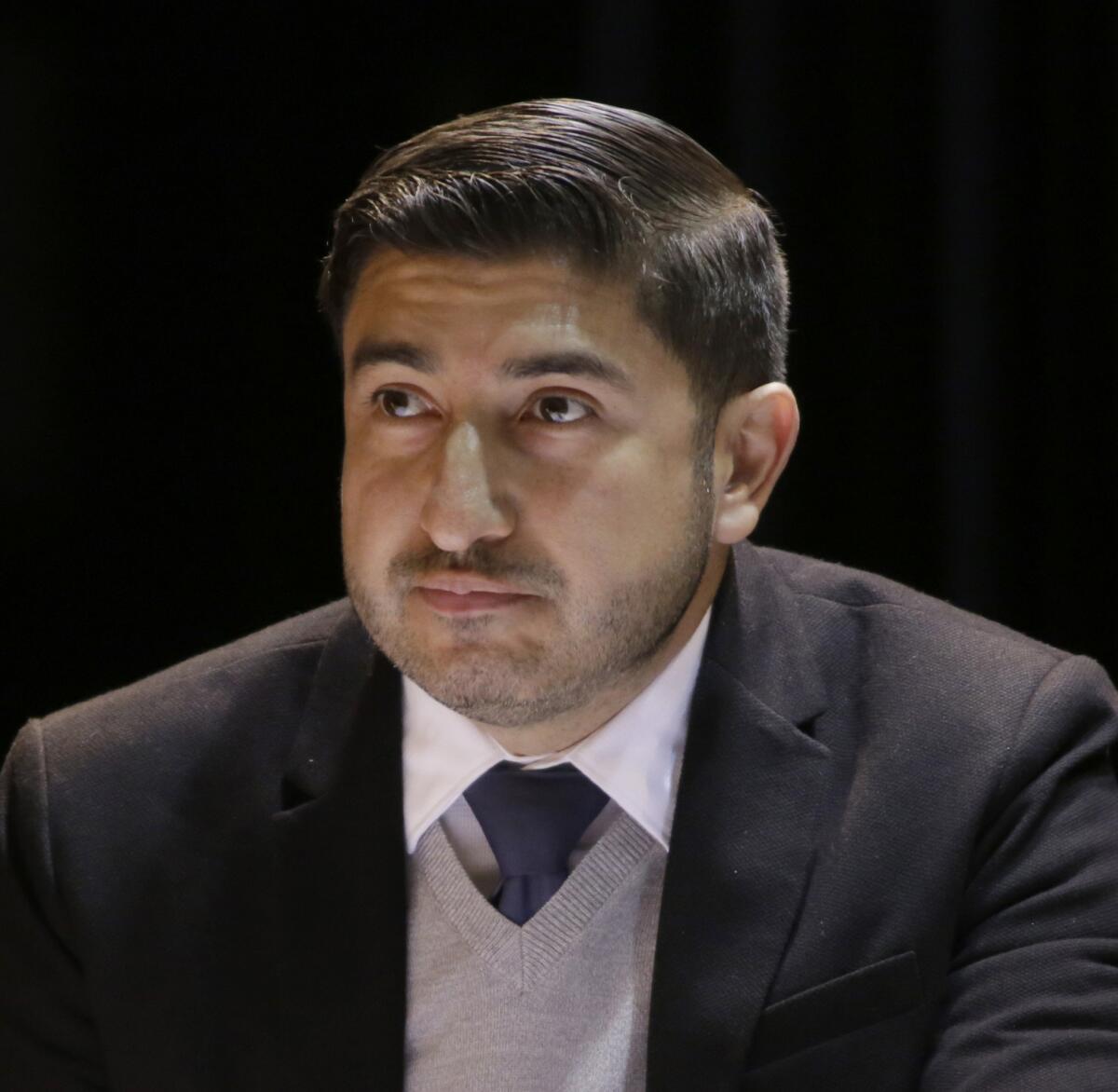
Congressional candidate and former Bernie Sanders campaign staffer Arturo Carmona denied accusations of sexism leveled at him Friday by a former staffer and backed up by two prominent Sanders surrogates.
Masha Mendieta, a former Latino outreach strategist for the Sanders presidential campaign, made multiple allegations against Carmona in a Medium post Friday, saying Carmona didn’t adequately address a complaint of sexual harassment, treated female staffers unfairly and was a poor manager who used campaign funds inappropriately.
Mendieta wrote that though working on the Sanders presidential campaign “gave me genuine hope that good souls were out there who respected and valued women equally ... Arturo Carmona was not one of them.”
In a statement to The Times late Friday, Carmona said, “I categorically deny any accusations of sexual harassment or fiscal mismanagement made against me. I do not take this lightly.”
Carmona, who is running in Tuesday’s 34th Congressional District election, added that he managed a “large and diverse staff” on the Sanders campaign and dealt with questions and criticism as they emerged.
“I’ve never shied away from hiring, working with or working under strong and capable women,” the statement continued. “I have always taken issues of harassment and equity in the workplace with the seriousness and sensitivity that they deserve.”
Carmona, who ran the Sanders campaign’s Latino outreach division before becoming its deputy political director last year, is one of two dozen candidates running in the special election. Sanders has not endorsed anyone in the race, but Carmona often references the “Bernie family” he worked with during the presidential primary.
It now appears some members of that family are turning against him.
After Mendieta published the allegations, two of Sanders’ most visible supporters — former Nevada state legislator and Sanders surrogate Lucy Flores and prominent immigration rights activist and former Sanders campaign staffer Erika Andiola — backed up Mendieta’s claims. (At least one other former campaign staffer, Giulianna Di Lauro, also affirmed Mendieta’s allegation about Carmona’s handling of a sexual harassment complaint.)
In a Facebook post, Andiola said Mendieta’s stories “are true” and added that a “huge” culture of sexism existed in his division, but she did not elaborate. Flores, who said she worked only tangentially with Carmona during the Sanders campaign, said she experienced his “demeaning and sexist ways” after she worked with him at another organization.
“I didn’t stop to think of the misery he had already caused for so many other women and the misery he would cause in the future. I didn’t stop to think that it wasn’t enough to just speak privately, but to also speak openly,” wrote Flores, who serves on the board of Our Revolution, the political group that Sanders helped start and Andiola now works for.
Mendieta, who says she is a voter in the district, has endorsed Sara Hernandez in the race, while Flores is backing Wendy Carrillo.
Carmona chalked up the accusations to a last-minute “smear campaign” by people supporting his opponents.
“It is very unfortunate that such important issues are currently being subject to political maneuvering,” he said in a statement.
Javier Gonzalez, Carmona’s campaign manager and another former Sanders campaign staffer, said he had heard about some of the allegations Mendieta raised and has “great respect” for Andiola, but he wishes she hadn’t aired her feelings so close to the election.
He called the accusations “serious” but said, “I don’t know what Arturo’s role was in any of that.”
“If you’re brothers and sisters, you deal with it in a friendly fashion, and you do it with honey,” Gonzalez said. “To smear someone at the last minute with a little bit of ‘he said, she said’ is not the way to do it.”
UPDATES
10:53 p.m.: This post was updated with additional details from Mendieta’s Medium post.
This post was originally published at 9:30 p.m.
TV ads target lawmakers on the fence over Gov. Jerry Brown’s plan to raise gas taxes to repair roads
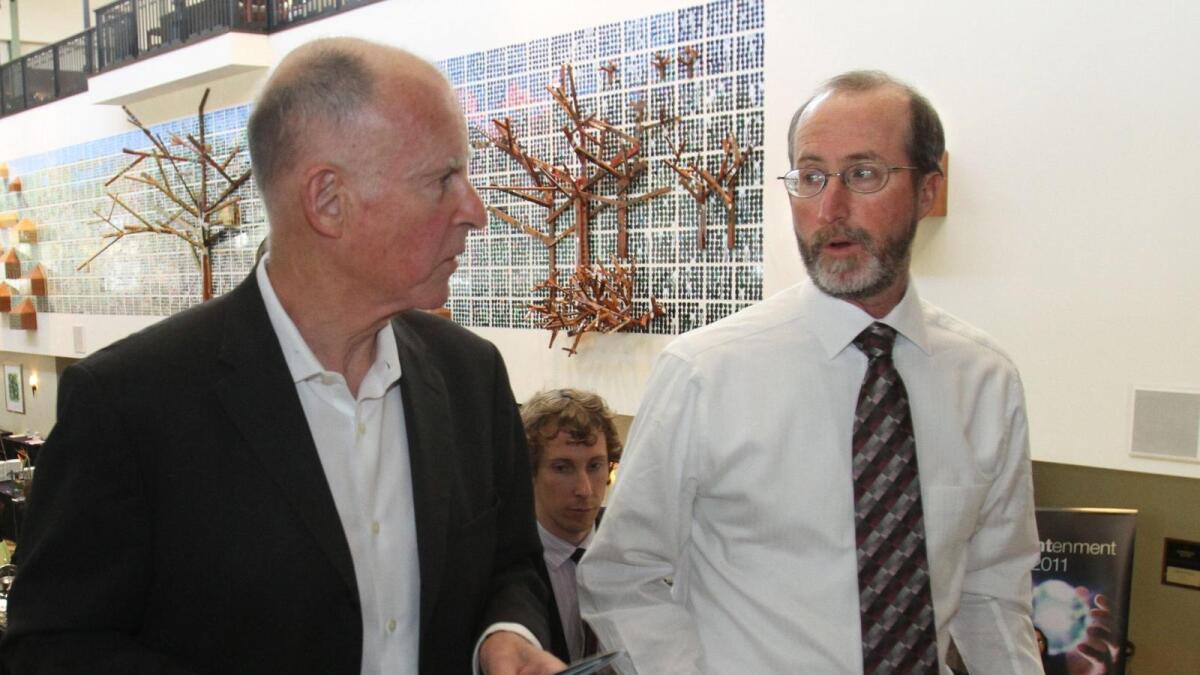
With supporters of a road repair bill still counting votes, a coalition of business and labor leaders on Friday began running television and radio ads that target eight legislators who have not yet committed to vote for the measure.
The Fix Our Roads Coalition is spending $1 million on a statewide, week-long ad blitz that urges legislators to vote next week for Senate Bill 1. The bill would raise gas taxes and vehicle fees to generate $52 billion the first 10 years to repair crumbling roads, highways and bridges, and expand mass transit.
“We are closer than ever to finally passing a transportation funding package to fix our long-neglected and crumbling roads,” said Michael Quigley, executive director of the California Alliance for Jobs, which is co-funding the commercials. “These new ads are part of an all-out grassroots, earned media, advertising and social media campaign to support passage of this bill by next week.”
In addition to ads that call on legislators to support the bill, eight advertisements call on legislators by name to support the plan.
Those targeted include Sens. Steve Glazer (D-Concord) and Anthony Cannella (R-Ceres), and moderate Democratic Assembly members Adam Gray of Merced, Rudy Salas of Bakersfield, Sabrina Cervantes of Corona, Sharon Quirk-Silva of Buena Park and Al Muratsuchi of Torrance, as well as Republican Catharine Baker of San Ramon.
The bill needs a two-thirds vote in both houses, which would require all of the Democrats to support the measure. Cannella and Baker are being wooed by Gov. Jerry Brown and legislative leaders to step in if one of the Democrats gets cold feet.
Representatives of Cannella and Glazer said earlier this week that they were still weighing the issue.
Brown and legislative leaders have called for the Legislature to act by Thursday, after which time the lawmakers head out on spring break.
Former Assembly Speaker John A. Pérez’s views on the L.A. congressional race he dropped out of
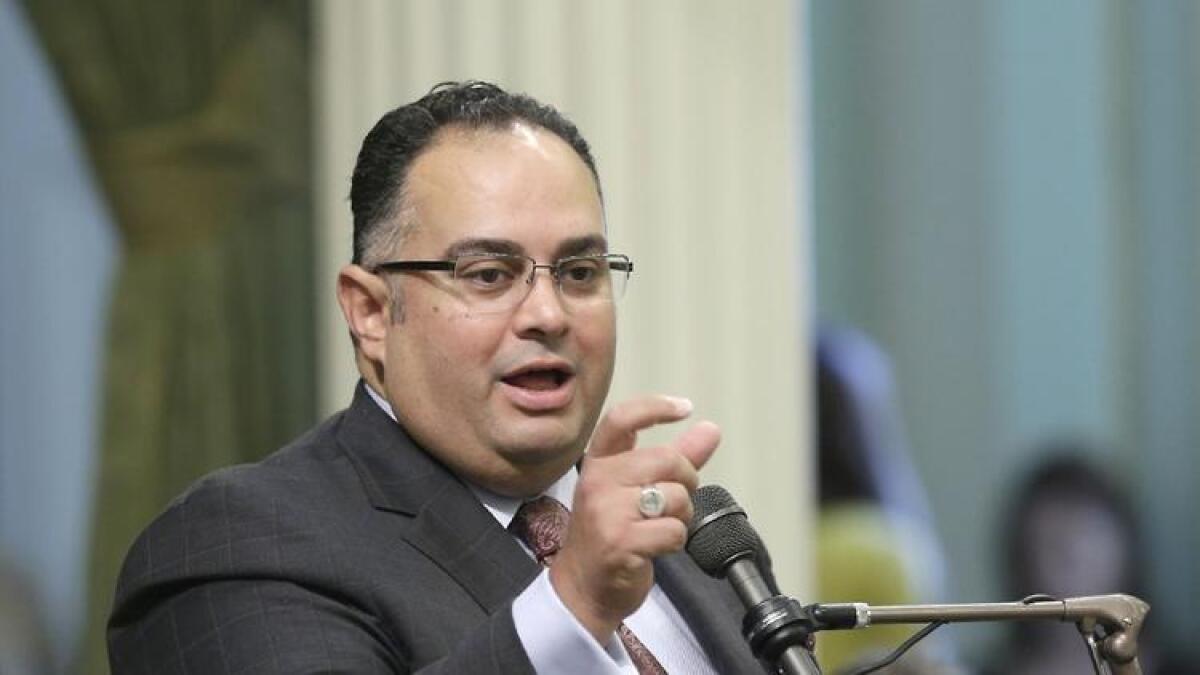
Before he suddenly dropped out of the running citing health reasons, former Assembly Speaker John A. Pérez was widely considered the favorite to replace Xavier Becerra in the 34th Congressional District.
With Pérez out, the race is wide open and isn’t likely to be decided Tuesday, when 24 candidates compete in the primary. Instead, the top two vote-getters regardless of party are expected to advance to a June 6 election. (If any one candidate receives more than 50% of the vote Tuesday, it’s all over).
Pérez offered his thoughts on the race in an interview published Friday by Politico. Some of his major points:
- Pérez said he thinks state Assemblyman Jimmy Gomez is “significantly ahead of the pack” and will make the runoff.
- A “cluster” of candidates, including Alejandra Campoverdi, Wendy Carrillo, Arturo Carmona, Maria Cabildo and Robert Lee Ahn, are in a close enough race that “any one of them” could advance.
- If Carrillo were to move forward, Perez says, the narrative in the runoff would be about which candidate is more progressive and who’s an insider versus an outsider.
- Perez says if he were the front runner, Campoverdi is “the one I’d be most concerned about running against” due to her connections in Washington and her national profile, which could create a “new level of viability.”
To fight against human trafficking, this state senator wants to train motel employees to spot signs of abuse
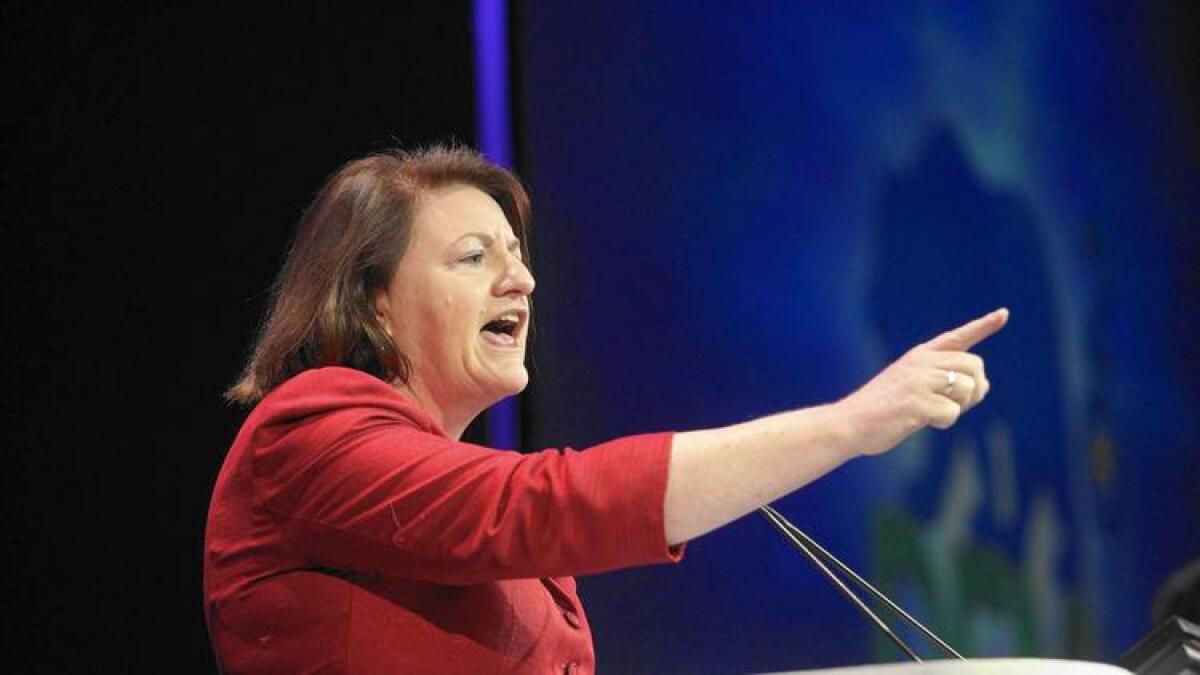
State Sen. Toni Atkins (D-San Diego) wants to increase services for human trafficking survivors and make it easier in court to put away their abusers.
Flanked by prosecutors and hotel industry officials at a news conference Friday in San Diego, the former Assembly speaker announced new housing and mental health assistance for victims and introduced legislation that would require hotels and motels to train their employees to spot signs of human trafficking.
Another of her proposals would expand the character evidence that prosecutors can bring forth at trial against defendants charged with selling victims for sex or labor.
The bills are meant to attack a multibillion-dollar trade that has a wide sweep in California, home to three cities on the FBI’s list of 13 top human trafficking destinations: San Diego, San Francisco and Los Angeles. National human trafficking hotline calls across California generated 1,323 cases in 2016 — nearly twice as many as any other state.
Atkins is among lawmakers pushing the issue at the Capitol, where legislation has focused on targeting traffickers, protecting victims and addressing what advocates say is a law enforcement culture in which child survivors sometimes are treated like criminals.
But funding for victims’ services and programs has been an obstacle. A bill by Atkins to develop pilot projects in three counties to address the commercial sexual exploitation of youth sailed through the Legislature without opposition last year only to be vetoed by the governor. Her second bill for a statewide task force died in the Senate appropriations committee.
Atkins’ latest proposal to provide training for motel employees follows a similar bill by Assemblywoman Cristina Garcia (D-Bell Gardens). It failed in the last legislative session amid opposition over costs to businesses.
That hasn’t stopped Atkins from trying again.
“Hotels are ground zero for sex trafficking in this state,” she said in a statement. “Sex traffickers are exploiting some of the most vulnerable people in our society, including children. These victims are often hiding in plain sight, and traffickers take advantage of the fact that many hotel employees don’t recognize the signs.”
In L.A. congressional race, 75% of the money went to 5 candidates
The latest fundraising figures for the 34th Congressional District race are in, and they give a fuller picture of where the money has been flowing in the April 4 special election.
While there are 24 candidates in the crowded field, three-quarters of the campaign contributions have gone to just five candidates: Assemblyman Jimmy Gomez, Sara Hernandez, Robert Ahn, Alejandra Campoverdi and Yolie Flores.
And with so many hopefuls vying for donors in a district with a median household income of $35,181, a lot of the campaign cash came from outside the 34th District. More than 80% of contributions where a ZIP code was disclosed came from areas outside the district, which includes Koreatown, downtown Los Angeles, Chinatown, Highland Park, Eagle Rock and Boyle Heights.
State Controller Betty Yee says California’s tax collection agency has been mismanaged and needs a complete overhaul
Citing a review that found widespread mismanagement at the state Board of Equalization, State Controller Betty T. Yee on Friday called for stripping the panel of responsibilities for tax administration and audit and compliance functions so it can focus on handling taxpayer appeals.
Yee’s proposal came in response to an evaluation by the state Department of Finance that found board officials were improperly redirecting resources and employees to pet projects in their districts.
“In order to rebuild taxpayer trust, meaningful reform is essential,” said Yee, who serves as an ex-officio member of the board. “I urge the Legislature and the governor to strip the board members of all statutory functions and permanently move these duties and assigned staff to a separate new department under the governor.”
The Department of Finance review found the board “had difficulty providing complete and accurate documentation” in response to inquiries, and “various levels of management were not aware of and could not speak to” certain actions, including the informal establishment of a call center, creating an unofficial office location and inconsistent use of community liaisons.
The evaluation said personnel records showed workers assigned to administrative jobs that they were not doing, having been transferred to help board members in their districts.
Even though each elected board member has a $1.5-million budget to cover office costs, some members borrowed workers from the head office, taking them from jobs that involved bringing in tax money and having them instead reach out to board members’ constituents, the review found.
The redirection of workers violated state budget rules.
In addition, the reviewers said the board “provided 11 different versions of its proposed sales and use tax allocation adjustment” and the Department of Finance found errors and omissions throughout.
Sen. Kamala Harris has opened a gubernatorial fundraising account — but she has no plans to run for governor, aide says

Sen. Kamala Harris opened a campaign fundraising account to run for governor in 2026, but that does not mean California’s newest U.S. senator has any plans to seek the office.
Harris plans to use the account to store the $1 million in leftover funds from her successful 2014 reelection campaign for attorney general, said Sean Clegg, Harris’ political spokesman.
Harris left her post as state attorney general mid-term when she was elected in November to the Senate seat opening created by the retirement of Barbara Boxer.
She faced a March 31 deadline to shutter the attorney general account, and under election law cannot mingle money raised for state campaigns with funds raised to run for federal office.
“It’s purely political bookkeeping,” Clegg said.
The 2026 date could raise eyebrows because after the 2018 gubernatorial election, that will likely be the next time the governor’s office is open because its occupant is termed out.
But Clegg said Harris did not open an account for a lower office like lieutenant governor — as politicians in similar situations typically do — because, he said, “we weren’t interested in being cute about it.”
“So we designated the only potential future office one could conceivably contemplate, although we’re not contemplating it,” he said. “We’re focused on the job we’re doing.”
This California lawmaker wants to crack down on toys and electronics that pick up conversations and personal information
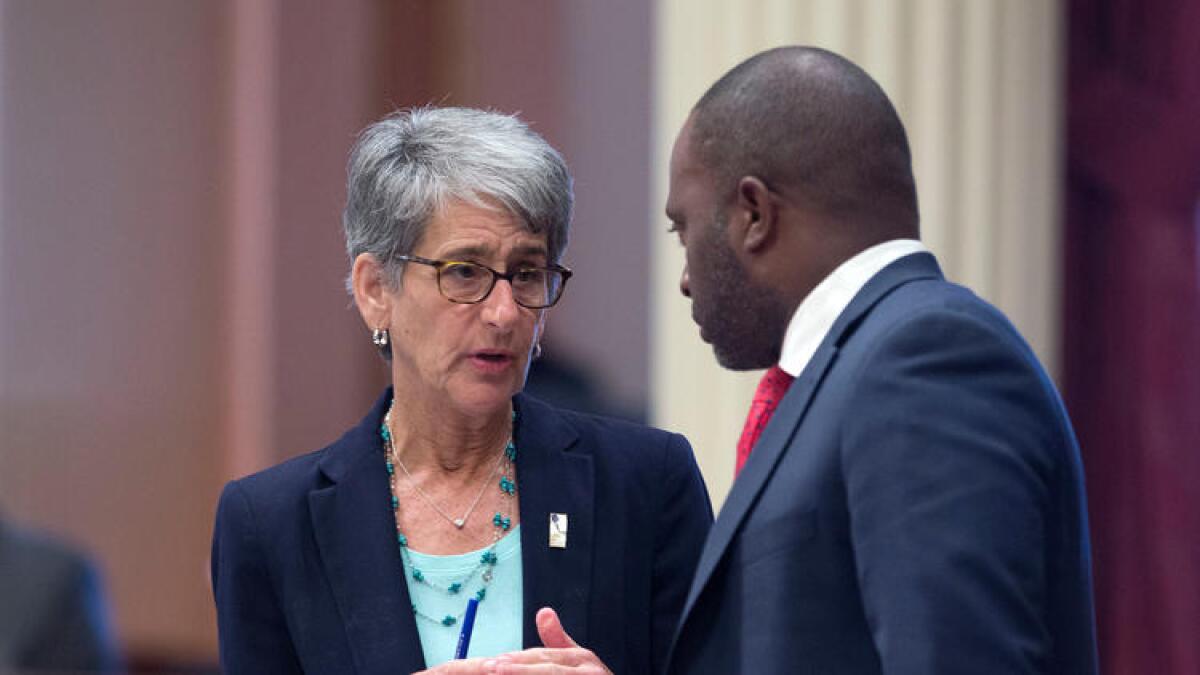
A California state senator wants to prevent companies from selling products that can listen in on conversations and collect personal information from unknowing consumers.
Sen. Hannah-Beth Jackson (D-Santa Barbara) has filed legislation that would require manufacturers to equip their Internet-connected devices, including toys, clocks, kitchenware and electronics, with certain security and privacy features.
Dubbed the Teddy Bear and Toaster Act, Senate Bill 327 takes aim at the so-called “Internet of Things,” the inter-networking of everyday devices that some tech and privacy experts say amounts to a growing industry with little oversight.
“The more we know and the more we learn about the Internet connection of all sorts of devices, many are realizing that we don’t know the extent to which these devices are invading our lives,” Jackson said.
Under her proposal, companies would have to design their products so that they alert consumers — through visual, auditory or other cues — when they are gathering data. They would have to obtain user consent when they intend to transfer the information. And they would have to disclose at point of sale whether the devices are capable of sweeping up sensitive data, so that customers can take that into account while shopping.
Most states, including California, have privacy breach laws to protect personal information. The proposal, which would extend those provisions to consumer devices, could be the first of its kind nationwide. But it is expected to garner wide opposition from retailers and manufacturers.

Still, supporters point to growing privacy concerns. Some toys, like the My Friend Cayla doll banned in Germany, prompt children to give personal information, such as their parents’ names and their addresses, and their manufacturers reserve the right to target young buyers in direct marketing campaigns. Other “smart” devices lack the most basic security features that make them vulnerable to a hack or coordinated cyberattack.
In a statement, James P. Steyer, CEO of Common Sense Kids Action, which is sponsoring the bill, said such toys and electronics can put consumers at risk.
“These products get rushed out to the market without the privacy issues being addressed in advance, and then consumers end up paying the price,” he said.
President Jerry Brown? ‘Don’t rule it out,’ governor quips
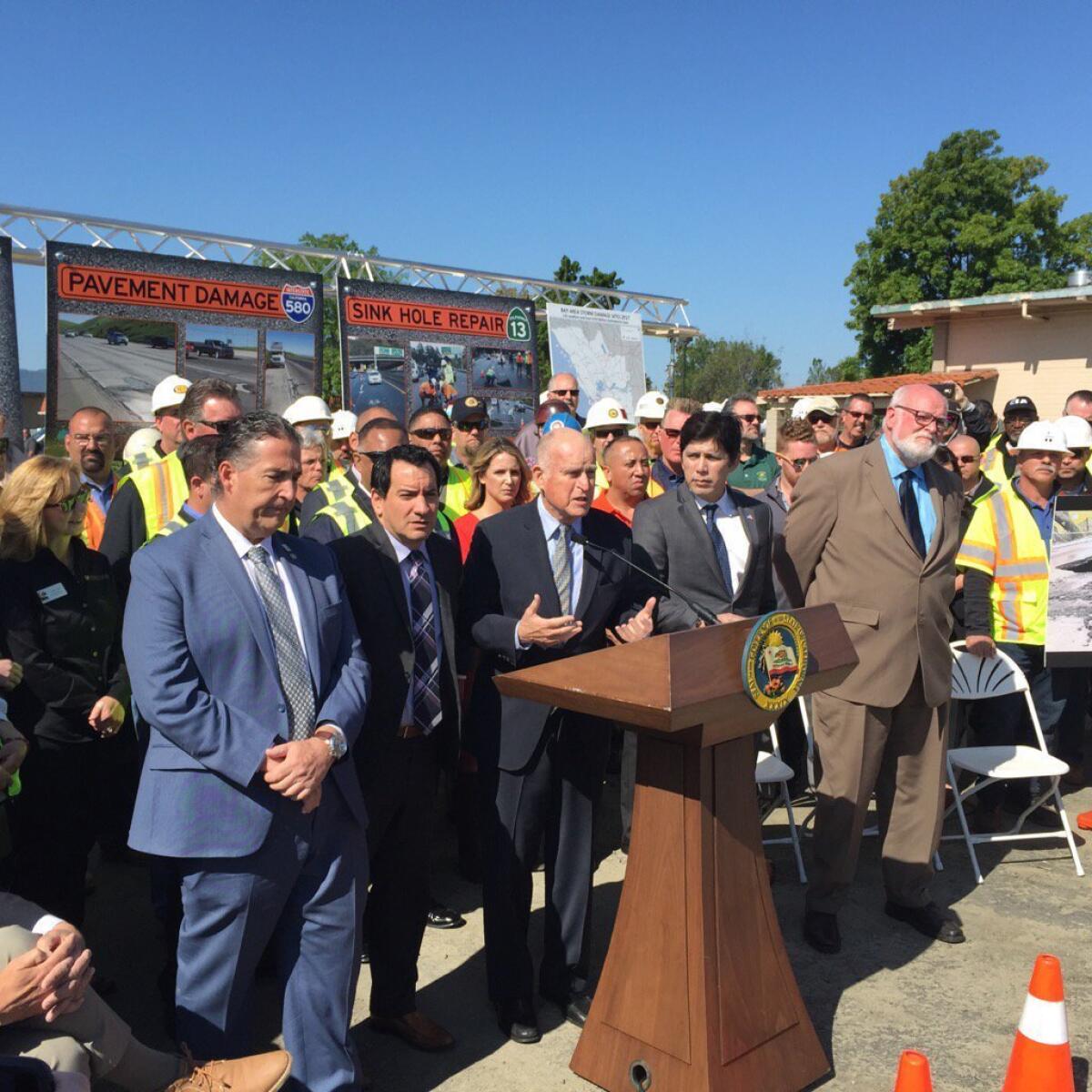
In arguing for approval of a new transportation package on Thursday, Gov. Jerry Brown appeared to enjoy himself in refusing to shoot down a supporter’s suggestion that he run for president — even as he noted his 79th birthday is next week.
Standing next to other elected officials and construction workers at the rally in in Concord, Brown argued that gas tax and vehicle fee increases are needed to address a backlog of much-needed repairs to California’s crumbling system of roads, highways and bridges.
“I’m telling you the truth because why would I lie to you?” Brown said. “I don’t think I’m running for office. All I’ve got left is lieutenant governor, treasurer and controller.”
“Or president,” someone in the crowd shouted.
Brown responded that he would be 82 when the next presidential election comes around.
“But you know, don’t rule it out,” he quipped, drawing laughter and applause.
Lest the comment turn into a national story, an aide later clarified the governor’s intentions: “He was joking.”
Rep. Jerry McNerney endorses Tracy Van Houten in 34th District
Gov. Jerry Brown is making appeals to legislators for votes on his new transportation plan — one district at a time
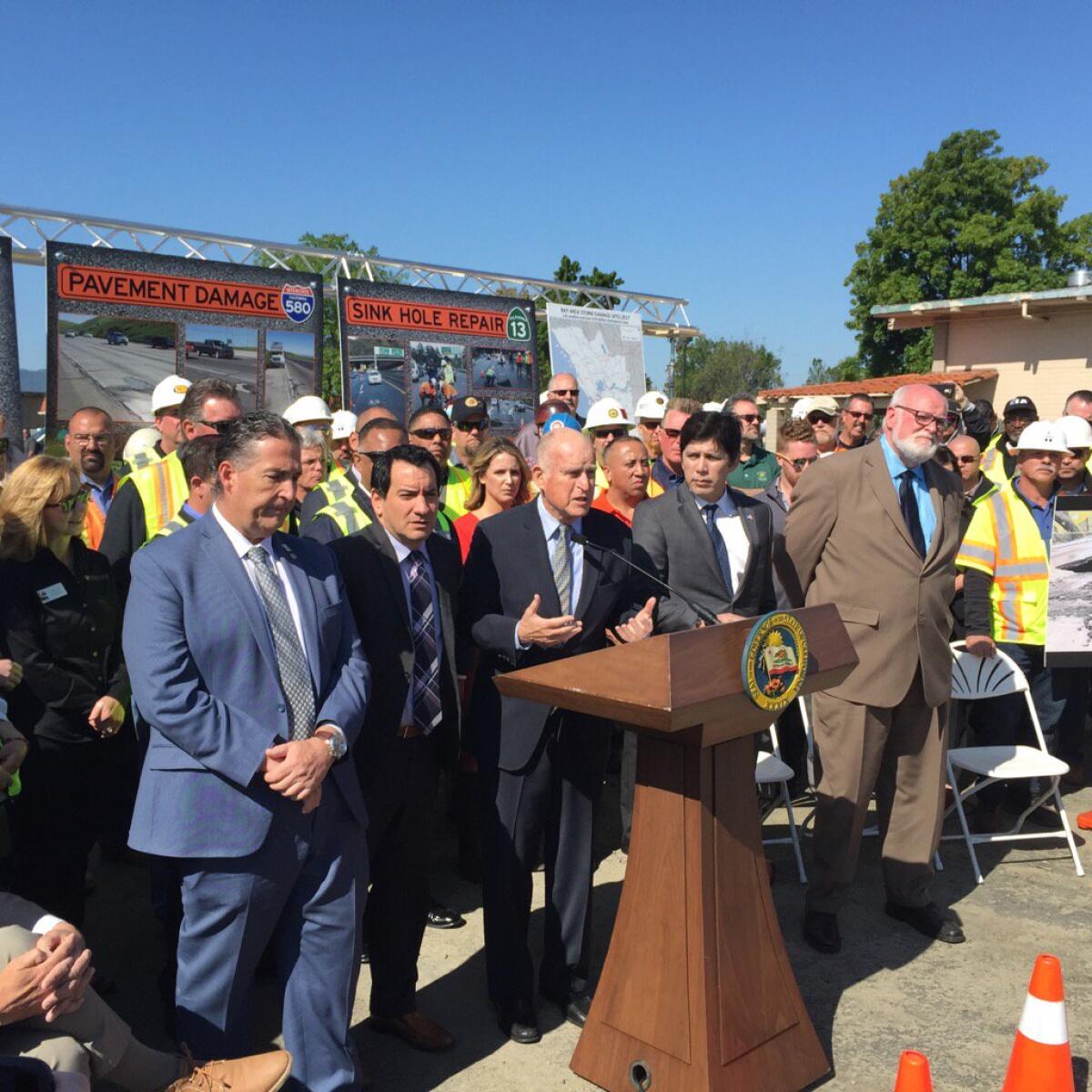
Gov. Jerry Brown and legislative leaders on Thursday took their campaign for higher transportation taxes and fees to the Bay Area district of state Sen. Steve Glazer (D-Concord), one of the holdouts in the state Senate who has not yet committed to vote for the package.
Surrounded by dozens of construction workers, Brown warned that if the transportation bill unveiled on Wednesday isn’t approved this year, it may not happen in the foreseeable future.
“There is nothing more fundamental in the business of government than making sure the roads and bridges don’t fall apart, and they are falling apart,” Brown said.
Glazer recently withheld his vote from a bill proposing a similar plan for repairing state bridges, roads and highways, and on Wednesday, a spokesman said he had still not committed to any plan but wanted to review the detailed proposal before taking a position.
Construction workers at the rally held signs that pictured crumbling roads and said, “Senator Glazer Fix This Now. Vote for SB 1.”
Brown said Glazer, his former senior advisor, does not disagree with the intent of the bill.
“He loves this plan, but he has another idea on his mind and he wants to marry the two and see if he can get some outcomes that I don’t want to get into at this particular place,” Brown told reporters.
Sen. Jim Beall, chairman of the Senate Transportation Committee, said Glazer wants the transportation funding bill to include a clause barring employees of Bay Area Rapid Transit from going on strike.
Beall said that is a labor-relations issue that cannot be included in the bill raising taxes.
“You can’t do that,” Beall said.
A spokesman for Glazer said the senator is still undecided on the bill. “The senator is continuing to have conversations with the principals,” said Steve Harmon, a spokesman for Glazer. He declined to comment on Beall’s statement.
Assembly Speaker Anthony Rendon (D-Paramount) said there may be similar rallies in Los Angeles and Riverside in the coming days. Two other Democrats who have not yet committed to the plan are Riverside Sen. Richard Roth and Woodland Hills Sen. Henry Stern.
Brown acknowledged that there is work to do to secure the two-thirds vote needed in both houses of the Legislature to raise the base excise tax on gasoline by 12 cents per gallon, to a total of 30 cents per gallon, and to create a new annual vehicle fee that would average $51 based on the value of the car or truck.
Rendon said approval of the transportation bill would cost the average California motorist an extra $10 per month, which he said is a deal compared to the current cost of $720 in annual vehicle repair costs required because of running over potholes and other rough road conditions.
Hoping to force a Senate vote on the package early next week, Brown was accompanied to the Concord news conference by Rendon and Senate President Pro Tem Kevin de León (D-Los Angeles). They urged lawmakers to support the bill, which would generate $5.2 billion annually for the first 10 years for road and bridge repairs, mass transit improvements and other projects to reduce congestion.
Glazer, known as a maverick in the Legislature, was Brown’s campaign manager during the 2010 gubernatorial election and remained a senior advisor to the governor before running for the state Senate in a special election in 2015.
----
1:23 p.m.: This article was updated with a statement from a representative for state Sen. Steve Glazer.
This article was originally published at 12:42 p.m.
Who will be California’s next governor? New poll shows Newsom leads with 1 in 3 voters undecided
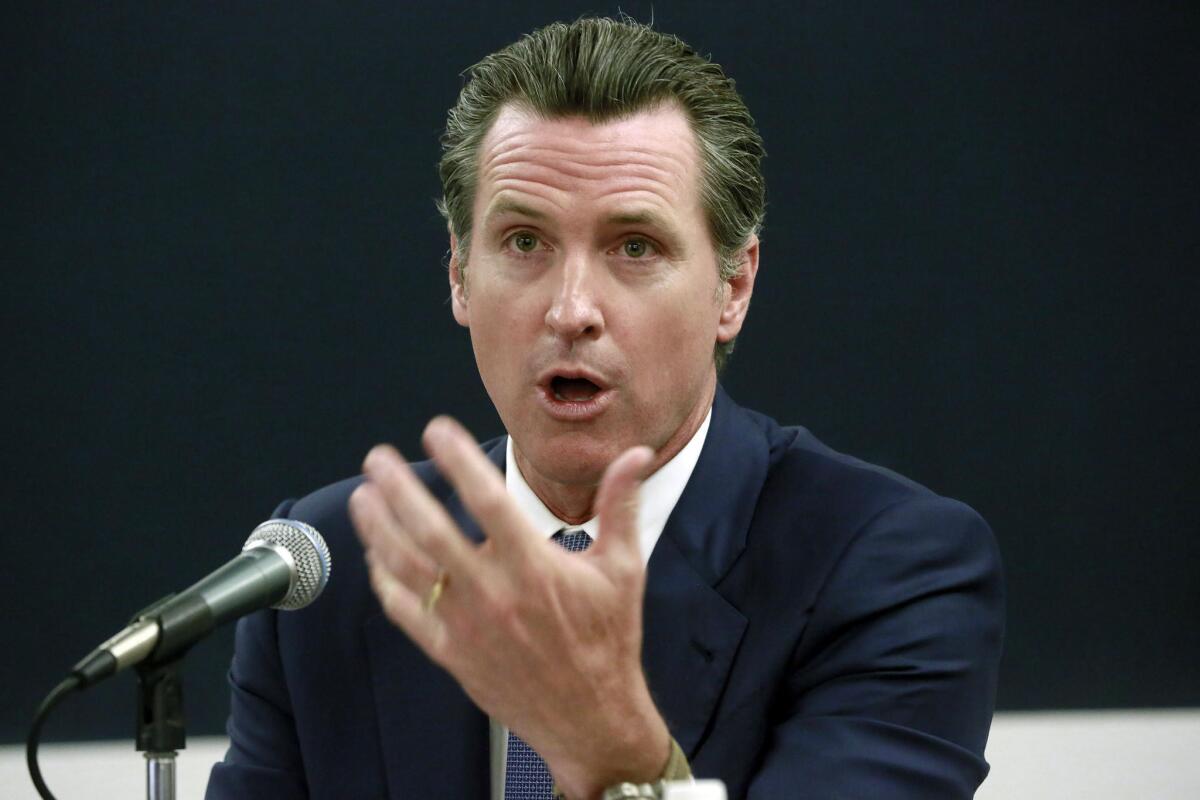
In the race to replace termed-out Gov. Jerry Brown, the largest number of voters in a new statewide poll does not favor a candidate in the race. About 1 in 3 voters said they were undecided, according to the survey by the UC Berkeley Institute of Governmental Studies.
Among candidates who have entered the race, Lt. Gov. Gavin Newsom holds a strong lead with 28% of the vote, followed by Republican businessman John Cox with 18%, according to the poll, which was released Wednesday. Former Los Angeles Mayor Antonio Villaraigosa clocks in at 11%, state Treasurer John Chiang at 8% and former state schools chief Delaine Eastin at 3%.
Because the race is far away and public campaigning has not yet started in earnest, the poll could primarily be an indicator of name recognition. The field of candidates is also likely to grow.
Newsom has several natural advantages: He was the first person to enter the race in 2015 and has a large fundraising edge. He has perhaps been the candidate most in the spotlight among the Democrats running, notably for his support of the marijuana legalization measure on the November ballot.
Cox may have benefited from being the lone Republican in that version of the poll.
Pollsters conducted a second version of the poll with five additional potential candidates, none of whom have announced a run for governor in 2018 — San Diego Mayor Kevin Faulconer, Los Angeles Mayor Eric Garcetti, billionaire environmentalist Tom Steyer, California Senate President Pro Tem Kevin de León and former state Controller Steve Westly.
Newsom still led the pack to come in at 24%. The two Republicans, Faulconer and Cox, tied at 11% each. Faulconer has said he does not plan to run for governor.
Garcetti, Villaraigosa, Chiang, Steyer, De León, Westly and Eastin all placed in the single digits.
Steyer and Westly have the personal wealth to self-fund a campaign, giving them time to decide whether to enter the race. Westly unsuccessfully ran for governor in 2006, losing in the Democratic primary to state Treasurer Phil Angelides.
In the 2018 contest, the two candidates who receive the most votes in the June primary will move onto the November general election.
The poll of 1,000 registered voters in California was conducted online in English and Spanish between March 13 and 20, and has a margin of error in either direction of 3.6%.
California legislators team up to expand John Muir National Historic Site
California’s senators and Rep. Mark DeSaulnier (D-Concord) filed legislation Thursday to add 44 acres to the John Muir National Historic Site.
The John Muir Heritage Land Trust has offered to donate the additional land to the National Park Service, which operates the site, and the bill would authorize the agency to accept the parcel.
“The time John Muir spent with his daughters at their scenic home and its neighboring property played a major role in launching the national parks movement. Expanding the existing park to preserve more of this history and beauty is a fitting tribute to Muir’s legacy of protecting land for all to enjoy,” Sen. Dianne Feinstein (D-Calif.) said in a statement.
Located about 30 miles east of San Francisco, the John Muir National Historic Site consists of Muir’s Alhambra Valley home and 325 acres outside of Martinez.
DeSaulnier said in a statement that expanding the property is a “fitting celebration of his legacy, and will offer nature-goers greater access to enjoy the beauty of the East Bay.”
DeSaulnier sponsored the same bill last year, which passed the House unanimously but was not considered by the Senate. Feinstein and former Sen. Barbara Boxer (D-Calif.) carried the Senate version, which died after a committee hearing. Such bills often take a few attempts to pass, even without major opposition.
Muir’s writings helped inspire the creation of the National Park Service, starting with his lobbying of Congress to protect the Yosemite Valley from dams. He also was a founding member of the Sierra Club.
“Californians owe him a debt of gratitude,” Sen. Kamala Harris (D-Calif.) said in a statement.
California’s attorney general could investigate local police shootings under new legislation
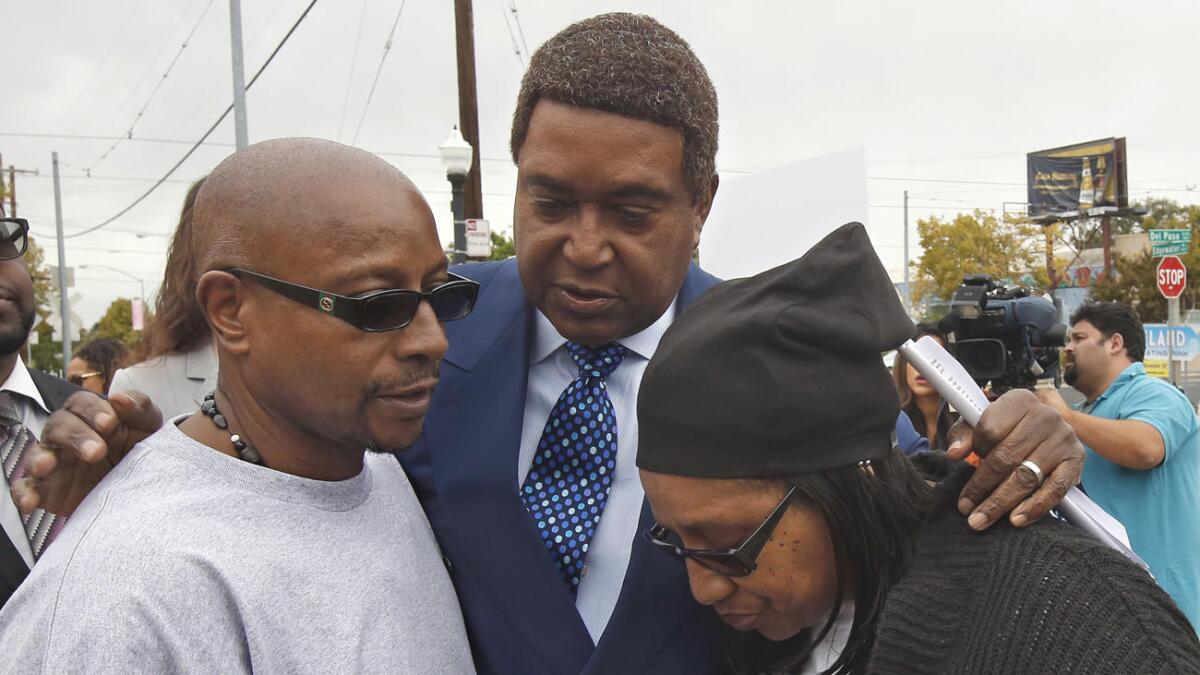
California’s attorney general could investigate local police shootings under a new bill authored by a Sacramento lawmaker.
Democratic Assemblyman Kevin McCarty’s Assembly Bill 284 would allow local police departments or district attorneys to ask Atty. Gen. Xavier Beccera’s office to independently investigate police shootings of civilians.
The legislation was prompted by high-profile police killings of Michael Brown in Ferguson, Mo., Eric Garner in New York City and last summer’s police shooting of Joseph Mann, a mentally ill homeless man, in Sacramento, according to McCarty’s office. In all three cases, local prosecutors declined to charge the officers.
“There is a growing skepticism and a perceived conflict of interest, of the current process of local district attorneys investigating local police,” said a fact sheet on the bill provided by McCarty’s office. “Given that they work so closely, it is a valid question of whether this is the most transparent process for the public. There is a growing appetite, both at the national and local level, to create a better and more transparent system for [police shootings] that is fair to police, families, and the community in order to restore public trust.”
McCarty’s bill would make state investigations voluntary in these cases and would be implemented only if lawmakers also give Beccera’s office money to pay for the effort.
In 2015, McCarty tried to pass legislation that would have made state investigations of local police shootings mandatory, but that bill failed to make it out of legislative committees. This year, lawmakers have generally scaled back prior efforts to change the state’s rules governing police discipline and transparency.
Former offenders will help award millions in Proposition 47 grants to rehabilitate inmates
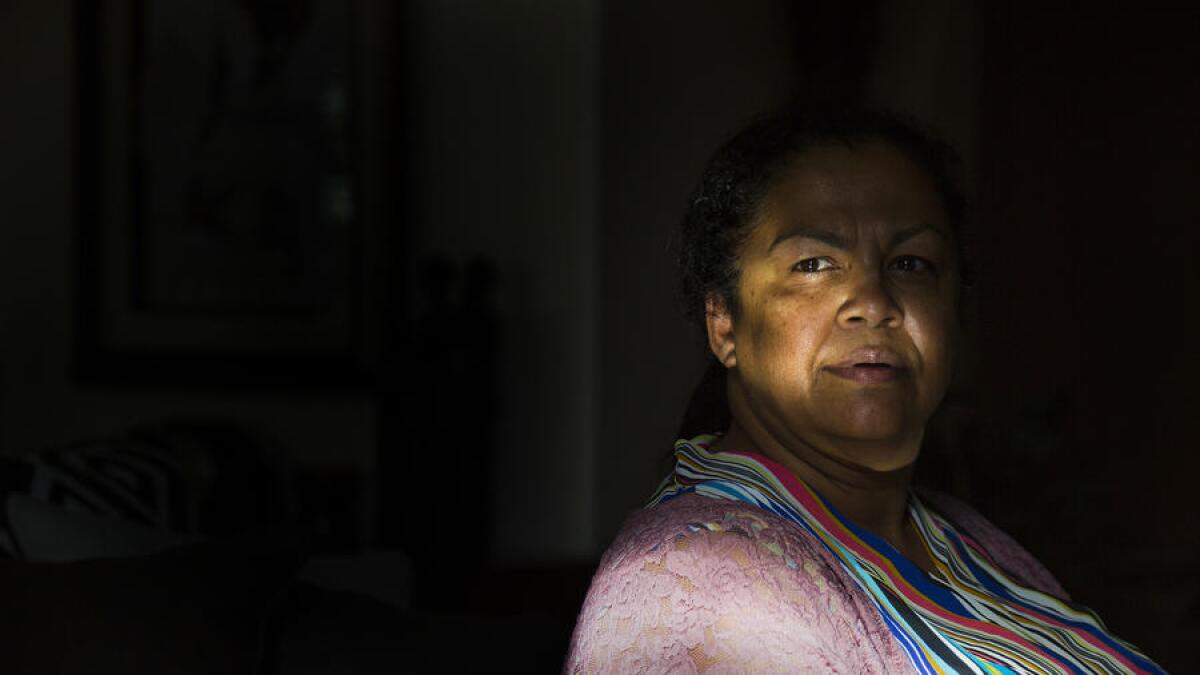
California officials will begin the process this spring of awarding $103 million in grants to programs for inmates centered on rehabilitation, substance abuse and reentry into society.
The efforts will be funded with dollars saved from prison spending under Proposition 47, the sweeping 2014 ballot measure that downgraded six drug and theft crimes to misdemeanors and allowed defendants to renegotiate their punishments.
For the large coalition of criminal justice advocates that poured millions into getting the proposition passed and that has closely tracked its implementation, this is a long-awaited step. Other states have passed similar laws, but California is the only state to invest those savings into services meant to help people stay out of prison.
On the executive committee helping award the grants are formerly incarcerated people who know the system from the inside.
What would single-payer healthcare look like in California? Lawmakers release new details
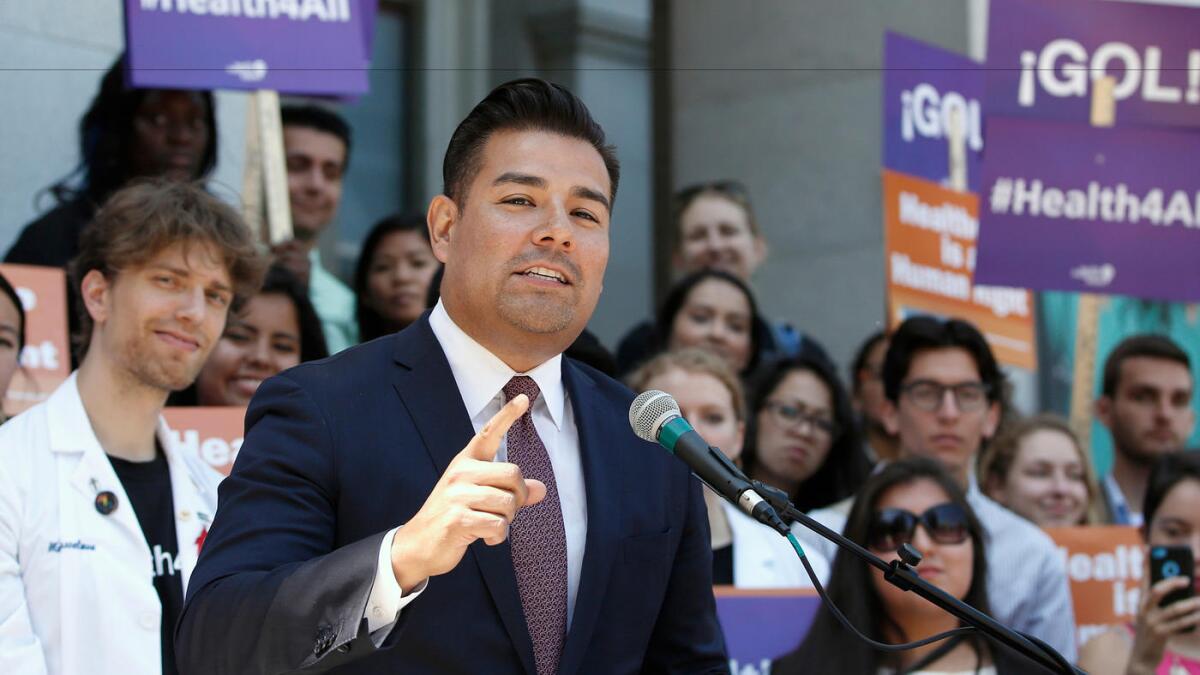
A proposal in California for a single-payer healthcare system would dramatically expand the state government’s presence in medical care and slash the role of insurance companies.
New amendments released Thursday fill in some key details on the universal healthcare measure proposed by state Sens. Ricardo Lara (D-Bell Gardens) and Toni Atkins (D-San Diego), although the biggest political question — how it would be paid for — remains unanswered.
Under the proposal, which was announced in February, the state would cover all medical expenses for every resident regardless of their income or immigration status, including inpatient, outpatient, emergency services, dental, vision, mental health and nursing home care.
Insurers would be prohibited from offering benefits that cover the same services as the state.
The program would eliminate co-pays and deductibles, and patients would not need to get referrals to see eligible providers. The system would be administered by an unpaid nine-person board appointed by the governor and the Legislature.
A universal healthcare system run by the government has long been a dream of liberals, with many rallying behind insurgent Democratic presidential candidate Bernie Sanders’ proposal for “Medicare for all” in the 2016 race.
After a GOP effort to replace Obamacare stalled last week, Sanders said he intends to introduce a nationwide single-payer bill in the U.S. Senate.
Proponents in California, who are no longer playing defense to preserve the Affordable Care Act, also touted a broader healthcare plan.
“With Republicans’ failure to repeal the Affordable Care Act, Californians really get what is at stake with their healthcare,” Lara said in a statement. “We have the chance to make universal healthcare a reality now. It’s time to talk about how we get to healthcare for all that covers more and costs less.”
The cost — sure to be the biggest hurdle for the measure — so far remains unknown. The authors say they intend to pay for the program through “broad-based revenue,” but details of a funding proposal have not been hashed out.
Gov. Jerry Brown sounded wary of a sprawling single-payer plan while speaking to reporters last week on his trip to Washington D.C.
“Where do you get the extra money? This is the whole question,” Brown said.
The bill is sponsored by the California Nurses Assn., which already has been rallying its members in support of the bill, SB 562.
“There has been a seismic shift in our political system through grassroots activism; we have an inspired, motivated base that will make its voice heard,” RoseAnn DeMoro, the labor group’s president, said in a statement.
New amendments to ‘sanctuary state’ bill will allow police and sheriffs to contact ICE about violent felons
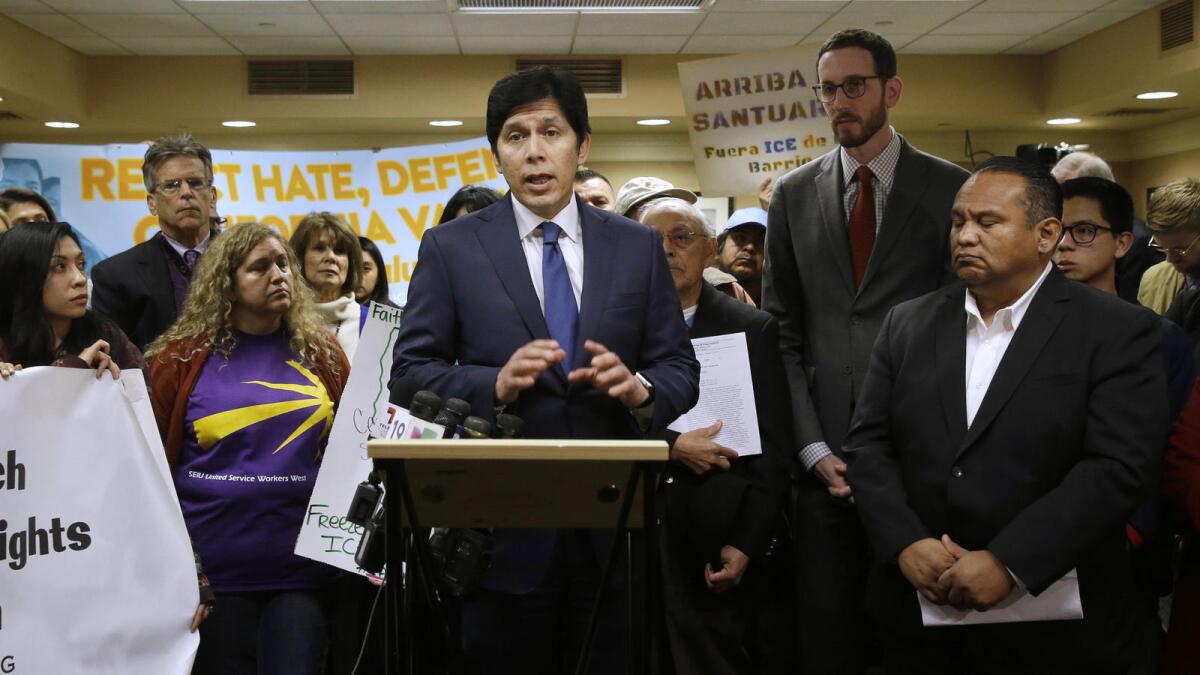
California Senate leader Kevin de León has amended his “sanctuary state” bill to provide greater flexibility for law enforcement to notify and work with federal immigration officials on cases involving serious and violent felons.
The move, amid national debate over “sanctuary city” policies, comes days after a rowdy welcome in Sacramento for the acting director of Immigration and Customs Enforcement at a forum meant to address the role of police officers and sheriff’s deputies in immigration enforcement.
Senate Bill 54 is at the center of a legislative package that Democratic lawmakers say is meant to extend protections for immigrants under the expanded deportation priorities of the Trump administration. It would prohibit state and local law enforcement agencies — including school police and security — from using resources to investigate, detain, report or arrest people for immigration enforcement.
New amendments to the bill added Thursday would allow sheriff’s deputies to report the release dates of serious and violent felons to ICE. The changes also clarified the language of the bill to allow state and local law enforcement agencies to participate in task forces, even when immigration enforcement becomes an element of the investigation.
And under the amended bill, law enforcement officers would be able to notify ICE if they come into contact with a person who previously has been deported and has a violent felony record.
De León previously had kept from making distinctions for immigrants charged or convicted of felonies, urging Republican lawmakers to move away from Trump’s rhetoric, which he said stereotyped immigrants as criminals.
But tensions over the bill have flared as some sheriff’s officials across the state have denounced it, and as local law enforcement officials say its provisions could hinder their participation in task forces involving federal immigration agencies.
11:30 a.m.: This article was updated to correct the time the amendments were published. They were printed early Thursday.
This article was originally published at 8:18 a.m.
.
Should California have a state dinosaur? This Santa Monica assemblyman thinks so
Soon California might have what it’s lacked for millions of years: an official state dinosaur.
Assemblyman Richard Bloom (D-Santa Monica) has introduced a bill to make the Augustynolophus morissi — a duck-billed dinosaur that 66 million years ago roamed what is now California — the state’s official dinosaur.
California backs San Francisco court challenge of Trump administration threat to withhold funds from ‘sanctuary cities’
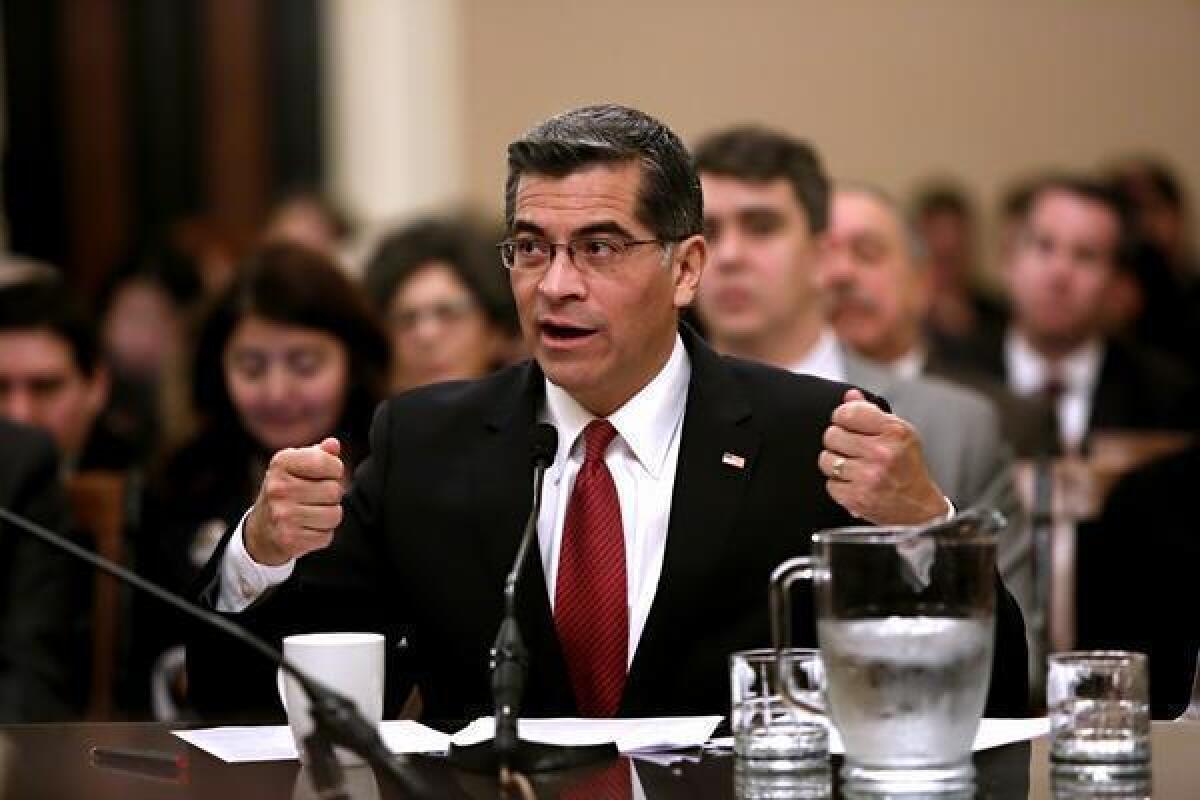
Atty. Gen. Xavier Becerra said Wednesday he has filed an amicus brief supporting San Francisco’s court challenge to President Trump’s order targeting so-called sanctuary cities and counties that refuse to enforce federal immigration laws.
The move marks a half-dozen times the state has filed briefs supporting legal challenges to various Trump orders. Last week, Becerra filed papers supporting a lawsuit by Santa Clara County.
That case and San Francisco’s challenge the legality of the Trump administration’s threats to withhold federal funds from states and local jurisdictions that the administration deems to be “sanctuary jurisdictions.”
Becerra’s brief cites California’s interest in protecting state laws and policies that ensure public safety and protect the constitutional rights of its residents.
“Threatening to take away resources from sheriffs and police officers in order to promote misguided views on federal immigration policy is reckless and puts public safety at risk,” Becerra said in a statement. “It is the right and responsibility of California and each state under the Constitution to determine how it will provide for the safety and general welfare of its residents and to safeguard their constitutional rights.”
Los Angeles Mayor Eric Garcetti asks the federal government to define a ‘sanctuary city’
Amid a new call from the Trump administration to cut off federal funds to so-called sanctuary cities, Los Angeles Mayor Eric Garcetti and LAPD Chief Charlie Beck had a question for the head of Homeland Security on Wednesday: What exactly is a sanctuary city?
Garcetti and Beck joined a bipartisan handful of mayors and law enforcement leaders from across the country in Washington to air their concerns about President Trump’s recent executive orders on immigration to Homeland Security Secretary John F. Kelly.
Los Angeles is among the jurisdictions — often called sanctuary cities — that don’t assist with federal immigration enforcement. State and local leaders in California have said they will continue to protect people in the country illegally despite the Trump administration’s threats.
After the closed-door meeting, mayors and police chiefs said their main request for Kelly was for a firm definition of what the federal government considers a sanctuary city.
“We think that as long as we’re complying with federal law then we shouldn’t be labeled with whatever label intimates that we’re not,” Beck said. “We’re looking for clarification; we are looking to be involved in the conversation so that decisions aren’t made that affect us without our input.”
Homeland Security spokesman Dave Lapan said the department is working on a definition but does not have a timeline for when it would be finalized.
Although there is no legal definition of the term, the administration has seemed to define sanctuary jurisdictions as ones that don’t comply when Immigration and Customs Enforcement asks them to detain prisoners after they have served their sentences so they can be picked up for deportation.
Multiple federal courts have said the detainer orders differ from an official warrant and are not legal justification for holding someone who has served his or her sentence or is no longer under arrest.
Los Angeles is one of several cities in California that does not hold people for immigration officials without a warrant, and Garcetti said that is going to continue.
“We see it as abiding by the Constitution, because there is case law that says we can’t hold people for longer than permitted,” Garcetti said after the meeting.
Lapan said the Department of Homeland Security is working on ways to address concerns about the legality of holding someone for immigration officials, as well as the concerns of mayors of cities that have laws instructing law enforcement officers not to comply with immigration officials.
“Part of having this discussion is to find out, ‘How can we get around this?’” Lapan said. “If we are dealing with a criminal alien, somebody who is both in the country unlawfully and has committed crimes, the best place for us to take them into custody is in a jail or prison. That’s the safest for everyone, both our officers and the communities.”
Garcetti also disputes the administration’s assertion that it can withhold federal funds from cities that don’t comply with ICE orders. Garcetti pointed to a 2012 Supreme Court decision that said the government couldn’t withhold Medicaid funds if states chose not to expand access to the program under the Affordable Care Act.
“I think we all feel on very strong constitutional and legal footing that it was decided in the Obama administration you can’t put a legal gun to the head, a financial gun to the head of jurisdictions, whether it’s states or localities, and take their money if you don’t agree with what they are doing in a different area,” he said.
Garcetti invited Kelly to visit Los Angeles. “We need to make sure that we also are showing the perspectives of everyday people in cities like Los Angeles,” he said.
Garcetti also attended California congressional Democrats’ weekly lunch and met privately with House Minority Leader Nancy Pelosi (D-San Francisco) and House Majority Leader Kevin McCarthy (R-Bakersfield) before appearing on an immigration panel hosted by House Democrats.
Anti-discrimination measure or blow to religious freedom? California bill sparks debate on employer codes of conduct
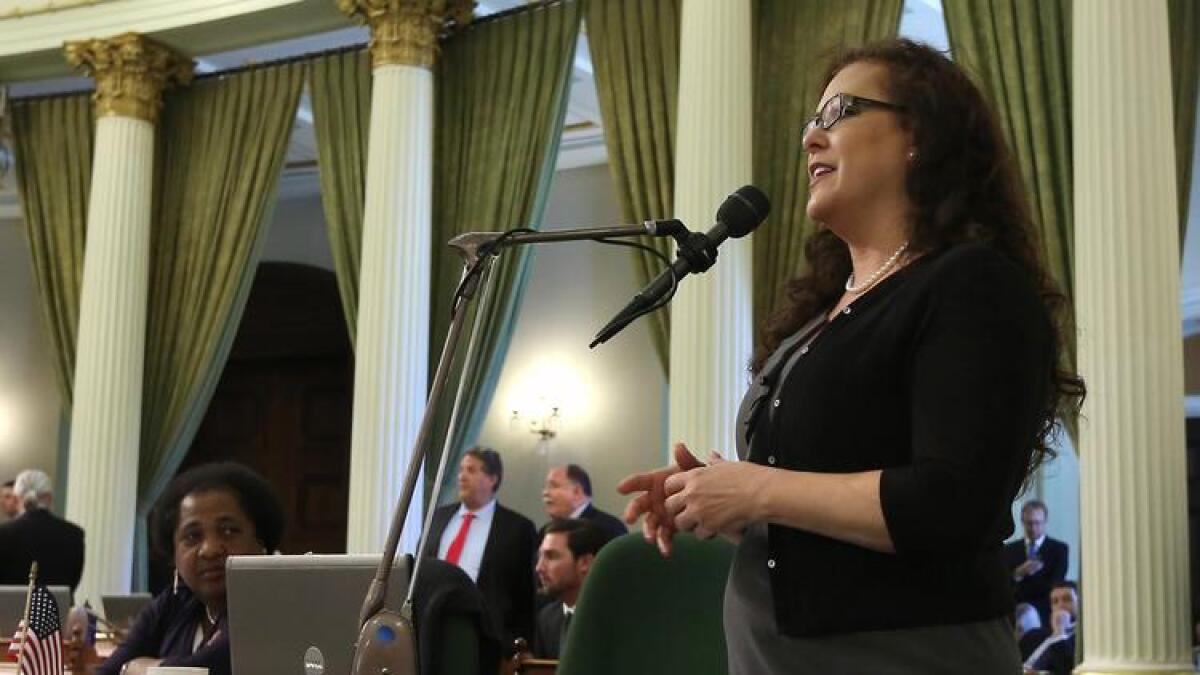
A measure that would bar employers from firing workers for having an abortion or giving birth to a child out of wedlock is getting pushback from religious groups who say such a bill would prevent them from requiring employees to act in accordance with their faith.
Under the bill by Assemblywoman Lorena Gonzalez Fletcher (D-San Diego), employers would not be able to discipline or fire workers for any reproductive health decision, such as pregnancy, in-vitro fertilization or abortion.
“What this bill does is make sure that people can make the best healthcare decisions for themselves and for their families without the fear that they’ll risk their livelihoods in doing so,” Rebecca Griffin of NARAL Pro-Choice California, a sponsor of the measure, said at a Wednesday afternoon hearing at the Capitol.
A teacher at a Christian college in San Diego was fired in 2012 for becoming pregnant while unmarried. The school said her pregnancy violated its employee code of conduct, which prohibited premarital sex. In 2015, San Francisco Archibishop Salvatore Cordileone sparked a backlash when he proposed a new morality clause in the faculty handbook and contract for local Catholic schools that opposed same-sex marriage and certain reproductive medical procedures.
With employees being fired for code of conduct violations in other states, proponents said California should set an example for the country,
“Right now, while we’re facing a federal government that is attacking reproductive freedom at every turn and condoning the type of discrimination that this bill prohibits, we feel like this is the time for California to take a stand for our values and make sure that our workers have the best protections possible,” Griffin said.
But the proposal faces opposition from religious groups, who argue such codes of conduct are integral to the relationship with their workers.
“The bill would specifically deny religious employers our 1st Amendment protections to infuse our codes of conduct with the tenets of our faith,” said Sandra Palacios of the California Catholic Conference.
The reaction from religious groups was not uniformly negative. The Rev. Rick Schlosser, executive director of the California Council of Churches, which represents mainline Protestant and Orthodox denominations, pointed to the diverse positions on reproductive issues among his group’s members to explain his support for the bill.
“Any legislation that limits people’s ability to make their own moral decisions is harmful to religious freedom,” said Schlosser.
But other religious groups said the measure threatened to undermine the very purpose of requiring their employees to abide by a code of conduct.
“An organization specifically chartered to support or oppose a specific set of beliefs or actions cannot fulfill its mission without requiring adherence to a code of conduct,” wrote Jonathan Keller, president of the conservative California Family Council, in an opposition letter.
Assemblyman Tony Thurmond (D-Richmond) asked why such codes of conduct should govern a personal decision an employee makes out of the workplace.
“Our community covenant does say that our employees are required to uphold our biblical values, and that certainly is a ‘round-the-clock priority for us,” responded Phillip Escamilla, the public policy chair of William Jessup University, a Sacramento-area evangelical Christian college
Gonzalez Fletcher, herself a practicing Catholic, said she was not trying to unfairly target religious institutions. But, she said, she was trying to combat an “inherent sexism” that comes with enforcing such codes of conduct.
A female employee’s reproductive decisions — such as entering an abortion clinic or being pregnant out of wedlock — can be seen by her employer, Gonzalez Fletcher said.
“A male’s decisions to whether or not they’re going to abide by a conduct never rise to that level,” she said. “So that inherent difference in how women and men are treated with these types of decisions just show how little privacy women are able to maintain.”
The bill, AB 569, cleared the Assembly Labor and Employment Committee, its first legislative threshold, on a 4-2 vote.
Gov. Jerry Brown, legislative leaders propose raising $5.2 billion annually to repair California’s roads and bridges

Acknowledging that the state’s transportation system has been neglected, Gov. Jerry Brown and legislative leaders on Wednesday announced a proposal to raise gas taxes and vehicle fees to generate more than $5 billion annually for repairing California’s crumbling system of streets, highways and bridges, as well as to increase mass transit.
It remains uncertain whether Brown will be able to muster the two-thirds vote in both houses of the Legislature needed to approve the new revenue sources, which include a 12-cent-per-gallon increase in the existing 18-cent base excise tax on gasoline.
The package also includes a new, annual vehicle fee that would average about $48 based on the value of the car. The package was announced at a news conference on the Capitol steps attended by Brown, Assembly Speaker Anthony Rendon (D-Paramount) and Senate President Pro Tem Kevin de León (D-Los Angeles).
California has not approved an increase in the base excise tax on gas for 23 years, according to Brian Kelly, secretary of the California State Transportation Agency. As a result, the state faces a $130-billion backlog of repairs to state highways and bridges and local streets.
“There is sizable money here to make things better,” Kelly said. “People are going to get improved neighborhood streets. They are going to get improved highways and bridges, more faith that they are traveling on safe structures. And we are going to invest to improve the congestion into our trade corridors and congestion on their commute.”
Assembly and Senate Republicans released a joint statement opposing the plan.
“Californians already pay some of the highest gas taxes in the nation,” the statement said. “The transportation proposal announced by the Capitol Democrats is a costly and burdensome plan that forces ordinary Californians to bail out Sacramento for years of neglecting our roads.”
Brown has set a deadline of April 6, the day before the Legislature leaves on its spring break, to have the new package voted on by lawmakers.
Because Republicans have generally opposed the tax increases, the package may need the vote of every Democrat to get the two-thirds majority for passage. Three Democratic senators had been holding off their support before the new plan was released.
Election officials say mistake on Korean language ballots substantially smaller than previously thought
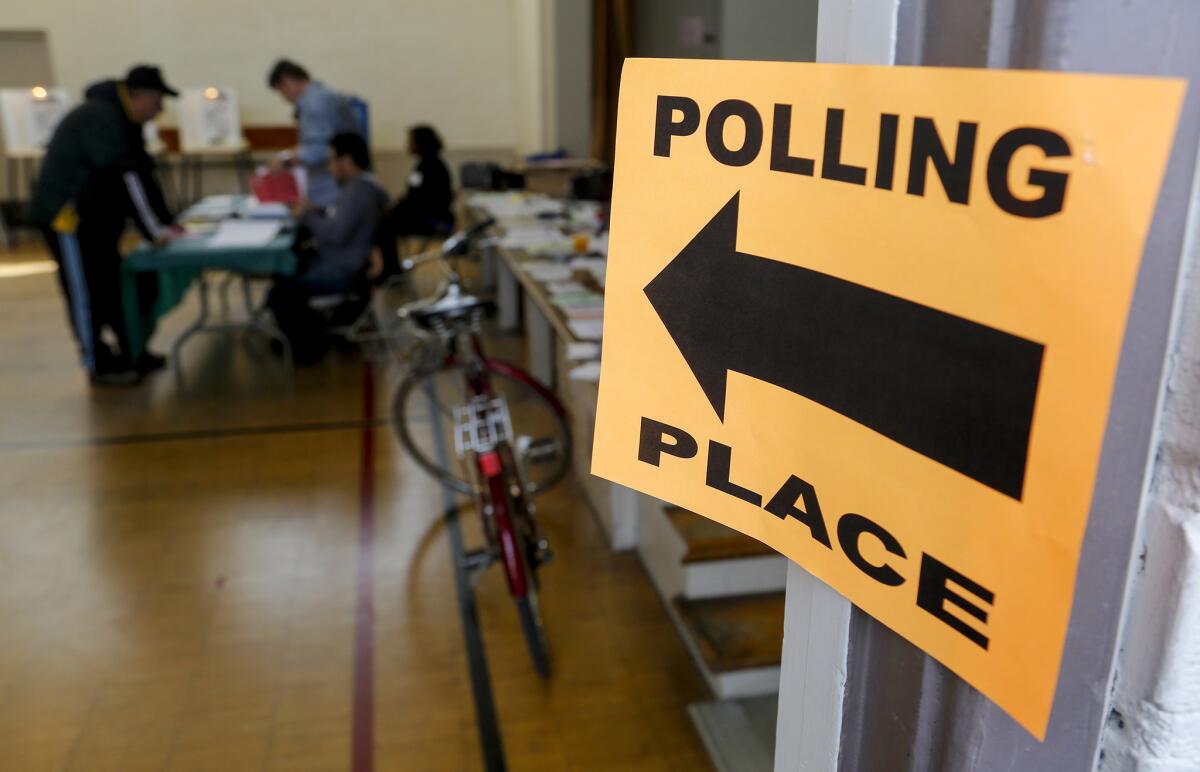
Los Angeles County election officials say a mistake made on Korean-language sample ballots in the upcoming 34th Congressional District race likely affected fewer than 780 voters.
The error, which listed the race’s 23 candidates in the wrong order on some Korean-language sample ballots, was discovered last week after Korean American voters pointed out their mail-in ballot materials looked different than English-language sample ballots sent to the same home or apartment building.
Initially, election officials said they didn’t know how widespread the problem was. As a precaution, they sent bilingual notices and corrected sample ballots to all 8,251 voters in the district who received Korean-language sample ballots. None of the sample ballots enclosed with actual mail-in ballots were affected, officials say.
In a letter to election officials and L.A. County supervisors Tuesday, the Korean American Coalition called it a violation of federally protected voting rights. The letter asked officials to host a 24-hour hotline for Korean-speaking voters until election day, provide more information on the scope of the error and extend the mail-in voting deadline for those who had received the misprinted ballots.
In a response sent Wednesday morning, County Registrar Dean Logan said the error was “limited to a small number of sample ballots in a single print run” of 777 sample ballots. Based on the agency’s review, Logan wrote, “it appears that substantially” fewer than the 777 voters were affected.
The registrar’s office says it is extending the hours of operation for its voter hotline and staffing it with Korean-speaking operators. Voters concerned that they may have been affected can call 1-800-815-2666 and select option 3 from 8 a.m. to 8 p.m. weekdays and 8 a.m. to 5 p.m. this weekend. Voters will also see additional signage at polls addressing the issue and Korean-speaking poll workers will be instructed to remind voters to check their ballots.
San Francisco Mayor Ed Lee picks his candidate in the 2018 governor’s race
Maxine Waters has some news for Bill O’Reilly: ‘I cannot be intimidated. I cannot be undermined.’
Rep. Maxine Waters appeared on MSNBC’s “All In With Chris Hayes” Tuesday night, and Hayes asked the California congresswoman if she had a response to Bill O’Reilly’s remarks that morning about her hair (or, as O’Reilly put it, her “James Brown wig.”) She did.
L.A. doctor jumps into the race for California’s lieutenant governor
Los Angeles physician Asif Mahmood, a Democrat and supporter of a “Medicare for all” national healthcare plan, has announced he’ll run for California lieutenant governor.
Mahmood, who was raised in a small rural town in Pakistan before coming to the U.S., plans to officially declare his candidacy Wednesday and joins a 2018 race that includes at least one formidable Democrat, West Covina state Sen. Ed Hernandez. Hernandez has collected more than 100 endorsements from prominent California Democrats.
Senate President Kevin de León also has filed an intention to run for lieutenant governor and has been busy raising campaign contributions, though it’s unclear whether he’ll actually jump into the race.
Several Republicans also have declared interest.
Mahmood’s campaign was first reported by the New York Times.
On his campaign website, Mahmood describes himself as a “triple threat” to President Trump, a Republican, because he’s a “Muslim immigrant from this great blue state of CA.”
Talks at Capitol focus on boosting California transportation funding by some $5.2 billion annually

With a deadline looming, Gov. Jerry Brown is winding up negotiations with legislators in hopes of reaching an agreement on a plan that would provide at least $5.2 billion annually for a transportation backlog that includes repairing California’s aging and crumbling system of streets, highways and bridges, officials said Tuesday.
Those close to the talks said an agreement on the package could be announced as early as Wednesday afternoon.
The question remains whether Brown and leaders can muster the two-thirds vote needed to approve a phased-in gas tax increase of up to 12 cents by the April 6 deadline set by the governor. Key senators remained uncommitted to any plan as of Tuesday.
And a new voter-approved rule requires a bill to be in print for 72 hours before it can be passed. The bill needs approval in both houses.
Assembly Democrats were briefed on the evolving plan behind closed doors on Tuesday and some officials, speaking on condition of anonymity because they were not authorized to comment, said talks are progressing on a plan that would provide the bulk of money to a “fix-it first” program of road repairs divided evenly between state projects and those of cities and counties.
Money would also be dedicated to mass transit, bicycle, pedestrian and trucking routs for ports.
The proposal also would include reforms proposed by lawmakers, including Republicans, that would hold officials accountable for proper use of the money, including a requirement for regular audits, creation of an inspector general position and a ballot measure requiring new money to be spent on transportation projects.
Sen. Josh Newman (D-Fullerton) authored a bill that would put a measure on the ballot, saying Tuesday such guarantees are required “given the urgency of the deferred maintenance backlog, and the additional burden we are asking California’s taxpayers to carry.”
John Myers contributed to this report.
ICE director Thomas Homan: ‘We don’t get to pick and choose what we enforce’
Crowd of protesters spills outside community forum on immigration in Sacramento
Over loud boos, Sacramento County Sheriff Scott Jones orders removal of protester from immigration forum
State Senate leader Kevin de León, Sacramento Mayor Darrell Steinberg speak outside immigration forum
Watch: U.S. Immigration and Customs Enforcement director attends community meeting in Sacramento
Protesters gather outside Sacramento community forum on immigration
Gov. Jerry Brown calls for ‘countermovement’ against Trump’s ‘colossal mistake’ on climate change
California Gov. Jerry Brown warned that President Trump has just made a “colossal mistake” in gutting the federal government’s effort to combat climate change, which will ignite a response Trump is unprepared to handle.
“It defies science itself,” Brown said in a call to The Times shortly after Trump signed an executive order that aims to bring an abrupt halt to the United States’ leadership on global warming. “Erasing climate change may take place in Donald Trump’s mind, but nowhere else.
“Yes, there is going to be a countermovement,” Brown vowed, predicting Trump’s actions will mobilize environmentalists in a way President Obama never could. “I have met with many heads of state, ambassadors. This is a growing movement. President Trump’s outrageous move will galvanize the contrary force. Things have been a bit tepid [in climate activism]. But this conflict, this sharpening of the contradiction, will energize those who believe climate change is an existential threat.”
Brown and other big-state governors and mayors are moving swiftly to fill the global leadership vacuum Trump created with Tuesday’s directive, which stops short of officially pulling the U.S. out of the Paris climate accord of 2015.
“I see Washington declining in influence, but the momentum being maintained by California and other states aligned with China and those who are willing to do something,” said Brown, who will be traveling to China soon for meetings on climate. “There is a growing activism on the part of millions of people who will not stand by and let Donald Trump effectively tear up the Paris agreement and destroy America’s climate leadership and jeopardize the health and well-being of so many people.”
In the face of Trump’s retreat on climate change, Brown said California will step up its own efforts to push others toward clean energy. “We are not fully meeting the challenge of climate change yet,” he said. “We are doubling down on our commitment. We are reaching out to other states in America and throughout the world and other countries. … We have plenty of fuel to build this movement.
“This is real,” Brown said of the threat created by climate change. “The nations of the world have recognized it in Paris. … I will continue doing my best to work with and rouse the world community, whatever the politicians in Washington do or don’t do.”
California and its allies hint at new legal battles over Clean Power Plan
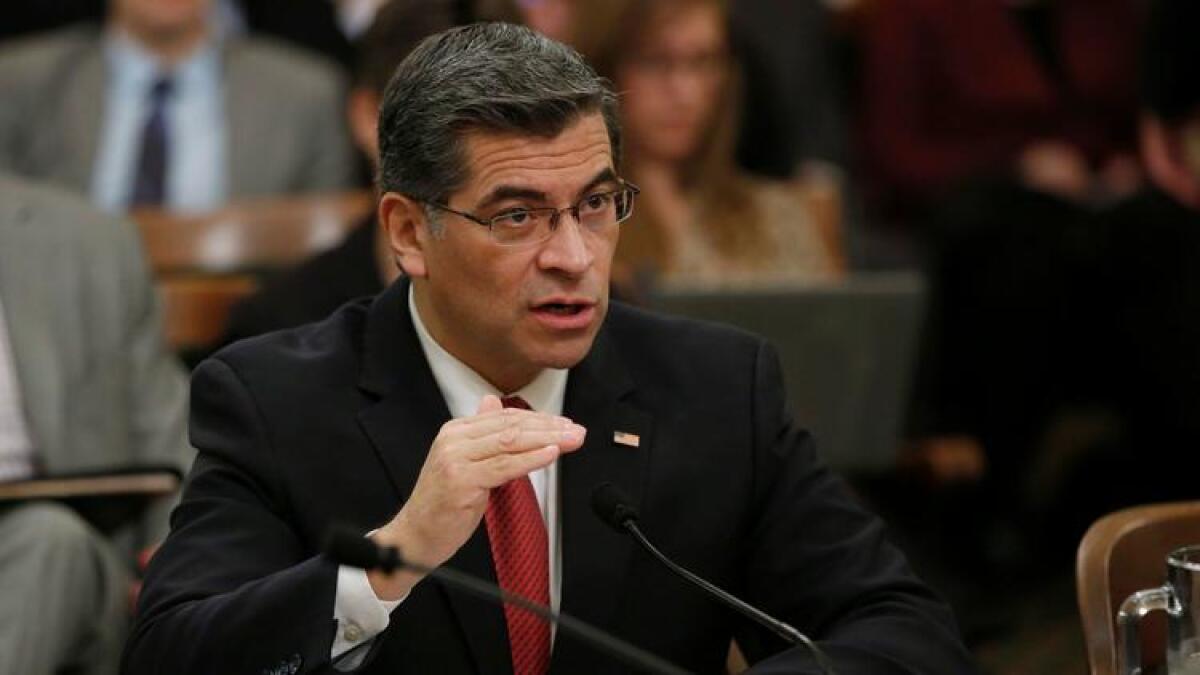
President Trump’s effort to roll back the Clean Power Plan could quickly run into legal challenges from California and its allies across the country.
State Atty. Gen. Xavier Becerra and his counterparts from states including New York, Massachusetts and Oregon said they “won’t hesitate to protect those we serve — including by aggressively opposing [Trump’s actions] in court.”
The joint statement was also issued by Chicago, Philadelphia, New York and other cities.
California’s stance isn’t surprising because the state joined Obama administration efforts to defend the Clean Power Plan in 2015.
Further legal action could underscore the determination of local and state governments to push forward with fighting climate change even as Trump withdraws federal regulations.
Meeting climate change goals will require billions for transportation and housing improvements, reports say
A major push to get Californians out of their cars and onto their feet, bikes and public transit is essential if the state wants to meet its aggressive goals to cut greenhouse gas emissions 40% below 1990 levels by 2030, according to new reports from the state and UC Berkeley researchers.
Californians will have to drive an average of 1.6 miles less a day — and regional government agencies believe it will cost billions of dollars to make the mass transit and housing improvements needed for that to happen. UC Berkeley researchers argue in a new study that a boom in dense housing across the state will bring major greenhouse gas reductions and economic growth.
California expects to be unscathed as Trump targets Clean Power Plan

Although California’s leaders may protest President Trump’s announcement Tuesday that he’s scrapping the Clean Power Plan, his decision is expected to have little effect on a state already marching toward renewable energy.
In fact, greenhouse gas emissions from electricity generation in the Golden State are already below what the federal government would have required by 2030, and they’re expected to drop even further.
“Rollback of the Clean Power Plan is pretty much irrelevant to California,” said Frank Wolak, a Stanford University economist who has advised state leaders on climate regulations.
The federal rules, enacted by former President Obama as part of his campaign against climate change, were intended to push states away from coal and toward cleaner energy sources. But that was already underway in California. Los Angeles, one of the last places in the state to rely on coal, was already planning to stop importing electricity from out-of-state coal plants by 2025.
In addition, state law requires California to generate half of its electricity from renewable sources such as solar and wind by 2030, and state Senate leader Kevin de León (D-Los Angeles) has suggested pushing even further.
When it comes to fighting pollution and climate change, there are some areas where California relies on the federal government. For example, they share authority on regulating vehicle emissions, and Trump’s preparation to roll back federal rules has caused alarm here. However, there’s less of a concern when it comes to generating electricity.
Trump’s moves have caused some anxiety among California companies that are developing clean energy technologies and looking for new markets to sell them.
Bob Keefe, executive director of Environmental Entrepreneurs, said the Clean Power Plan would have been “a huge economic catalyst.”
“President Trump is basically telling California’s more than 40,000 clean-energy businesses and the 500,000 workers they employ that they don’t matter to him,” he said.

It’s an open question how Trump could affect various efforts for California to integrate its electricity grid with neighboring states, an idea that has failed to gain traction so far. Advocates of the concept say regional cooperation could expand the market for renewable energy, but the lack of federal pressure to cut emissions could dampen enthusiasm in places such as Utah and Wyoming, which rely on coal.
“They don’t have the Clean Power Plan bearing down on them,” said Don Furman, who directs the Fix the Grid campaign that’s seeking closer relationships among West Coast states.
Ralph Cavanagh, an attorney at the Natural Resources Defense Council, said he doesn’t expect changes to the Clean Power Plan to harm efforts to create a regional electricity grid, because of the falling cost of renewable energy.
“The rationale is stronger today than it was yesterday,” he said.
California GOP lawmakers introduce bills to boost healthcare and jobs for veterans
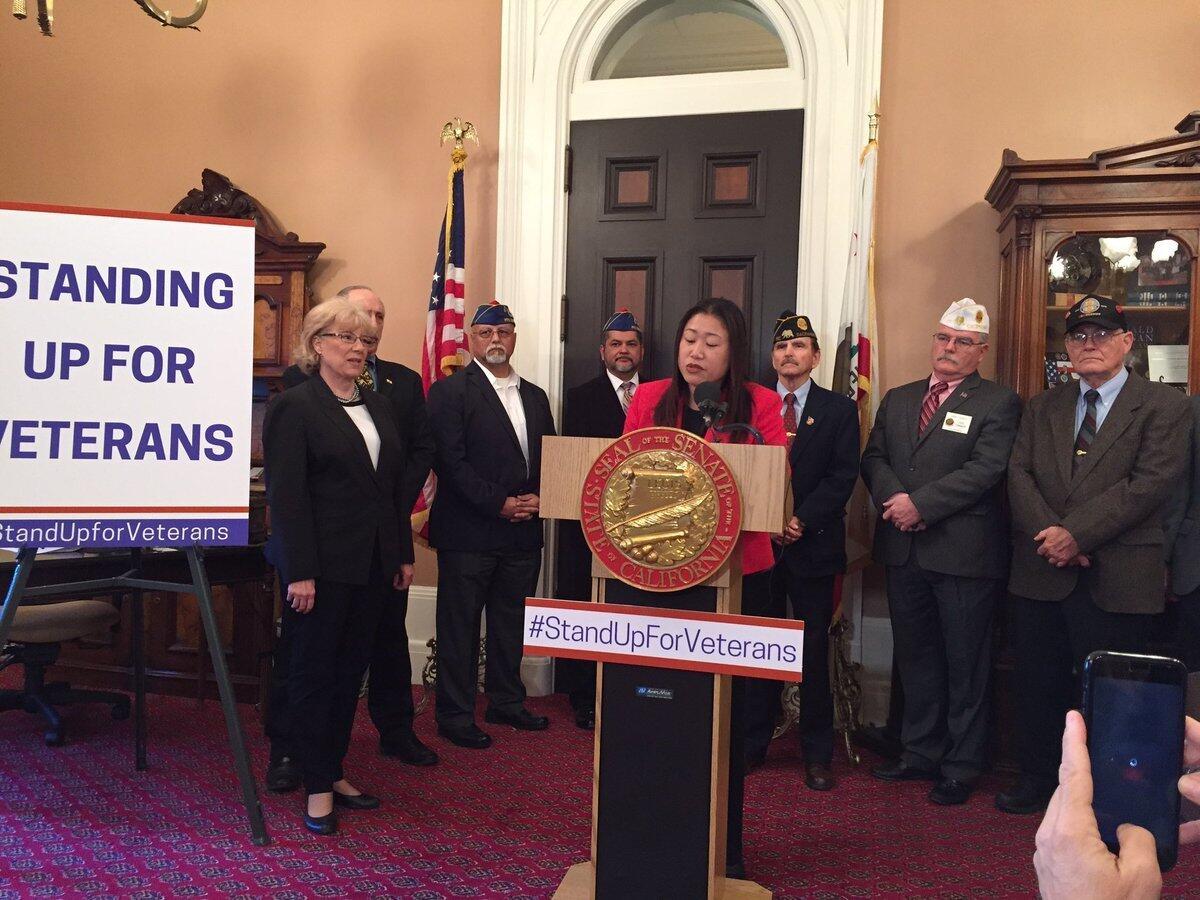
Republican state lawmakers unveiled a package of six bills Tuesday aimed at improving job training and healthcare services for California veterans.
“Our veterans have served this country bravely and it is only right for us to recognize their contribution and see that when they do come home they receive the care and assistance they deserve,” said state Sen. Janet Nguyen of Garden Grove, who authored three of the measures.
The six bills are:
- Senate Bill 410 from Nguyen and Assembly Bill 353 from Assemblyman Randy Voepel of Santee, which would expand hiring preferences. for veterans.
- SB 409 from Nguyen and SB 485 from state Sen. Jim Nielsen of Gerber, which would increase mental health services and oversight at state veterans’ homes.
- SB 411 from Nguyen, which would pay some military reservists $100 a month once they turn 50 if they’ve served for 10 years or more.
- SB 197 from Sen. Pat Bates of Laguna Niguel, which would waive state and local sales taxes for nonprofits that donate facilities to the U.S. Department of Defense — a measure aimed at helping construction of a mental health care facility at Camp Pendleton in San Diego County.
These Los Angeles girls went to Capitol Hill to ask the Senate to fight new immigration enforcement efforts
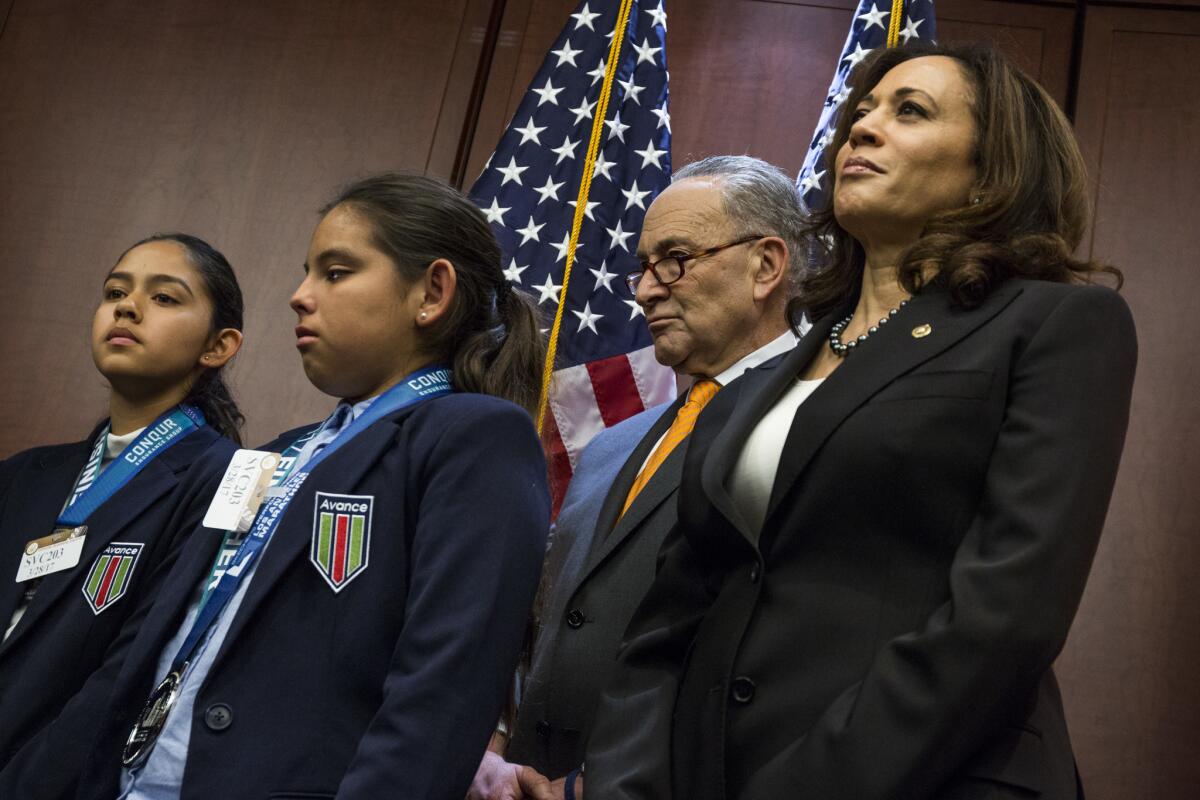
Fatima Avelica, 13, was training for the Los Angeles Marathon with her father before he was arrested by immigration agents last month after dropping Fatima’s sister off at her Lincoln Heights school.
Fatima had to pause repeatedly, pressing her fingers to her eyes, as she told the story to reporters at a news conference in the Capitol on Tuesday. Sen. Bob Menendez (D-N.J.) handed handkerchiefs to Fatima and her sister Yuleni Avelica, 12. The girls had medals from completing the marathon dangling around their necks.
Democratic senators held the news conference to urge their Senate colleagues to reject President Trump’s request for $3 billion to hire thousands of new immigration agents, expand detention facilities and build a wall among the southern border as part of his pledge to deport millions of people in the country illegally.
The White House has characterized the moves as necessary for public safety.
California’s Democratic Sen. Kamala Harris said Trump’s immigration enforcement orders are too broad, sweeping up nonviolent offenders or people accused of the civil offense of being in the country illegally. She called the executive orders, which vastly broadened who can be targeted for deportation and leaves a lot of discretion to local immigration officials “misguided and misinformed.”
“It’s irresponsible to paint a whole population of people as racists and murderers and ‘bad hombres,’” she said, referencing one of Trump’s own lines about immigrants. “It’s actually ignorant and we can’t afford to run our country that way.”
The girls’ father, Romulo Avelica-Gonzalez, a Mexican citizen, has lived in the U.S. for 25 years. ICE officials cited two misdemeanor convictions as the reason for his arrest. His four daughters were all born in the U.S. Fatima said the family is waiting for word every day on whether he will be deported.
Fatima said she now wants to become an immigration lawyer.
“It’s like a new marathon for me, and I know I can finish it,” Fatima said, tears welling up again. “But, I need my coach there. I need my dad.”
Gov. Jerry Brown, New York Gov. Andrew Cuomo blast President Trump on climate change
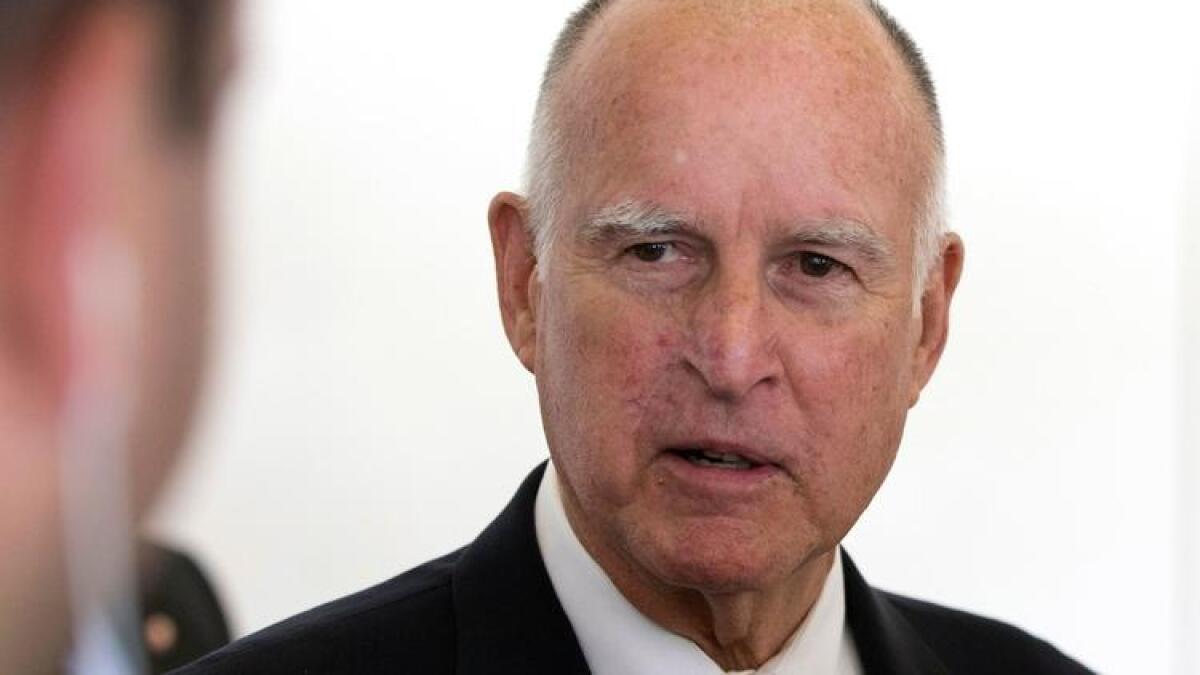
Gov. Jerry Brown joined with New York Gov. Andrew Cuomo on Tuesday to criticize President Trump’s pending announcement to roll back climate regulations and insist that their states will push forward anyway.
“Dismantling the Clean Power Plan and other critical climate programs is profoundly misguided and shockingly ignores basic science,” they said in a joint statement. “With this move, the Administration will endanger public health, our environment and our economic prosperity.”
Brown and Cuomo represent the two largest states with the most ambitious goals for fighting global warming, and they’ve already set equivalent targets for reducing greenhouse gas emissions. They’re also pushing to generate half of all their electricity from renewable sources by 2030.
“With or without Washington, we will work with our partners throughout the world to aggressively fight climate change and protect our future,” Brown and Cuomo said.
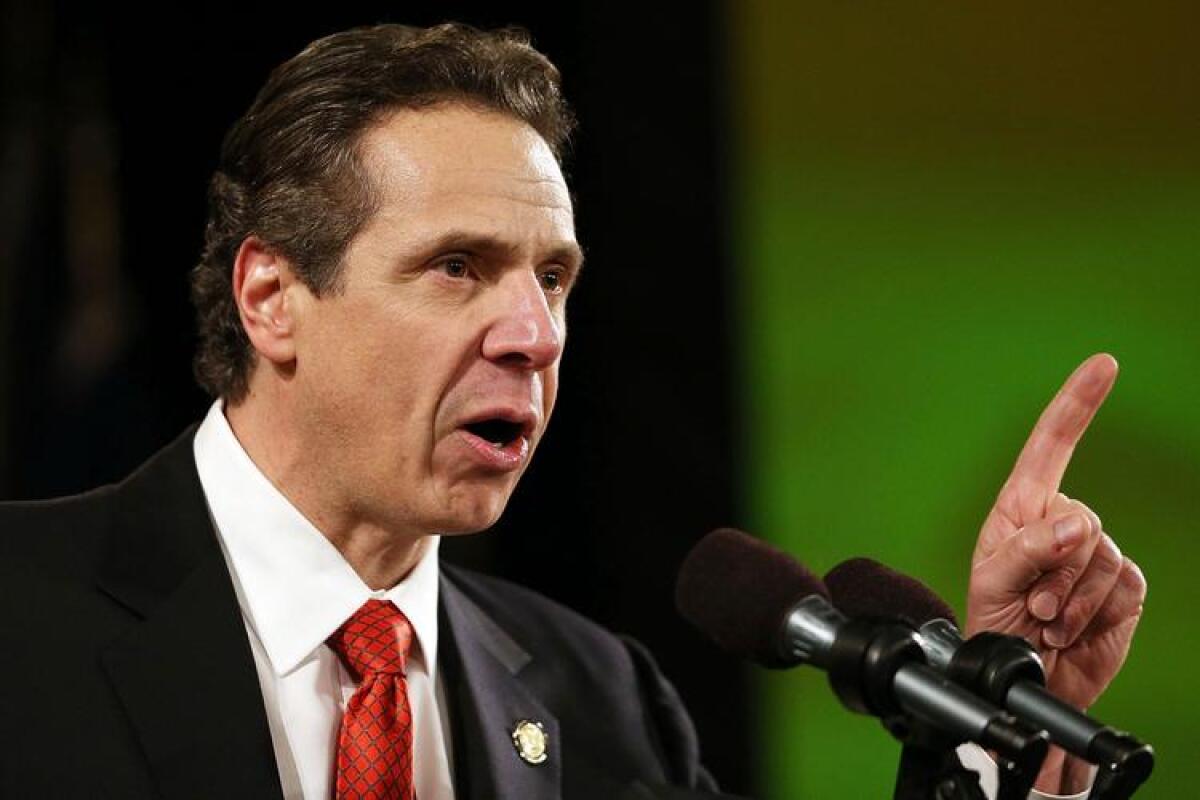
To stem rising prices, a California lawmaker is taking on how hospital chains craft their contracts
Amid concern that sprawling hospital chains are leading to higher prices, a California state senator is trying to clamp down on how hospital networks craft their contracts to win market dominance.
Sen. Bill Monning (D-Carmel) is offering a measure that would prohibit hospitals from certain contracting practices he sees as anti-competitive, such as requiring health plans to contract with all affiliates of the hospital or mandating that health plans agree to binding arbitration for antitrust claims.
“We’ve lost a level of transparency that’s affected affordability and access and fairness,” Monning said in an interview.
Multi-hospital chains are becoming prominent throughout the country, with proponents saying such mergers make care more efficient and better coordinated.
But a recent USC study found that while hospital prices in California have grown overall, the costs are higher in the state’s largest chains.
“Once you control a market, you can artificially increase costs,” said Monning, adding those higher prices can spill over to neighboring hospitals, too.
Competitors think “if they can charge this much for a hip replacement, we’re going to as well,” Monning said.
Another study by the Bay Area Council Economic Institute found premiums in Northern California were 30% higher than those in Southern California, in part because of the dominance of a few healthcare systems in the north.
Micah Weinberg, the institute’s president, said hospital consolidation was a logical issue to look at, particularly because healthcare coverage expansion under the Affordable Care Act is now under less threat from Congress following the failure of the House Republicans’ replacement bill.
“We have to double down on the real work, which is getting people access to quality healthcare and affordable costs,” said Weinberg. “One of the biggest barriers to that is the lack of competition among healthcare providers.”
Weinberg said much of the question is a matter of federal antitrust enforcement.
“It’s really difficult to do things at the state level that are effective here,” he said.
Still, consolidation has increasingly come under scrutiny in California. The state attorney general’s office under Kamala Harris, now serving as U.S. senator, investigated consolidation of hospital and physician groups, and the effect on consumer prices.
Last year, the healthcare trust for the United Food and Commercial Workers union, sued Sutter Health, alleging antitrust violations.
The Pacific Business Group on Health, an organization that represents major companies such as Wells Fargo and Chevron, also raised alarms on Sutter’s requirement that firms use arbitration to resolve disputes--or face higher rates for Sutter’s healthcare services. The business group is a supporter of Monning’s bill, as well as the California Labor Federation.
The California Hospital Assn. has not taken a position on the bill.
------------
FOR THE RECORD
March 29, 2017, 1:52 p.m.: A previous version of this article reported that the Pacific Group on Health sued Sutter Health. The United Food and Commercial Workers healthcare trust filed the suit.
Wendy Carrillo gets nod from Standing Rock Sioux leader in L.A.’s congressional race
Los Angeles assemblyman returns to work in Sacramento after more than two-week absence
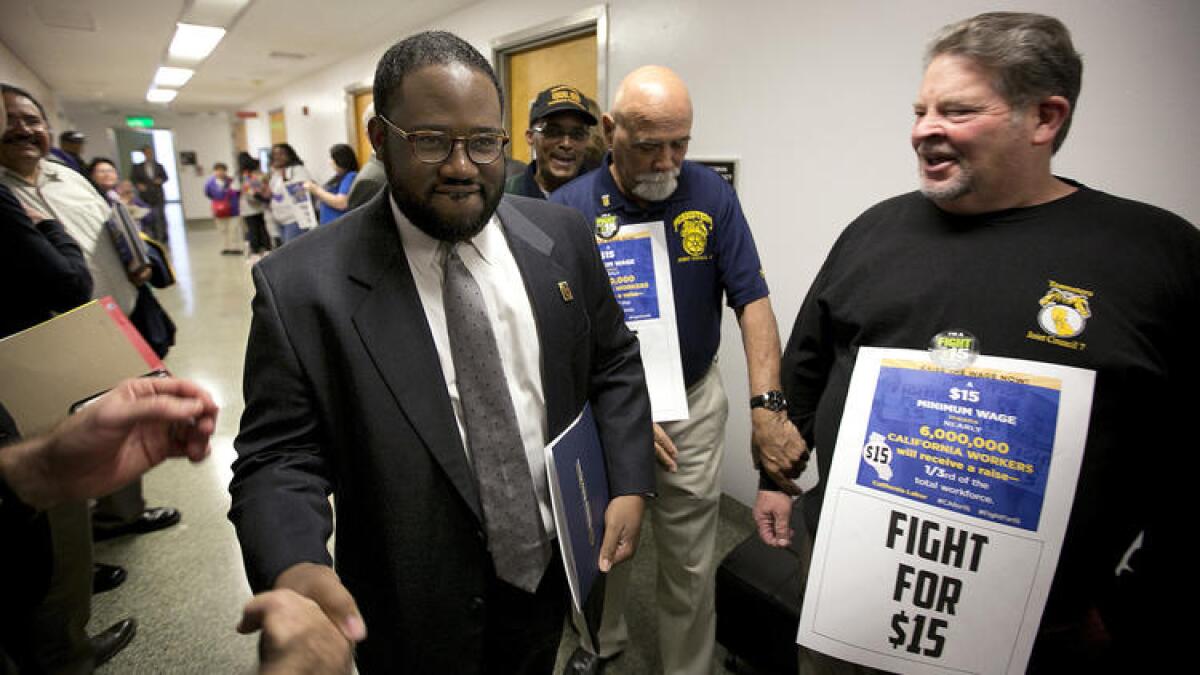
After more than two weeks away from the state Capitol, Assemblyman Sebastian Ridley-Thomas (D-Los Angeles) was back at work Monday, with his staff blaming the absence on unspecified medical reasons.
“I’m not going to comment on what the illness was,” said his chief of staff, Darryl Lucien, who added that the legislator was “feeling better” Monday.
Ridley-Thomas, 29, was not available for an interview to discuss his absence.
He originally went on leave March 7. At the time, he did not specify an illness and so Assembly Speaker Anthony Rendon’s office considered him to be on personal leave. Under legislative rules, those absences did not allow him to receive per diem payments — a subsidy intended to offset the costs of traveling and living in Sacramento.
On March 21, he informed Rendon’s office that he was on medical leave, thus becoming eligible for the $183 per diem.
Lucien said the original personal leave request was an error and that all of Ridley-Thomas’ time away from work was for health reasons.
“It’s medical leave,” Lucien said. “He has a doctor’s note that was submitted, excusing him for the time he was out.”
Ridley-Thomas was not entirely absent from legislative work during that time. While on leave, he yanked one high-profile piece of legislation — a measure that would exempt tampons and other feminine hygiene products from sales tax — from a hearing in the Assembly Revenue and Taxation committee, which he chairs.
The bill’s author, Assemblywoman Cristina Garcia (D-Bell Gardens), said she spoke directly to Ridley-Thomas about a request to amend her bill days before that committee hearing.
Lucien said Ridley-Thomas was working “on a very limited basis,” fielding calls from members “to the extent he was able to speak with them.”
A fellow Democrat, Assemblyman Bill Quirk of Hayward, stepped in to chair the Revenue and Taxation panel during a March 13 hearing. A subsequent hearing on March 20 was canceled.
L.A. Councilwoman Nury Martinez endorses Sara Hernandez in 34th Congressional District
Adam Schiff calls on Devin Nunes to remove himself from Russia investigation
Rep. Adam B. Schiff (D-Burbank) on Monday urged fellow Californian Rep. Devin Nunes (R-Tulare) to remove himself from their investigation into Russian meddling in the 2016 election.
Before late last week, Schiff had gone out of his way not to be critical of Nunes throughout the fledgling investigation. They have held the top positions on the House Intelligence Committee for two years, and have served in Congress together for more than a decade.
“This is not a recommendation I make lightly, as the Chairman and I have worked together well for several years; and I take this step with the knowledge of the solemn responsibility we have on the Intelligence Committee to provide oversight on all intelligence matters, not just to conduct the investigation,” Schiff said in a statement.
Nunes last week surprised many when he told reporters that conversations between Trump and his transition team may have been accidentally picked up during legal intelligence gathering. Nunes briefed the media and President Trump before informing his committee.
A spokesman for Nunes, who was a member of Trump’s transition team, said Monday he obtained the information from a source on White House grounds, which raised even more questions. Nearly a week after Nunes’ announcement, committee members still haven’t seen the evidence, Schiff said.
“There was no legitimate justification for bringing that information to the White House instead of the committee. That it was also obtained at the White House makes this departure all the more concerning,” Schiff said.
Nunes’ spokesman would not comment on calls for the chairman to recuse himself.
House Democrats have called for an entirely independent investigation, but short of that were coalescing around the call for Nunes to step aside.
Among others, Schiff’s Intelligence Committee colleagues Reps. Jackie Speier (D-Hillsborough) and Eric Swalwell (D-Dublin) have also called for Nunes to step aside from the investigation.
The House and Senate intelligence committees are both investigating allegations that Russia tried to interfere with the presidential election and what, if anything, the Trump campaign knew about it.
“So far, too many people in the White House and administration, and now the chairman of the House Intelligence Committee, have betrayed their duty to conduct an independent, bipartisan inquiry into the Trump team’s ties with Russia,” Swalwell said in a statement. “Chairman Nunes should no longer be anywhere near this investigation, let alone leading it.”
House Minority Leader Nancy Pelosi (D-San Francisco) said in a statement that Nunes had “tarnished” the chairmanship. She also said it was “long overdue” for House Speaker Paul D. Ryan (R-Wis.) to ask him to recuse himself from the investigation.
Blasting federal action on immigration, California’s chief justice warns the rule of law is under threat
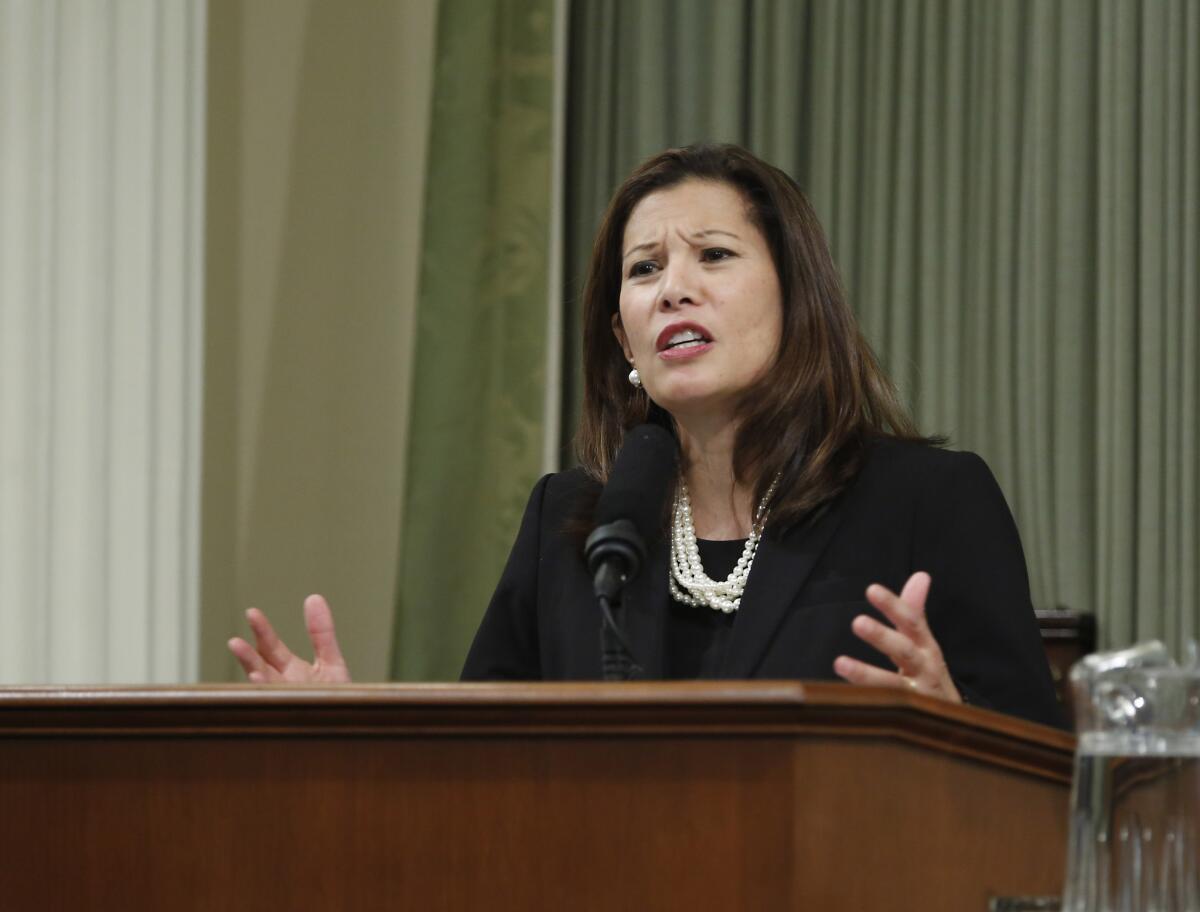
California Supreme Court Chief Justice Tani G. Cantil-Sakauye did not mention President Trump by name in her annual State of the Judiciary speech Monday, but she blasted federal actions on immigration and warned that the rule of law in the state is under threat.
In addressing the Legislature, she also called on members to end years of underfunding of the state court system.
The chief justice said the rule of law has failed repeatedly in the state, including when her husband’s parents were among 120,000 Japanese Americans put in internment camps during World War II.
“Simply put, the rule of law means that we as a people are governed by laws and rules, not by a monarch,” she said.
People take the rule of law for granted until it is under threat, she added.
“I submit to you today that the rule of law is being challenged,” she said. “We are living in a time of civil rights unrest, eroding trust in our institutions, economic anxiety and unprecedented polarization.”
Cantil-Sakauye cited a report by the Southern Poverty Law Center that California was home to 79 ethnic “hate groups” — more than any other state.
“Our values and our rules and laws are being called into question, and all three branches of government and the free press are in the crosshairs,” she said.
Without naming Trump, the chief justice criticized recent federal enforcement of immigration laws in which agents have gone into courthouses to take immigrants into custody.
She said it was concern over the rule of law that caused her to write to the U.S. attorney general and the Homeland Security secretary recently, asking them to refrain from conducting immigration raids at or near courthouses.
“When we hear of immigration arrests and the fear of immigration arrests in our state courthouses, I am concerned that that kind of information trickles down into the community, the schools, the churches. The families and people will no longer come to court to protect themselves or cooperate or bear witness,” she said. “I am afraid that will be the end of justice and communities will be less safe and victimization will continue.”
The chief justice also repeated her concerns about the lack of sufficient funding for the judiciary even as legislators are adding laws by the thousands.
“Since 2011 when I became chief justice, 6,408 bills have become law in California, while the judicial branch budget has been shrinking,” Cantil-Sakauye said. “I have said before that we are on the wrong side of justice when it comes to funding our courts.”
It’s not just Berniecrats: Korean voters could also swing L.A.’s congressional race in a big way

The crowded race to replace Xavier Becerra in the 34th Congressional District, which includes most of Los Angeles’ Koreatown, appears to be bringing Korean American voters out in large numbers.
That’s in part because in a field dominated by Latinos, Robert Lee Ahn has a shot at becoming the only Korean American in Congress and the first Korean American Democrat to be elected to the body.
Ahn, a businessman and former L.A. city planning commissioner, has raised a formidable amount of money in a short period of time, much of it from donors in the Korean American community. His campaign spent weeks helping register voters at Koreatown malls and restaurants, and says they registered more than 600 new voters so far.
“Part of our campaign is to build awareness and get the community more civically engaged,” Ahn said on a recent Friday morning as his campaign embarked on a 34-hour voter registration drive outside the BCD Tofu House restaurant. “As a Korean American, obviously that’s a natural base of mine.”
Inside, Ahn shook hands with supporters and navigated the lunchtime rush to ask for voters’ support table side.
Some of it may be paying off. More than a quarter of the 10,841 mail-in ballots turned in for the race so far were cast by Korean American voters, according to an analysis of surnames, birthplace and translated ballot materials by Political Data. Koreans make up just 6% of registered voters in the district. Nearly half of Korean American voters who have already cast a ballot in the race did not vote in the March 7 city elections.
Ahn, who has said he’ll bring a “business sensibility and common sense” to the office, says he has been running a campaign that reaches out to all kinds of voters. But the fact that there hasn’t been a Korean American in Congress for more than 20 years means his candidacy has gotten plenty of attention from the Korean American press.
“I think people recognize the importance and historic nature of this election,” Ahn said. “I think there’s a hunger for a voice ... and there’s a palpable frustration of not being heard, not being properly represented, and I think that’s what we’re seeing in the early returns.”
But the result of those early votes so far is unclear, particularly after elections officials disclosed that a number of Korean-language sample ballots had been misprinted with the candidates listed in the wrong order. Those who used the faulty sample ballots to cast their vote could have inadvertently voted for a candidate they didn’t intend to support, and officials still don’t know how widespread the problem is.
Ahn isn’t the only Korean American candidate to energize the community in recent years. David Ryu, the first Korean American elected to the L.A. City Council, rode to victory in 2015 with the help of a wave of support from Koreatown leaders.
“I believe a political awakening is occurring in the Korean American community all over the nation, but especially here in L.A.,” said Joon Bang, executive director of the Korean American Coalition. “Our community is evolving and it’s beginning with understanding the power of their vote.”
‘Nothing short of blackmail’: California Senate leader denounces plan to cut funding from ‘sanctuary cities’
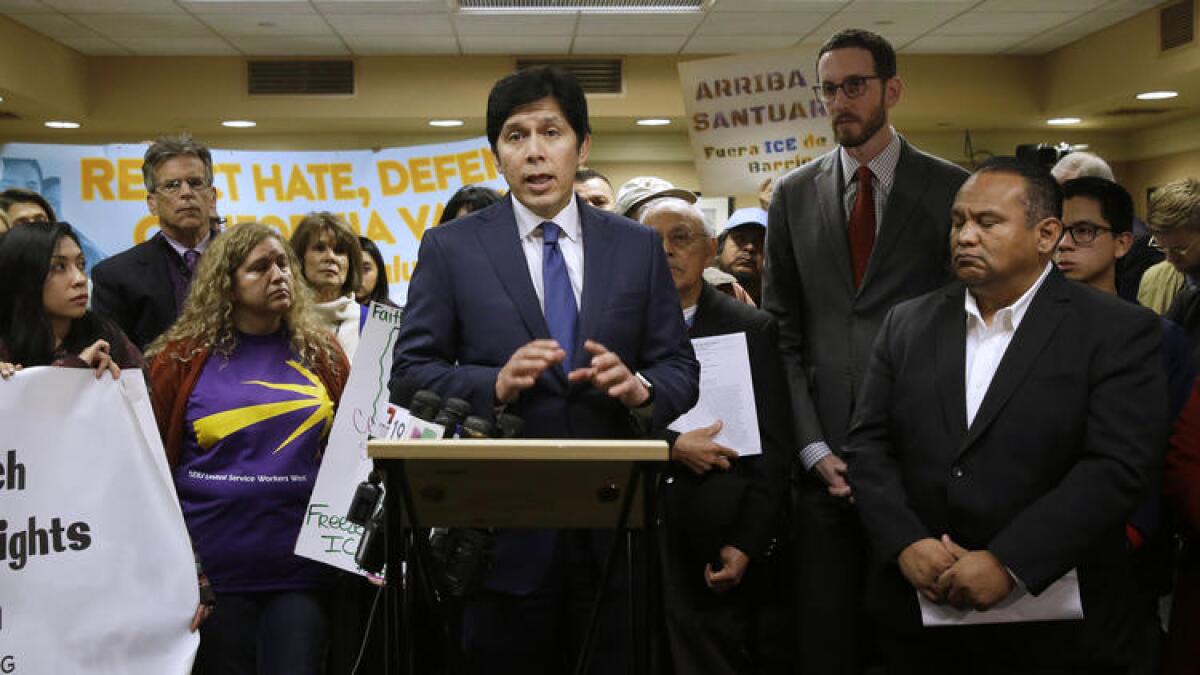
California Senate leader Kevin de León on Monday called U.S. Atty. Gen. Jeff Sessions’ move to cut federal funding from so-called sanctuary cities “nothing short of blackmail.”
In a statement, De León (D-Los Angeles) said Sessions and the Trump administration “stuck to alternative facts” when describing immigrants and sanctuary counties and cities, where local policies limit the cooperation of law enforcement agencies with federal authorities on immigration laws.
“Instead of making us safer, the Trump administration is spreading fear and promoting race-based scapegoating,” he said. “Their gun-to-the-head method to force resistant cities and counties to participate in Trump’s inhumane and counterproductive mass-deportation is unconstitutional and will fail.”
De León was responding to an earlier announcement made by Sessions at a White House press briefing. Sessions urged all states and local jurisdictions to comply with federal immigration laws and said it would be a condition for receiving federal grants.
State leaders are still calculating the fiscal impact of the move in California, where the Senate leader has filed a bill that would prevent state and local law enforcement agencies from using resources to enforce federal immigration laws.
California National Guard official tells legislators forced bonus repayments will be resolved by mid-summer
A top official for the California National Guard told state legislators Monday that he hopes lingering issues from the soldiers being forced to repay enlistment bonuses will be resolved by mid-summer.
A Times investigation last year found that the Pentagon demanded thousands of soldiers repay enlistment bonuses up to a decade after going to war in Iraq or Afghanistan.
The claw-back came after audits revealed vast overpayments of bonuses, due in part to mismanagement and pressure to hit enlistment targets. The Times story prompted outcry that soldiers, who were not at fault for accepting the bonuses, were now facing financial hardship.
Matthew Beevers, the deputy adjutant for the California National Guard, told a joint hearing of the Senate and Assembly Veterans Affairs committees that just over 1,000 soldiers currently hold debt due to the bonus recoupment.
Soldiers who are affected by the repayment demand must go through a federal waiver adjudication process, which Beevers described as “unnecessarily long, complex and resource-intensive.”
He said the state-run Soldier Incentives Assistance Center was working with those who need to navigate the complex process to get those debts waived.
“[If] you got a bonus and you completed your obligation and for some reason, you weren’t entitled to it, we’ve done everything we can do ensure that those soldiers get to keep those bonuses and we continue to do that today,” Beevers said.
Beevers said the state is trying to locate all soldiers who may be carrying debts due to the enlistment bonus. For those who complete the federal adjudication process, around 50% get their debts waived, he said.
“At the end of the day, there might be 600 or so soldiers out of 16,000 who might have to pay money, which is a very very small number,” he said.
Former California legislator Henry Perea will lobby for the oil industry in Sacramento
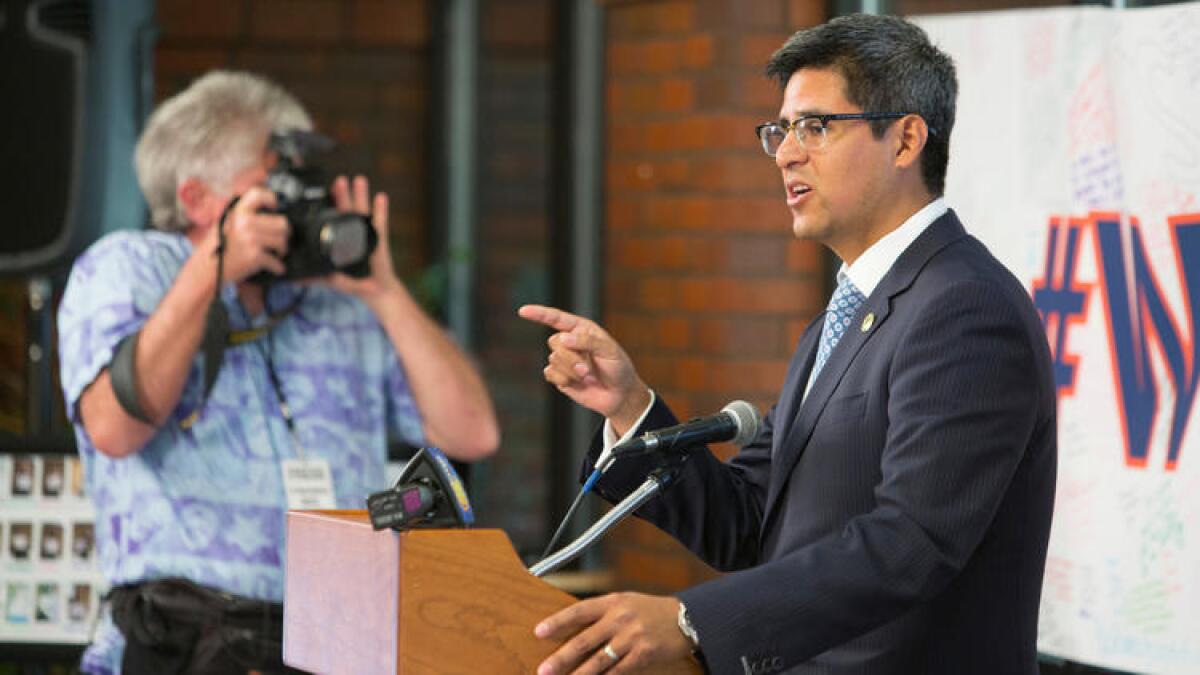
As lawmakers debate the future of California’s climate policies, the oil industry is boosting its lobbying firepower with a former Democratic assemblyman from Fresno who has bedeviled environmentalists in the past.
Henry Perea resigned his Assembly seat to work for a pharmaceutical group. Now he’s jumping to the Western States Petroleum Assn. as a senior vice president, a role he’s scheduled to start on May 1.
“Henry brings us unique expertise,” said a statement from Catherine Reheis-Boyd, the association’s president. “He understands our state, our industry and how smart public policy can ensure California’s continued leadership in environmental protections while maintaining a diverse, vibrant economy.”
While serving in the Assembly, Perea led the so-called moderate caucus of business-friendly Democrats. He played a key role in stalling 2015 legislation that would have created tough new targets for reducing oil consumption.
Environmentalists have made progress since then, successfully pushing through legislation to lower greenhouse gas emissions by 2030. Now these issues are being debated again as lawmakers consider whether to extend the state’s cap-and-trade program, which is intended to provide a financial incentive to reduce emissions.
The oil industry supports extending the program, but it’s working to ensure favorable terms and to loosen the state’s other regulatory plans.
Democrats out with ads targeting Rep. Mimi Walters for supporting GOP healthcare bill
Republicans didn’t vote on their plan to replace the Affordable Care Act on Friday, but Democrats already have ads out criticizing vulnerable GOP House members like Rep. Mimi Walters of Irvine for backing the bill.
The Internet ads, paid for by the Democratic Congressional Campaign Committee, will target 14 Republicans who voted for the bill in the House Budget, Ways and Means, and Energy and Commerce committees. The ads will run for at least a week on social media sites, including Facebook and Instagram.
“Walters knowingly voted for a bill to raise premiums and deductibles, slap an age tax on older folks, and rip insurance away from 24 million hardworking Americans. It’s critical that voters in California’s 45th District know where Walters stood on this harmful legislation,” DCCC Chairman Ben Ray Luján said in a statement.
Walters, who serves on the Energy and Commerce Committee, was one of the earliest supporters of the bill among the California Republican delegation.
“Rep. Walters is committed to improving and expanding healthcare choices, lowering costs and protecting taxpayers. Her votes in the House reflect those principles and she will not be deterred by campaign ads created in Washington, D.C., by Nancy Pelosi’s political committees,” said her campaign consultant, Dave Gilliard.
The DCCC has already announced plans to target Republican representatives of the seven California congressional districts that backed Hillary Clinton for president.
Clinton won Walters’ Orange County district by 5 percentage points. Walters was elected for a second term with 58.6% of the vote.
Gov. Jerry Brown says California won’t ‘be running to the courthouse every day’ to fight President Trump
With many of his fellow Democrats demanding multiple challenges to President Trump’s proposals, Gov. Jerry Brown said this week he will continue to support a more measured approach.
“We’re going to fight very hard. But we’re not going to bring stupid lawsuits or be running to the courthouse every day,” Brown said during an appearance Sunday on NBC’s “Meet the Press.”
“We’re going to be careful. We’ll be strategic.”
The governor’s interview, taped on Thursday in Washington, came at the end of a four-day visit where he sought common ground on issues ranging from transportation to disaster relief. Brown also took aim in a visit to Capitol Hill at the now-failed Republican healthcare proposal.
In the interview, Brown acknowledged that he is seeking a different path forward than California’s legislative leaders and other Democrats who are aggressively pushing back on a variety of Trump proposals.
“Well, if everything’s a lawsuit, yeah, we’re in trouble here. I do curb the exuberance on either side,” he said.
“People like to escalate. Republicans do that, and Democrats also do that. So I’m there somewhat as the senior statesman now, and I’m going to keep everything on an even keel.”
The governor used the national television interview to repeat recent suggestions that California has a number of projects that are ready to go should Trump make good on his promises to fund a major infrastructure effort. But Brown staunchly defended California’s acceptance of immigrants, including those who are in the U.S. illegally. He argued that immigration has been a major boon to the state’s economy and invoked the teachings of Christianity to criticize Trump and his fellow Republicans.
“Trump’s supposed to be Mr. Religious Fellow, and I thought we’ve got to treat ‘the least of these’ as we would treat the Lord,” said Brown, who trained to become a Jesuit priest in his youth. “So I hope he would reconnect with some of these conservative evangelicals, and they’ll tell him that these are human beings, they’re children of God. They should be treated that way.”
The program’s host, Chuck Todd, asked Brown whether he could offer national leadership for Democrats in the Trump era. The governor, who ran unsuccessfully for president three times, said he was willing to speak out in any way he could be helpful.
Following last week’s historic defeat of a bill to replace the Affordable Care Act, Brown also offered Trump advice on how to help the economically struggling states whose voters put him in the White House.
“It’s going to take some income support from the federal government,” the governor said. “It’s going to take healthcare. It’s going to take the kind of programs that the Republican Party traditionally doesn’t like. So here’s the dilemma. Yes, Obama was not able to help those people in the way they felt they had a right to. But Mr. Trump, now the burden is on you. And you better figure it out, or you’re not going to be there again.”
California Politics Podcast: Gov. Jerry Brown strikes a careful tone in Washington
As leader of a state where criticism of President Trump is a daily, if not hourly, occurrence, Gov. Jerry Brown carefully navigated the rough political waters of Washington during last week’s visit.
On this week’s California Politics Podcast, we discuss Brown’s effort to seek compromise where possible with Republicans in the nation’s capital while holding fast on issues like immigration and healthcare.
We also take a look at the potential high-stakes fight this spring over planned tuition hikes on Cal State and University of California campuses. And we discuss new statewide voter registration data showing a new low for the California Republican Party.
I’m joined by Times staff writer Melanie Mason and Marisa Lagos of KQED News.
‘Presidential credibility, once squandered, may never be fully regained’: Rep. Adam Schiff, in Democrats’ weekly speech
Rep. Adam Schiff (D-Burbank) on Saturday implored President Trump to be truthful, saying “presidential credibility, once squandered, may never be fully regained.”
Schiff, who had a busy week as ranking Democrat on the House Select Committee on Intelligence, used the weekly Democratic address to lay out details of the committee’s investigation into Russian interference in the 2016 election, but ended with a plea directly to Trump.
Americans and U.S. allies need to be able to believe Trump if he says there is an international crisis, such as North Korea placing a nuclear weapon on a ballistic missile, Schiff warned. He added that Trump has chosen “two superb people” in Defense Secretary James N. Mattis and National Security Advisor H.R. McMaster.
“Seek their counsel. Listen to what they have to say,” Schiff said. “And cherish the trust and hope that was placed in you by virtue of your office, by never again advancing claims that you know — or should know – are simply not true.”
The weekly address is delivered by a different member of the minority party each week and is meant as a response to the president’s weekly speech.
Small donations play big role in the 34th Congressional District

More than 17% of individual contributions to all candidates in the 34th Congressional District came in small donations of less than $200, according to the latest campaign finance reports.
The reports, which cover fundraising and spending between Jan. 1 and March 15, show that more than $250,000 of the $1.4 million raised by the candidates in the race came from un-itemized small donors, or those who gave less than $200 and are not named in campaign finance reports.
Three candidates who raised a significant chunk of money from small donations were Arturo Carmona, Wendy Carrillo and Kenneth Mejia, all of whom are vying for votes from supporters of former presidential candidate Sen. Bernie Sanders, who has preached the need to rid politics of special interest money.
Many of the candidates have sent email pitches to supporters asking for donations of $10, $20 or $27, the amount made famous by Sanders, who often cited the number as the average donation given to his presidential campaign.
Carmona, a former Sanders campaign advisor, raised the most in small donations, with $57,125, or 52% of his total. Small donors gave Carrillo $25,948, about 32% of her fundraising total and Mejia, an accountant and Green Party candidate, received nearly 90% of his total funds, or $31,957, in amounts of $200 or less.
Federal law does not require candidates to itemize, or report the names of, donors who give below that amount.
Alejandra Campoverdi raised $44,210 from small donors, who made up 28% of her haul, while Raymond Meza raised 48%, or $14,764 of his money from small-dollar contributions.
UPDATE:
7:45 p.m. This post was updated to clarify that the numbers reported are based on un-itemized donations of $200 or less to candidates.
Robert Lee Ahn raised the most money by far in latest campaign finance reports for L.A.’s congressional race
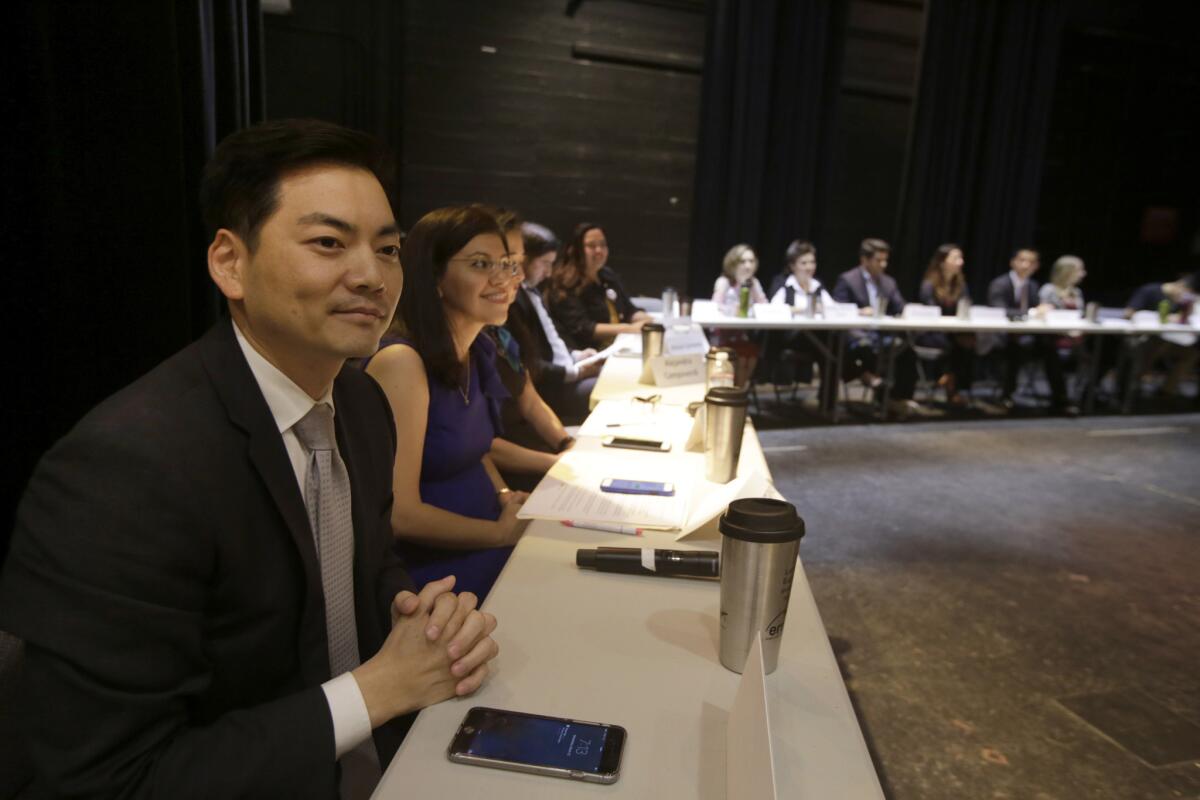
Congressional candidate Robert Lee Ahn far outstripped some of the top fundraisers in the 34th Congressional District, taking a surprise lead in campaign finance reports filed Thursday.
The reports cover fundraising and spending between Jan. 1 and March 15 and will be the last numbers we’ll have before the April 4 primary election, in which 24 candidates are running.
Ahn, a former L.A. city planning commissioner, raised a whopping $338,702 in contributions and loaned himself an additional $295,000, bringing his total to more than $630,000 raised since January. Ahn, an attorney and the only Korean American candidate in the race for a district that includes Koreatown, got more than $100,000 in contributions from donors with Korean surnames.
The closest behind Ahn was Assemblyman Jimmy Gomez, who raised $244,766 over the same period, the majority of it from political action committees, including many donations from fellow legislators in Sacramento. Sara Hernandez, a former teacher and L.A. City Hall aide, was close behind Gomez with $224,783 raised. Alejandra Campoverdi, a former White House staffer and former Los Angeles Times employee, raised $156,432.
Ahn has also spent the most money so far this year, at $352,538, and has $271,271 in the bank, more than any other candidate. Gomez ended the period with $274,830 cash on hand, while Hernandez and Campoverdi have $149,990 and $122,961 left to spend, respectively.
Dispute in California Senate leads to ethics complaint against leader Kevin de León
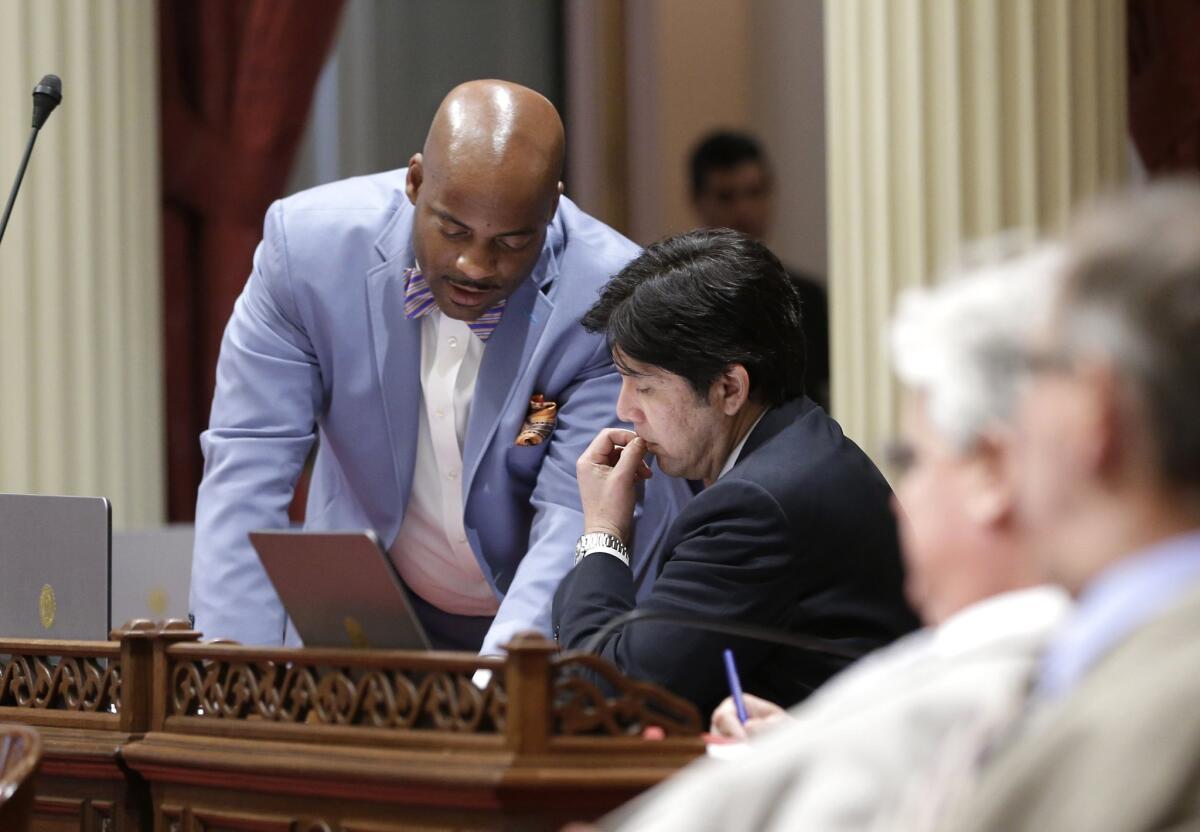
Republican state Sen. Andy Vidak on Friday filed an ethics complaint asking for an investigation into whether Democratic Senate leader Kevin de León engaged in an improper “cover-up” of threats allegedly made by former state Sen. Isadore Hall III against a group of farmers.
Anthony Reyes, a spokesman for De León, defended the decision not to investigate allegations against Hall.
“With due respect, the state Senate doesn’t waste taxpayer resources investigating dubious hearsay accounts of private conversations held in hotel lobbies — and that’s what Senator De León clearly and politely communicated to Senator Vidak,” Reyes said. “Any suggestion otherwise is patently ridiculous.”
Hall, a Democrat from Compton, was appointed in January to the state Agricultural Labor Relations Board by Gov. Jerry Brown. The appointment was opposed by farm industry groups, including the Western Growers Assn., which complained he received contributions from the United Farm Workers for his unsuccessful campaign for Congress last year.
Vidak said that he had heard from multiple people that on Feb. 28, the evening before Hall’s confirmation hearing in the Rules Committee, Hall allegedly made threats in an “obscenity-laced tirade” in the lobby of the Sacramento Hyatt Hotel that he would “get” the farmers opposing his appointment, the senator wrote in a letter to the Senate Legislative Ethics Committee.
The board is a quasi-judicial agency that rules on disputes between farm worker organizations and growers.
The alleged threats were made to four farmers who are members of the California Fresh Fruit Assn., Vidak said.
Vidak said he had formally asked De León, as chairman of the Senate Rules Committee, to have the panel investigate the allegations and report the findings to the Senate.
On Thursday, Vidak said, De León allegedly informed him that there would be no investigation.
“Senator De León told me yesterday that he and the leadership of the CFFA ‘have worked things out so Hall won’t be investigated,‘” Vidak said in a statement Friday. “Is this really how the Senate handles reports of threats and intimidation by someone pending a Senate confirmation vote?”
The association called the allegation that it worked out an agreement with De León “baseless and false.” The group said in a statement that Vidak did not talk to its members before he filed the complaint. “If he did, he would’ve learned there is no agreement and that CFFA remains opposed to the confirmation of Senator Hall,” the group said.
Hall declined to comment on Vidak’s complaint, said J. Antonio Barbosa, the board’s executive secretary, responding on his behalf.
“Further, his testimony at his Senate Rules Committee confirmation hearing makes clear that he will be fair and impartial, make sound decisions, and speak to growers and farmworkers,” Barbosa said.
Reyes disputed Vidak’s allegations.
“Chasing goofy conspiracy theories might fly on President Trump’s Twitter feed, but it has no place in the California Legislature,” Reyes said.
In his letter to the ethics panel, Vidak says his complaint is “that the Senate’s confirmation process of gubernatorial appointees may have been compromised in this situation.”
He asked for an investigation into whether “credible information about potential criminal activity by an unconfirmed gubernatorial appointee” has been “intentionally ignored/withheld,” and whether “a member of the Senate Rules Committee is making arrangements with representatives of private organizations to bury investigations of gubernatorial appointees.”
Updated at 4:40 p.m. to include a comment from the California Fresh Fruit Assn.
L.A.’s GOP congressman: ‘It is hard to find a consensus on something that impacts more than 1/6th of our economy’
A handful of California Republicans had declined to take a position on the House GOP’s healthcare bill, and now they won’t have to.
Rep. Steve Knight (R-Palmdale), the only Republican who represents L.A. County, said he was conflicted up until the vote on the bill was canceled Friday afternoon.
“In the past two weeks my colleagues worked to build a consensus on how best to repair our flawed healthcare system and build a patient-centered system that works for the American people,” Knight said in a statement after the vote. “We learned that it is hard to find a consensus on something that impacts more than 1/6th of our economy and the lives of almost every American.”
Saying they didn’t have enough votes to pass it, House Republican leaders canceled a vote on their healthcare bill minutes before vulnerable Republican members like Knight would have had to vote on the effort to repeal and replace the Affordable Care Act.
Knight’s district is among seven Republican districts being targeted by Democrats in 2018, and several of the members who represent those districts never took a stance on the bill, saying they were worried about the effects on their districts and were still hearing from constituents.
Experts estimated millions of Californians would have lost insurance under the bill.
Just two of the targeted members, Rep. Dana Rohrabacher (R-Costa Mesa) and Rep. Mimi Walters (R-Irvine), said they would vote for the bill.
Walters had no comment after the bill was pulled, but the Democratic Congressional Campaign Committee came out swinging, with committee spokesperson Evan Lukaske saying, “Walters now owns this until election day.”
Other targeted members seemed to brush off President Trump’s plan to “let Obamacare go its way for a little while.”
Rep. David Valadao (R-Hanford), who didn’t take a stance on the bill, said afterward Congress needs to keep working on healthcare.
“Congress must come together to enact legislation to stabilize our healthcare market, reduce federal spending, and ensure we are able to maintain access to healthcare for America’s most vulnerable populations. Any potential solution must be thoughtfully considered,” he said in a statement.
Rep. Darrell Issa (R-Vista) flirted with voting against the bill, saying he was “not yet prepared” to support it, but never committed either way.
“The [GOP bill] was an imperfect approach and I believe that we can do better,” he said in a statement. “We will go back to the drawing board and get this right for each and every American concerned with high costs in their healthcare and ever-dwindling choices and access to care.”
Despite threat of legal battle with Trump, California stays the course on vehicle emission rules

California will keep pushing to reduce greenhouse gas emissions from vehicles, state regulators decided Friday, even though President Trump is preparing to roll back rules in Washington.
The restrictions represent a key part of California’s battle against climate change, and they’re intended to force automakers to build cleaner cars and sell more electric vehicles.
Environmentalists cheered Friday’s decision from the Air Resources Board.
“We’re very disappointed by what we’re seeing at the federal level, so today feels warm and welcoming,” said the Sierra Club’s Kathryn Phillips.
California has the unique ability to set tougher standards than the federal government, but Friday’s decision could put the state on a collision course with Trump. Under the president’s direction, federal officials are examining whether to loosen vehicle rules that were finalized in the waning days of the Obama administration.
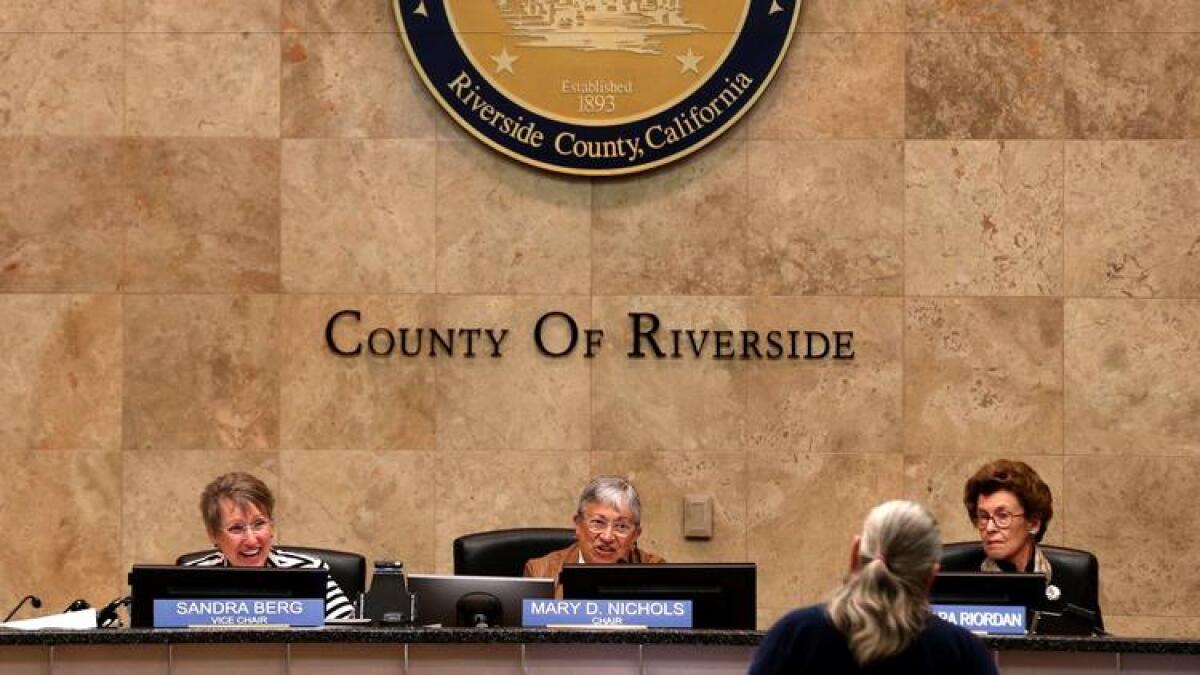
At risk is the existence of a national standard on vehicle emissions, something the auto industry has prioritized to reduce the complexity of its manufacturing operations.
“We should all be getting back to work on this,” said John Bozzella, who advocates for international car companies as head of the Assn. of Global Automakers.
Mary Nichols, chair of the Air Resources Board, questioned the industry’s commitment to higher standards given their request for Trump to review the rules.
“What were you thinking when you threw yourself upon the mercy of the Trump administration?” she said.
A dozen other states have adopted California’s standards as their own, and environmentalists hope Friday’s decision will foster a broader market for electric cars.
“This agency has seen federal administrations come and go,” said Simon Mui of the Natural Resources Defense Council. “But each time, it’s stayed true to its principles” of protecting the environment “when others lag.”
House Minority Leader Nancy Pelosi declares failure of GOP healthcare law ‘a victory for all Americans’
And then she actually jumped for joy.
California representatives answering their own flooded phone lines ahead of healthcare vote
Tension is high on Capitol Hill as Republican leaders and the White House try to twist a few last arms to get the votes they need ahead of this afternoon’s scheduled vote on the GOP healthcare overhaul bill.
The official debate is going on right now on the House floor (and you can watch it live) but there are no committee hearings scheduled and few public events on the schedule. So members on both sides of the aisle are pitching in to help answer the hundreds of phone calls flooding into their offices to talk about the bill.
All but five of the 14 Republicans in California’s 53-member House delegation say they’ve decided how they will vote. None of the undecided members are posting much on social media right now.
California Uber drivers would need only one business license under new legislation

California Uber and Lyft drivers would have to register for only one business license no matter where they drive in the state under a bill unveiled this week by a Los Angeles lawmaker.
Senate Bill 182 from state Sen. Steven Bradford (D-Los Angeles) attempts to make it easier for drivers to comply with local rules governing taxation and registration for independent contractors — an employee classification the companies have long argued fits their drivers.
“This bill would add clarity to the process of obtaining a business license for drivers while protecting working-class Californians from fees and costs that can dramatically impact their ability to do business,” Bradford said in a statement.
California cities and counties have been trying to implement the fees as a way to regulate the fast-growing ride-hailing industry. Last year, San Francisco began pushing drivers to pay the $91 annual fee to register. Drivers have worried that cities will require them to register wherever they drive, creating a web of licenses needed to work legally across different jurisdictions. Bradford’s bill would allow drivers to register with one city and use that license to drive across the entire state.
Rep. Duncan Hunter is likely under criminal investigation for alleged campaign finance violations
Rep. Duncan Hunter is likely under criminal investigation by the Department of Justice for allegedly misspending tens of thousands in campaign funds.
The House Ethics Committee disclosed the allegations Thursday in a news release explaining why it is not pursuing its own investigation of the Alpine Republican.
A report by the independent Office of Congressional Ethics released Thursday detailed allegations that Hunter used his campaign money for personal benefit. The office’s board voted unanimously to send the matter to the House Ethics Committee in August for further investigation.
The Justice Department has not confirmed the existence of an investigation, nor detailed what crimes it suspects Hunter or members of his campaign may have committed.
Read More8:38 p.m. This post was corrected to reflect the scope of the potentially misspent funds was in the tens of thousands, not hundreds of thousands. It was originally published at 11:17 a.m.
20 candidates in L.A.’s congressional race spoke at a forum Wednesday. Here’s how they described themselves in one word
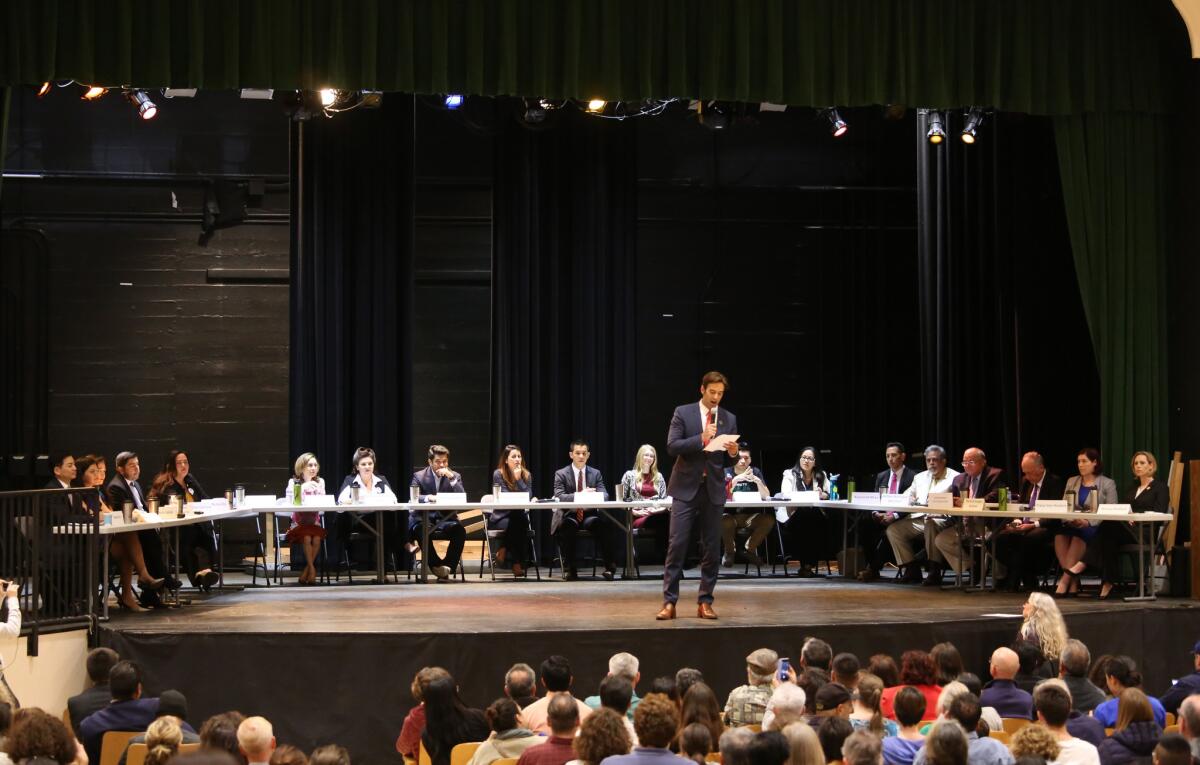
All but four of the 24 candidates running for Congress in L.A.’s 34th Congressional District showed up at a forum in Eagle Rock on Wednesday night.
With a nearly full roster on stage, moderator Elex Michaelson got through an impressive three full policy questions with the candidates.
But the final question injected a bit of fun and called for some creativity from the candidates, many of whom struggled to keep to the one-minute time limit all night.
Here’s how each candidate described themselves in one word:
- Robert Ahn: Independent
- Vanessa Aramayo: Effective
- Maria Cabildo: Relentless
- Alejandra Campoverdi: Empathy
- Arturo Carmona: Bold
- Wendy Carrillo: Unapologetic
- Yolie Flores: Integrity
- Melissa “Sharkie” Garza: Mysterious
- Jimmy Gomez: Accessible
- Sara Hernandez: Solutions-oriented
- Steven Mac: Selfless service
- Angela McArdle: Strong
- Kenneth Mejia: Revolution
- Sandra Mendoza: Relentless
- Raymond Meza: Neighbor
- William “Rodriguez” Morrison: Transparency
- Armando Sotomayor: Compassion
- Richard Sullivan: Congressman
- Tracy Van Houten: Badass
- Tenaya Wallace: Engage
For more coverage from the forum, follow this thread. You can watch the forum in its entirety here.
FOR THE RECORD:
7:12 p.m. A previous version of this post incorrectly stated there were 21 candidates at the forum.
Candidates for California governor touch on role of charter schools at a cordial forum
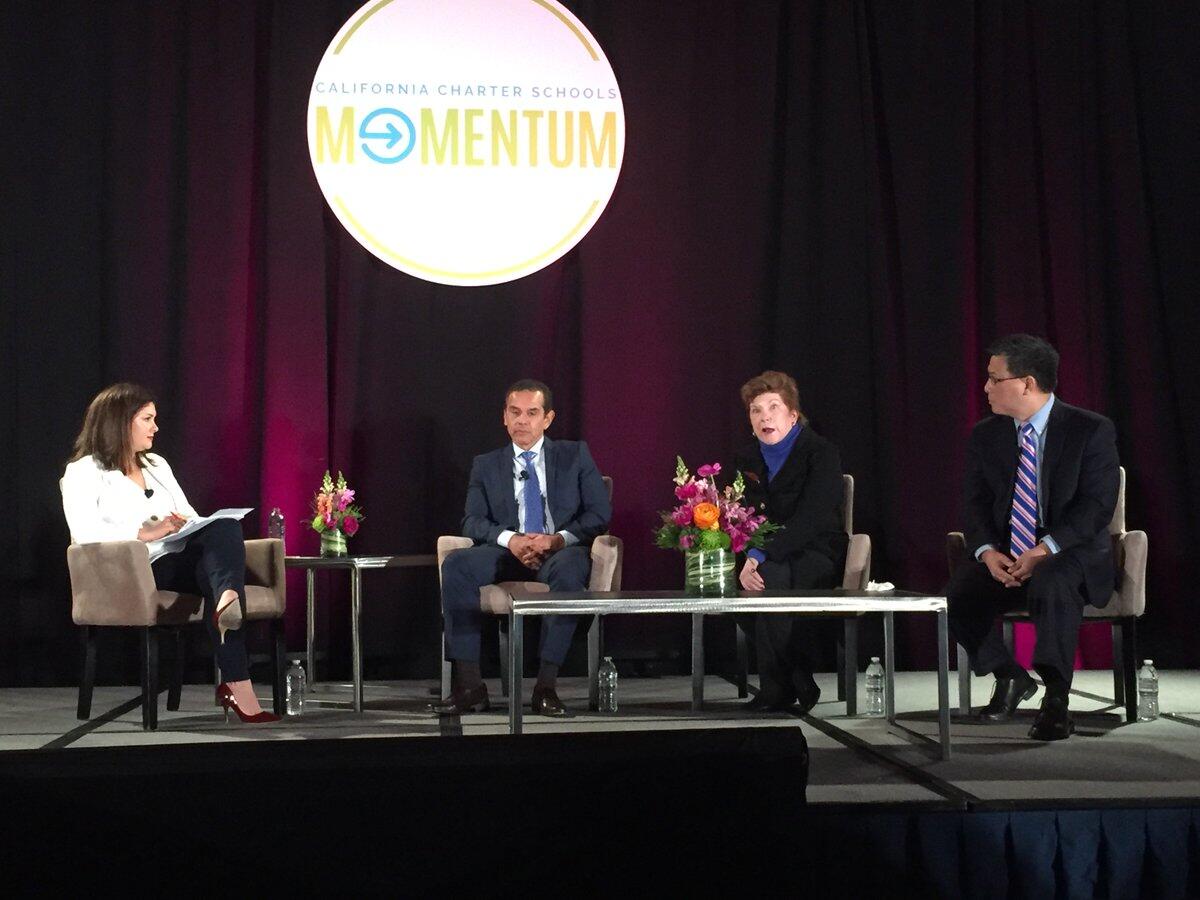
Former Los Angeles Mayor Antonio Villaraigosa, state Treasurer John Chiang and former state Supt. of Public Instruction Delaine Eastin all called for more education funding and were pressed on their charter school views in a 2018 gubernatorial forum Thursday.
The three Democrats hewed much more toward cordial than confrontational at the California Charter School Assn. forum in Sacramento.
Eastin, who serves on the board of the SIATech California Charter Schools, was clearly in her element, winning applause when she criticized state leaders for allowing California’s per pupil funding to slip to the bottom of the national average and for spending more on building prisons than on building colleges over the last 50 years.
Eastin also received the biggest laughs inside the Sacramento Convention Center ballroom, including for her comments in favor of more reasonable, and accurate, ways to assess student performance.
“As my dad used to remind us kids, you don’t fatten a hog by weighing it more often,” Eastin said.
Villaraigosa emphasized the successes of the Partnership for Los Angeles Schools during his eight years as mayor. The partnership manages 16 traditional public schools under a contract with L.A. Unified and dramatically increased graduation rates.
He also praised the work of successful charter schools, saying they are proof that public schools can be run more effectively and efficiently. And he took a not-too-subtle shot at teachers unions for “blocking and tackling” efforts to expand and preserve charter schools.
“Look, the deck is stacked against us. Let’s be clear,” Villaraigosa said. “There are folks who systematically try to stop the expansion of charters.”
Chiang focused on the need for transparency on funding and educational achievements at all schools, including charters, saying California taxpayers will remain wary about spending more money unless they are assured it will be well-spent.
“We have to make sure people trust how we’re going to spend money,” he said.
Lt. Gov. Gavin Newsom, who was the first major candidate to jump into the governor’s race, did not attend the event. His spokesman said he was in Colorado attending the wedding of his wife’s sister.
Republican candidates John Cox of Rancho Santa Fe and former Assemblyman David Hadley of Manhattan Beach weren’t there because the group sent invitations before those candidates entered the race, a spokeswoman for the schools association said.
California’s doctors in Congress both laid out their objections to the healthcare bill in videos today
While House Republicans spent the day Thursday trying to reach agreement among themselves on their healthcare bill and ended up delaying the vote that was scheduled to take place, Democrats have been using one of the few tools available to them to stop the bill: public perception.
That meant press conferences, social media pleas for people to call Republican members and a lot of television appearances.
That included the two Democratic medical doctors in Congress, both Californians, who laid out their objections to the bill on Thurday.
Rep. Raul Ruiz (D-Palm Desert) donned a white lab coat reminiscent of his days as an emergency room physician and broke down what he thinks is wrong with Republicans’ plan in a Facebook video.
Rep. Ami Bera (D-Elk Grove), who taught at the UC Davis medical school and was Sacramento County’s chief medical officer before being elected to Congress, also gave his take on the bill.
If you want a friend in Washington, they say you should get a dog, and these California lawmakers did
Tension is high on Capitol Hill as Republicans try to reach an agreement on their healthcare bill. It also happens to be National Puppy Day, and a few members got into the spirit and highlighted either their own dogs or staffers’ dogs, some of whom greet visitors to their offices during the workweek.
Quite a few Californians are at the center of Intelligence Committee furor sparked by Rep. Devin Nunes
California Democrats hold an outsize role on the House Select Intelligence Committee, and they’re now front and center in the furor over whether its investigation into Russian attempts to influence the 2016 election will continue.
Committee Chairman Devin Nunes (R-Tulare) made a surprise announcement Wednesday, telling reporters that U.S. intelligence agencies inadvertently intercepted communications involving the Trump transition team late last year. He informed President Trump first, which has caused Democrats on the committee, including three Californians, to question his commitment to the investigation.
The ranking Democrat on the committee, Rep. Adam Schiff (D-Burbank), responded with a news conference of his own Wednesday evening.
“The chairman will either need to decide if he’s leading an investigation into conduct which includes allegations of potential coordination between the Trump campaign and the Russians, or he is going to act as a surrogate of the White House. Because he cannot do both,” Schiff told reporters.
The two committee leaders have served in the same congressional delegation for more than a decade. The Intelligence Committee’s work is normally largely nonpartisan and classified, and Nunes and Schiff are known for working together. Just a few days ago, their relationship seemed to be going well even amidst the rancorous debate over Russia’s election involvement and intelligence leaks about it.
All House Democrats have signed onto a bill asking for an independent commission to do a nonpartisan investigation into Russia’s attempts to affect the outcome of the 2016 presidential race, and they reiterated that push Thursday after Nunes’ White House visit.
Rep. Jackie Speier (D-Hillsborough) told CNN that Nunes has apologized for not coming to the committee first.
Other Californians on the committee immediately expressed their frustration as well, saying the move hurt the investigation’s credibility.
“The chairman’s actions and closeness to a president whose campaign is under federal investigation have gravely damaged the investigation’s credibility,” said Rep. Eric Swalwell (D-Dublin).
House Minority Leader Nancy Pelosi (D-San Francisco) said Nunes bypassing the committee was an act of “diversion and desperation” and called him a “stooge.”
Gov. Jerry Brown laments ‘poisoned’ nature of talks to avoid nuclear war
Gov. Jerry Brown said the politics over nuclear warfare have become “poisoned” as he searches for ways to take a larger role in the debate.
Brown wrapped up his four-day visit to Washington, D.C., with a meeting of the Nuclear Threat Initiative, a nonprofit whose board of directors he joined this year.
“It’s very important to open channels of communication,” Brown said in an interview after the meeting. “Because there’s no way for the future to be safe unless there’s far more dialogue, and ultimately understanding and mutual agreements together.”
The governor scheduled meetings with federal and congressional representatives to coincide with the nuclear group’s gathering. He did not, however, make a visit to the White House.
Brown said “there is a role” he can play in advocating for nuclear disarmament, an issue he’s been passionate about for decades.
The governor is scheduled to tape an appearance on NBC’s “Meet the Press” before flying back to Sacramento on Thursday night.
California Legislature urged to play oversight role on Olympics proposal to prevent cost overruns
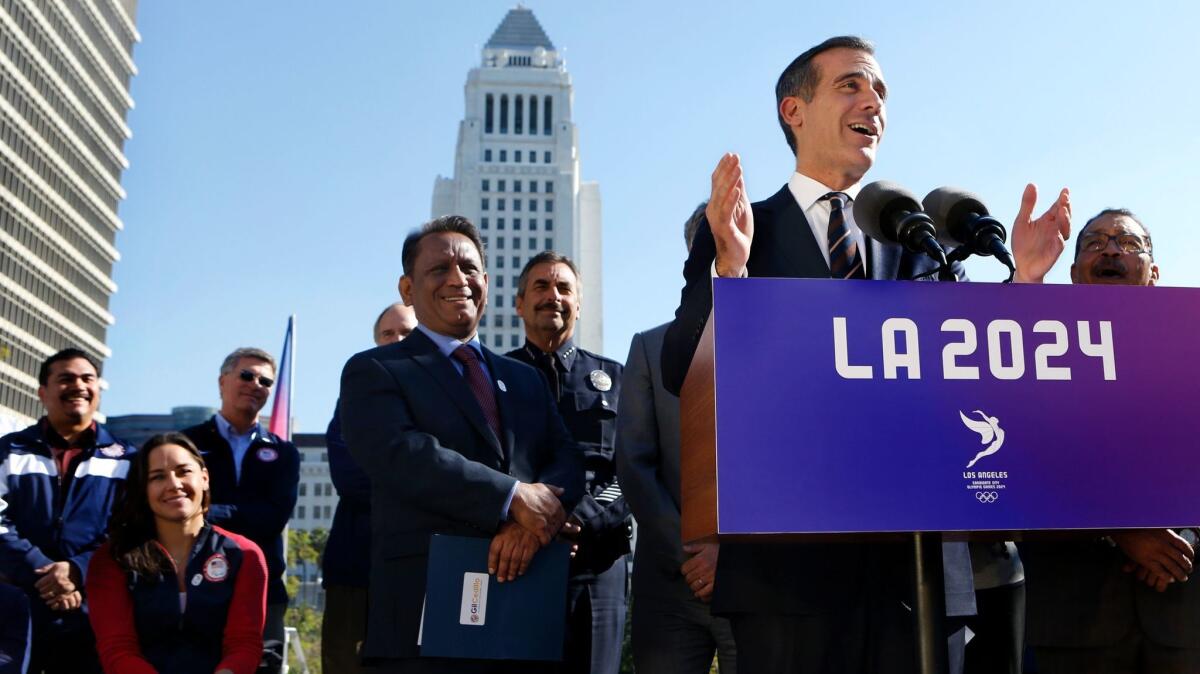
Los Angeles’ bid to host the 2024 Olympics requires state agencies to begin planning for their significant role and for state officials to guard against changes that might put the venture at financial risk, the state Legislative Analyst’s Office warned Thursday.
A report from the LAO noted that the state approved a $250-million guarantee last year to cover any cost overruns should Los Angeles be chosen over Paris to host the games.
“If Los Angeles is chosen to host the Olympics, the Legislature, with its ability to provide oversight to state departments, can play a constructive role in making the Games a success and keeping its financial risks low,” the report said. “In so doing, the Legislature can reduce the chance that any of the $250 million guarantee will ever need to be paid from the state treasury.”
State agencies that would be required to assist in the Olympics include the California Highway Patrol, Caltrans, the military department, the Office of Emergency Services, the university systems, the state parks system, the California Science Center, which is adjacent to the Coliseum, and gambling regulators, who would monitor potential illegal betting.
“State departments need to help LA 2024 prepare, as well as make sure the Governor is prepared as he enters into negotiations with LA 2024 [over the terms of the state guarantee],” the report says.
Former Gov. Pete Wilson looks back on Proposition 187 and says, heck yeah, he’d support it all over again
For a time, no California politician was more formidable than Republican Pete Wilson.
Over two decades, the popular former San Diego mayor enjoyed a record of nearly unbroken success, besting Gov. Jerry Brown in 1982 to seize a U.S. Senate seat and toppling San Francisco Mayor Dianne Feinstein eight years later to win the governorship.
He served in Sacramento during a time of epic upheaval, staring down a massive budget deficit and a series of biblical natural disasters: drought, earthquakes, fire, floods.
If Wilson is renowned for one thing, however, it is Proposition 187, the controversial ballot measure that sought to stem illegal immigration and address its costs by cutting off state services, including healthcare and public education, to those in the country illegally.
While Wilson’s support of the initiative helped rescue his flailing campaign for reelection as governor, the victory badly damaged Republicans by alienating Latinos in the state and nationwide.
Now, at 83, Wilson is waging what amounts to his final — and certainly his most personal — campaign, an effort to shape how he’ll best be recollected, and he says there was nothing racist about his pushing the controversial measure.
Justice Department investigating California Rep. Duncan Hunter’s campaign spending
Vehicle rules, ‘super pollutants’ on the agenda for California regulators

California’s powerful Air Resources Board began a marathon two-day meeting here on Thursday as regulators prepared new steps to curb climate change and vehicle emissions.
The board is expected on Thursday to approve a new strategy for reducing short-lived climate pollutants, which include methane from cow manure at dairies and exhaust from diesel engines. The pollutants are considered particularly harmful to the atmosphere, and the state hopes to set a standard that other governments can follow around the world.
“We’re the first in the world to do this,” said state Sen. Ricardo Lara (D-Bell Gardens), who authored the legislation requiring regulators to create the new strategy. “I’m very proud of this.”
On Friday, the board is scheduled to consider rules for vehicle emissions. While California plans to push forward with the regulations, President Trump has begun the process of rolling them back in Washington.
The state has the unique authority to set tougher rules than federal standards, and its decision could preface legal battles between California and the Trump administration.
California files brief supporting challenge to Trump’s threat against ‘sanctuary’ cities and counties
State Atty. Gen. Xavier Becerra on Wednesday filed a brief in support of a Santa Clara County lawsuit challenging President Trump’s executive order targeting “sanctuary” cities that refuse to help federal authorities enforce immigration laws.
The amicus brief cites Trump’s threat to withhold federal funds from sanctuary cities and counties as well as the state’s interest in protecting state laws and policies that promote public safety and protect the constitutional rights of residents, Becerra said.
“Any attempt by Donald Trump to hijack state and local resources to do the Trump administration’s bidding raises serious constitutional questions and threatens the safety of our communities,” Becerra said. “California has a sovereign right and responsibility to protect the safety and the constitutional rights of its residents, and that is what we will continue to do.”
The filing is the fifth amicus brief filed by Becerra in lawsuits challenging Trump orders.
Write-in candidate qualifies for 34th Congressional District race, but says she’s supporting candidate Robert Lee Ahn
Michelle “Hope” Walker, a 45-year-old comedian and activist, has qualified as a write-in candidate in the 34th Congressional District, making her the 24th hopeful to enter the race.
Though Walker qualified as a write-in candidate after submitting 61 nominating signatures, she says she tried to withdraw her name but county elections officials told her it was too late.
She is now supporting fellow candidate Robert Lee Ahn, an attorney and former planning commissioner. “I think I might be better off speaking, evangelizing in the community,” Walker said. If she wins, she adds, she would serve “because the people chose me.”
Walker, a Democrat, formed a federal campaign committee to run for president as an independent last year, but did not appear on the California ballot. She also ran for state Assembly in 2014 against Miguel Santiago and received 12% of the vote in the primary.
There’s a problem with sample ballots in L.A.’s congressional race, and it could have affected thousands of voters
An unknown number of voters who received Korean-language voting materials in the 34th Congressional District race may have received incorrectly printed sample ballots.
The incorrect pamphlets list the 23 candidates on the ballot in the wrong order. If Korean-language voters used the erroneous sample ballots to cast their vote, they may have inadvertently voted for the wrong candidate.
The sample ballots, booklets that list each candidate’s name and the corresponding number to fill in on the actual ballot, were mailed to some 8,200 Korean-language speakers ahead of the April 4 election. It’s not clear how many of them were affected.
According to the L.A. County Registrar’s office, an error made by its printing and mailing vendor caused some Korean-language voters to receive sample ballots that shift the order of candidates.
Campaign staffers for Korean American Robert Lee Ahn said that in some cases the Korean ballot materials differed from English-language ballots mailed to other voters in the same home or apartment building.
A supporter told Ahn about the error, said campaign consultant Darby Levin.
“We’re reaching out to the people who may have been affected,” said L.A. County registrar spokeswoman Brenda Duran.
All voters in the 34th district have received English-language sample ballots. Voters who request Korean-language election materials were also sent sample ballots in Korean. And those who vote by mail receive yet another sample ballot, in their language of choice, with their actual ballot.
Voting officials have stressed that the Korean-language sample ballots included with the actual ballots were not affected. No other translated ballot materials were affected either, Duran said.
Ballot order is supposed to rotate but by state law should only vary from one Assembly District to another. The 34th Congressional District, for example, contains Assembly Districts 51 and 53, and voters in one district should receive a ballot with names listed in a different order from voters in the other.
At some point, officials say, voters in the 53rd Assembly District, which includes Koreatown, received Korean-language sample ballots printed for Assembly District 51.

Ahn’s campaign is crying foul. “This is voter suppression,” Levin said. “They are trying to confuse Korean voters.”
Ahn, who has been gaining momentum as Korean Americans have appeared to mobilize for him, would be the only Korean American in Congress if elected. He has received attention from the Korean American press and his campaign says it has registered more than 600 new voters in the Korean community.
Nearly 9,000 votes have already been mailed in and an estimated 1,000 of those are Korean-language voters. For voters concerned they may have already submitted incorrect ballots, it’s unclear whether anything can be done for them. “We have to still look into that. We’re not sure yet what can be done,” Duran said.
Officials know of at least two voters who received the incorrect materials, but they still don’t know the magnitude of the problem.
“The vendor can’t tell us exactly where the problem happened,” said Debbie Martin, chief deputy of the L.A. County registrar-recorder.
They are sending notices to all Korean-language voters informing them of the anomaly. The letter, which will be mailed out Wednesday in English and Korean, asks voters to check their sample ballot and includes a corrected sample to help them compare. It also tells voters that a corrected sample ballot will be sent out “within a few days,” Duran said.
Until then, officials say Korean-language voters who have not yet mailed their ballots should hold on to them until they receive the corrected materials.
Anyone who encounters voting problems or has questions can call the registrar at 800-815-2666; Korean speakers can call 800-481-8683.
California Gov. Jerry Brown on paying for universal healthcare: ‘How do you do that?’
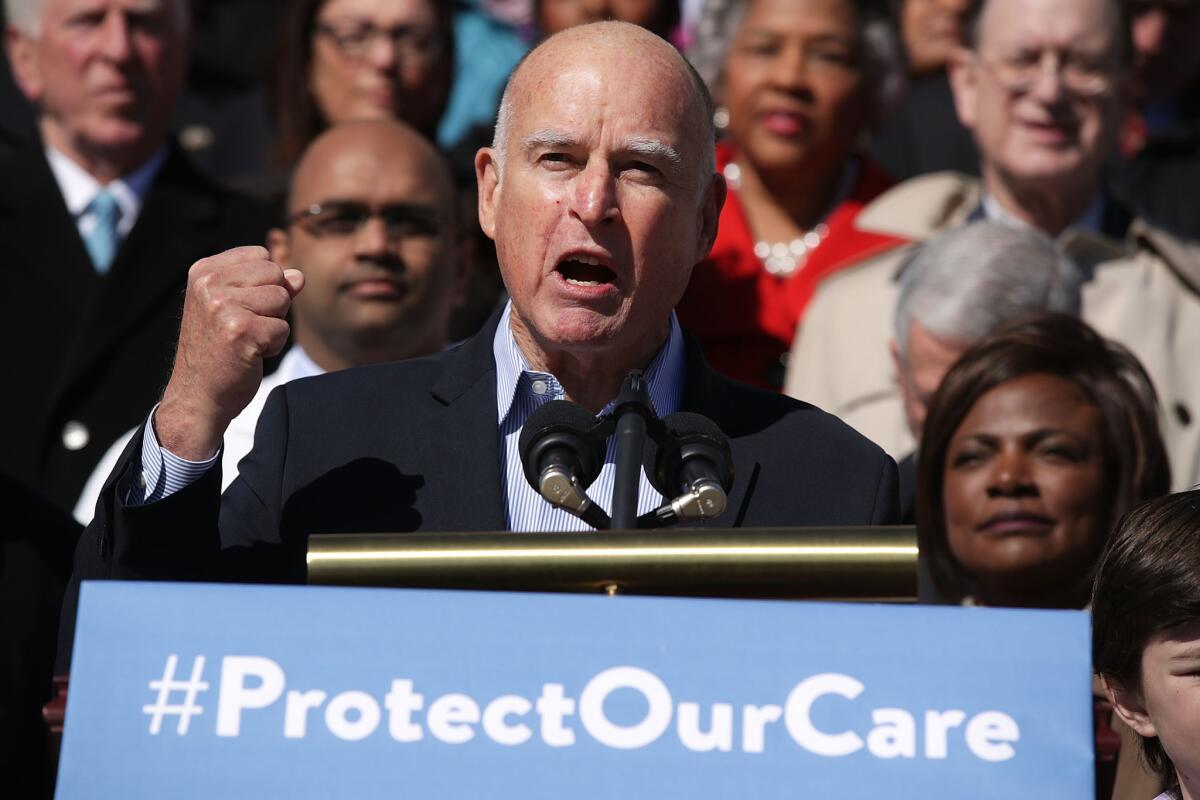
Gov. Jerry Brown stuck to his skeptical view on matters of broad healthcare reform on Wednesday, dismissing the idea of a universal healthcare system as something akin to a financial impossibility.
“Where do you get the extra money? This is the whole question,” Brown said in an interview after wrapping up a day’s worth of events and meetings in Washington.
The governor won applause at an earlier Capitol event in the day, criticizing Republican efforts to replace the Affordable Care Act with a smaller, cheaper program.
But in the wide-ranging discussion with reporters later, he dismissed any notion that it might soon be time to look for a different way to fund healthcare in California — including the idea of a single-payer, universal system.
“I don’t even get it,” said the governor. “How do you do that?”
He pointed out that the overall cost of medical care in California is equal to 18% of the state’s gross domestic product, which would be about $450 billion.
“You take a problem and say I’m going to solve it by something that’s even a bigger problem, which makes no sense,” he said.
Brown also rejected the idea that it might soon be time to look for ways of finding the billions of dollars his administration thinks would be cut if the GOP healthcare plan is enacted.
“The first idea is to do everything to prevent it from happening,” he said of the Republican plan. “That story will be known in a few weeks; we’ll go from there.”
Former Assemblywoman Cheryl Brown exploring possible rematch for San Bernardino seat
California has a new voter registration record: 19.43 million are signed up to vote
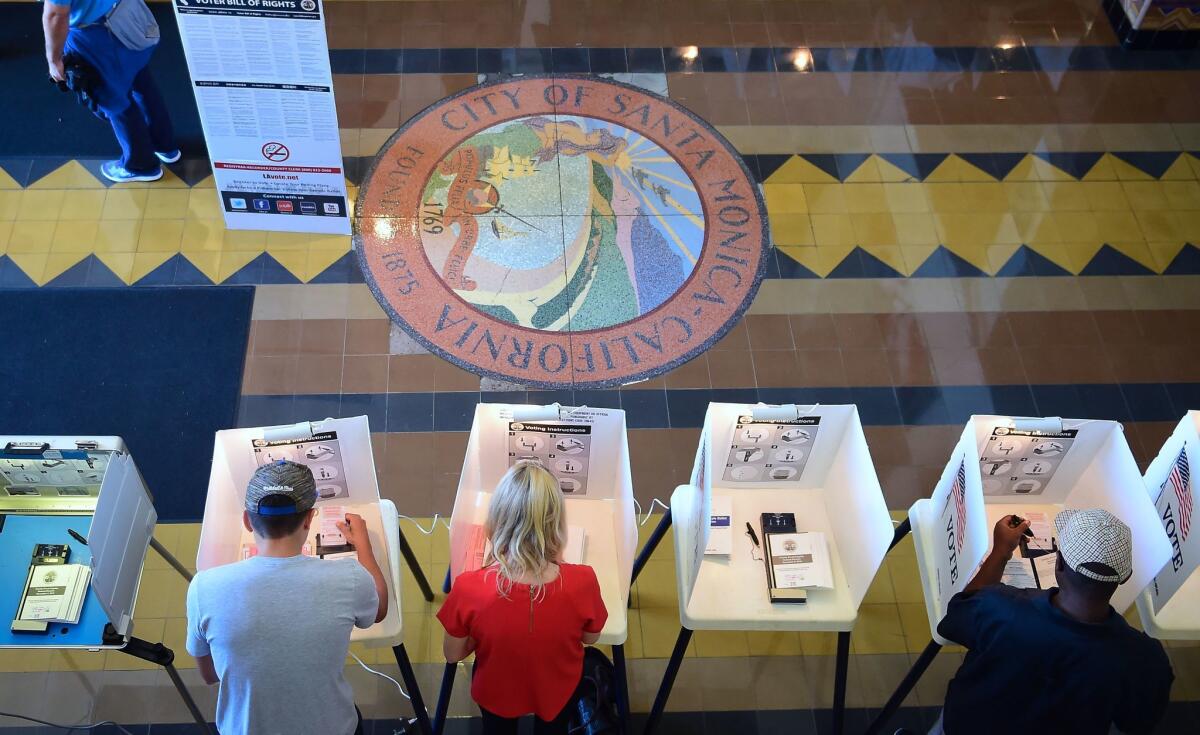
Following the hotly contested 2016 presidential election, California has set a new voter registration record, with 19.43 million residents now signed up to vote.
More than 20,000 voters have been added to the rolls since Oct. 24, an unusual increase after a presidential election, according to Secretary of State Alex Padilla, who released the new voter registration numbers Wednesday.
The state saw a net gain of more than 1.7 million new voters since the same report was released in February 2015, and a record 14.6 million California voters cast ballots in the November elections.
Party registration trends are holding steady, according to the new numbers.
Republicans trailed Democrats in registration by more than 18%, according to the California Secretary of State’s official voter registration report released Wednesday. Of Californians registered to vote, Democrats accounted for 44.8% and Republicans 25.9%.
Unaffiliated voters, known in California as those who have “no party preference,” were a close third and made up more than 24.5% of statewide registration.
Over the past decade, Democratic voter registration has remained relatively the same percentage-wise, increasing by just over 2% since February 2007. Republican registration has continued to slide, dropping by more than 8% during that time.
As of Feb. 10, an estimated 77.9% of Californians who were eligible to vote have registered, according to the report.
Former Assemblywoman Susan Bonilla won’t run for state insurance commissioner
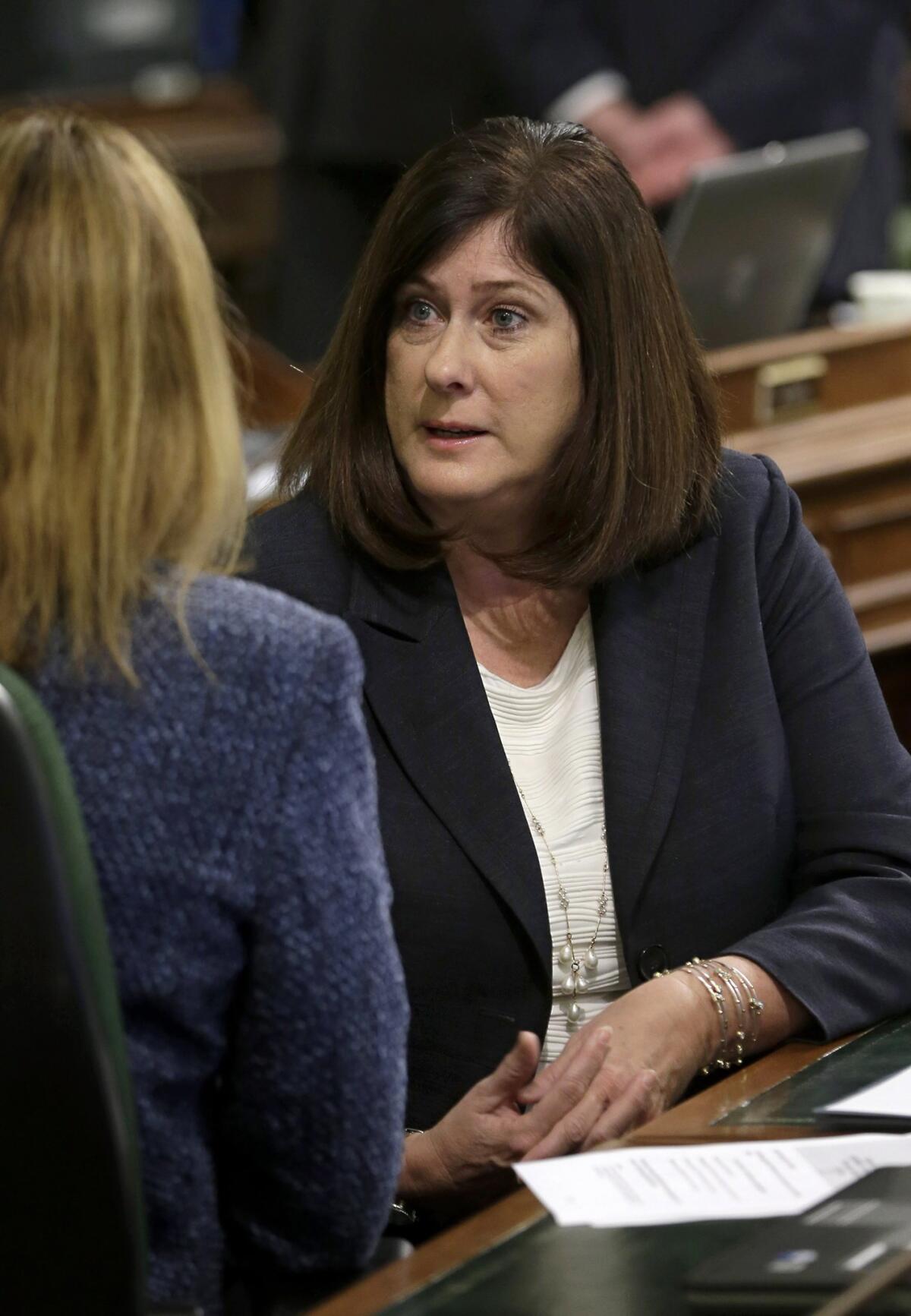
Former Democratic Assemblywoman Susan Bonilla announced Wednesday that she will not run for state insurance commissioner in 2018 and instead endorsed state Sen. Ricardo Lara (D-Bell Gardens) for the statewide post.
Bonilla’s announcement came on the same day that Lara’s campaign for insurance commissioner got a boost from endorsements by Senate President Pro Tem Kevin de León and California State Assembly Speaker Anthony Rendon.
Bonilla is one of four Democrats who had formed campaign finance committees for possible runs for insurance commissioner.
“I’m pleased to endorse my friend State Senator Ricardo Lara for Insurance Commissioner,” she said in a statement. “ He’s been a warrior for the people of California on a broad spectrum of issues, but particularly when it comes to social and economic justice causes.”
Lara started out his government career as a legislative aide to De León when the leader was in the Assembly, and has been a top lieutenant of his during their service together in the Senate.
“Ricardo Lara embodies the bold, progressive and visionary leadership that we need in our next State Insurance Commissioner,” De León said in a statement, citing Lara’s work for the environment, immigrants and low income residents.
Rendon said the race is important because of uncertainty about California programs stemming from the election of President Trump.
Lara, he said, “has built up a dynamic reputation as a change-maker, a fighter, a coalition-builder and as someone who knows how to create movements that lead to positive and meaningful reforms that improve peoples’ lives.”
Gov. Jerry Brown warns of at least a $6-billion-a-year hit to California under GOP health plan
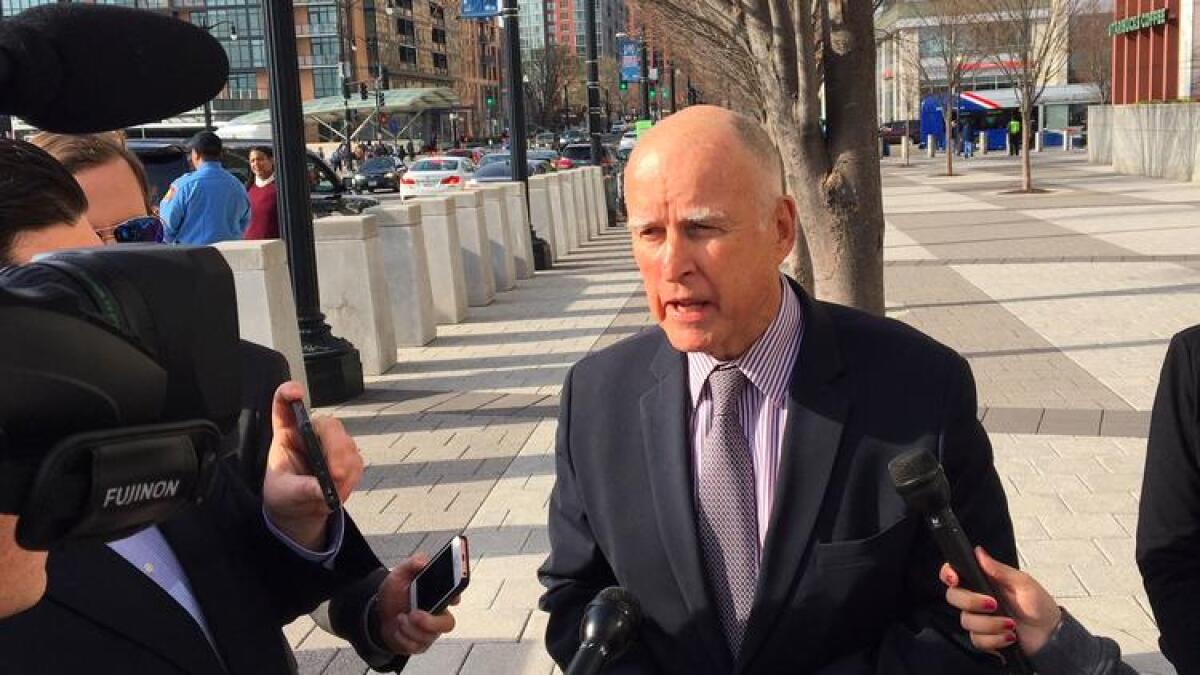
Calling the Republican congressional leadership’s healthcare proposal an “insult to democracy itself,” Gov. Jerry Brown warned Wednesday that the proposal would shift $6 billion in costs a year to California’s state government by 2020.
“It’s real when you, all of a sudden, send a $6-billion tax bill to the state of California,” Brown said in an interview after he delivered remarks alongside Democrats who were on Capitol Hill to mark the seventh anniversary of the Affordable Care Act, known as Obamacare.
“This is devastating,” he said.
On the eve of the vote on the proposed GOP replacement for the Obamacare law, Brown’s administration released an analysis concluding that the annual costs to the state would grow to $24.3 billion by 2027. California embarked on one of the most aggressive implementations of the ACA, with some 4 million residents now covered under its provisions. Most of those receive health benefits through Medi-Cal, the state’s version of the federal Medicaid program for the poor.
Brown delivered a fiery speech at the Obamacare celebration, which featured former Vice President Joe Biden.
“This a dangerous bill, written by people who don’t know what the hell they’re talking about,” said the governor to applause from the politicians and the crowd gathered on the Capitol’s east steps.
The Brown administration’s analysis highlights the Republican plan’s requirement that states repay any Medicaid spending above newly imposed federal caps. It would also limit federal dollars spent on any new enrollees in the state’s Medi-Cal program after 2019.
The governor will return home on Thursday to begin revisions to his budget plans for the fiscal year that begins in July, an already tough task given projections of a $1.6-billion deficit.
Brown has sidestepped any direct criticism of President Trump while in Washington this week but urged the Republican leader to hold true to his campaign promise of providing healthcare coverage for every American.
“This is a death, disease and suffering bill,” the governor said of the GOP plan as he made his way to a meeting with Senate Minority Leader Charles E. Schumer (D-N.Y.). “Mr. Trump should really wake up and change his mind.”
Some of the state’s 14 Republican House members still not sure on the GOP’s health bill
A handful of California’s 14 Republican members of Congress say they are still weighing how to vote on the GOP plan to undo and replace parts of the Affordable Care Act.
More than half of California’s Republicans have said they’ll vote yes or are leaning yes. None of the 14 Republicans in the delegation have committed to voting no on the bill, which is scheduled for Thursday.
Gov. Jerry Brown in Washington: ‘I came from California to tell the truth about this fake healthcare bill’
Juvenile justice bills move forward after young offenders tell their stories
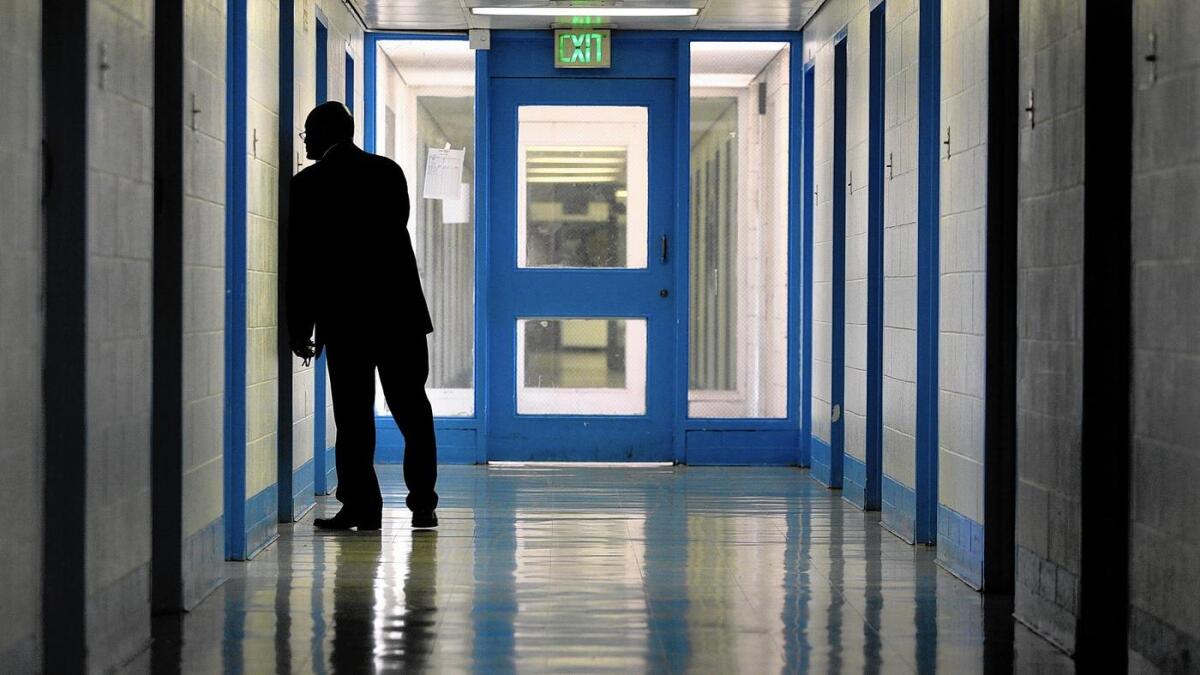
Three juvenile justice bills on Tuesday cleared the state Senate Public Safety Committee, the first in a legislative package that aims to divert children from the path to prison.
Two of the proposals co-authored by Sens. Holly Mitchell (D-Los Angeles) and Ricardo Lara (D-Bell Gardens) would ban life without parole sentences for minors and require that juveniles speak with lawyers before waiving their rights. Another would end the costly collection of administrative fees against families with children in juvenile detention.
At Tuesday’s hearing, witnesses urged lawmakers to support legislation they said would ensure the fair treatment of children under the law. But law enforcement groups and prosecutors said it could keep authorities from holding offenders accountable and hinder officers from carrying out investigations.
“We are talking about people who have committed the most egregious crimes,” Laura Tanney, a deputy district attorney in San Diego, said in opposition to the bill that would ease sentencing for the young offenders among the 300 people in California serving life sentences without parole.
Sen. Steven Bradford (D-Gardena) countered they were all either poor or minorities. There’s “not a single rich kid who is doing life without parole,” he said.
Joel Aguilar, now a college student, was one of them until law students helped him get his sentence reduced. He told the committee he was 17 when he was involved in a burglary that led to the death of an innocent man.
His bad decisions haunt him to this day, he said. But the proposed legislation “says to a young person, ‘You are more than your worst act.’” he said. ‘“You are redeemable.’”
State bill requiring California police to disclose surveillance equipment clears its first hurdle
Despite no show of public support, the state Senate Public Safety Committee on Tuesday passed a bill that would require law enforcement agencies in California to disclose all of the surveillance equipment they use to the public.
Under the legislation by state Sen. Jerry Hill (D-San Mateo), police and sheriff’s departments would have to submit a plan to local officials — and present it at an open hearing — on what surveillance technology they employ and how, including facial recognition software, drones and social media monitors.
The bill moved out of the public safety committee with a 4-2 vote. It now heads to the state Senate Judiciary Committee for review. But with no witnesses speaking in support, its first hearing Tuesday underscored the balance lawmakers will have to strike between transparency and public safety.
“I think we are all on the same page,” Hill told the committee. “We want to be able to protect our civil liberties, defend and protect our Constitution and make sure law enforcement will have the tools available that will enable them to fight crime in our communities. We just have to find that [right] spot.”
The bill is predicated on two laws that went into effect last year. One requires agencies to draft and publicly post privacy and usage policies if they operate automated license-plate recognition software. Another ordered the same for devices often called “Stingrays” or “Dirtboxes,” which simulate cellphone towers and cast a broad dragnet over communications.
Hill drafted the legislation in an attempt to cover all future surveillance technologies in a quickly evolving field. New amendments expected will expand its provisions to other investigative units, such as those under district attorney offices and the state Department of Justice.
But law enforcement association lobbyists on Tuesday said it went too far, giving criminals a roadmap to police agencies’ crime-fighting technology. Privacy groups argued it did not go far enough to protect civil liberties and could undermine local efforts to draft their own guidelines.
Scenes from Gov. Jerry Brown’s visit to Washington
Schwarzenegger blasts Trump’s approval numbers: ‘The ratings are in and you got swamped’
Former Gov. Arnold Schwarzenegger continued to blast President Trump on Tuesday, this time mocking his low approval ratings and his budget proposals to cut funding for after-school programs and Meals on Wheels.
“The ratings are in and you got swamped,” Schwarzenegger says in the video, which was shot in Sydney, Australia, and posted on his social media accounts. “Wow. Now you’re in the 30s. But what do you expect, I mean, when you take away after-school programs for children and Meals on Wheels for the poor people. That is not what you call ‘Making America Great Again.’ I mean, who is advising you?”
Schwarzenegger made the remarks one day after Gallup released figures showing the president’s approval rating had dropped to 37%, the lowest since he took office.
The former governor made clear he was not a fan of his fellow Republican during the 2016 presidential race, even as he replaced Trump as the host of “Celebrity Apprentice” for one season. He and the president have an ongoing feud, which has largely played out on social media.
Trump repeatedly ripped Schwarzenegger for the reality competition show’s low ratings during the actor’s time as host, and the former governor responded by questioning the president’s leadership skills.
Schwarzenegger, whose advocacy for after-school programs predates his time tenure as governor, offered to take Trump to a middle-school enrichment effort in Washington, D.C.
“I take you there so you can see the fantastic work they’re doing for the children,” he said. “Let’s do it.”
Schwarzenegger’s remarks come as California’s current governor, Jerry Brown, is visiting lawmakers in the nation’s capital amid concerns that several of the administration’s priorities will particularly harm Californians.
Gov. Jerry Brown hits Capitol Hill to meet with California’s congressional delegation
Gov. Jerry Brown found a receptive but unsettled audience on Capitol Hill on Tuesday, with pledges of cooperation but at least one warning that the state could pay a price for its leaders’ criticism of President Trump.
Brown, who is in Washington until Thursday afternoon, spent most of Tuesday shuttling across the Capitol complex for meetings — a day of large crowds and security, with Trump’s meeting on healthcare efforts.
The governor’s meeting with Democrats who represent the state lasted more than an hour, and lawmakers praised Brown for his pragmatic take on an era with deep partisan divides.
“I think the message was, let’s fix problems, let’s engage the administration,” Rep. Lou Correa (D-Santa Ana) said after the morning meeting.
Brown too was impressed.
“They’re very focused on doing right by California,” he said.
A later meeting with Republicans was also described as cordial, but one veteran GOP lawmaker said requests for federal aid on water and infrastructure won’t just be considered in a political vacuum.
“If the political leaders of California are using their authority and their efforts to block President Trump’s efforts to control the illegal flow of immigrants into our country, then they can’t expect to get preferential treatment when it comes to other issues of government,” Rep. Dana Rohrabacher (R-Costa Mesa) said.
The governor also met with California Sen. Kamala Harris and earlier made a brief stop in the office of Sen. Ed Markey (D-Mass.) to discuss climate change.
California state Sen. Ricardo Lara announces he’s running for state insurance commissioner in 2018
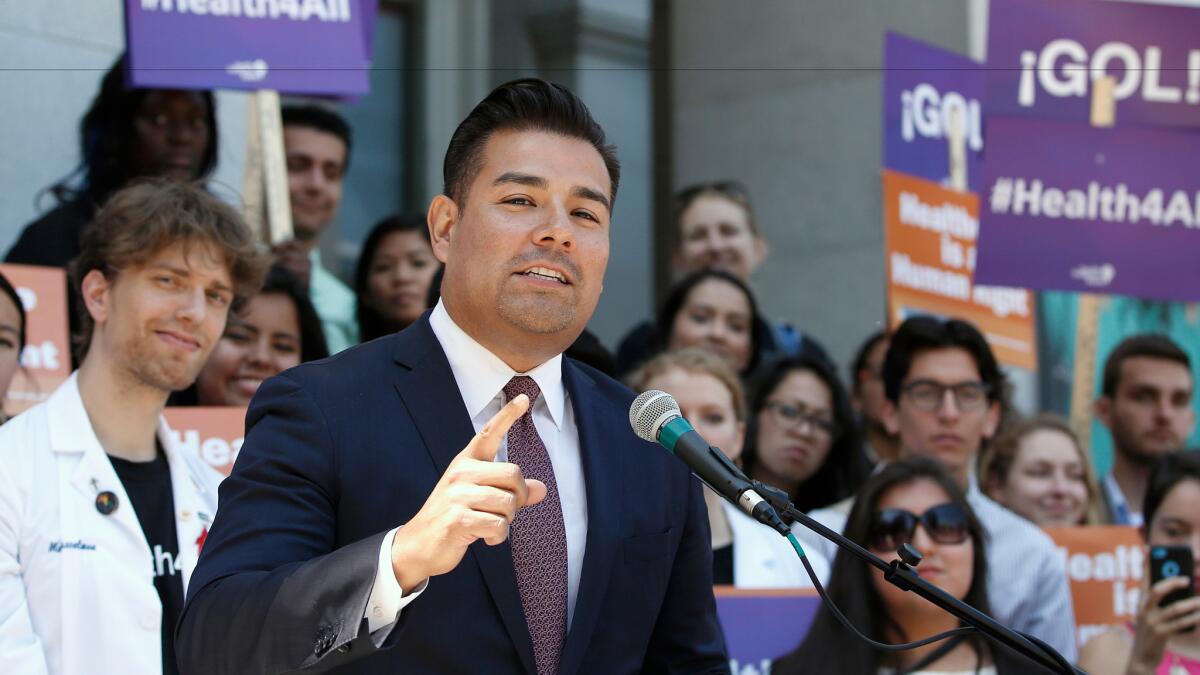
A month after proposing a single-payer healthcare system for California, State Sen. Ricardo Lara (D-Bell Gardens) announced Tuesday he’ll run for state insurance commissioner in 2018.
Lara is one of four Democrats who has filed papers to begin fundraising for a possible candidacy. In his announcement, Lara said strong leadership is needed at a time when President Trump is seeking to repeal the Affordable Care Act.
“I’m running to be California’s next state insurance commissioner because I believe at my core that California needs a strong defender, and a counterpuncher, who will stand up to fight our bullying President, Donald Trump, and his increasingly reckless federal government on issues from healthcare access to economic security and more,” Lara said in a statement.
In addition to proposing a single-payer system for the state, Lara, who is the son of immigrants, won approval for legislation that provides healthcare coverage for children who are in the state illegally. He has also pressed for coverage for adult immigrants willing to pay for their insurance.
Lara, 42, graduated from San Diego State University with a double major in journalism and Spanish. He served in the Assembly for two years before winning election to the state Senate in 2012. He has served as chairman of the California Latino Legislative Caucus and is vice chairman of the California Legislative Lesbian, Gay, Bisexual and Transgender Caucus.
Other prospective candidates who have filed fundraising papers for the insurance commissioner race include former Democratic Assembly members Susan Bonilla and Henry Perea, and Paul Song, a Santa Monica radiation oncologist and former leader of the California progressive group Courage Campaign.
Californians leading intelligence committee try to avoid the partisan rifts that sank other investigations
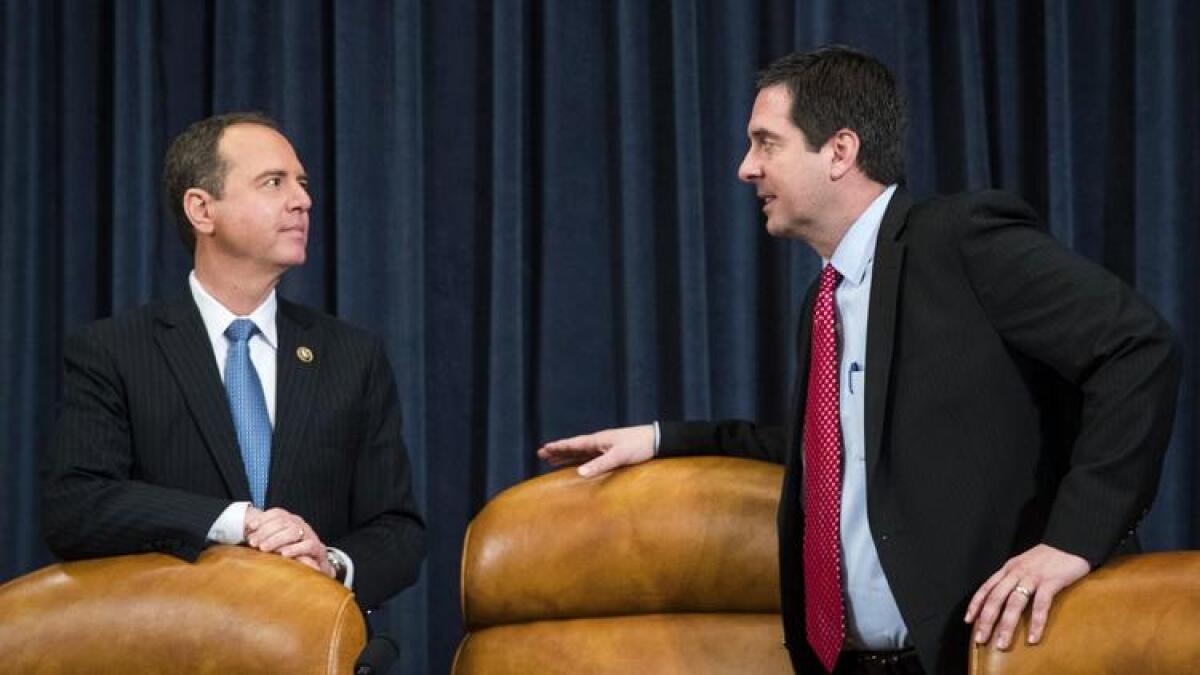
The question of whether the House can carry out an investigation into Russia’s attempts to interfere with the 2016 election has fallen to a pair of soft-spoken Californians: the chairman and ranking minority member of the House Permanent Select Committee on Intelligence, Devin Nunes, a Republican former dairy farmer from Tulare, and Adam Schiff, a Democratic former federal prosecutor from Burbank.
They seemed to pass their first test Monday with a hearing that provided significant testimony and relatively little of the high-volume theatrics that have limited the credibility of other recent congressional investigations.
Whether that will continue is yet to be seen.
Gov. Jerry Brown in Washington: ‘Wherever we are going to find common ground, we are going to do it’
When Gov. Jerry Brown landed in Washington on Monday on his mission to raise awareness about the nuclear threat and to secure funding for disaster relief in the state, he didn’t strike the tone of defiance many are looking for from the Democrats’ most influential voice in the west.
Brown is taking a noticeably measured approach to the new White House. Even after President Trump has put himself on a path of confrontation with California on so many issues — threatening the state’s sanctuary cities, its landmark fuel mileage standards and its precarious budget — Brown says he’s not going to be pressured by the left into relentlessly attacking the White House.
“I will pursue my own rhetorical paths,” Brown said to reporters Monday after a meeting at the Federal Emergency Management Agency. “At least in the spirit of advancing the interest of California, recognizing we are a part of the Union and … we are not going a totally separate way. We are distinct. We have a sovereignty. We will pursue that. But we also have a commonality with other states and with the national government. So wherever we are going to find common ground, we are going to do it.”
Brown said he “wouldn’t rule anything out or anything in” when it comes to California’s dealings with Washington.
“Nothing is all that predictable under the current administration,” he said. “That could be a cause for alarm, but also a cause for some optimism and creative possibilities.”
Of course, Brown’s motivation for the trip was to bring attention to the threat of a nuclear apocalypse, which he said is as big a danger now as during any time during the Cold War. But even on that issue he was reluctant to lay blame on Trump, who many disarmament experts caution has elevated the potential for doomsday with his loose talk about nuclear weapons and aggressive posture toward other nations that have nuclear capability.
Asked whether the nuclear threat has increased under Trump, Brown said: “I would say it hasn’t been diminished. I don’t want to speculate. It’s a little early.”
Congressional candidates Yolie Flores and Maria Cabildo launch first video ads and play to their strengths
Former L.A. Unified board member Yolie Flores has released her first video ad of her congressional campaign, and it’s focused on education.
The video, which is about two minutes long, features local supporters, including social workers, business owners, a seventh-grader named Esteban and a first-grader named Bella.
In it, Flores, who served on the L.A. Unified board from 2007 to 2011, calls public education “one of the most sacred of our democratic principles,” in between scenes of her surrounded by children in classrooms.
Flores, who now works as chief program officer for the Campaign for Grade-Level Reading, also has a degree in social work.
Maria Cabildo, a former L.A. city planning commissioner who also debuted an ad Monday, chose to focus on an economic message.
In a 48-second ad, Cabildo talks about an economic recovery that “never hit many of our neighborhoods.”
“We need to bring opportunity back to everybody, not just the billionaires that get to sit on Donald Trump’s cabinet,” says Cabildo, a longtime affordable housing developer who now serves as director of homeless initiatives for the L.A. County Community Development Commission.
Flores and Cabildo are two of the 23 candidates running in the April 4 primary to replace Xavier Becerra. If no single candidate receives more than 50% of the vote, a June 6 runoff will be held between the top two finishers.
Assembly Democrats aim to put $3-billion bond for parks on 2018 ballot

California voters could decide in 2018 whether to approve a $3-billion bond to finance a boost to parks and open space across the state.
The state Assembly approved the measure Monday afternoon, which would provide money to state and local park improvements with an emphasis on funneling dollars to disadvantaged communities.
“It’s hard for people in my communities to have access to healthy environments,” Assemblyman Joaquin Arambula (D-Fresno) said when arguing in favor of the bill.
The measure required a two-thirds supermajority for passage and did so entirely with Democratic votes.
Republican assemblymembers argued that the state should spend the money it has now on parks rather than ask voters to borrow money. They noted the $3-billion bond will require the state to repay $6 billion over three decades.
“It could be done without doubling the price tag,” Assemblyman Jim Patterson (R-Fresno) said.
Before reaching the 2018 ballot, the parks bond needs similar supermajority approval in the state Senate and the signature of Gov. Jerry Brown.
California shouldn’t invest in companies that build President Trump’s border wall, lawmakers say

Three state lawmakers have introduced a bill that would require California’s pension funds to divest from any company involved in building President Trump’s proposed wall along the U.S.-Mexico border.
Assembly Bill 946 from Assemblymen Phil Ting (D-San Francisco) and Eduardo Garcia (D-Coachella) and Assemblywoman Lorena Gonzalez Fletcher (D-San Diego) would require the California Public Employee Retirement System and the California State Teachers Retirement System to liquidate any investments in companies that helped build the wall.
“Californians build bridges not walls,” Ting said in a release. “This is a wall of shame and we don’t want any part of it.”
CalPERS and CalSTRS are the nation’s largest and second largest pension funds with nearly $312 billion and $202 billion in investments under their control, respectively. The AB 946 announcement follows last week’s U.S. Customs and Border Protection’s request for companies to submit formal border wall prototypes.
Today’s the deadline to register to vote in L.A.’s congressional race
Garcetti, other L.A. leaders call on Legislature to end delays on transportation funding plan
A group of officials including Los Angeles Mayor Eric Garcetti on Monday called on state legislators to end a stalemate over approving a transportation funding plan to cover a $130-billion backlog of repairs to California’s roads, bridges and highways.
Current legislation that would raise the gas tax and vehicle fees to generate $5.5 billion annually needs a two-thirds vote of the Legislature but has been bogged down with some Democrats withholding support.
“We have a very simple message for Sacramento today: Fix our streets,” Garcetti said during the rally. “It is time before the April 6 break for the California state Senate and Assembly to do the right thing and fix the streets of our cities and of our region.”
Pressure on legislators was also ratcheted up by Brian Kelly, secretary of the California State Transportation Agency, who said he hopes new legislation will be introduced next week that “will reveal the entirety of the funding plan.”
“The time to act is now,” Kelly said during the rally. “The Legislature has not passed a gas tax increase in 23 years, but over that time things have gotten more expensive.”
County Supervisor Hilda Solis and City Councilman Joe Buscaino also called on lawmakers to reach an agreement.
“Our roads have been neglected to the point that the deterioration is accelerating at an alarming pace,” Buscaino said.
Current legislation would raise the per-gallon gas tax by 12 cents in phases over three years, set the price-based per-gallon excise tax at 17.3 cents, increase the diesel tax by 20 cents, boost the sales tax on fuel by 4% and increase the annual registration fee by $38 for all vehicles.
Some Democratic lawmakers want more money guaranteed for neglected districts and mass transit.
But Garcetti called on the legislators to show leadership and reach a compromise.
“For too long we have let our roads and bridges crumble,” the mayor said. “For too long we have delayed to another month, or another year or another Legislature. For too long we’ve known that a problem exists, we’ve known how to take action, but we haven’t been able to do it.”
This California Democrat is proposing a tax on millionaires to make public colleges tuition-free for in-state students
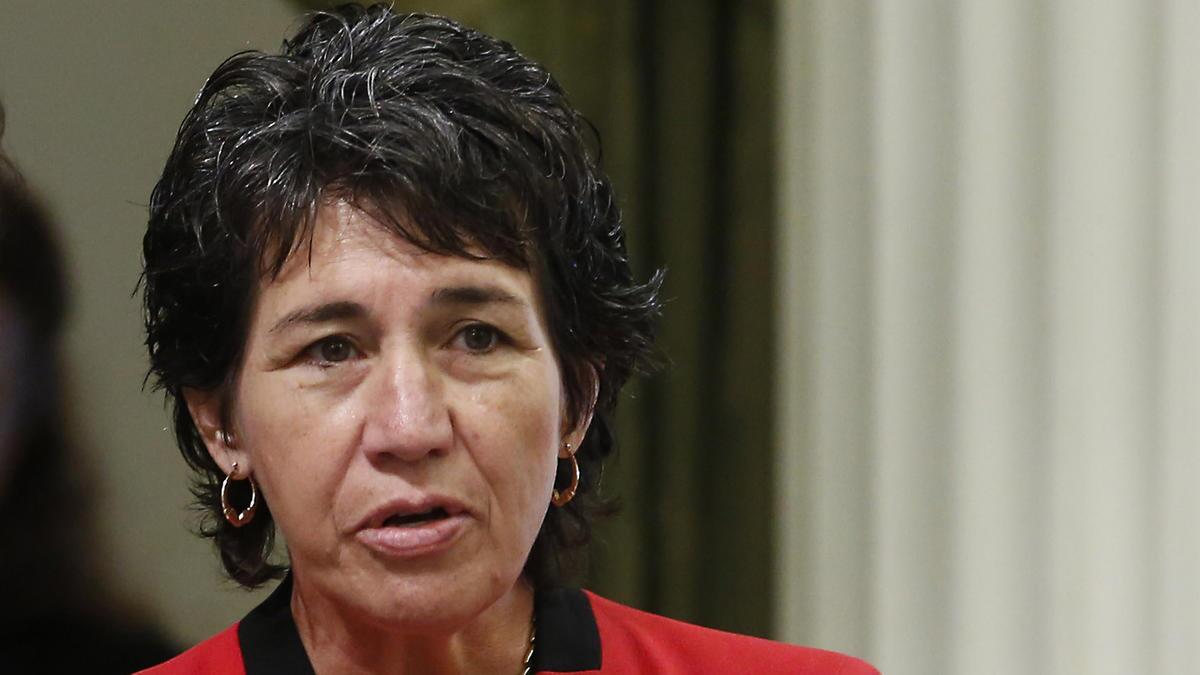
To tackle concerns about college affordability, a Democratic legislator is proposing to make public colleges and universities tuition-free for all Californians, and wants to tax millionaires to do it.
The measure, which echoes calls for tuition-free college by former presidential candidate Sen. Bernie Sanders (I-Vt.), is the latest in a flood of legislation that’s been introduced this year to address concerns about the rising cost of attending college.
The state’s 1960 Master Plan, which created a framework for higher education institutions, was meant to “make college affordable for everybody. That was going to be the California dream,” Assemblywoman Susan Talamantes Eggman (D-Stockton), the proposal’s author, said in an interview.
“Now we find ourselves in the position where that dream isn’t being fulfilled,” she said.
Eggman’s proposal would impose a 1% tax on incomes over $1 million to help pay for the approximate $2.2-billion price tag to cover tuition and fees for all in-state students in conjunction with existing aid.
“We know the very wealthy continue to control a huge amount of the state’s wealth, this country’s wealth, while the middle-class continues to get squeezed more and more,” Eggman said.
New taxes generally face a steep climb in the Legislature, where a two-thirds vote is required for passage. But Eggman said her bill, AB 1356, would also be coupled with a constitutional amendment that would put the tax before voters for ultimate approval.
Doing so, she said, ensures “a greater buy-in from the general public.”
A recent survey by the Public Policy Institute of California found that 68% of Democrats, 20% of Republicans and 42% of independents support increased taxes to pay for higher education.
Eggman’s tuition-free proposal takes a different approach from her colleagues, who unveiled a sweeping plan last week to make public colleges debt-free for nearly 400,000 students from families that make up to $150,000 per year. That measure aims to chip away at some of the associated costs of going to college, such as living expenses and textbooks.
Eggman said she envisions the two proposals complementing each other.
She also said she anticipates critiques her “clean sweep” plan to wipe tuition away for all Californians would benefit wealthy residents who don’t need such assistance.
People may say “‘millionaire’s kids might use it,’” Eggman said. “Well, they’re paying for it, too.”
More than 130 bills take aim at California’s housing crisis
This year, California lawmakers are tackling more than 130 bills that aim to ease the state’s housing affordability crisis. One longtime Sacramento observer said this is the most attention legislators have paid to housing issues in three decades.
Highlights include a measure that would strip the state’s mortgage interest deduction from vacation-home owners and redirect the roughly $300 million a year saved to finance low-income housing. Other bills would increase spending on low-income housing development by billions of dollars and streamline some local permitting reviews.
With Spanish still missing from the White House website, Rep. Lou Correa pushes for Spanish-language government websites
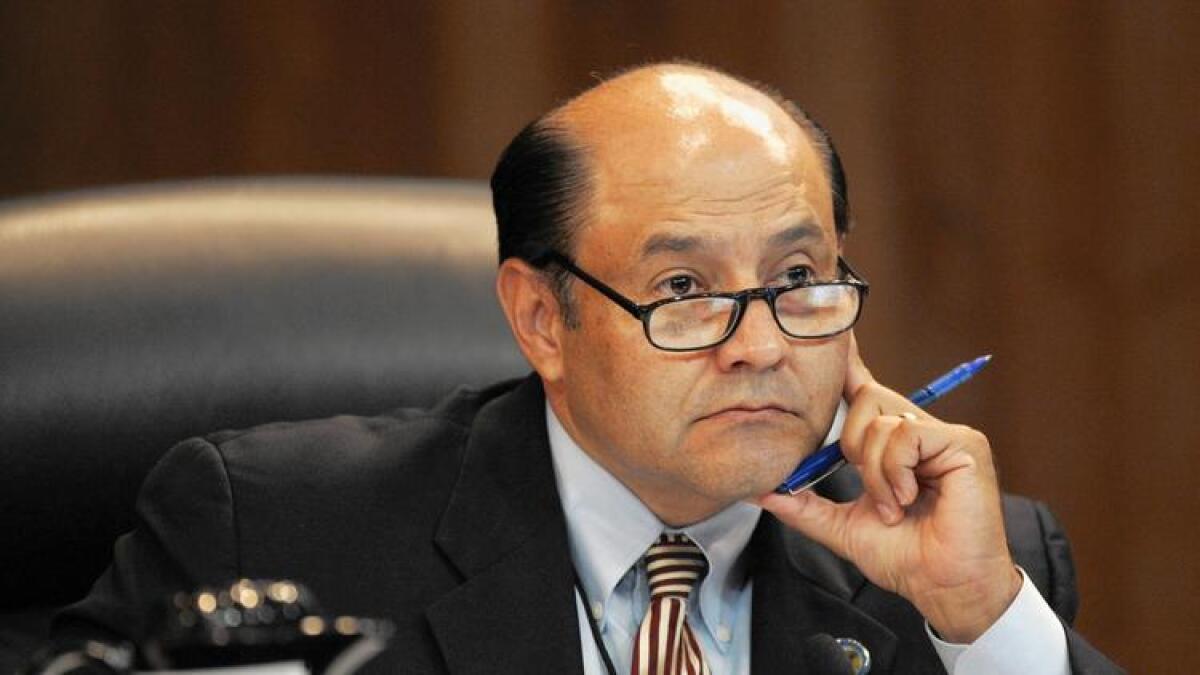
The day Donald Trump became president, the Spanish language translation of the White House’s website went down. An aide quickly said that Spanish version would return once the site was fully updated.
Nearly two months later, there is still no Spanish version of WhiteHouse.gov, and Rep. Lou Correa (D-Santa Ana) is turning to his colleagues in Congress for a fix.
Correa has filed legislation to require the White House and all federal agencies to provide a Spanish language version of their sites.
“It’s really just a matter of making government more transparent, more accountable, more effective for more people,” Correa told The Times. “At the end of the day it doesn’t matter what language you speak, you’re ultimately still a taxpayer.”
Correa represents California’s 46th Congressional District, where more than half of residents speak Spanish at home, according to the U.S. Census Bureau’s 2015 American Community Survey.
He said the bill could be expanded to include other languages.
Correa began asking the White House to restore the Spanish version of the White House site shortly after it went down and has received no response, he said.
“I look at it as a public policy decision that the White House has made,” he said. “You don’t need to take the darn thing down, you just leave it up, it was a public policy decision to take it down. Based on why, I’m not going to speculate.”
The day after the page came down in January, White House Director of Media Affairs Helen Aguirre Ferre said it would be rebuilt and removing the Spanish translation was not deliberate.
On Friday she said they are still still rebuilding the English language version of the site and “will also build a Spanish language one as well.” She said there was no promise to restore it quickly.
In the meantime, she directed people to a Twitter account, @LaCasaBlanca, which publishes tweets in Spanish and English.
Spanish language versions of department and agency websites popped up after President Clinton signed an executive order in 2000 that required federal agencies to provide for people with limited English proficiency. A Department of Justice guideline issued with the order states that federally funded agencies have to make information available either in text or audio to people who don’t speak or read English well.
The order led to the creation of GobiernoUSA.gov, the Spanish language portal to government websites, but most of the major federal departments still provide spotty language access to their sites.
The websites for Housing and Urban Development, the Justice Department, the Transportation Department and the Labor Department all have links prominently displayed on their homepage directing people to a Spanish translation.
The Education and Health and Human Services departments direct those who want a translation to call a phone number for assistance. Others have translations, but they are hard to find. Seven departments have no translation and no indications of whether a translator is available to help.
With $569 million in winter storm damage, Gov. Jerry Brown asks Trump for more federal disaster help
Putting the price tag of California’s brutal winter storms at $569 million, Gov. Jerry Brown asked President Trump on Sunday for a fourth federal disaster declaration to help speed up recovery and repairs across the state.
“California has experienced one of the heaviest precipitation years in its recent history, and the impacts of storms that occurred in January and February have been extremely destructive to the state,” Brown wrote in the letter to Trump.
The request for another disaster declaration specifically mentions the serious damage to both the main and emergency spillways at the Oroville Dam, a crisis that forced the evacuation of almost 200,000 nearby residents on Feb. 11.
The estimate of damages, a number calculated jointly by state and federal teams, was accompanied in Brown’s letter by a long list of storm damage that left Californians fleeing flood waters and a number of roadways damaged by slipping hillsides and erosion.
“I have determined these atmospheric river storm systems are of such severity and magnitude, it is beyond the capabilities of the state and local affected governments, and supplemental federal assistance is necessary,” Brown wrote.
The request comes on the eve of the governor’s four-day trip to Washington, where he is expected to meet with congressional and possibly administration officials. Brown also added two counties on Sunday — Contra Costa and Solano — to 48 other counties covered by an emergency declaration on March 7, an effort to speed up other services in the wake of the winter damage.
Gov. Jerry Brown heads to Washington as Trump and Republicans offer plans with big consequences for California
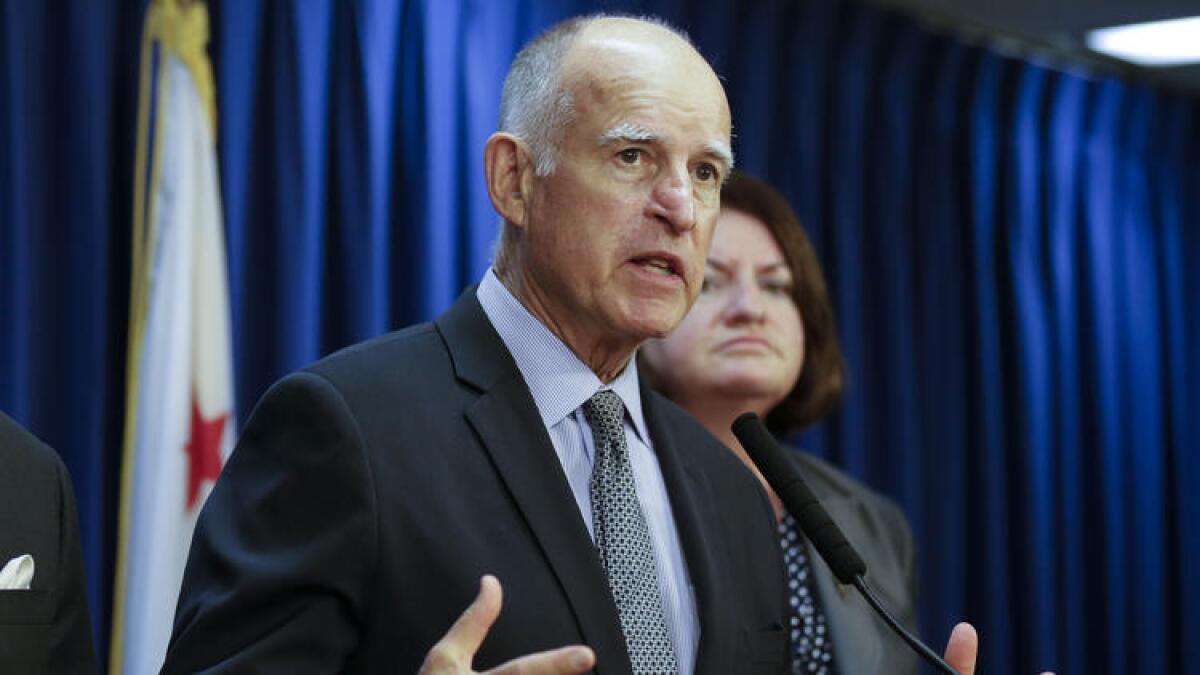
Gov. Jerry Brown is headed to Washington amid increasing worry from state lawmakers that sweeping proposals from President Trump and congressional leaders will hit hard on Californians and several high-profile government programs.
The governor’s four-day trip, which begins Monday, will be his first since Trump took office, and comes less than a week after Brown sharply criticized the president’s proposed path forward on a key environmental policy.
“This is a chance to get a lay of the land in rapidly changing times,” said Evan Westrup, Brown’s press secretary.
While a number of prominent California Democrats have been continuously critical of Trump, Brown has carefully chosen his words and actions. The governor was complimentary of the president’s team during the crisis at the Oroville dam, and Trump subsequently agreed to federal disaster declarations for that incident and in the wake of damage caused by the winter’s massive storms.
“I’m sure California and Washington will work in a constructive way,” Brown said last month after making one of the disaster requests.
The governor also submitted a lengthy wish list of transportation projects this winter, in the wake of the president’s promise to launch a broad and well-funded effort to fund infrastructure projects.
But Trump has rarely held his own fire.
“We give tremendous amounts of money to California,” Trump told Fox television host Bill O’Reilly in February. “California in many ways is out of control, as you know.”
The state receives money from myriad federal programs. Some $105 billion in federal funds are expected in the state budget year that begins in July, about a third of total spending.
Westrup said the governor will likely huddle with members of the state’s congressional delegation, especially fellow Democrats.
The only official item on his schedule as of Saturday was a meeting of directors for the nonpartisan Nuclear Threat Initiative. Brown joined the nonprofit’s board in January.
He has taken a renewed interest in recent months in the danger of nuclear proliferation. “It’s time to wake up America,” the governor said at a January 2016 event resetting the so-called “doomsday clock” of the Bulletin of the Atomic Scientists.
But there are more immediate concerns. His visit will come just days before Republican leaders in Congress are expected to put their controversial healthcare plan up for a vote, a plan that could cut billions of dollars California uses for Medi-Cal, its health program for the poor. Brown is under increasing pressure to plan for the likely fiscal impact to the state.
And then there is his passionate defense of efforts to combat climate change. Last week, he criticized Trump’s decision to ease off vehicle fuel standards. In a letter to Environmental Protection Agency Administrator Scott Pruitt, he called the decision “an unconscionable gift to polluters.”
The governor also may have an interest in making an in-person appeal to federal transportation officials, in the wake of a decision to delay a $647-million grant for commuter rail in the Bay Area. That project is key to Brown’s dream of high-speed rail.
10:21 a.m.: This story was updated with additional details about Gov. Jerry Brown’s trip to Washington, D.C.
This story was originally published at 11:42 a.m. on March 18.
California Politics Podcast: Trump’s plans could have big impacts in the Golden State
Two big efforts by the administration of President Trump have the potential of reshaping some key political and policy debates here in California.
On this week’s California Politics Podcast, we discuss the Trump administration’s actions to sideline existing fuel standards for vehicles and the proposed federal budget that slashes billions in domestic spending. Both could have major impacts on the state.
We also discuss a far reaching proposal by Democrats in the state Capitol to offer a “debt-free” college financial aid plan.
The week also saw the end of an era in Los Angeles politics with the guilty verdict in the trial of former Los Angeles County Sheriff Lee Baca and the death of former state Atty. Gen. John Van de Kamp.
I’m joined by Times staff writer Melanie Mason, along with Marisa Lagos of KQED News and Anthony York of the Grizzly Bear Project.
House Democrats frustrated after immigration meeting with Homeland Security head
Frustrated House Democrats say they got few specifics from Homeland Security Secretary John Kelly when they questioned him Friday in a closed-door meeting about his agency’s efforts to comply with President Trump’s immigration orders.
The orders have caused panic in many of California’s immigrant communities because they are aimed at deporting millions of people who are in the country illegally.
Some Democrats in the meeting said Kelly told them “if you don’t like the law, change the law,” when they complained about how immigration officers seemed to be enforcing laws under Trump.
Several were especially dismayed by what they called Kelly’s dismissive attitude about concerns that immigration enforcement agents have targeted immigrants at churches, schools and courthouses.
“Secretary Kelly seemed almost incredulous that there could be agents that are not following policies and procedures, and I think, given his background as a general, he’s used to chain of command,” said Rep. Linda Sanchez (D-Whittier). “I think he’s learning, probably quickly, that the information he gets back from folks in the field may not always be 100% accurate, and orders that come from the top down may not always be implemented.”
Homeland Security spokesman David Lapan, in a phone call after the meeting, disagreed with Sanchez’s sentiment.
“The secretary was certainly attentive to what they were saying,” Lapan said. “It’s not being dismissive. There are areas where there was just not going to be agreement.”
Rep. Lou Correa (D-Santa Ana) said he presented Kelly with photos of an Immigration and Customs Enforcement vehicle outside Christ Cathedral in Garden Grove, and a letter from Bishop Kevin Vann of the Orange County Diocese asking ICE not to enter diocese property.
“Christ Cathedral is my church. I know what it looks like, and these photos clearly show an ICE vehicle staking out the parking lot,” Correa said in a statement. “This is despicable, and this behavior must end. It is intimidation, and it is wrong.”
In a email to The Times, Lapan indicated the vehicle was in the lot because a Customs and Border Patrol honor guard was attending the funeral of a military veteran. Lapan said churches, schools and hospitals all remain on the list of spaces immigration officials are not supposed to target.
The Democrats also questioned Kelly about plans to separate women and children at the border as a deterrent to entering the country illegally. Sanchez said Kelly assured her that policy has not been put in place, but added that it could be at any time.
“Why wouldn’t we consider ways to keep children off this very dangerous route?” Lapan said. “If we can keep people from making that dangerous journey in the first place, that is the best outcome.”
Democratic members also peppered Kelly with questions about Trump’s orders to build a wall along the country’s southern border and to ban travel from six predominantly Muslim countries.
UPDATES
March 18, 6:52 p.m.: Updated with a statement from about the vehicle outside the church.
4:04 p.m.: An earlier version of this post left out the first reference to Rep. Linda Sanchez (D-Whittier).
Sen. Dianne Feinstein holds impromptu Q&A with activists gathered to protest outside her L.A. fundraiser

Sen. Dianne Feinstein (D-Calif.) takes time to meet with protesters who had a list of grievances against her as she arrived for a fundraising stop in Los Angeles.
Sen. Dianne Feinstein (D-Calif.) held an impromptu question and answer session Friday with a couple of dozen liberal activists outside a Hancock Park home where she was raising money for her 2018 reelection campaign.
Many in the crowd demanded Feinstein take a more outspoken stand against the Trump administration, including filibustering Judge Neil Gorsuch’s U.S. Supreme Court nomination.
Feinstein said “it makes no sense” for her to make up her mind before going through Gorsuch’s cases, adding she was “humiliated” that President Obama’s pick to fill the vacant Supreme Court seat, Merrick Garland, never got hearings.
“[Republicans] took it away from [Obama], don’t think we don’t know it. Don’t think we don’t remember it. And don’t think that that doesn’t stick deeply with us,” she said.
Feinstein was also asked by one protester about Trump’s business connections and how the president might be removed from office.
“We have a lot of people looking at this, technical people,” she said. “And I think he is going to get himself out.”
“I think sending sons to another country to make a financial deal for his company and then have that covered with government expenses — I think those government expenses should not be allowed,” Feinstein said, seemingly in reference to Eric Trump’s trip to Uruguay.
The event drew protesters from various Los Angeles County chapters of the group Indivisible, as well as activists from Our Revolution, a political group formed by Vermont Sen. Bernie Sanders.
One protester pointedly asked Feinstein why she wasn’t committed to blocking Gorsuch, saying, “[Republicans] have not acted like reasonable people, so why are the Democrats acting like reasonable people?”
When another protester shouted at Feinstein to “take a stand,” the senator responded, “Young man, I’ve made more stands in my lifetime than you are old by far.”
Before wrapping up her time with the crowd, Feinstein said she was committed to having a town hall, a central demand of many of the activists who came out Friday.
Many in the crowd thanked her and gave her a round of applause.
“I am very happy people power worked,” said Tudor Popescu, a 37-year-old software engineer and organizer with the Indivisible chapter for California’s 43rd Congressional District in southern Los Angeles County. “It is a step in the right direction, but we have more work to do.”
Before Feinstein came out to speak, Kate Mines, a 35-year-old actress from North Hollywood, said she wanted Feinstein to hold a town hall to hear from constituents.
“Book the Forum, we will fill it up,” she said. “I think she is out of step with the times. She needs to listen to us and hear our concerns.”
Brown administration pressures lawmakers to support road-repair funding plan as support lags for tax hike bill
With a road-repair funding plan lagging in support among Democratic lawmakers, the Brown administration is stepping up pressure on them to reach a deal before the Legislature goes on spring break April 6.
A bill that would raise the gas tax and vehicle fees to provide $5.5 billion annually to fix crumbling roads and improve mass transit needs a two-thirds vote, which would require all Democratic senators to support it given that the Republicans oppose the tax increases.
But two Democrats — Sens. Richard Roth of Riverside and Henry Stern of Woodland Hills — did not vote for the bill, Senate Bill 1, in committee, and a third, Sen. Steve Glazer of Concord, indicated Friday that he is not yet on board.
“The senator is not yet in support of the proposed spending plan or bill,” said Steven Harmon, a spokesman for Glazer. Asked what Glazer wants in the bill to earn his support, Harmon declined to elaborate except to say “he’s communicated his views to leadership.”
Roth abstained from the committee vote on SB 1 even though he acknowledges that a substantial investment is needed in transportation funding, according to spokesman Shrujal Joseph.
“However, historically Riverside County hasn’t always received its fair share of state dollars for its transportation projects,” Joseph said. “ Indeed, the majority of projects have been funded through local “self-help” measures. As a result, it is critical that any new funding proposal result in greater equity for our region.”
Joseph also said it is “important for folks to know where their tax dollars are being spent” and which projects will get the proposed revenue.
“This is something that has yet to be conveyed to the Senator or, quite frankly, to the public,” he said.
Some other senators have complained that the current legislation does not have enough money for mass transit and other alternatives to roads.
Meanwhile, Brian Kelly, who is Gov. Jerry Brown’s appointee as secretary of the state transportation agency, is stepping up pressure on lawmakers to agree to a bill.
On Friday, Kelly’s agency sent out a tweet that said “You shouldn’t have to rely on luck to drive on CA’s roads safely. Tell your legislators it’s time to #FIXCAROADS!”
On Monday, Kelly is scheduled to appear with Mayor Eric Garcetti at a rally in Los Angeles being staged by the advocacy group Fix Our Roads, which said in a news release that the event is being held “to urge legislators in Sacramento to quickly pass a transportation funding package by April 6.”
The group said in the release that immediate action is needed to address the backlog of repairs.
“The longer the Legislature delays on a transportation funding package, the worse the damage gets and the more it costs to fix,” the release said. “Participants in the news conference will call on legislators to set aside any differences and quickly pass a transportation funding bill by April 6.”
White supremacist David Duke tweet about congressional candidate Wendy Carrillo’s ad and earns her some supporters
And he got a bunch of responses like this:
Powerful nurses union backs former Sanders campaign aide in L.A. congressional race
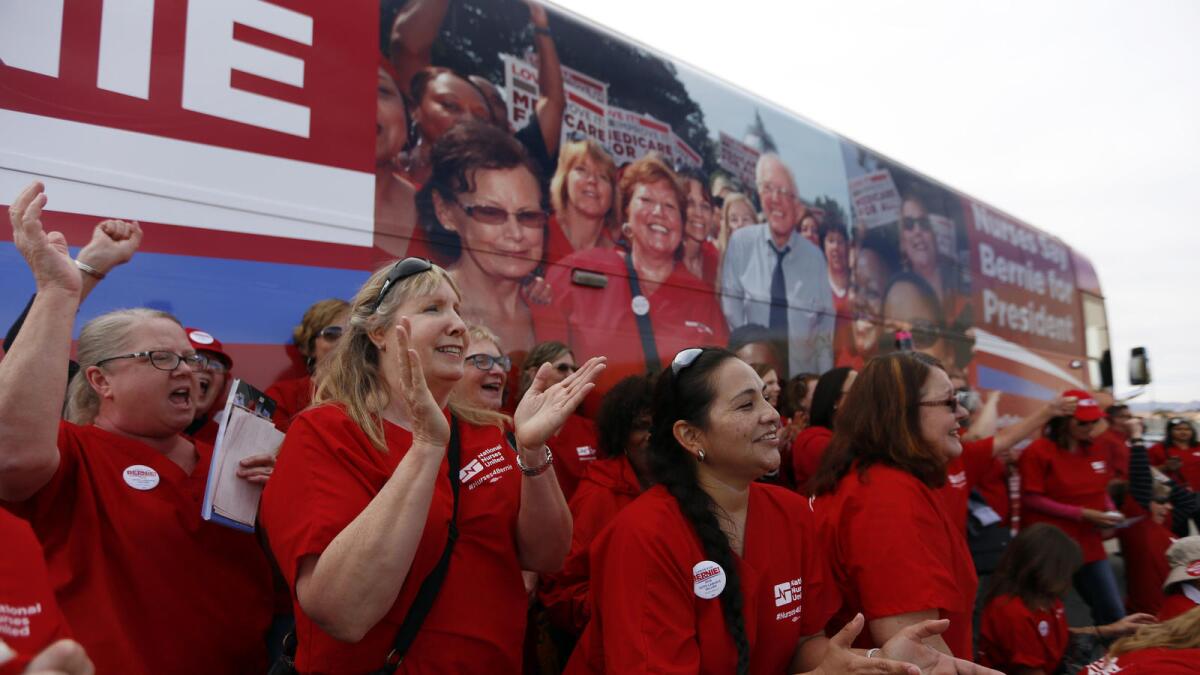
National Nurses United, which includes the powerful California Nurses Assn., announced it is backing former Bernie Sanders aide Arturo Carmona in the race for the 34th Congressional District.
Carmona, who served as Sanders’ deputy political director during the presidential primary, is running on a platform similar to the senator’s, including lowering the burden of student debt and ridding politics of money.
The nurses unions were staunch supporters of Sanders’ presidential bid in California and campaigned beside him for Proposition 61, a prescription drug-pricing measure on the November ballot.
The endorsement comes two days after Danny Glover, another major Sanders surrogate, backed Carmona.
Carmona is one of 23 candidates running to replace Xavier Becerra in the April 4 special election. The top two vote-getters from that contest are expected to face each other in a June 6 runoff.
California’s female lawmakers to Supreme Court nominee Neil Gorsuch: ‘Don’t let us down’
The California Legislative Women’s Caucus appealed to President Trump’s Supreme Court nominee, Neil Gorsuch, to maintain abortion rights, protect Planned Parenthood and uphold gender equity laws in a video released Friday.
The video comes as Gorsuch is slated to appear before the Senate Judiciary Committee next week for his confirmation hearing.
“Since the campaign and even now, as women, we’ve felt like our rights have been under attack. And our Supreme Court justices have a lot of power,” Assemblywoman Cristina Garcia (D-Bell Gardens), the chair of the women’s caucus, said in an interview.
“We want to make it very clear we’re going to be watching and clear what our expectations are,” she said.
While the video is addressed to Gorsuch, Garcia said she hopes the message will resonate with the senators who are considering his nomination. California’s two Democratic senators — Sens. Dianne Feinstein and Kamala Harris — have expressed reservations about Gorsuch, but Garcia said the caucus’ sentiments also are aimed more broadly at Republicans, who control the chamber.
“California has been at the forefront of ensuring women’s rights and fighting for women’s rights,” Garcia said. “We have a sense of responsibility to use our power for more than just California women.”
Danny Glover and environmental groups announce endorsements as L.A. congressional race enters home stretch
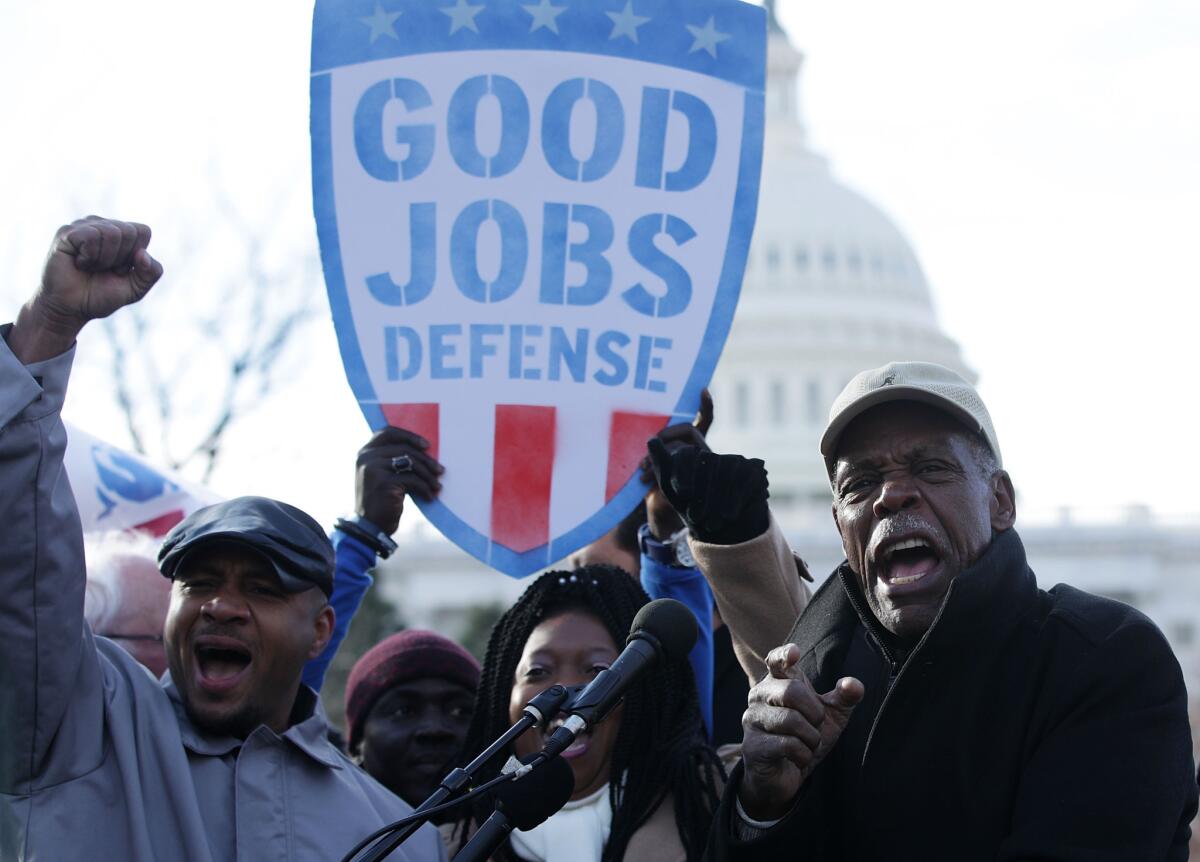
With less than three weeks left in the race to replace Xavier Becerra in Congress, campaigns are rolling out some of their biggest endorsements.
Actor Danny Glover announced Wednesday that he’s supporting Arturo Carmona, a former campaign aide for Vermont Sen. Bernie Sanders. Glover was one of the most visible Sanders surrogates during the Democratic primary last year and stood with Susan Sarandon, Rosario Dawson and other celebrities to protest the Democratic Party’s treatment of Sanders delegates.
“We need bold, progressive leaders like Arturo who are willing to fight with conviction for the well-being of working-class families,” Glover said in a statement released by the Carmona campaign. “Bernie is doing just that, day in and day out. And I know for a fact that Arturo is cut from the very same cloth.”
Carmona is one of three candidates who say Sanders’ movement inspired them to run for office, and many of the senator’s ideas have permeated the debate in the campaign. Observers say the 34th Congressional District race could be the latest test for Sanders’ platform of economic justice and anti-establishment politics in Democratic races going forward.
Also Wednesday, Assemblyman Jimmy Gomez (D-Los Angeles), who has presented a case to potential voters that he is the progressive choice with the most elected experience, announced endorsements from the Sierra Club and the California League of Conservation Voters.
Latinas Lead California, an organization that supports Latinas running for office, endorsed Maria Cabildo, a longtime affordable housing advocate.
The primary election, which features 23 candidates on the ballot, will be held April 4. If no candidate receives more than 50% of the vote, a June 6 runoff will be held between the top two finishers.
School districts would get state money to build teacher housing under new bills
California school districts would get $100 million to help build housing for their teachers under proposed legislation from a Bay Area lawmaker.
Assemblyman Tony Thurmond (D-Richmond) said the state’s housing affordability crisis has made it hard for districts to attract and retain qualified teachers. In the Bay Area, Los Angeles and other high-cost regions, the problem is home and rental costs, Thurmond said in a release, and in rural areas, the issue is a lack of available housing, His Assembly Bill 45 would allow school districts to receive state money to partner with developers to build teacher housing.
“When educators are forced to live outside of the community they serve, they are severely limited in their ability to participate in many after-school programs, establish crucial parent-teacher bonds or respond to localized student needs, all factors in providing an enriched learning environment for students,” Thurmond said.
Districts in Los Angeles and Santa Clara counties already have district-sponsored teacher housing, and San Francisco is considering a plan, according to Thurmond’s office.
California’s senators react to Trump’s budget
Trump’s budget is ‘a complete withdrawal’ of working with states, says Gov. Jerry Brown’s budget chief
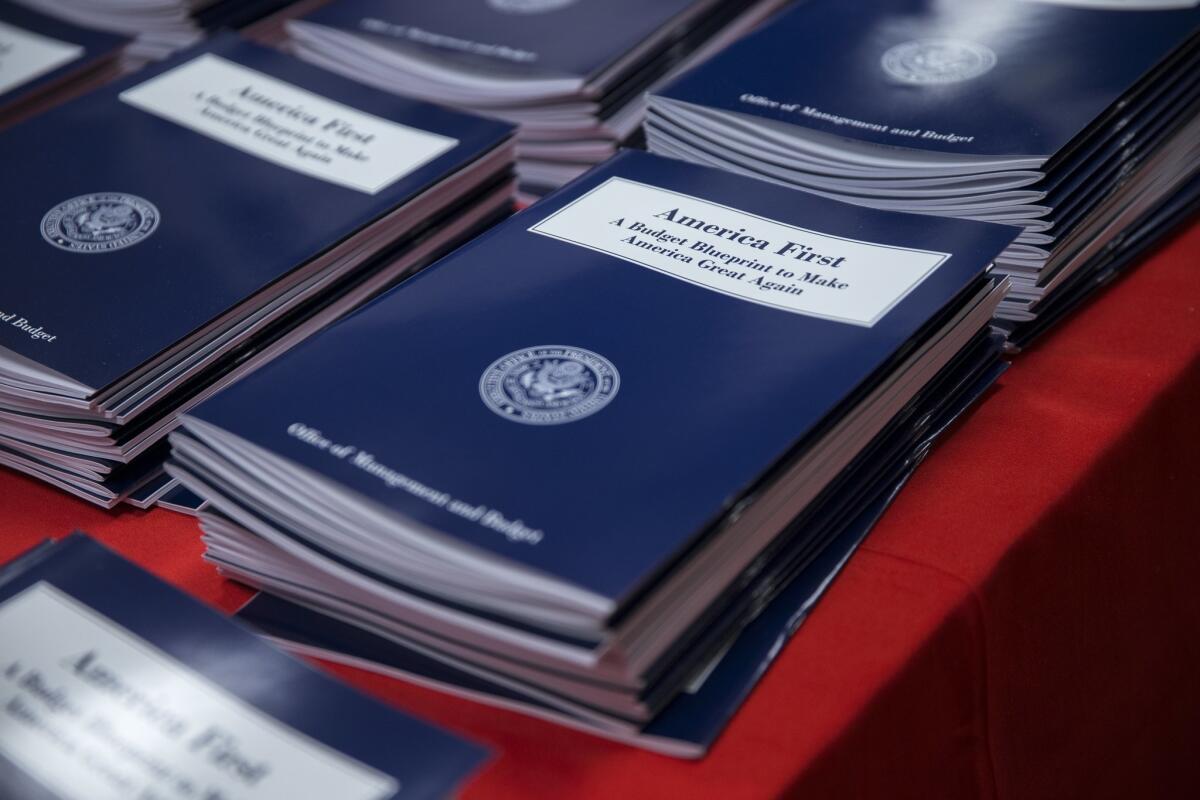
President Trump’s proposed federal budget would dramatically shrink the nation’s role in solving important issues in California, according to an early analysis by advisers to Gov. Jerry Brown.
“It’s hard to know where to begin,” said Brown’s budget director, Michael Cohen. “The president’s budget proposes a complete withdrawal of the federal government’s commitment to working with states to solve the critical issues of the country, from environmental protection and emergency preparedness to transportation and other infrastructure.”
Domestic programs from environmental protection efforts to housing assistance could see double-digit percentage cuts in the federal budget the Trump administration unveiled on Thursday.
The broad impact to California from the cuts to a variety of domestic programs could take weeks or months to fully assess, though it’s far from clear that Trump’s current plan could muster the necessary support in Congress.
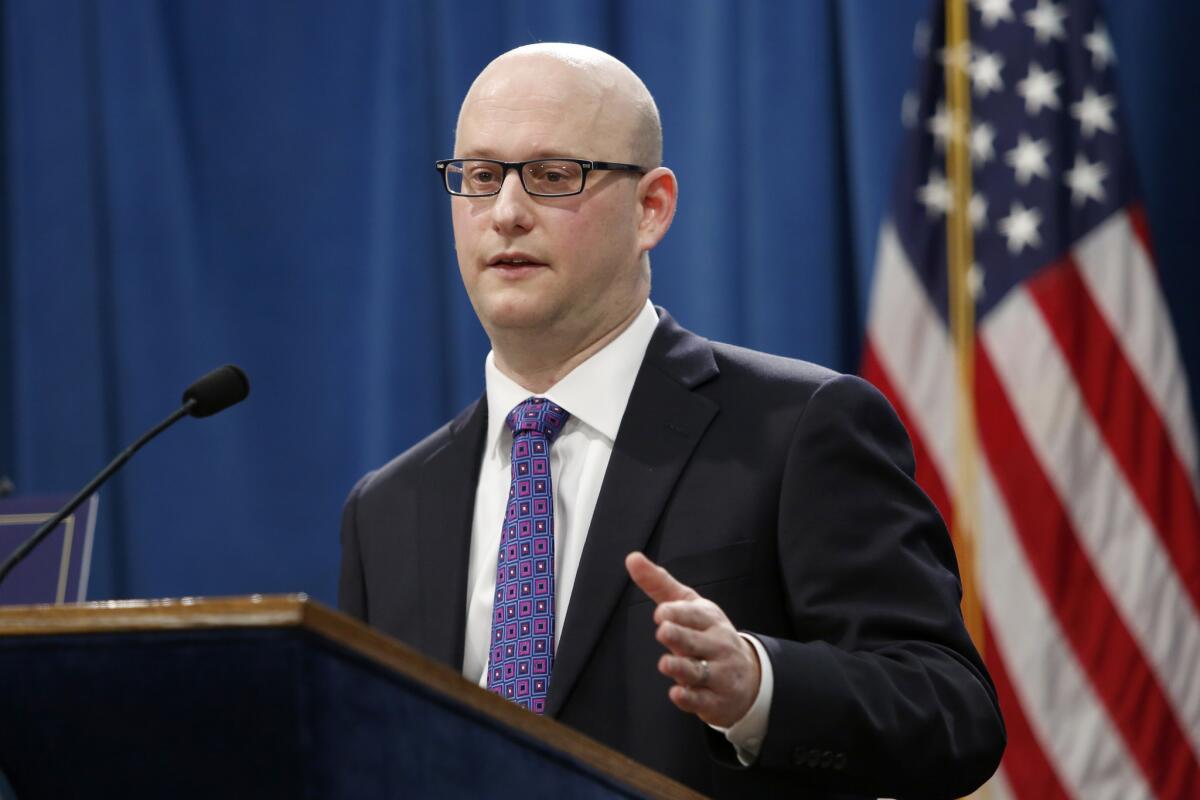
Brown administration officials pointed out early concerns about the elimination of community development block grants and limited grant funding for rail and transit projects.
The larger concern for state budget writers is the $66.8 billion in federal healthcare funds assumed in Brown’s plan for the fiscal year that begins July 1. Those dollars represent 63% of the federal funds allocated under the state budget, while many of the other dollars are sent directly to local communities. The allotment of healthcare dollars, found in the state’s Medi-Cal program, depend less on Trump’s budget and more on the fate of the congressional Republican healthcare plan.
The governor lashed out at that proposal Monday, calling it “a really dumb idea” on Twitter.
Budget writers in Sacramento are about to embark on the most consequential part of the year in crafting a fiscal blueprint for the state. But rarely has federal spending been as large of a factor as it could be in 2017.
Brown estimated a $1.6-billion deficit in his January proposal. Tax revenues collected through the middle of April will largely dictate spending decisions made by state lawmakers prior to June 30, the deadline to enact a new budget.
Democratic and Republican legislative leaders join to fight campaign finance rule change
In a rare bipartisan agreement, the leaders of the Democratic and Republican caucuses of the state Senate and Assembly have united to fight a proposal by the state’s campaign watchdog agency to change the test for when a candidate controls a political committee.
The rule change considered Thursday by the state Fair Political Practices Commission was opposed in a letter from Senate President Pro Tem Kevin de León (D-Los Angeles), Assembly Speaker Anthony Rendon (D-Paramount), Senate Republican leader Jean Fuller of Bakersfield and Assembly Republican leader Chad Mayes of Yucca Valley, all on behalf of their caucuses.
“Our collective opposition is based on our view that the proposed regulation is inconsistent with the current statutory definition of a controlled committee, creates a vague and uncertain test, and will likely result in unintended consequences that could actually undermine the purposes of the Political Reform Act,” the four leaders said.
The commission staff proposed to incorporate some of the legislators’ recommendations but the panel decided Thursday to delay action for a month at the request of new Commissioners Allison Hayward and Brian Hatch, who wanted more time to review the last-minute changes.
Determining that a candidate controls a political committee means the committee may be subject to the contribution limits that apply to the candidate and is identified in mail and ads as controlled by the candidate.
The proposed new rules might have determined that a candidate controls a committee based on factors that include whether he or she serves on its governing board, even if the candidate can be outvoted, or raises an “extensive” amount of money for the committee.
“No definition of ‘extensive’ is provided, and it seems quite plausible that a candidate could, through minimal effort, raise an extensive amount, but play no other role in influencing how those funds are spent or the committee operated,” the legislators wrote.
Commissioner Hayward had concern about determining a politician is exerting significant influence on a committee if he just raises money. “Control comes on the expenditure side,” she said.
The commission staff proposed to remove the “extensive” fundraising provision.
The rules can also hurt disclosure, they argued. If the tobacco industry forms a committee and enlists a city council member to sit on its governing board, the committee might be identified in mailers as the council member’s, not the tobacco industry’s, the legislators argued. They proposed the FPPC instead create a process that allows candidates to show that they do not have significant influence on a committee even if they raise money for it or sit on its governing board.
Updated at 2:30 pm to include that the commission delayed action on the plan.
Republican John Cox is the million-dollar candidate
Man pulls down gay pride flag outside Rep. Alan Lowenthal’s Washington office
An unidentified man entered Rep. Alan Lowenthal’s Capitol Hill office Wednesday upset about the display of a gay pride flag and pulled it from its stand outside the office to forcefully and repeatedly step on it, the Long Beach congressman said Thursday.
The incident occurred after the man told Lowenthal’s staff that it was “immoral” and “disgusting” to fly the flag associated with the gay rights movement near the American flag, Lowenthal said.
“The fact that someone would grab a flag that they didn’t like and not just throw it on the ground, but stomp all over it ... it’s certainly shocking,” he said.
Lowenthal was not present, but his chief of staff and other staff members followed the man down the hallway and urged him to return to the office and speak with Capitol police.
Capitol police spoke with the man at the office, Lowenthal said.
“They told us he didn’t break any rules or any laws, so they let him go,” he said.
A Capitol police spokeswoman said they do not comment on ongoing investigations.
Lowenthal, vice chairman of the House LGBT Caucus, has displayed the gay pride flag outside his office since 2013. He said he was told at the time it was the first of its kind to be displayed at the Capitol. He said passersby often comment that they’re happy he’s displaying the flag, but this is the first incident of someone having a negative comment about it or touching it.
“I just think it’s terrible. I’m just shocked that it happened,” Lowenthal said. “It just reinforces my belief that more work needs to be done.”
The flag already is back on display.
“We’re proud to fly the pride flag, and we’re going to continue to show how proud we are,” Lowenthal said.
Many members of Congress have displays outside their Capitol Hill offices. Several members of the California delegation display pride flags alongside the American flag and the California flag, and they jumped to Lowenthal’s defense.
1:04 p.m.: This post has been updated with comment from the United States Capitol Police.
It was originally published at 10:19 a.m.
Vulnerable California Republicans find themselves at center of healthcare bill persuasion efforts
Seven California Republicans are among the 23 Republicans nationwide who represent House districts that chose Hillary Clinton for president. Now they find themselves at the center of the debate over the proposed House GOP healthcare bill.
While Republicans hold a large majority in the House, more than two dozen GOP defectors would be enough to keep the bill from passing. And after an independent analysis found 24 million fewer Americans would have health insurance by 2026 under the GOP plan, support for the bill seems shakier than ever.
Support was already wobbly among far-right Republicans who say the bill doesn’t really overturn President Obama’s signature Affordable Care Act, and some centrist Republicans are nervous about fallout because of the millions of people expected to lose insurance.
That has turned attention to shoring up, or pulling away, the votes of Republicans whose districts favored Clinton for the presidency.
Republican advocacy group American Action Network announced this week it is running $1.5 million in ads in some of the districts to push for the bill’s passage, and nationally during MSNBC’s “Morning Joe.”
One of the congressmen featured in the ads — Rep. Darrell Issa (R-Vista) — said earlier this week that Republicans can do better and he is “not prepared” to support the GOP healthcare plan yet. Some other Republicans in the ads, such as Rep. Jeff Denham (R-Turlock) and Rep. David Valadao (R-Hanford) have either said they are still reviewing the bill, or haven’t made a public comment on it at all. Rep. Mimi Walters (R-Irvine) is the only California Republican who is being targeted by Democrats in 2018 who has indicated she supports the bill.
Liberal groups are putting on pressure as well. Local groups associated with the national group Indivisible have spent weeks demonstrating each Tuesday outside members’ offices.
And MoveOn.org is holding day-long healthcare “stakeouts” outside 23 House offices and nine Senate offices Thursday and Friday. They’ll feature constituents chanting and telling healthcare stories. The seven California Republican-led districts that went for Clinton are all on Moveon.org’s list.
California gas prices could rise if the state’s cap-and-trade program is extended, legislative analyst says

As California lawmakers debate the future of the state’s battle against global warming, there’s one politically sensitive issue they’ll have to consider: gas prices.
Gov. Jerry Brown wants lawmakers to extend the cap-and-trade program, which requires companies to buy permits to release greenhouse gas emissions. Right now, the price of permits sold in state-run auctions is less than $14.
However, if the program is extended and the state pushes forward with its tougher climate goals, the price of allowances could rise to $50 over several years, according to Ross Brown from the nonpartisan Legislative Analyst’s Office.
If that happens, drivers could see the price per gallon of gasoline increase by 45 cents. A separate policy, known as the low-carbon fuel standard, is also expected to increase gas prices.
The estimates were provided during a legislative hearing on Wednesday in response to a question from Assemblyman Vince Fong, a Republican from Bakersfield.
Brown’s administration said extending cap and trade is “necessary to meet the statewide climate goals” and reduce “significant volatility” in revenue generated from the sale of permits. The governor is counting on the money to help finance the bullet train from Los Angeles to San Francisco.
Father of victim in deadly Oakland warehouse fire tells state lawmakers that more affordable housing is needed

The father of an artist who was among the 36 people killed during a fire inside an Oakland warehouse told state lawmakers on Wednesday that California needs more affordable housing and safe performance venues in order to prevent similar tragedies.
Edwin Bernbaum’s 34-year-old son, Jonathan Bernbaum, an artist and video DJ who lived in Oakland, died in the catastrophic Dec. 2 fire at the warehouse during a late-night concert.
“This is something that Jonathan would have loved to have seen done. ... I think it would be a great way to honor the victims,” his father told the Senate Governance and Finance Committee. “The important thing is safety and having places where people can live and not be in danger.”
Bernbaum said his other son had attended a concert at the same warehouse years before and thought it was so unsafe he vowed never to return.
Jonathan Bernbaum was a graduate of Brandeis University and USC’s School of Cinematic Arts. He traveled around the world performing.
The Senate committee, chaired by Sen. Mike McGuire (D-Healdsburg), was focused on preventing similar tragedies in California and reviewing fire, building and safety regulations. McGuire said the committee plans to form a working group to explore possible legislation or changes to state building and fire codes.
Wednesday’s hearing was not contentious, focusing mostly on the need for affordable housing and how the enforcement of building and fire codes could be improved.
Sen. Nancy Skinner (D-Berkeley), whose district includes the neighborhood where the fire occurred, said she hopes the committee’s work will lead to new policies to help state and local government avoid similar tragedies.
“The focus of the hearing is not to try to point fingers or blame on any entity because the tragedy was too great at this point for us to do it,” Skinner said.
The families of two victims have filed legal action against the city and Alameda County, as well as the building owner and concert promoter.
The Alameda County district attorney’s office has opened a criminal investigation into the fire.
Long Beach Fire Department Chief Michael DuRee, who also serves as the president of the California Fire Chief Assn., told the committee he does not believe new laws are required, saying current fire and safety codes are adequate if they are aggressively enforced.
Dozens of people were trapped inside the warehouse, known as the Ghost Ship. It was cluttered with artist lofts and non-permitted makeshift living quarters, making it difficult for people to escape when the fire broke out, according to firefighters and former tenants.
The warehouse and an adjacent vacant lot had been the subject of 10 code enforcement complaints and 39 code enforcement inspections since 2004, city records show.
Despite mounting evidence that the warehouse had been converted into an illegal residence and music venue, the city never moved to shut down the Ghost Ship. The city had received several complaints that the conditions inside the warehouse were unsafe, including reports of piles of trash and faulty electrical wiring.
“The Ghost Ship fire is a wake-up call for all local governments,” McGuire said.
____________
UPDATES
3:04 p.m.: This post was updated with more comments from the hearing.
This post was originally published at 11:31 a.m.
California issues warning on vehicle rules to President Trump and automakers
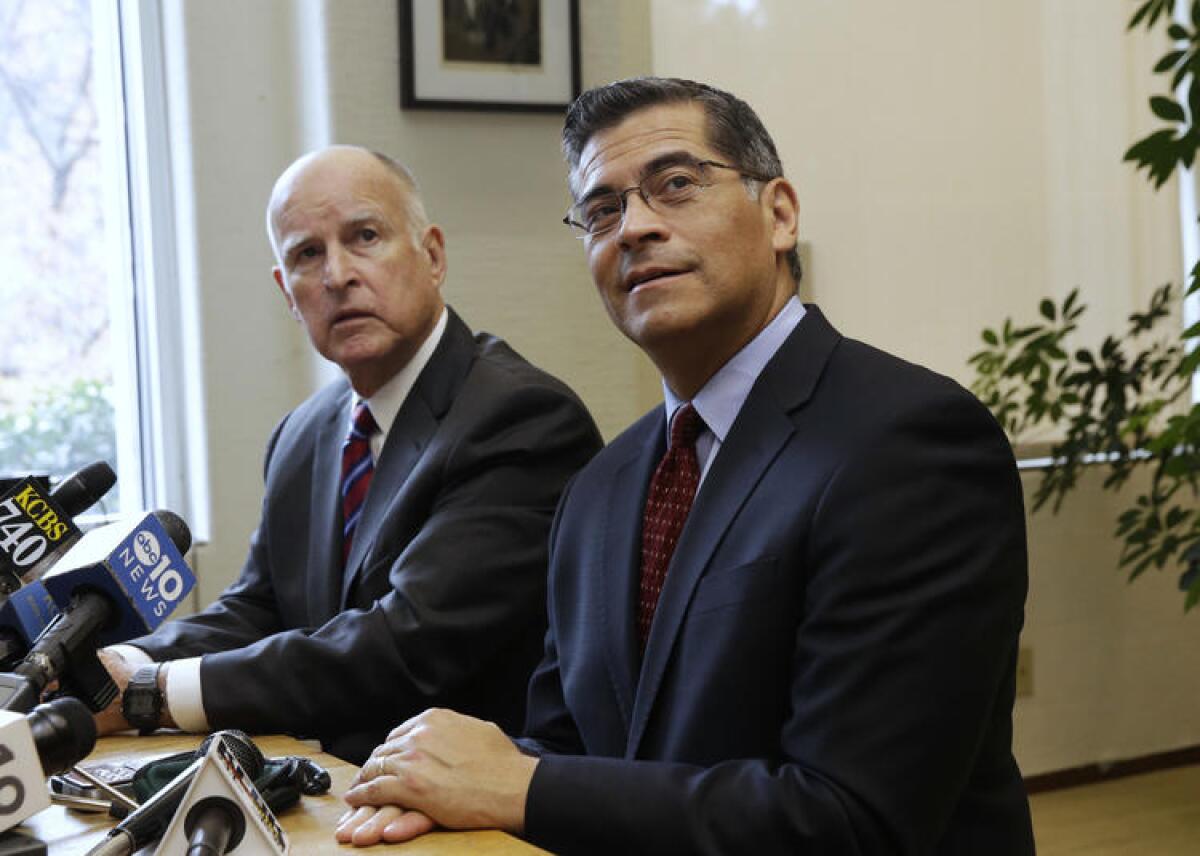
Gov. Jerry Brown lashed out at the Trump administration and automakers on Wednesday after the president began rolling back federal regulations on fuel efficiency.
Brown called the decision “an unconscionable gift to polluters” in a letter to U.S. Environmental Protection Agency Administrator Scott Pruitt.
“If Washington continues down this road, California will take the necessary actions to preserve current standards and protect the health of our people and the stability of our climate,” he wrote.
California leaders are already moving to defend the regulations in court.
Brown sent another letter to the leaders of major automaker associations, saying their push to loosen rules “breaks your promise to the American people.”
“Advances in fuel efficiency technology have worked for everyone,” he wrote. “They have saved Americans money at the pump, cut oil consumption, reduced air pollution and helped fight climate change.”
State regulators plan to reaffirm the state’s commitment to increased vehicle mileage standards later this month. California has unique authority under the Clean Air Act to set its own, tougher standards, but that autonomy could face increased pressure from car manufacturers and Trump’s anti-regulatory administration.
Federal law allows other states to emulate California’s standards, and several of them are also planning to oppose the Trump administration’s efforts.
“We won’t hesitate to stand up for the right of our states to adopt stricter pollution standards that provide critical protections to the health of our residents and our environmental resources,” said New York Atty. Gen. Eric Schneiderman in a statement.
Democratic challenger hits Rep. Dana Rohrabacher on Russia
Rep. Dana Rohrabacher’s long-running defense of Russia is the centerpiece of a new online ad from one of his 2018 opponents, Laguna Beach real estate businessman and attorney Harley Rouda.
The ad, which will run on Facebook, begins with several recent interviews by Rohrabacher focused on Russia or nearby Baltic states.
Rouda, 55, then asks the camera: “Had enough of him? I have.”
Rouda calls Rohrabacher “one of the most entrenched members of Washington’s establishment.” He says that if he is elected to replace the Orange County Republican, he would get “tough on Russia.”
Two congressional committees are investigating alleged Russian attempts to interfere in the 2016 presidential election. Rohrabacher has been dismissive of concerns that Russia tried to interfere, saying that the United States has interfered in the elections of other countries.
Though political challengers have tried using Rohrabacher’s outspoken defense of Russia against him in the past, he has gone on to win reelection by large margins. But his Huntington Beach district seems to be changing. Though reelecting Rohrabacher by a 16.6% margin in November, voters in the district narrowly picked Hillary Clinton for president, and protesters have demonstrated outside his office repeatedly since President Trump was sworn in.
Rohrabacher said Wednesday that the contacts he’s made in and out of the country during nearly three decades in Congress benefit his constituents.
“I have a very laudable track record when it comes to both foreign policy, and technology and science policy,” he said. “I am very confident that what I have accomplished has been good for our country and made a major difference. My constituents will, I believe, be able to see that.”
Rouda announced his bid to challenge Rohrabacher on March 3. Fellow Laguna Beach Democrat Boyd Roberts, a 57-year-old real estate broker, has also announced plans to run, saying his campaign will rest in large part on attacking the congressman’s friendly views toward Russia.
____________
UPDATES
3:08 p.m.: This post was updated with a response from Rep. Dana Rohrabacher.
This post was originally published at 12:21 p.m.
Interfaith march on state Capitol supports sanctuary, religious freedom bills
Claiming momentum is on their side, California lawmakers try again to require more transparency on drug prices
California Democrats, labor unions, health insurers and consumer advocacy groups — along with newly joined backer Tom Steyer, the billionaire activist — are restarting their effort to shed more light on prescription drug prices after a similar measure sputtered last year.
State Sen. Ed Hernandez (D-West Covina) unveiled his new bill at a Capitol news conference Wednesday. He said the legislation would curtail the “arms race of profit generation” by the pharmaceutical industry by requiring manufacturers to give 90 days’ notice to purchasers before significantly increasing a drug’s price.
The proposal, SB 17, also would require health plans to release data on drug purchasing trends, including the most prescribed and most expensive medications.
The plan comes as escalating drug prices continue to capture national attention, most recently when the cost of EpiPens, used to treat severe allergic reactions, surged by more than 500%.
Supporters were quick to acknowledge the firepower of the pharmaceutical industry, which raised more than $100 million to defeat a Bernie Sanders-endorsed ballot measure last year aimed at curbing what state agencies could pay for prescription drugs.
But backers of the legislation said the political climate favored their cause.
Since introducing his previous bill last year, Hernandez said “over 20 states across the nation have been following suit, and the industry has started to restrain themselves to avoid public scorn.”
“Transparency works, and that’s why drugmakers will fight this bill,” Hernandez said.
Priscilla VanderVeer, a spokeswoman for the Pharmaceutical Research and Manufacturers of America, or PhRMA, said the association was willing to work with lawmakers on the issue, but signaled wariness of Hernandez’s proposal.
“Rather than creating a new bureaucratic system that creates layers of red tape, Californians would be well served if we focus on market-based solutions that better align payment with the value to the patient,” VanderVeer said in a statement. “Just as a one-size-fits-all [approach] doesn’t work in caring for patients, neither should we use that strategy in pricing medical care.”
She also countered the narrative of surging prices, noting that the federal government expects drug costs to follow the same cost trends as the rest of the healthcare sector.
“We should not legislate to a one-year spike that occurred now more than two years ago,” she said.
As the bill’s proponents girded for battle against drug manufacturers, they vowed to flex their own political muscle.
Caitlin Vega of the California Labor Federation, a co-sponsor of the bill, said the group’s members “will fill the halls of the Capitol to tell their stories and to explain why this bill is so important.”
Steyer, who is considering a gubernatorial run in 2018, said it’s not yet been determined how his group, NextGen, will rally for the measure.
“We want to make sure that this process is transparent, so that people in California who are paying outrageous prices for medical care and for drugs ... know who is representing their interest and who isn’t,” Steyer said.
Nunes and Schiff say they’ve seen no evidence to back Trump’s wiretapping claim
The Californians leading the House Intelligence Committee said Wednesday that they’ve seen no evidence to support President Trump’s claim that he was wiretapped by President Obama before he took office.
“We don’t have any evidence that that took place,” Rep. Devin Nunes (R-Tulare), the chairman of the House Intelligence Committee, said at a press conference with Rep. Adam Schiff, (D-Burbank), the top Democrat on the panel.
In a series of tweets on March 4, Trump accused President Obama of wiretapping him and he urged Congress to investigate the claim.
Legislation takes aim at speedy approvals for megaprojects
The Los Angeles Rams and other large developers across California have ballot initiatives to secure fast-track approvals for their projects — and sidestep the state’s environmental rules.
But a new proposal from Assemblyman Jose Medina (D-Riverside) aims to end that practice, arguing that only the wealthy and powerful benefit from the maneuver.
California is stepping up to fight Trump’s efforts to roll back emissions rules
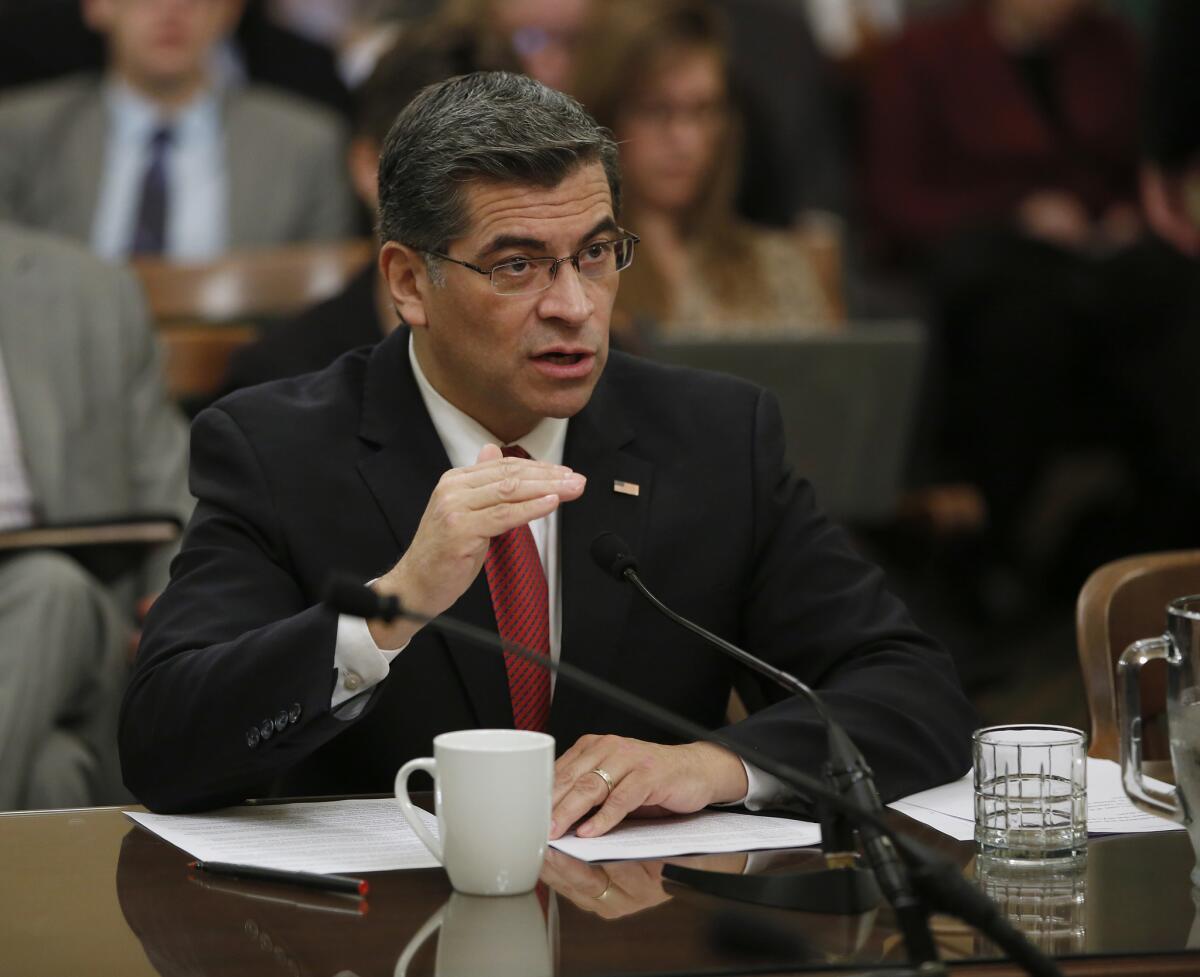
California is already stepping forward to fight President Trump’s effort to roll back tighter rules on vehicle emissions.
State Atty. Gen. Xavier Becerra filed a legal motion, dated on Tuesday, to defend the rules, which Trump is targeting in an announcement on Wednesday.
“Any weakening or delay of the national standards will result in increased harms to our natural resources, our economy, and our people,” the court filing says.
California has unique authority under the Clean Air Act to pursue tighter rules than federal standards, and the state is already planning to push forward with those rules.
But as the federal government moves in a different direction, the state could come under increased pressure to relax its own policies.
“If California decides they want to go in a different direction or we want to go in a different direction, we will have to deal with it at some point,” said a senior administration official ahead of the president’s announcement.
Bernie Sanders matters in the race for Xavier Becerra’s L.A. congressional seat
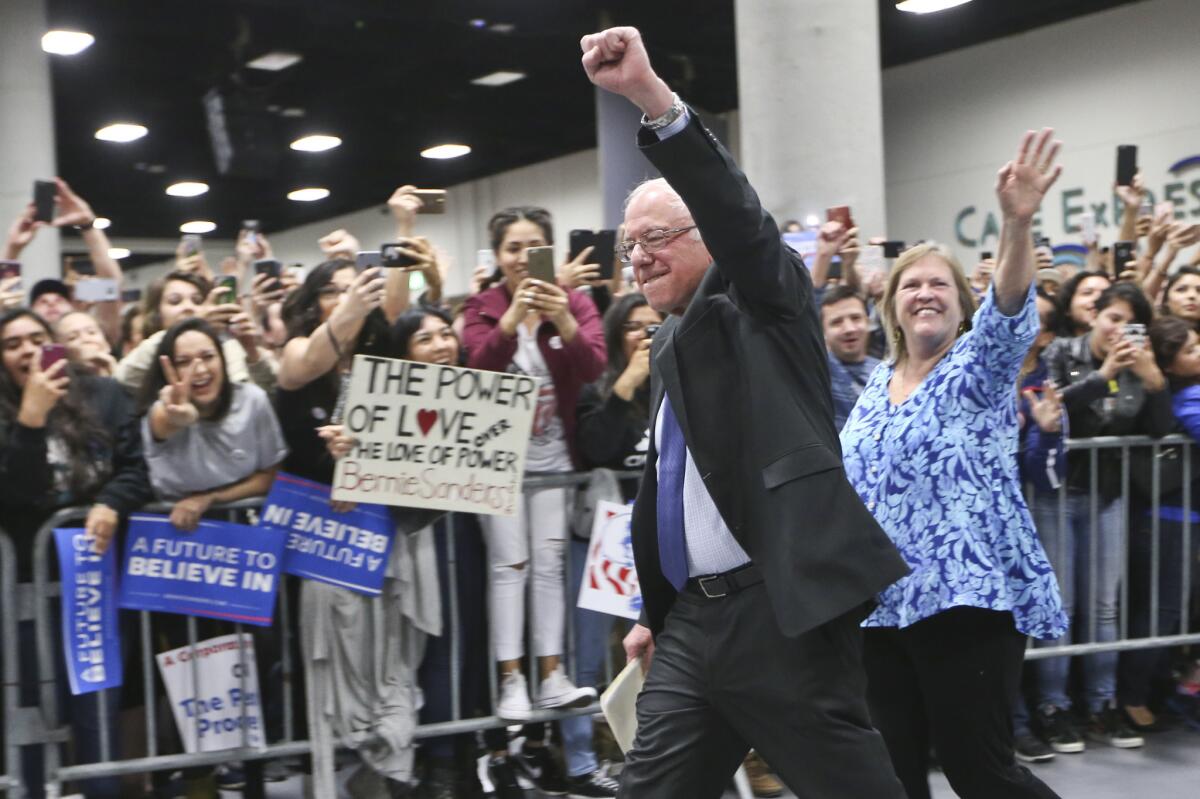
Vermont Sen. Bernie Sanders’ progressive ideas, which won him a national following and helped him capture the 34th Congressional District from Hillary Clinton in the primary last year, have given the race a decidedly leftward tilt in the heavily Democratic enclave.
At least three candidates in the 34th District say Sanders, in part, inspired them to run. Candidate forums and campaign events ahead of the April 4 primary abound with references to ridding politics of money and fighting the Democratic establishment, in addition to opposing President Trump.
How Rep. Dana Rohrabacher, a former Reagan speechwriter, came to be known as ‘Putin’s favorite congressman’
Rep. Dana Rohrabacher makes no apologies for his fondness for Russia.
That position has put the iconoclastic Huntington Beach Republican and onetime speechwriter for Ronald Reagan at odds with many in his own party for decades. But now, in the midst of a roiling investigation into Russia’s influence in the 2016 presidential election, he’s in sync with at least one very important person — the current president of the United States.
How did the former Reagan speechwriter come to his current position? It started on a battlefield in Afghanistan.
This Democrat and geologist says she is considering a run for Republican Rep. Steve Knight’s seat
Geologist Jess Phoenix, a Democrat, is considering challenging Rep. Steve Knight (R-Lancaster) in the 2018 midterm elections as part of a larger effort to get scientists elected to Congress.
Phoenix, a volcanologist who runs an educational science nonprofit called Blueprint Earth that researches the Mojave Desert, said she is “90-plus percent sure” she will run for the 25th Congressional District and plans to launch her campaign in early April.
Phoenix, 35, is running with assistance from 314 Action, a 501(c)(4) nonprofit organization formed to recruit candidates with science backgrounds and help them launch campaigns for public office.
The group is named after the first three digits of the mathematical constant pi and was set to have a candidate training event in Washington, D.C., on Tuesday — Pi Day — but canceled the event when a snowstorm came through town. BuzzFeed highlighted Phoenix’s candidacy in a story about the group Tuesday.
The organization is targeting three Republican members of the House Committee on Science, Space and Technology: Knight, Rep. Dana Rohrabacher (R-Costa Mesa) and Rep. Lamar Smith (R-Texas). Its website links to a series of House votes by Knight that went against the League of Conservation voters.
Shaughnessy Naughton, a chemist and former congressional candidate who founded the group, said over 3,000 prospective candidates have contacted the group about running for seats on local school boards, state houses and in Washington.
Phoenix said she has never run for office. She used to live in the district in Simi Valley but moved to Burbank to be close to an equestrian center there. She intends to move to Acton, which is in the district, with her husband and their horses.
Though new to politics, Phoenix said she has an “ability to connect and compromise” with people thanks to science lectures she has given and her work with students through her nonprofit. She used to go by Jess Peláez but is in the process of changing her last name.
Phoenix, who was featured on the Discovery channel program “Trailblazers” last year, said she likes taking risks.
“I think if you can walk up to an actively erupting volcano, you can do just about anything,” she said.
Democrat Katie Hill launched her campaign for the seat last week. Democrat Bryan Caforio, who lost to Knight in November, said last week he was considering running for the seat again in 2018.
National Democrats have targeted Knight’s seat as one they want to flip in 2018.
State Senate panel throws support behind ballot measure to safeguard transportation funds
A state Senate panel on Tuesday supported a ballot measure that would prohibit the state from borrowing money from vehicle fees and gas taxes for use by non-transportation programs.
The measure by Sen. Josh Newman (D-Fullerton) is being considered as Gov. Jerry Brown and lawmakers negotiate toward a deal to make progress on a $132-billion backlog of repairs and improvements for local roads and state highways.
Tax and fee increases have been proposed to raise $5.5 billion annually for road repairs and transit.
Newman told the Senate Transportation and Housing Committee on Tuesday that said his proposed constitutional amendment is needed because “prior history raises concerns that new revenue may be diverted for other purposes.”
Republicans have criticized the state for taking $1 billion annually from truck weight fees and using the money to pay down general obligation bonds for transportation projects when those bonds in the past were covered by the general fund.
The committee voted 9-0 to support putting the constitutional amendment on the ballot. Republicans withheld their votes, saying they want more safeguards in the proposal. The measure still has to be approved by the full Senate and Assembly.
Congressional candidate Wendy Carrillo delves into her immigration story in emotional video ad
Since announcing her run in the 34th Congressional District, Wendy Carrillo’s immigration story has been front and center.
Carrillo, who was brought to the country illegally by relatives as a child, wrote about fleeing war and violence in El Salvador and later discovering she was living illegally in the U.S. on the day she entered the race.
The opening ad of Carrillo’s campaign, released Tuesday, attempts to crystallize for voters how her origin story pushed her to enter the race.
“I’m running for Congress because I believe that there should be more people like me at the table,” says a teary-eyed Carrillo in the 90-second ad, titled “Unapologetic.”
“We can’t continue to talk about immigrants and refugees and war and violence and why people migrate without considering the reasons why people do that.”
Immigration and protecting families in the country illegally have been a central theme of the race, and half of the candidates running have immigrant stories of their own. The ad will run online, said Carrillo spokesman Ross Morales Rocketto.
The primary election is scheduled for April 4. If no candidate gets more than 50% of the vote, the top two candidates will advance to a runoff election on June 6.
Green projects face scrutiny as California lawmakers debate cap and trade
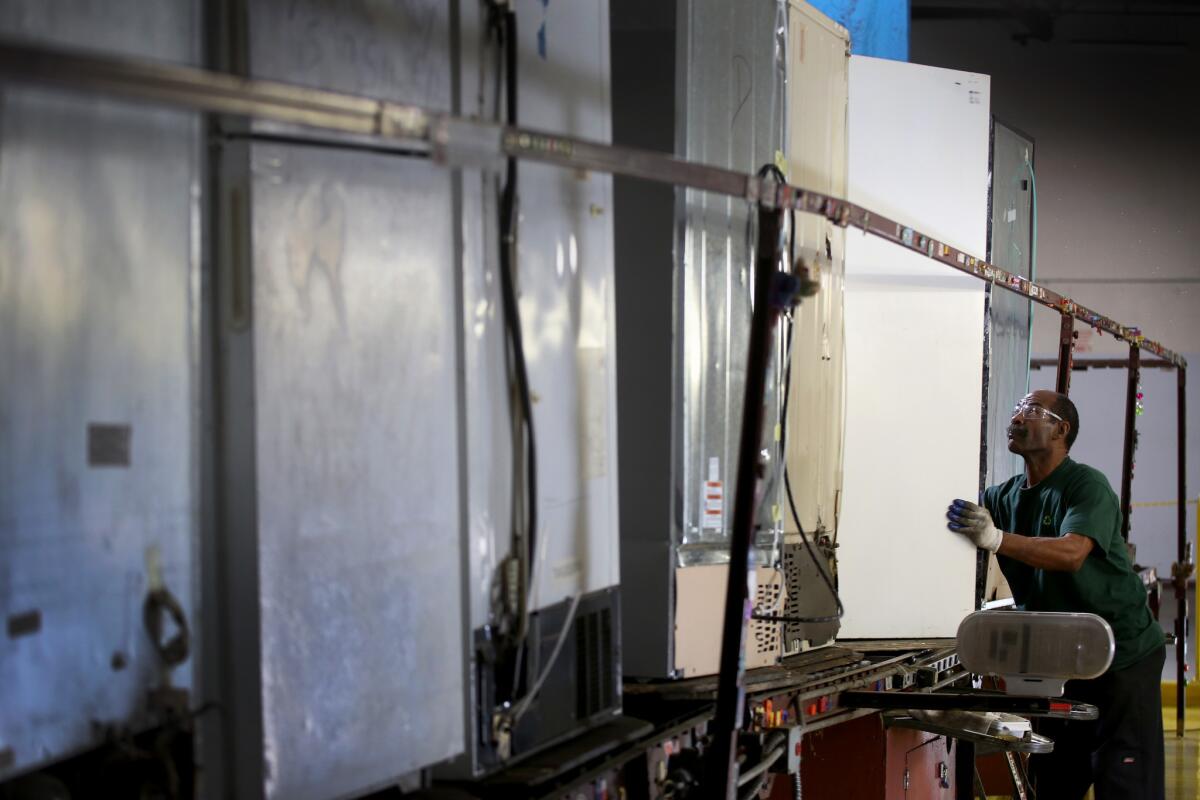
Since Gov. Jerry Brown asked lawmakers to extend California’s cap-and-trade program, a broad cross-section of state policies on climate change are coming under the microscope.
One of the most controversial issues is carbon offsets, which are environmentally friendly projects that polluters can financially support to meet requirements to slash greenhouse gas emissions.
Offsets have long been opposed by environmental justice advocates, who view them as an escape hatch for companies to avoid directly reducing their own emissions. But now that the advocates have gained political strength in the Capitol, they might be able to limit the program during this year’s debate.
A legislative hearing is scheduled for Wednesday on Brown’s effort to expand cap and trade, which requires companies to buy permits to release greenhouse gas emissions.
The governor hopes to preserve revenue that’s generated when the state auctions the permits because some of the money is being used to finance the bullet train from Los Angeles to San Francisco.
State officials announced Tuesday that $3.4 billion has been appropriated by lawmakers in recent years, with $1.2 billion distributed so far.
In addition to bullet train construction, the money has supported more efficient irrigation on farms and cleaner train locomotives.
Caucus elects Patricia Bates as Senate Republican leader
State Sen. Patricia Bates of Laguna Niguel was elected Tuesday as Senate Republican leader by the house’s GOP caucus, and will take over April 12 from Sen. Jean Fuller of Bakersfield, a representative said.
Fuller must leave office next year because of term limits, but the effort to find a successor has been difficult as some prominent Republican senators said in recent weeks that they did not want the job.
The next Senate Republican leader faces a challenge of keeping her caucus relevant at a time when the Democrats enjoy two-thirds majorities in both houses of the Legislature, giving them power to increase taxes without any votes from the minority party.
Bates said she will consult with Fuller during the changeover.
“I look forward to working with her during the transition to ensure that the voices of the 13 million Californians that we represent as a caucus continue to be heard in the Senate,” she said.
Bates acknowledged the difficult task ahead.
“It is no secret that Republicans face a challenging political environment in California,” she said. “But Republicans embrace taxpayers who want a more efficient government, parents who want better schools and safer streets, and citizens who want their constitutional freedoms protected.
“That is a Republican Party that can attract broad support in California, and I will do everything I can as the next leader to spread that message in every part of the state,” she added.
Crime victims testify in support of California bill that would expand the collection of DNA in criminal cases
Crime victims on Tuesday urged California state lawmakers to pass legislation that attempts to expand the collection of DNA in criminal cases, calling it crucial evidence that often serves as the only lead to help solve rapes, murders and cold-case investigations.
The bill, introduced by Assemblyman Jim Cooper (D-Elk Grove), would order investigators to gather swab samples, blood specimens, palm prints and fingerprints from offenders convicted of certain misdemeanors.
Cooper says it attempts to address what law enforcement officials say is an unintended consequence of Proposition 47. The ballot measure, approved by voters in 2014, reduced some drug possession and theft crimes to misdemeanors, narrowing the list of felony crimes from which authorities are required to gather DNA evidence.
The Assembly Public Safety Committee heard testimony on the legislation on Tuesday but postponed a vote on its approval. Chairman Reggie Jones-Sawyer (D-Los Angeles) said he wanted to work with Cooper to address concerns from opponents who said the bill would disproportionately target immigrants and people of color.
Sawyer said he “would take full responsibility in finding a path forward.”
Before the committee, Cooper said the drop in sample collections has led to 2,000 fewer DNA matches in crime cases, more than 450 of which involve serious bodily injuries.
“This is a women’s issue,” he said, citing statistics that show women are more likely than men to be victims of rape.
Jayann Sepich told lawmakers that her daughter Katie Sepich was beaten, raped, sodomized and set on fire. She raised a sheet of paper with her own DNA profile, calling opponents’ privacy concerns over the bill misguided.
She said the code, a sequence of numbers, did not reveal the type of personal information disclosed by a Social Security number or mailing address.
“I would gladly give you my DNA profile,” she said. “It was numbers like these that led to identifying [Katie’s] killer and putting him away so he could never do this again.”
Republican Mike Ramos decides not to run for state attorney general in 2018
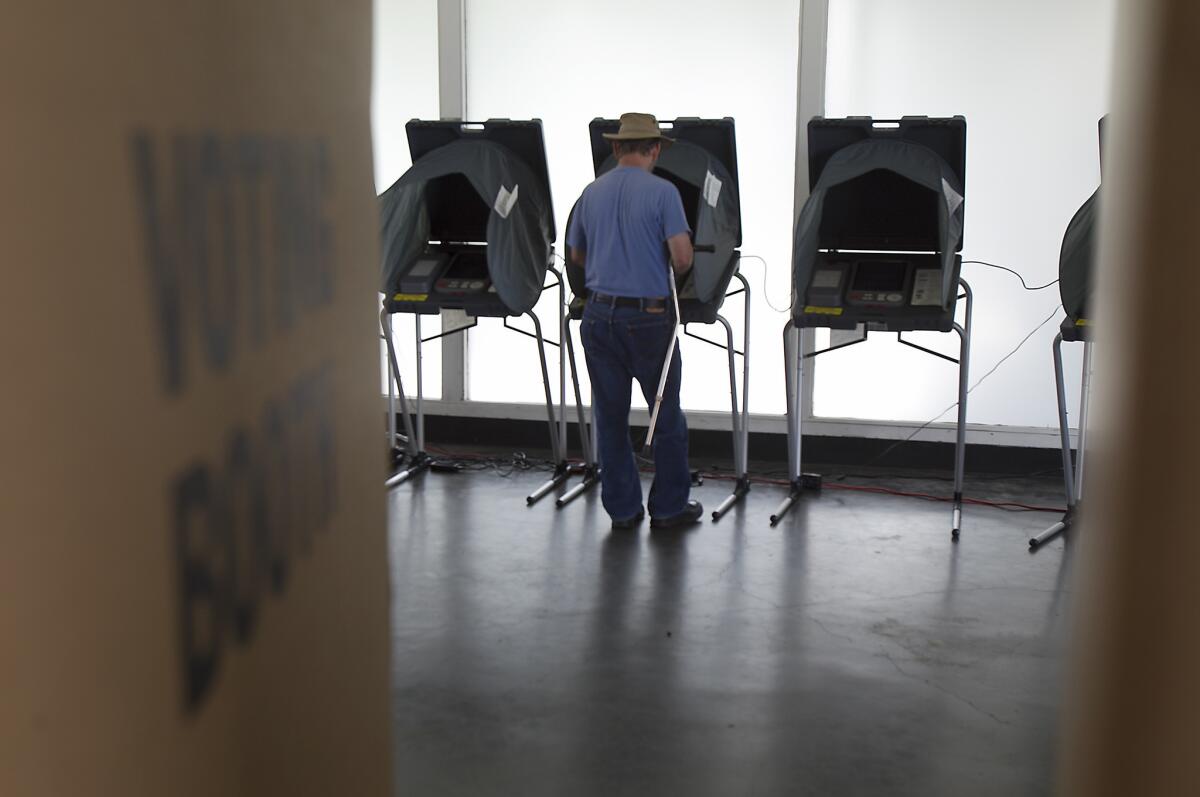
San Bernardino County District Attorney Mike Ramos said Tuesday he has decided not to run for state attorney general in 2018, eliminating a prominent Republican challenge to Democratic Atty. Gen. Xavier Becerra.
Ramos said he will run for reelection as district attorney to finish work he has as the county prosecutor. He said one factor was the large amount of effort it takes to run a statewide campaign, something he learned after spending much of last year supporting Proposition 66, which changes death penalty procedures.
“I am a realist and I have confidence in our attorney general, Xavier Becerra,” Ramos said in an interview. Becerra was appointed this year to the job,
Ramos posted a statement on his campaign website that he realized “the true gatekeepers for public safety” were county district attorneys. He was also elected president of the National District Attorneys Assn.
“While I have the highest respect for the position of Attorney General, I believe that I can better serve the public at the local level, while still continuing to champion legislation and public safety efforts at both the state and national levels,” Ramos said.
State falls short in checking criminal histories of workers in child care and senior facilities, audit finds

Workers in state-licensed care facilities for children and the elderly are not undergoing sufficient screening of criminal histories to protect their vulnerable clients, a state audit concluded Tuesday.
The state Department of Social Services licenses and oversees 70,000 community care facilities, including child care facilities, foster family homes and care facilities for seniors.
“This report concludes that Social Services does not receive all of the information it needs to protect vulnerable clients,” State Auditor Elaine Howle wrote to Gov. Jerry Brown and the Legislature.
The audit found that the state Department of Justice last year stopped providing sentencing information to the Social Services Department concluding that state law does not explicitly require it to share that information. In addition, the Justice Department did not forward information about certain convictions because it believed it was not authorized to share that information, the audit found.
“However, this information is valuable for Social Services in deciding whether to allow an individual with a criminal history to be present in a licensed facility,” the audit found.
While some criminal convictions disqualify applicants from working in care facilities, the law allows Social Services to grant exemptions for other, similar convictions so the applicant can be employed in the facilities.
For example, while some rape convictions are disqualifying, an applicant can be granted an exemption by the state to work in a facility if the charge was rape of a spouse.
Exemptions are also possible in some incidents of pimping and identity theft. Auditors questioned 40 such exemptions granted to people who were arrested for or convicted of those crimes.
“One of these 40 individuals was convicted of identity theft, yet the [state agency] allowed her to be certified as an administrator of a residential care facility for the elderly,” the audit said. “Allowing an individual with this type of history to be present in a facility that cares for the elderly could present a risk to the facility’s clients.”
Auditors recommended that the Legislature expand the list of crimes that make an applicant ineligible for exemptions and require that the Department of Social Services review California and out‑of‑state criminal histories before granting an individual access to a licensed facility.
L.A. Times editorial board endorses Maria Cabildo in congressional race to replace Xavier Becerra
The Los Angeles Times editorial board has made its pick in the crowded congressional race to replace Xavier Becerra. The Times endorsed Maria Cabildo, a longtime affordable housing developer and advocate.
In its endorsement, The Times said Cabildo is “someone who can bridge the gap between the old guard and new idealists” running for the seat, and cited her accomplished career outside of politics.
Cabildo, who has not gained as many high-profile endorsements as some of the other 23 candidates, said in an email to supporters that she is “happy and honored.”
Read the full endorsement here.
California Senate Democrats rip the Obamacare replacement plan, while GOP lawmakers say quit whining
It has become almost a reflex in the California Legislature: When Republicans in Washington act, Democrats in Sacramento make some show of opposition.
On Monday, it was about healthcare, with Senate Democrats taking up a speedily crafted, non-binding resolution assailing the House GOP’s plan to replace the Affordable Care Act.
The measure, which was decidedly pro-Obamacare in its tilt, called on Congress not to repeal the law unless its replacement would provide Americans at least the same level of coverage.
Democrats were armed with just-released numbers from the Congressional Budget Office that found that, under the proposal, 24 million fewer Americans would have insurance by 2026. Of that number, 14 million Americans could lose coverage by next year.
“Let that sink in,” Senate leader Kevin de Léon (D-Los Angeles) said. “By next year, 14 million people will actually lose their healthcare.”
Democrats pulled no punches in assailing the Republican plan. Sen. Scott Wiener (D-San Francisco), noting that President Trump had promised no one would lose coverage, accused Trump and the Republican Congress of peddling “snake oil.”
“A fraud is being perpetrated on the American people right now by this administration,” Wiener said.
But while Democrats were quick to tout how the Affordable Care Act has increased coverage in California, Republicans said the law has hurt residents.
Sen. Jeff Stone (R-Temecula) said his “blue-collar, middle-class” constituents saw their “premiums rise, saw deductibles become catastrophic ... to the point where they can barely afford it.”
Stone also bemoaned how the state Senate had an “obsession with doing everything they can to poke this president in the eye.”
Other Republicans voiced similar weariness with the regular anti-Trump actions from ruling Democrats.
“We have marches, we have rallies, we have protests and now we have resolutions, but we’re still not leading,” said Sen. John Moorlach (R-Costa Mesa), adding that “it just seems like we’re constantly whining.”
Sen. Ed Hernandez (D-West Covina), the author of the resolution, said it was appropriate for lawmakers to weigh in on federal action.
The healthcare debate is the “absolute most important thing we have to be discussing in this state and in this country,” he said.
The resolution passed 25 to 9, with the vote divided along party lines.
Gavin Newsom adds a new plank to his 2018 campaign for California governor — a statewide universal healthcare system
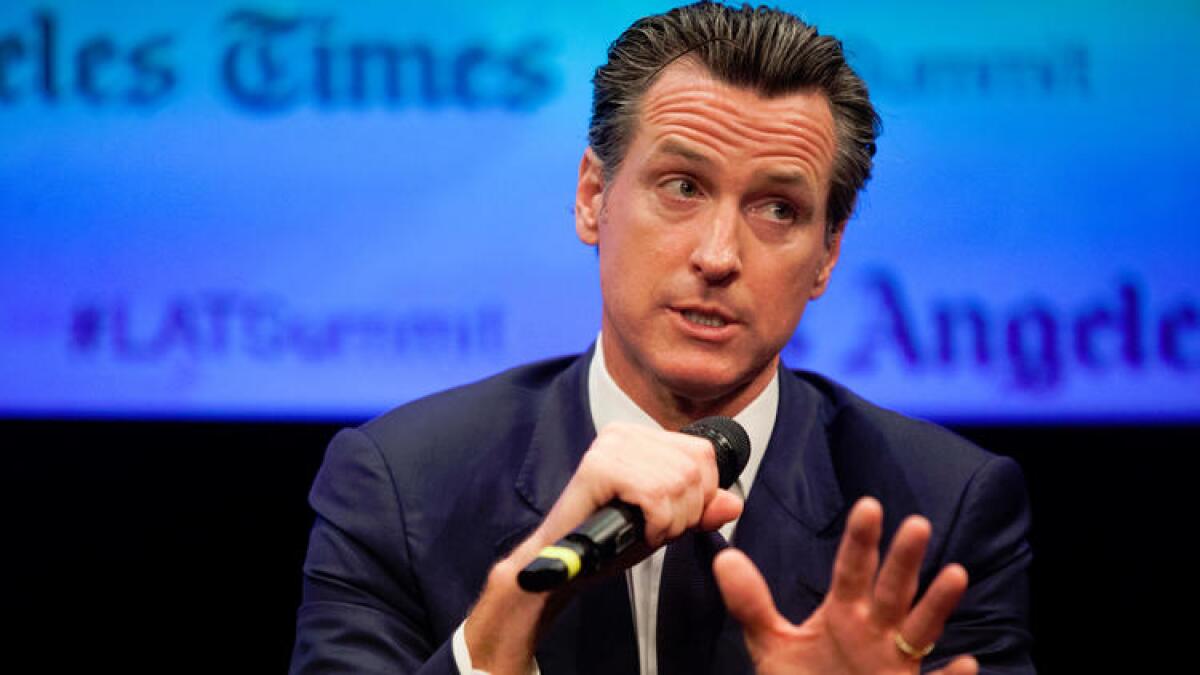
In his 2018 bid for governor of California, Democratic Lt. Gov. Gavin Newsom told the the Sacramento Bee he’ll propose a universal healthcare system for the state, a response to ongoing efforts by President Trump and the Republican-led Congress to replace the Affordable Care Act.
With the proposal, which is modeled on a city program he supported while mayor of San Francisco, Newsom is trying to stake a claim to an issue that may become pivotal in the contested race, especially among his biggest Democratic rivals.
Newsom told the Bee he’s consulting with healthcare leaders to craft a statewide system.
Healthy San Francisco, the first-in-the-nation, city-run universal healthcare effort he conceived, is funded in part by an employer mandate and covers uninsured adults living in San Francisco. Launched in 2007, the plan enrolls all residents without health insurance, regardless of their income, immigration status or existing medical conditions.
The California Legislature already has started exploring the idea of a adopting a state-run “single-payer” system that would operate similar to Medicare.
State Sen. Ricardo Lara (D-Bell Gardens) introduced a bill in late February that would make California the first state to adopt a single-payer system. In a single-payer system, residents would pay into a state agency that essentially functions as an insurance company. The agency would pay doctors and hospitals when people sought treatment.
Bills establishing single-payer healthcare systems made it through the Legislature in 2006 and 2008 only to be vetoed by then-Gov. Arnold Schwarzenegger.
Gov. Jerry Brown on GOP plan to replace Obamacare: A ‘harebrained scheme’
Tensions flare as state Senate committee takes up ‘sanctuary state’ bill
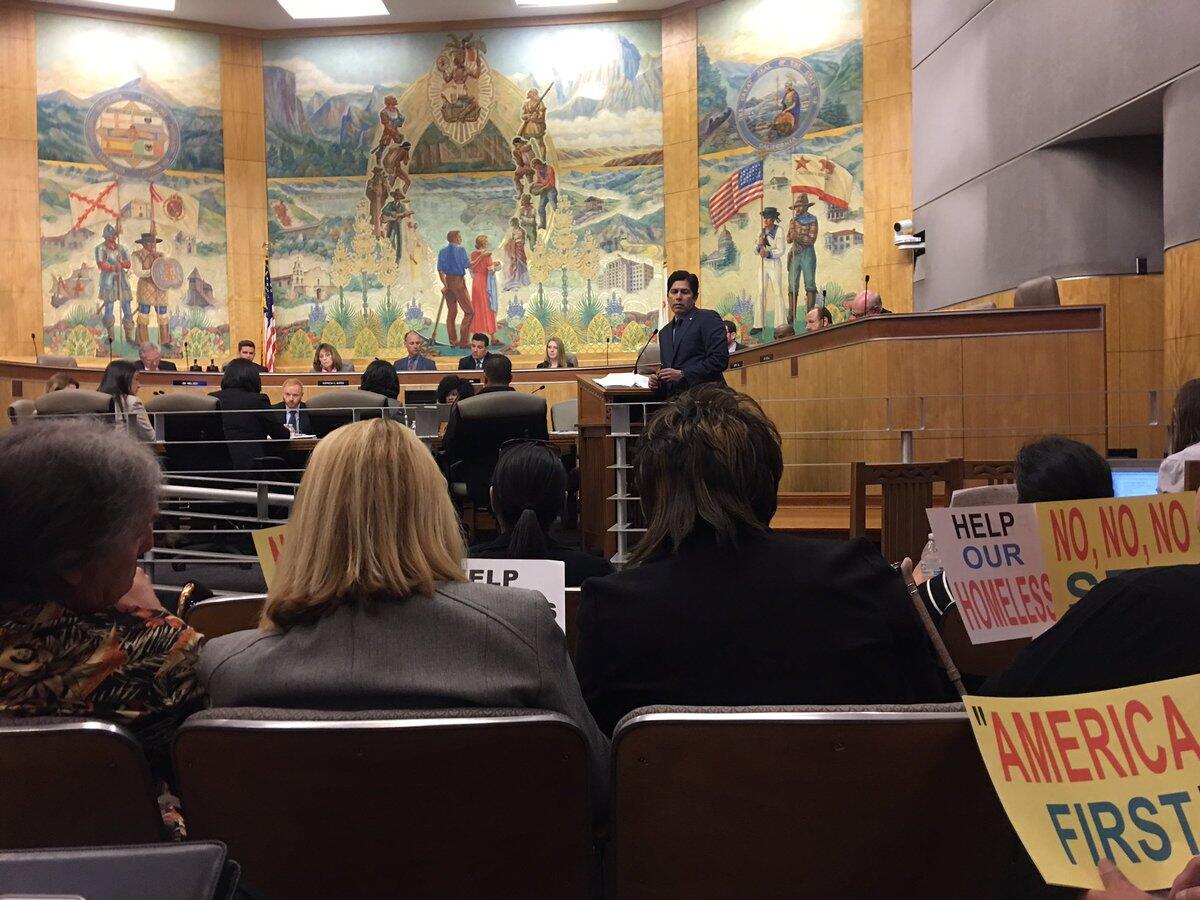
Following emotional testimony and verbal clashes among members in the audience, the state Senate Appropriations Committee on Monday approved a bill that would prevent state and local law enforcement agencies from using resources to enforce federal immigration laws.
Senate Bill 54, introduced by Senate President Pro Tem Kevin de León (D-Los Angeles), moved out of the committee with a 5-2 vote. It will now be debated on the Senate floor.
Law enforcement officials are torn on whether the bill hinders or furthers public safety. But the legislation has attracted a long list of supporters who say the state must ensure tax dollars are not used to further mass deportations under the Trump administration.
The purpose of the hearing on Monday was to discuss the bill’s fiscal impact, which is still largely unclear as its provisions could lead to cuts in federal funding for county jails and state prisons that house immigrant detainees. Tensions rose in the packed auditorium as testimony instead centered on the personal experiences of witnesses.
Sen. Ricardo Lara (D-Bell Gardens), chairman of the committee, asked the audience for silence several times as the room erupted into claps, cheers and booing. At one point, he asked an opposing witness to apologize for using profanity against a senator.
A handful of opponents held yellow signs that read, “No on SB 54,” and “America First.” They whispered and groaned quietly to hushes from supporters as Pedro Figueroa, a San Francisco resident and victim of car theft who was almost deported, described how authorities shackled him.
Lupe Osoria Moreno, a crime survivor and witness who later refused to apologize for cursing, cried and shouted at lawmakers, saying the bill was protecting criminals.
“We are going to plaster our children’s photos all over the state, and we are going to let them know that elected officials have allowed this slaughter to happen,” she said.
Chanell Temple, representing We the People Rising, which is described by organizers as a grassroots activism organization against political corruption, called the bill “a foreign invasion on the black community.”
“The law gets changed for them,” she said of immigrants living in the country illegally. “They get sanctuary. It is unfair, and it is unconstitutional.”
California lawmakers, including Feinstein, make very unlikely attempts to repeal Trump’s travel ban
Sen. Dianne Feinstein (D-Calif.) and Rep. Zoe Lofgren (D-San Jose) are making improbable attempts to overturn President Trump’s most recent travel ban.
The measures are unlikely to get far in the Republican-led Congress, and even less likely to be approved by Trump if they get to his desk. But they are likely to fire up a base that is demanding Democrats in California and elsewhere do everything they can to counter Trump.
Feinstein filed a bill to rescind the executive order Monday — it is backed by 37 fellow Democratic senators. Sen. Kamala Harris (D-Calif.) supports the measure, her staff said. Lofgren’s bill, filed late last week, would halt the order and cut off any funds to implement it. It’s backed by 172 House Democrats, including 32 of her 39 California House Democratic colleagues.
Trump’s narrower temporary ban on travel to the United States by citizens from six majority-Muslim countries goes into effect this week. A broader executive order by Trump had previously been put on hold by the courts. On Monday, California joined six states challenging the new order in court.
“This revised order is no less a violation of the bedrock American principle of freedom of belief than the original,” Lofgren said in a statement.
Congress has the authority to revoke all or part of some executive orders by either directly repealing the order, or cutting off funding to implement it.
Only about 4% of executive orders since 1936 have been modified by Congress, according to a 2006 report by Clemson University assistant political science professor Adam L. Warber.
1:55 p.m. This post was updated to include Sen. Kamala Harris (D-Calif.) The article was originally published at 12:23 p.m.
Darrell Issa is ‘not prepared’ to support GOP healthcare plan yet
Rep. Darrell Issa (R-Vista) said Monday he is “not prepared” to vote for Republican’s health care bill.
“I’m not prepared to vote for it [as it] is right now,” the long-serving Republican congressman said Monday on “Fox and Friends.”
Issa said there aren’t specific aspects of the bill he disagrees with, but that he believes the current Republican plan could be better. He has proposed his own healthcare replacement bill, which would allow all Americans to purchase the insurance plans offered to federal workers.
Millions of Californians would lose health insurance if the GOP bill is approved, experts have estimated, largely because one in three residents is covered by Medi-Cal, the state’s Medicaid program that expanded under the Affordable Care Act, also known as Obamacare. The GOP bill would start phasing out federal funding for that expansion in 2020, leaving states to foot the bill or drop poor people from Medicaid rolls.
Issa told the Fox hosts he is waiting to see Congressional Budget Office estimates about the costs and effects of the GOP plan, a number that should be available in the next day or two.
Issa scraped together a win in November over a novice candidate by fewer than 2,000 votes, as his Orange County district picked Hillary Clinton for president. Democrats have announced they will target his seat in 2018.
Several California Republicans who represent districts that went for Clinton has said they’re either still making up their minds, or have been mum on the healthcare bill in general.
Issa held two town halls Saturday, one alone and a second with Rep. Duncan Hunter (R-Alpine), both of which turned raucous at times with hundreds of residents voicing their concerns about potential changes to Obamacare.
“This is part of American democracy,” Issa told the hosts. “I don’t think anyone should be surprised.”
Tackling living costs in addition to tuition, Assembly Democrats announce plan to make college ‘debt-free’
Assembly Democrats introduced a sweeping college affordability plan Monday that aims to make Cal State and UC educations debt-free for nearly 400,000 students.
The proposal would be the first in the nation to cover living expenses such as books, transportation and housing, in addition to tuition costs.
“With our ‘Degrees Not Debt’ proposal, California is taking the boldest step in the nation toward making college-debt free,” Assembly Speaker Anthony Rendon (D-Paramount) said at a Capitol press conference.
The proposal would also make the first year of community college tuition-free for students attending full-time.
Fully implemented, the plan is estimated to cost around $1.6 billion. Assembly Democrats have proposed phasing in the increased aid over five years, with an initial cost of $320 million and an additional $100 million for the community college provisions.
California joins lawsuit challenging Trump’s latest travel ban
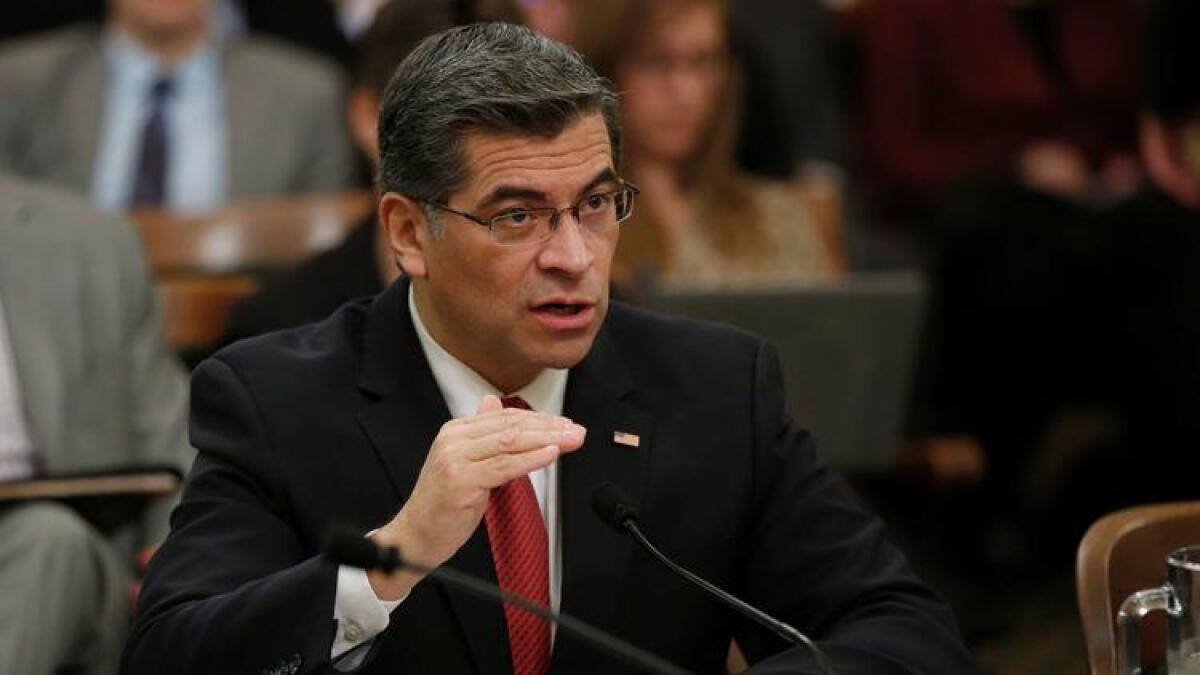
California on Monday joined Washington and other states as a plaintiff in a lawsuit challenging the Trump administration’s latest travel ban as an unconstitutional overreach, state Atty. Gen. Xavier Becerra said.
The lawsuit that California joined Monday says the narrower, temporary ban on travel from six majority-Muslim countries represents unconstitutional religious discrimination. A broader executive order by President Trump had previously been put on hold by the courts.
“Last month, our courts put a lid on the unconstitutional and un-American Trump Muslim travel ban because Americans stood up and demanded it,” Becerra said in a statement. “The victory for lawful permanent residents and current visa holders was welcome news for everyone, especially the victims’ families. But the fight for fair and lawful treatment of all who would seek permission to enter our country is not over.”
California is joining Washington, Maryland, New York, Oregon, Massachusetts and Minnesota in challenging the new travel order. Becerra said the changes made by the administration, which include allowing visa holders to come into the country, do not go far enough.
“The Trump Administration may have changed the text of the now-discredited Muslim travel ban, but they didn’t change its unconstitutional intent and effect,” Becerra said. “It is still an attack on people — women and children, professors and business colleagues, seniors and civic leaders — based on their religion and national origin.”
The state’s legal brief makes a case that California is harmed by the new travel ban. California is home to more than 10 million immigrants, welcomed almost 8,000 refugees last year, and hosts the greatest number of international students— almost 150,000 — of any state, the legal filing says.
The University of Southern California has 150-200 graduate students and post-doctoral scholars from the six affected countries each year.
The president’s executive order “substantially interferes with the continued matriculation of these students to California’s universities and colleges,” the lawsuit alleges.
The brief quotes UC President Janet Napolitano as saying the latest executive order’s restrictions on travel are an “anathema to advancing knowledge and international cooperation” and infringe on “the free flow of students, faculty, scholars and researchers that are at the core of the universit[ies’] education, research and public service missions.”
The state also alleges it will be harmed financially, noting the $681 million spent by visitors to California from the Middle East in 2015 generated sales tax of $40.8 million for the state.
“The Second Executive Order will harm California by reducing investment and industry in California and decreasing travel by students, scholars, and tourists,” the legal filing says.
9:45 a.m.: This post was updated to include details from the legal filing and to reflect that the legal brief has been filed.
This post was originally published at 5 a.m.
Schwarzenegger says he’s not running for U.S. Senate
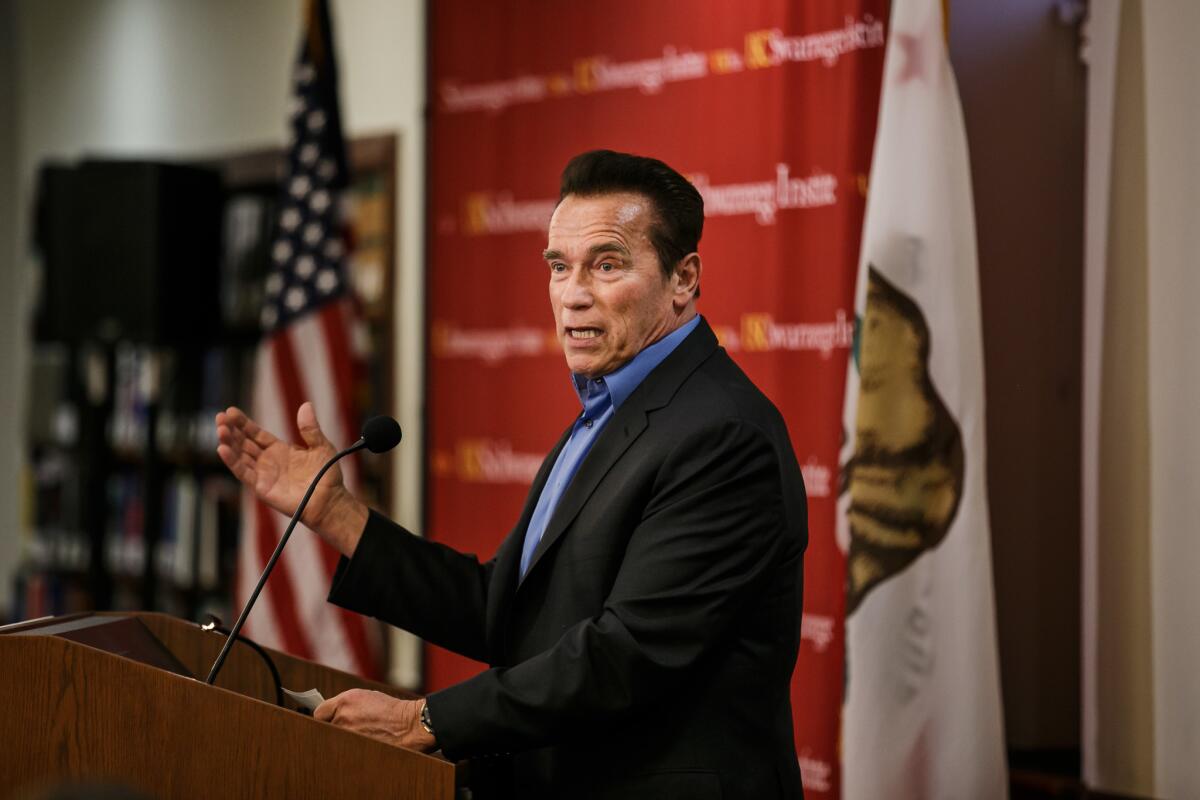
Former Gov. Arnold Schwarzenegger won’t be back.
He said Sunday that he is not interested in running for the U.S. Senate, after rumors bubbled last week that he was considering a campaign for the seat held by Dianne Feinstein.
“I’m deeply flattered by all of the people who have approached me about running for Senate, but my mission right now is to bring sanity to Washington through redistricting reform like we passed here in California,” Schwarzenegger wrote on his Facebook page early Sunday morning.
Redistricting reform – or changing how districts are drawn for members of Congress and state legislatures to avoid gerrymandering – is a normally dry subject that Schwarzenegger has been trying to draw increased attention to in recent weeks. He has also been sparring with President Trump.
“Gerrymandering has completely broken our political system and I believe my best platform to help repair it is from the outside, by campaigning for independent redistricting commissions,” Schwarzenegger wrote. “Thank you for your kind messages and all of the support and I hope you’ll join me in my battle against gerrymandering with the same enthusiasm.”
The rumors about a potential Senate run went into overdrive last week after a report in Politico cited anonymous GOP insiders who said Schwarzenegger was mulling a run, potentially as an independent.
The healthcare debate comes to California in this week’s politics podcast
The stakes are high for California in the effort by congressional Republicans to replace existing healthcare rules. But few prominent California leaders are speaking out, for now.
On this week’s episode of the California Politics Podcast, we take an early look at the policy and political choices facing state lawmakers with repeal of the Affordable Care Act now coming into focus in Washington.
We also discuss the legal legacy Gov. Jerry Brown could leave on the California Supreme Court, as its most senior justice announces her retirement.
Meanwhile, there are no indications that another prominent Californian, Sen. Dianne Feinstein, will not retire in 2018. But there’s been plenty of political buzz about who could step up if she does.
I’m joined by Times staff writer Melanie Mason and Marisa Lagos of KQED News.
David Hadley, former Republican assemblyman from Manhattan Beach, files to run for California governor in 2018
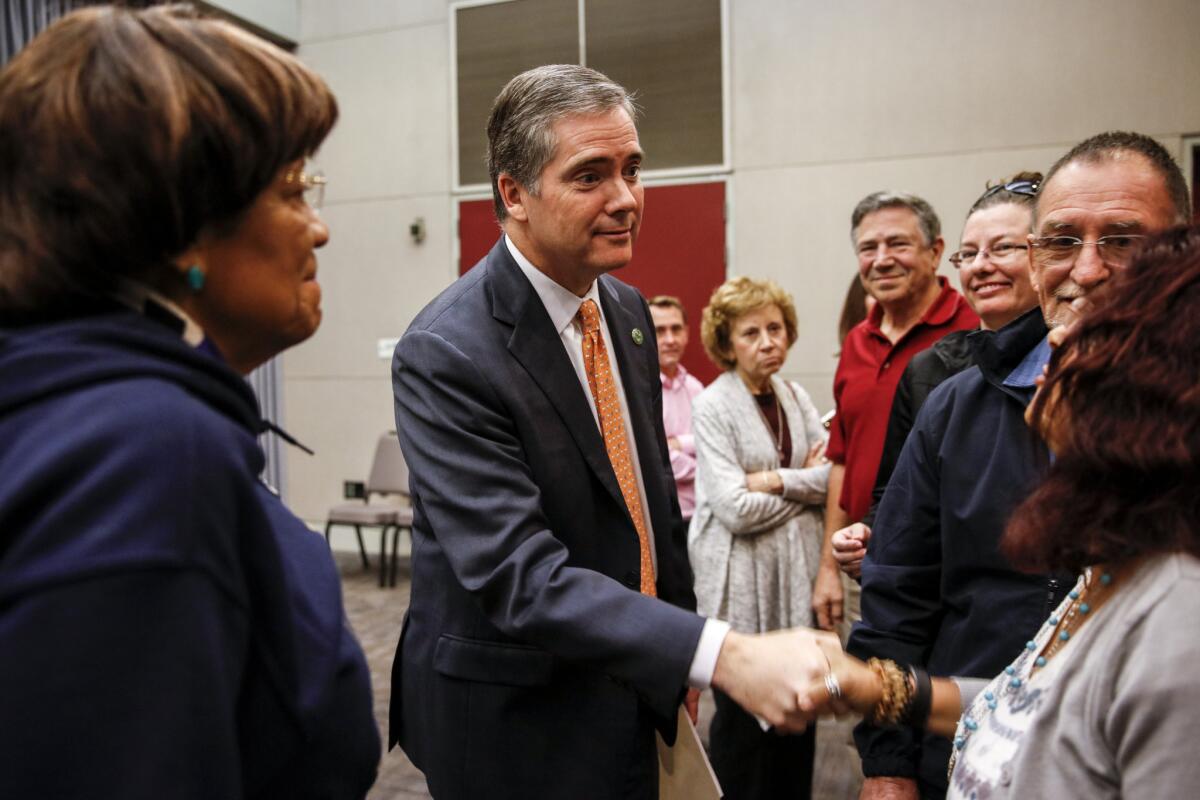
Republican David Hadley, a former assemblyman from Manhattan Beach, says he is exploring a run for governor in 2018.
Hadley, who served one term in Assembly District 66 before being defeated by Democrat Al Muratsuchi last year, filed papers Friday to open a gubernatorial campaign committee.
“On a whole series of issues, I think California public policy is lacking a lot of balance and a lot of common sense,” Hadley said in an interview with the Times. “We have allowed the distractions of political polarization and fake culture war battles to keep us from focusing on the things that we should be focusing on, which is a better future for all Californians.”
Hadley said if he proceeds with a run, his attention will be on Californians who “are struggling the most,” particularly with poverty, high housing costs and the cost of energy.
He said he plans to make a final decision about whether he’s running in the “next couple of months.”
Hadley emphasized his bipartisan appeal as an asset for his possible gubernatorial run. In 2014, he was elected to a district where Democrats had an eight-percentage-point voter registration advantage, and during his tenure was the Republican legislator representing a district entirely within Los Angeles County.
“I’m confident that if I chose to fully pursue and declare my candidacy and run, that I would have a lot of support both inside and outside the Republican Party,” Hadley said. “I think I have a good track record of engaging with voters and residents from all over the political spectrum.”
Hadley is the only potential GOP candidate for governor that has prior experience as an elected official. Former NFL player Rosey Grier and attorney John Cox have also said they’re running, while San Diego Mayor Kevin Faulconer and former Fresno mayor Ashley Swearengin have said they will not.
House Minority Leader Nancy Pelosi says she would have retired by now if Clinton won
California is sick of being a presidential campaign afterthought. Here’s one lawmaker’s fix
Poor California.
So big. So beautiful. So frustrated.
Every four years, as smaller, less cutting-edge states are lavished with love and attention from presidential candidates, California is all but ignored, like one of those kids, nose to the glass, smudging up a candy store window.
Sure, White House hopefuls parachute into the state on a not-infrequent basis. They breeze through Pacific Heights or Bel-Air, gathering checks they quickly spirit off to spend elsewhere. Sometimes they’ll throw in a photo opportunity or chat up a local reporter on the ride between the airport and a fundraising stop.
Yes, damage from the drought/recent flooding/mudslide/earthquake is a terrible thing. And, gee whiz, look at what they’re up to these days in Silicon Valley!
Then it’s “so long” until time for the next cash infusion, which has started some folks in Sacramento to grousing.
Again.
Many of California’s Republican representatives take cautious tone on GOP healthcare bill
Since President Trump took office promising to repeal Obamacare, a flood of Californians have crowded Republican and Democratic lawmakers’ town halls and held protests outside congreesional members’ offices to press them on the future of the Affordable Care Act.
Many of California’s congressional Republicans represent districts with a large number of people who have insurance under Obamacare, and they’re taking a cautious approach to the House Republican plan to replace the healthcare law, saying simply they are still considering it.
California Republican leader under consideration for key Department of Justice post

Harmeet Dhillon, a California GOP leader, is under consideration to run the civil rights branch of the U.S. Department of Justice.
The post will be heavily scrutinized given the Trump administration’s positions on issues such as voting rights, and because of past controversial statements about race made by the department’s leader, U.S. Atty. Gen. Jeff Sessions. A series of hate crimes have also taken place in the weeks since Trump’s election.
Dhillon declined comment, but a source said she was interviewed for the job last week in Washington, D.C.
A San Francisco attorney who is California’s Republican National Committeewoman, Dhillon has been the public face of the state GOP in recent years. The largest stage was at the Republican National Convention last summer, when the Indian-born American citizen delivered an invocation by singing a Sikh prayer in Punjabi.
The media savvy 48-year-old has been in the public eye since she was in college. As the editor of the conservative Dartmouth Review, she received national media attention when she defended the weekly publication after it published a satirical column likening the college president, who was Jewish, to Adolf Hitler, and the effects of his campus policies to the Holocaust.
Dhillon has never held public office, but has been active in Bay Area politics for more than a decade, leading her to run successfully for vice chair of the state GOP in 2013.
Party leadership backed her in face of attacks by a minority of fellow Republicans who labeled her a “Taj Mahal princess,” circulated rumors that she was a sympathizer with Muslim terrorists and predicted that she would slaughter a goat at the convention’s lectern.
Only one of the attacks against her was based on ideology – Dhillon served for two years on the board of the Bay Area chapter of the American Civil Liberties Union, a group that is often vilified by the right.
Dhillon previously said she got involved with the ACLU in the aftermath of the Sept. 11 terrorist attacks, when fellow Sikhs were under attack. Her activism on behalf of Sikhs was also personal – in 1995, her then-husband, a Sikh doctor, was shot in New York City by a man who mistook him for a Hindu. He survived.
This chapter of her life is notable given the current climate – there have been attacks against Indian men in three states in recent days. Two died.
Dhillon has been a vocal supporter of Trump, leading the pledge of allegiance at a San Jose rally last year and representing California Republicans who were beaten outside of it in a lawsuit against the city, its mayor and police chief.
Asked if Arnold Schwarzenegger might make a run for Senate, the former governor’s spokesman doesn’t say no
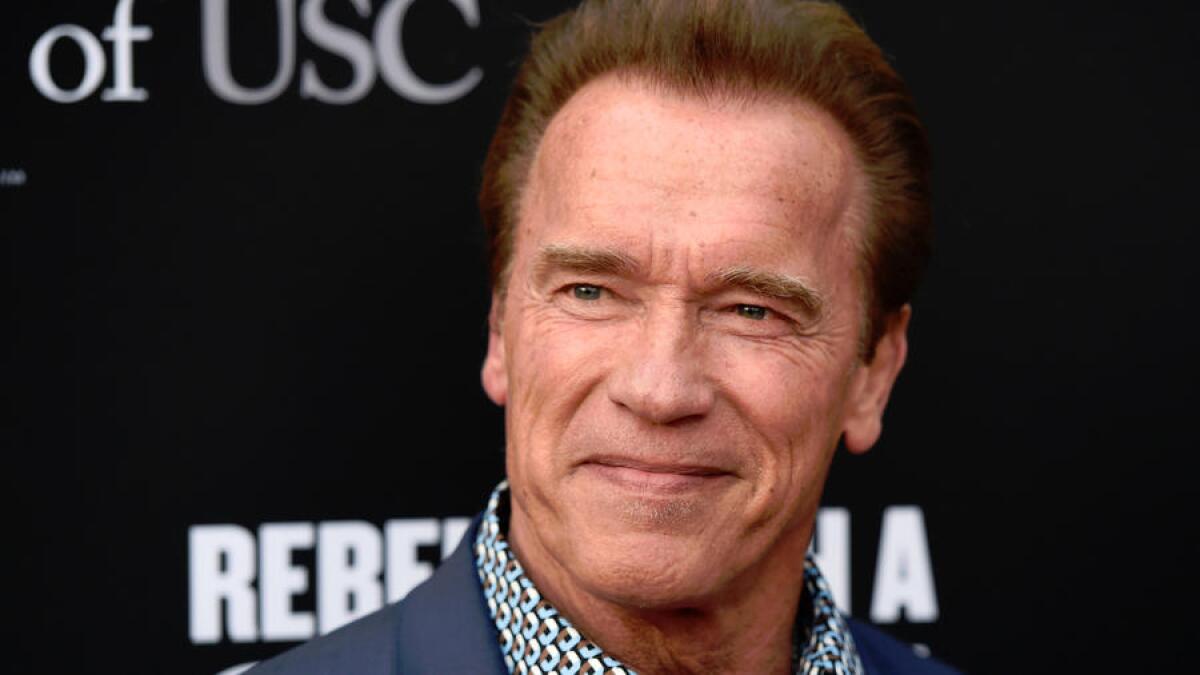
Former California Republican Gov. Arnold Schwarzenegger may not have ruled out trying to get back into government, stoking speculation about whether he could challenge Democrat Sen. Dianne Feinstein in 2018.
The scenario seems unlikely given that Schwarzenegger is a former Republican governor in an increasingly Democratic state. He would also carry with him the weight of personal scandal and his rocky final term as governor.
His spokesman, Daniel Ketchell, said Schwarzenegger is focused on championing redistricting reform across the nation, just as he did in California. But, as first reported by Politico, he is “keeping all his options open.”
Politico cited “GOP political insiders” who said the former governor was mulling a comeback, but a source close to Schwarzenegger told The Times it’s not true.
When asked if Schwarzenegger was considering a run for Senate, Ketchell didn’t say yes and he didn’t say no.
“What he cares about right now is how we can pass redistricting reform in other states,” Ketchell said Thursday afternoon. “That’s his main focus now.”
“We are keeping all of our options open as far as how we can accomplish that,” he added in an interview with Politico.
Schwarzenegger has become one of President Trump’s greatest celebrity foils in recent months, primarily in the form of sporadic spats between the two on Twitter. On Saturday, Trump took another shot at Schwarzenegger after he left “The New Celebrity Apprentice,” the NBC reality show on which Trump once starred.
The two have been publicly at odds for a while. In October, Schwarzenegger announced that he would not vote for Trump in the presidential election.
UPDATES
6:29 p.m.: Updated with an additional source.
This post was originally published at 5:14 p.m.
Times staff writer Seema Mehta contributed to this report.
L.A. congressional candidate Alejandra Campoverdi makes healthcare debate personal in first TV ad
Congressional hopeful Alejandra Campoverdi, who’s running to replace Xavier Becerra in Los Angeles, opened up to the Washington Post recently about her family’s history with breast cancer.
That history is also the subject of her first TV ad of the campaign, which focuses on healthcare and Campoverdi’s work in the Obama administration, where she says she helped pass Obamacare.
The 30-second ad features her mother, a breast cancer survivor, and a photo of her grandmother, who succumbed to the disease.
“This debate isn’t about politics, it’s personal for millions of Americans,” Campoverdi says in the ad, which is scheduled to air on cable networks starting Friday. “If Donald Trump wants to have a conversation about women’s bodies, let’s start with mine.”
Campoverdi, a former Obama White House employee who also previously worked for the Los Angeles Times, revealed in the Post interview that she has been diagnosed with the BRCA2 gene, which significantly heightens her risk of developing breast cancer. She said she plans to have a preventative double mastectomy at a later date.
She is one of 23 candidates running to fill a seat vacated by Xavier Becerra in the April 4 special election. The top two vote-getters are expected to advance to a runoff election in June.
New appointments bring changes to California’s political watchdog agency
The agency that oversees enforcement of California’s campaign finance and ethics laws is being remade by new appointments, including the selection Thursday of a former lobbyist for the state’s influential firefighters union.
Secretary of State Alex Padilla selected Brian Hatch, a longtime leader of the California Professional Firefighters, to fill a vacancy on the Fair Political Practices Commission. The appointment comes a week after state Controller Betty Yee named ethics and elections attorney Allison Hayward to the panel.
A third appointment to the five-member panel is expected soon by Atty. Gen. Xavier Becerra, and may be a replacement for Commissioner Eric Casher, who was appointed by the former attorney general, now senator, Kamala Harris..
The commission enforces state laws involving campaign finances, conflicts of interest, lobbying and government ethics.
Hatch replaces Commissioner Patricia Wynn. Before his retirement, Hatch represented firefighters for nearly 40 years, most recently in 2009 as the group’s state Capitol lobbyist. A former firefighter with the Ontario Fire Department, Hatch also served as president of Ontario Firefighters Local 1430.
“I am confident that Mr. Hatch’s extensive experience with California government will serve him well as a member of the FPPC,” Padilla said in a statement.
Former Los Angeles Mayor Richard Riordan backs Yolie Flores in L.A. congressional race
Rep. Eric Swalwell wants an independent probe into the Trump administration’s ties to Russia — and he has charts
Northern California Rep. Eric Swalwell really wants an independent investigation into President Donald Trump and his administration’s ties to Russia.
And he has some handy charts and graphics to prove his case.
Swalwell, a Democrat from Dublin, launched a new page on his official congressional website — which he titled “Protecting our Democracy” — detailing the alleged web of connections between Trump administration officials, and Russian President Vladimir Putin and Russian interests.
Swalwell is a member of the House Permanent Select Committee on Intelligence, which is investigating Russia’s alleged election meddling.
“President Trump has also surrounded himself with people who do business with and are sympathetic to Russia,” his site declares in boldface type.
U.S. intelligence agencies concluded last year that Putin had authorized an operation to try to damage Hillary Clinton’s campaign and tilt the 2016 election in Trump’s favor.
Trump has rejected calls for an independent investigation of his ties to Russia.
‘It’s time to tax liquor before ladies:’ Lawmakers trying again to end sales tax on diapers and tampons in California
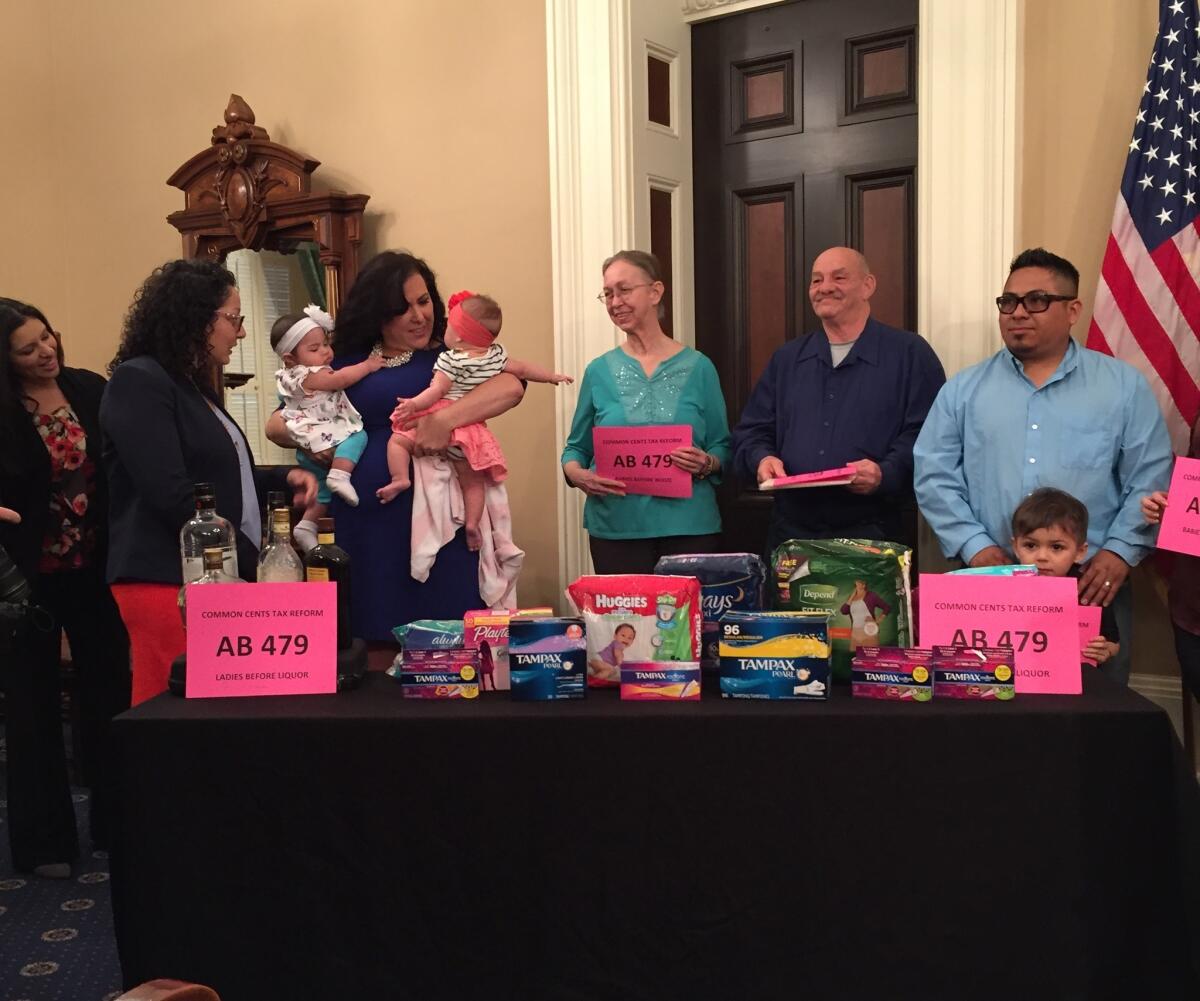
Lawmakers in Sacramento are trying again to save California consumers from sales taxes on diapers and tampons.
To pay for the tax break, Assemblywomen Cristina Garcia (D-Bell Gardens) and Lorena Gonzalez Fletcher (D-San Diego) want to increase taxes on hard alcohol.
“It’s time to tax liquor before ladies,” Garcia said Wednesday at a news conference where both lawmakers spoke while holding babies.
The bill, AB 479, is the second attempt by Garcia and Gonzalez Fletcher to repeal sales taxes on diapers and tampons. Both measures passed the Legislature unanimously last year, but Gov. Jerry Brown vetoed them, citing the cost to state and local budgets.
To assuage the governor’s concerns, Garcia and Gonzalez Fletcher are including a tax hike to make up for the estimated $72 million lost in sales tax revenue. The proposed tax hike would be $1.20 per gallon of hard liquor lower than 100 proof. The lawmakers estimated that would equate to 2 cents per cocktail should distributors pass along the cost to consumers. Beer and wine sales would be unaffected by the measure.
Because the bill includes a tax increase, it will require a two-thirds supermajority vote in the Legislature to pass. Democrats have that margin in both the Assembly and the Senate, but Garcia and Gonzalez Fletcher said they hoped to attract Republican support as well.
“I challenge anyone, Democrat or Republican, who wants to say it’s not worth 2 cents per hard alcoholic drink to pay for these very basic necessities,” said Gonzalez Fletcher.
Most California insurance plans could be ineligible for tax credits under the GOP’s new healthcare proposal
An antiabortion provision in the recently unveiled House GOP plan to replace Obamacare could make it impossible for most Californians to take advantage of proposed tax credits meant to help offset the cost of health insurance.
The Republican healthcare proposal would offer individual tax credits to people who do not get insurance from their employer, but it would prohibit that money from being spent on plans that cover abortion — a ban that would make virtually all health plans in the state ineligible for such credits.
The restriction, should it become law, sets the stage for yet another clash between liberal California and the GOP-dominated federal government.
“On the face of it, it’s a direct challenge to how [health insurers] operate in California,” said Amy Chen, an attorney with the National Health Law Program, which backs abortion access. “In practice, I think there would almost certainly be legal challenges to the federal provision and its implementation in California.”
Sen. Tim Kaine to raise money for Democrats in Beverly Hills
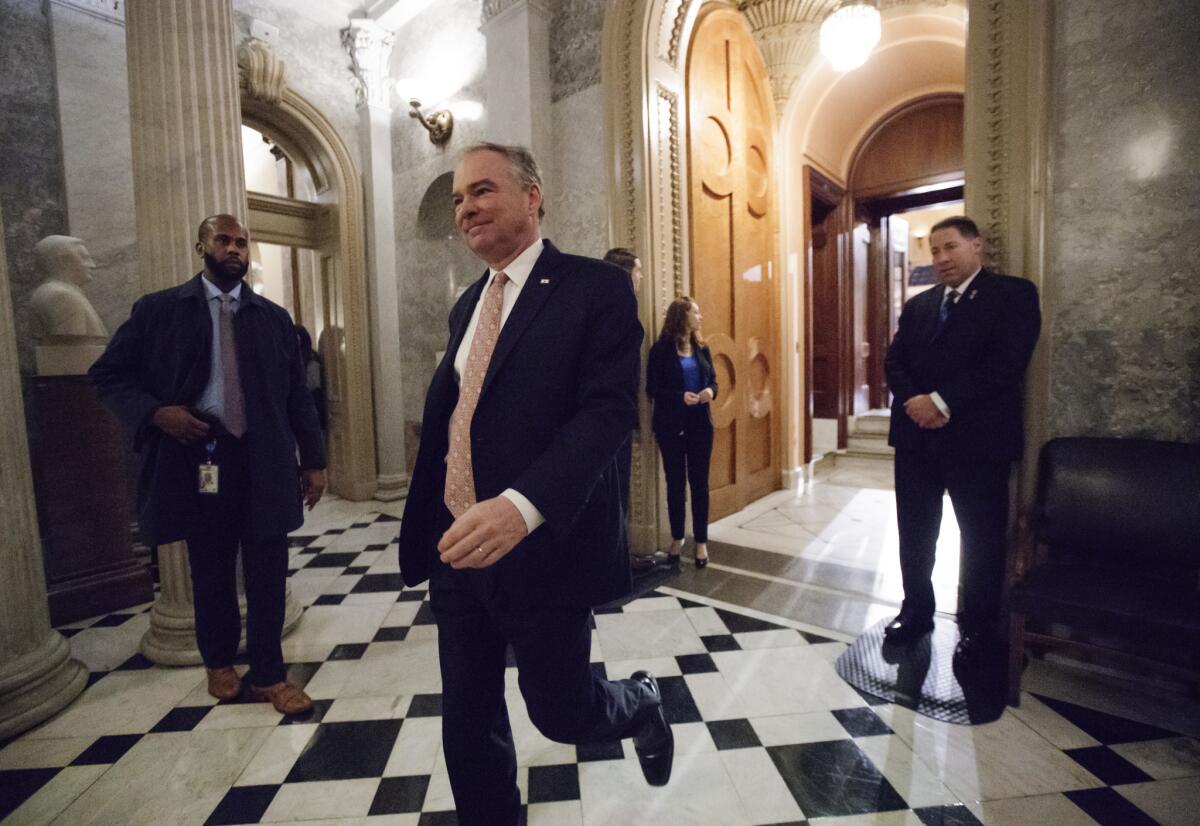
Sen. Tim Kaine is headed to Beverly Hills next week to raise money for his reelection campaign and for fellow Democrats.
Supporters of the Virginia senator, who served as Hillary Clinton’s running mate in the 2016 presidential campaign, are being asked to contribute up to $5,400 to attend the March 18 fundraiser, according to an invitation obtained by The Times. The luncheon, at a Beverly Hills mansion, is hosted by “Modern Family” star Jesse Tyler Ferguson and his husband, actor Justin Mikita, financial advisor Sara Qazi and attorney Rachel Rosoff.
The funds will benefit the Kaine Victory Fund, a joint fundraising committee comprising Kaine’s reelection campaign, the Common Ground Political Action Committee, the Democratic Party of Virginia and the Democratic Senatorial Campaign Committee.
State Supreme Court Justice Kathryn Werdegar will retire, giving Gov. Jerry Brown a decisive pick on the powerful panel

The longest-serving member of the California Supreme Court, Justice Kathryn Werdegar, said on Wednesday that she will retire this summer, giving Gov. Jerry Brown the chance to select his fourth member of the panel in six years.
Werdegar, who turns 81 next month, was appointed by Gov. Pete Wilson in 1994. The official announcement from court officials said that she will step down on Aug. 31.
“It has been a great privilege and honor to serve the people of California as an associate justice of the California Supreme Court for 23 years,” Werdergar said in a written statement. “But it is time for someone else to have that privilege and opportunity.”
Viewed as a centrist jurist by many observers, Werdegar was a decisive voice in a 1996 case that ruled landlords can’t refuse to rent to unmarried couples. She also voted with the majority in 2008 to outlaw existing bans on same-sex marriages — a case that sparked the initiative banning such marriages, Proposition 8.
Her retirement means that Brown now gets to select a justice who could be the potentially decisive vote on the seven-member panel.
“You might be reaching a critical mass,” said Vikram Amar, dean of the University of Illinois College of Law who was previously a longtime California legal scholar.
Brown is no stranger to casting a long shadow on the state’s highest court, having appointed five members by the time he left the governor’s office in 1983. Three of those justices, including former Chief Justice Rose Bird, were removed by voters in 1986.
The newest round of selections, though, have been viewed as serious legal scholars and reflect Brown’s changed style upon returning to Sacramento in 2011.
“It’s pretty clear that he views the court as one of the big institutions that he’s making a mark on as part of his legacy,” Amar said.
The governor’s office did not immediately respond to a request for comment on Werdegar’s decision to retire. His eventual pick for the position must be confirmed by the state Commission on Judicial Appointments.
Amar said that Brown’s recent three selections — Justices Goodwin Liu, Mariano-Florentino Cuéllar and Leondra Krueger — were all young jurists of color and noted for their strong academic credentials. Werdegar’s replacement, he said, will be especially interesting in that Brown might be ready to choose someone with more “rough and tumble” experience as a prosecutor or even in politics.
The selection also comes at a time of heightened attention on the power of state government versus federal government, with California lawmakers seeking to challenge the actions of President Trump and the U.S. Supreme Court.
“He appreciates that with the opposing party currently in control, it really does fall to the state level to provide some kind of counter-vision as to what government ought to be doing,” Amar said.
When Werdegar retires, Justice Ming Chin, 74, will become the longest-serving member of the California Supreme Court.
Assemblyman wants to tax firms that contract with state prisons and use the funds for incarceration-prevention programs
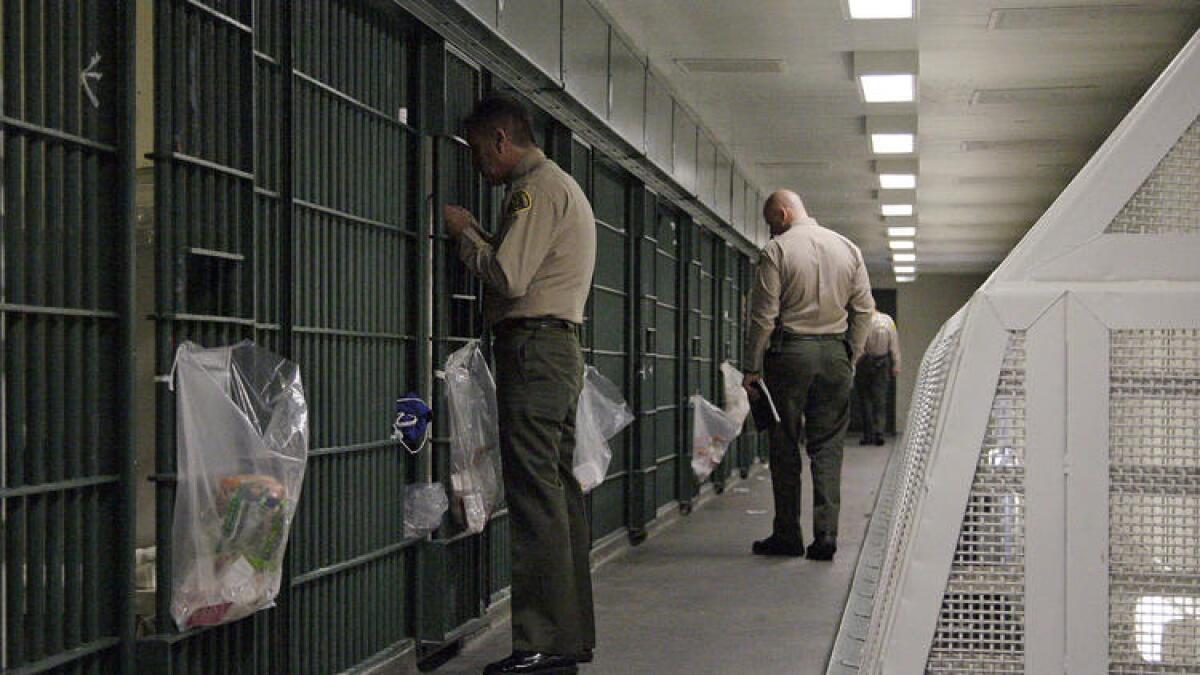
In an attempt to increase the revenue stream for early education programs, a state assemblyman wants to impose a tax on companies that contract with prisons in California to provide goods and services.
The bill authored by Assemblyman Tony Thurmond (D-Richmond) would require companies to pay 10% of the value of the contract for any agreements signed on or after Jan. 1, 2018.
The funds would be deposited into what would be called the State Incarceration Prevention Fund, established under the State Treasury, and would go to programs that focus on keeping people out of prison through early intervention and education services.
Through the tax, Thurmond says, California could tap into the estimated $4.5 billion that the state corrections department currently spends on contracts with private companies.
The legislation also would require companies to certify under penalty of perjury that the cost is not passed on to the state. It would subject them to state audits and order civil fines for those found to have violated the law.
“Children who start kindergarten behind, are more likely to stay behind — a trend that feeds into the school-to-prison pipeline,” Moira Kenney, executive director of the First 5 Assn. of California, said in a statement. “Early interventions like quality child care and preschool can break this cycle and put children on a path that leads to success in school and in life.”
California members of Congress join women’s protest outside U.S. Capitol
About a dozen California House members joined colleagues on the Capitol steps Wednesday to address more than 150 people on International Women’s Day.
Many rallies have been hled throughout the day across the country, including at the White House and the Capitol in Sacramento.
Democrat Christy Smith looking for a rematch with GOP Assemblyman Dante Acosta
Democrat Christy Smith will run against state Assemblyman Dante Acosta (R-Valencia) in 2018, setting up a potential rematch between the candidates who faced off in 2016.
Acosta beat Smith, the president of the Newhall School District, in November, winning 52.9% of the vote in the Santa Clarita-area district.
The district historically elects Republicans, but the GOP has seen its voter registration advantage slowly drop from an edge of more than 5 percentage points over Democrats in voter registration in the district in 2014 to just 1.7 percentage points in 2016.
The Santa Clarita area, which overlaps with Rep. Steve Knight’s 25th Congressional District, has seen a surge in activism organized by local Democratic clubs since the inauguration of President Trump.
In a statement, Smith said she intends to capitalize on that energy.
“It’s a movement that isn’t about any one of us — but rather all of us — and it’s what has inspired me to step up to the plate and to run again for the California State Assembly,” she said. “This movement has given me both the courage and the drive to stand up and fight against the politics of division and for a better life for the people of our community and our state.”
Smith had been considering a run against Knight but declared in the state Assembly race hours after Agua Dulce Democrat Katie Hill said she was running for Congress in 2018.
California Legislative Women’s Caucus celebrates International Women’s Day with lunchtime rally at the Capitol
Another Democrat jumps into the 2018 race against Republican Rep. Darrell Issa
Another progressive Democrat has set his sights on defeating Vista Republican Rep. Darrell Issa.
Orange County environmental lawyer Mike Levin announced his congressional campaign on Wednesday, saying Washington needs “meaningful congressional oversight of the Trump administration.”
Levin becomes the second Democrat to challenge Issa in the 2018 election. Retired Marine Col. Doug Applegate, Issa’s opponent last year, also is running. Applegate lost to Issa by just 1,600 votes in November.
Levin volunteered on Hillary Clinton’s campaign last year, and has also worked for other Democratic candidates at the national, state and local levels. Levin also says he is a friend and former classmate of Chelsea Clinton, and a resident of the same dorm when they were students at Stanford University.
Issa’s 49th Congressional District stretches along the California coast from Dana Point to La Jolla, with San Diego County accounting for about three-quarters of the population and Orange County the remainder.
The state’s housing crisis won’t be solved unless Californians embrace new home building, report says
The largest barrier to California resolving the state’s housing affordability crisis is Californians themselves, according to a new report from the state’s nonpartisan Legislative Analyst Office.
Local opposition to planning and building new housing to accommodate demand from current and future residents has led to an extreme shortage of homes that is driving up prices to record levels, the report said. Developers need to roughly double the amount of new homes built every year in California — at least 100,000 more — to keep pace with demand, according to a recent report from the state housing department.
Cities and counties are primarily responsible for approving new housing, and if local attitudes don’t change, any action the state takes won’t come close to solving the problem, the legislative analyst’s report said.
“Unless Californians are convinced of the benefits of significantly more home building — targeted at meeting housing demand at every income level — no state intervention is likely to make significant progress on addressing the state’s housing challenges,” the report said.
Every eight years, the state requires cities and counties to plan for enough new homes to meet projected population growth for residents of all income levels. But home building often falls short of those goals, and the legislative analyst’s report found that actual development frequently doesn’t occur where cities planned for it to happen. As a result, such projects often require changes to zoning rules that make it harder for housing to get approved and stirs up community opposition.
The state can try to alter this dynamic by forcing cities to plan for more housing, providing financial incentives to local governments to approve development and streamlining local processes for home building, the report said. But the analyst’s report warned these efforts won’t fix the problem unless local governments and residents embrace large-scale growth.
“Any major changes in how communities plan for housing will require their active participation and a shift in how local residents view new housing,” the report said.
A state transportation plan that would include tax increases takes another step forward
A bill that would raise gas taxes to chip away at California’s massive backlog of road and highway repairs passed its last of three Senate policy committees Wednesday as the clock ticks toward an April 6 deadline for acting on a transportation financing plan.
The deadline was set by Democratic legislative leaders and Gov. Jerry Brown, who is in negotiations with lawmakers to reach an agreement on differences between their proposals and his own plan with smaller tax increases. The goal is a plan that can win the two-thirds vote needed for passage to address the state’s $136-billion backlog.
One leading option is the bill approved Wednesday by the Senate Governance and Finance Committee that would raise an additional $5.5 billion annually for road repairs and mass transit, in part by increasing the per-gallon gas tax by 12 cents in phases over three years.
The measure by state Sen. Jim Beall (D-San Jose) also would set the price-based per-gallon gas excise tax at 17.3 cents, increase the diesel tax by 20 cents, boost the sales tax on fuel by 4% and increase the annual registration fee for all vehicles by $38 a vehicle.
“Our roads are falling apart, and we are going to have to pay more the longer we delay this,” Beall told the committee before its vote of 5-1 to support SB 1.
Sen. John Moorlach (R-Costa Mesa) voted against the bill, saying Californians already pay high taxes for roads.
“How do we justify raising the gas tax when such a large percentage of people are at the poverty level and below, and they need their cars to get to jobs?” Moorlach asked.
Sen. Robert Hertzberg (D-Los Angeles), another committee member, called the proposal “a necessary solution.”
Many cities and business groups support the measure, but it was opposed Tuesday by Michelle Pariset of Public Advocates, which represents low-income residents. She said more money is needed for mass transit. Others asked for more money for bike lanes.
The measure also was opposed by David Wolfe of the Howard Jarvis Taxpayers Assn.
“The public doesn’t want tax increases without reforms,” he told the panel.
Democrat Katie Hill will challenge GOP Rep. Steve Knight in 2018
Democrat Katie Hill will run for a north Los Angeles County congressional seat currently held by Republican Rep. Steve Knight (R-Lancaster).
Hill, a political newcomer at age 29, is the executive director and deputy CEO of People Assisting the Homeless, or PATH, a statewide organization that provides homeless services and develops housing.
Hill grew up in Santa Clarita and Antelope Valley and currently lives in the 25th Congressional District on a farm in Agua Dulce with her husband and several rescue animals.
Knight’s district is almost evenly split between registered Democrats and Republicans, while about a fifth of voters list themselves as “no party preference.” National Democrats have targeted Knight’s seat as one they want to flip in 2018.
Hill said she is a good fit for the “purple district” since she grew up there and knows the values of swing voters who may have voted for Hillary Clinton but also for Knight. Her family is half Republican, she said.
“We in the 25th District are really in the middle in a lot of ways,” she said. “People are looking to both sides and figuring out if we can find common ground.”
Many of the local Democratic clubs in the area have been protesting Knight at his district offices and at a recent town hall. Hill said she hoped to tap into those activists’ energy but focus it “on a more cohesive message.”
Hill said she plans on mounting a serious campaign and is using the prominent Los Angeles political consulting firm SKDKnickerbocker.
Democrats Bryan Caforio, who lost to Knight in November, and Christy Smith, who lost a state Assembly campaign last November, both said they are considering running for the seat in 2018.
UPDATES: March 8, 2:31 p.m: Democrat Christy Smith said Wednesday she will run against state Assemblyman Dante Acosta (R-Valencia) in 2018, setting up a potential rematch between the candidates who faced off in 2016.
Gov. Brown lauds Stanislaus County for opening new criminal detention center with mental health and rehabilitation space
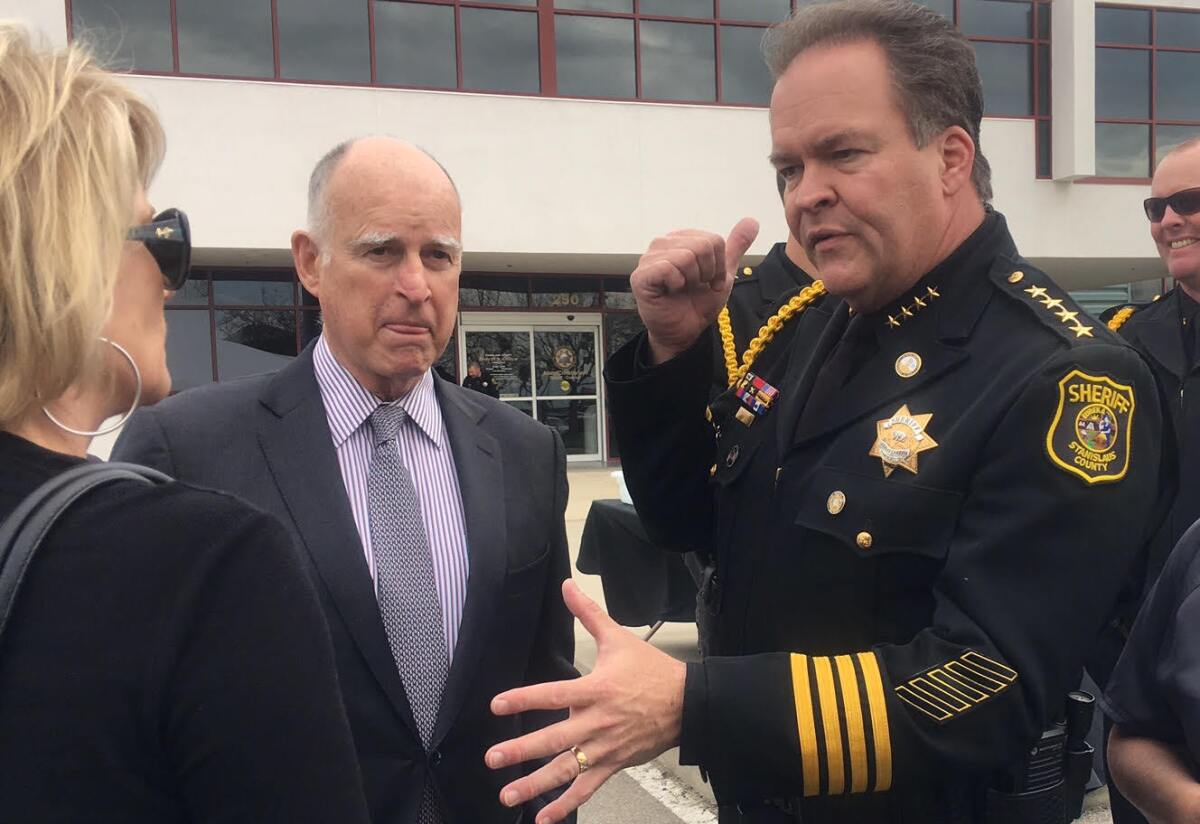
Gov. Jerry Brown once knew Stanislaus County Sheriff Adam Christianson as the most difficult sheriff in the state.
But the two shook hands Tuesday as Stanislaus County became the first in California to open a new detention center with state funding allocated under realignment — a 2011 criminal justice reform effort that Brown has aggressively pushed, and Christianson once fiercely opposed.
“This facility is getting it right,” Brown said at the site’s dedication ceremony in Modesto. “It is more than time behind bars. It is intervention with intelligence and humanity and force.”
The $114-million detention center, which stretches over more than 171,000 square feet, has 480 maximum-security beds and provides housing for 57 medical and mental health offenders. It also has 15 hospital beds.
The county used $80 million in state funding awarded for new jail construction under legislation that was part of realignment, a change to state law that eased prison crowding by making counties responsible for holding offenders previously in state custody.
Christianson, a former “skeptic in chief,” on Tuesday said he had come to embrace a culture shift with the criminal justice system that seeks to create a jail system centered on rehabilitating offenders and providing mental health services.
“I am very proud of the community support and what we have been able to achieve, especially when you learn to become more adaptable to change,” Christianson said. “I can tell you law enforcement doesn’t embrace change a lot, but we have now.”
Republican John Cox enters race for California governor
Republican and Rancho Santa Fe venture capitalist John Cox officially announced his candidacy for governor Tuesday, pitching a platform to stabilize the state’s finances.
Cox decried the state’s high poverty rate, unfunded pension liabilities and high taxes.
“There are two Californias — the one we have, and the one we could have,” he said in a statement. “The California we have is in trouble, and we need to do something about it.”
Cox, an attorney and certified public accountant who moved to San Diego County from Chicago about nine years ago, said last month that he planned to jump-start his campaign with $1 million of his own money.
Cox also is pushing a proposed ballot initiative to overhaul Sacramento by establishing a “neighborhood legislature,” which would add thousands of new “citizen legislators” to the 80 Assembly members and 40 senators who currently make up the California Legislature.
“This campaign is going to be about the neighborhood legislature,” he told The Times last month. “To take our government back from the funders, the cronies and the corrupt.”
There are numerous Democrats running for the office including Lt. Gov. Gavin Newsom, former Los Angeles Mayor Antonio Villaraigosa, state Treasurer John Chiang and former state Supt. of Public Instruction Delaine Eastin.
Another Republican who has announced a run for governor is former Los Angeles Rams football star Rosey Grier.
Californians could begin voting at age 17 under a new proposal in the Legislature
California would become the first state in the nation to fully allow 17-year-olds to vote in elections under a proposal introduced on Tuesday in the Legislature.
“We want to expand the opportunity,” said Assemblyman Evan Low (D-Campbell), author of the constitutional amendment that would have to be approved by a statewide vote in 2018.
Although other states allow 17-year-old citizens to vote in a primary as long as they will be 18 by the time of the general election, the proposal introduced by Low and a bipartisan group of young legislators would empower younger voters to cast ballots.
Low said 18-year-olds are often in a transition phase between high school and living on their own, and that voting habits begin early.
“I think that first election influences whether they continue to vote in future elections,” he said.
Eleven states allow citizens as young as age 16 to pre-register to vote. Low pointed to statistics from California’s 2014 statewide elections that show exceedingly low turnout among young voters. In an interview, though, he said the 2016 elections have engaged young Californians across the political spectrum.
“Extending the right to vote will help them engage in the democratic process,” Low said of 17-year-olds.
Anthony Beilenson, 10-term congressman who championed Santa Monica Mountains, dies at 84

Anthony C. Beilenson, a veteran Democratic politician from Southern California who advocated for abortion rights, environmental protection and gun control as a state legislator and 10-term congressman, has died. He was 84.
Beilenson had been recovering from a heart attack last month and died Sunday at his home in Westwood, according to his son, Adam Beilenson.
Over his 20 years representing congressional districts that included the San Fernando Valley, Thousand Oaks and Agoura Hills, Beilenson championed affordable healthcare, environmental safeguards like the Clean Air Act, and cuts to defense spending.
Lawmaker wants to limit Californians to buying no more than one gun a month

Alarmed by the amount of gun violence and the activity of straw firearms purchasers, one state lawmaker has revived a proposal to prohibit Californians from buying more than one gun a month.
Sen. Anthony Portantino (D-La Cañada-Flintridge) said his measure would close a loophole by including long guns in a monthly buying limit that currently only applies to handguns.
He noted that of the 26,682 guns used in crimes that were entered into the California Department of Justice’s Automated Firearms Systems database in one recent year, 11,500 were long guns.
Portantino said there is no reason why someone would need to buy more than one long gun each month.
“This is not the Wild West,” he said. “California’s in the 21st century, and you shouldn’t be able to walk into a gun store and come out with an arsenal.”
One reason for the bill is concern about straw purchasers who legally buy guns in bulk and then illegally sell them on the black market, often to criminals who are not eligible to buy guns.
About half of the guns seized by state Department of Justice agents from people ineligible to own them are long guns, he said.
He cited data from the Department of Justice that found one person bought 177 long guns in two transactions within a one-month period in 2014.
Sales to single individuals ranging from five to 54 long guns per month occurred on 1,787 occasions, totaling 12,090 guns during the year-and-a-half period ending June 30, 2015.
“[The bill] is basically just saying, ‘People, be reasonable, take a timeout.’ We should not have such a proliferation of weapons out in main street California,” Portantino said.
However, opponents of the bill, including Sam Paredes, say it will do nothing to reduce crime because those intent on breaking the law will still sell guns on the black market.
“This does not prevent straw purchasers from breaking the law,” said Paredes, executive director of Gun Owners of California, a political action committee. “They are only passing laws that affect law-abiding citizens. This doesn’t affect criminals.”
California Senate calls on Trump to end immigration enforcement at churches, schools and hospitals

The state Senate on Monday adopted a resolution calling on President Trump and Homeland Security Secretary John Kelly to honor a 2011 policy that prohibits federal agents from enforcing immigration laws at “sensitive locations,” such as schools, hospitals, churches and marches.
On the Senate floor, Senate leader Kevin de León said he introduced the proposal to support refugees and immigrants in the U.S. illegally who are living in communities wracked by fear as the Trump administration has expanded the number of people it seeks to remove from the country.
It passed with a 29-9 vote.
In an hourlong debate, Republican lawmakers railed against immigrants with criminal records, saying policies like the one cited in the resolution were opening the doors to rapists, drug traffickers and killers.
Sen. Jeff Stone (R-Murrieta) argued that the proposal further fueled divisive rhetoric, saying, “It seems we are here for the weekly ‘Dump on President Trump hour.’”
Other GOP Senate members called for what they termed proactive actions, such as working on resolutions that address comprehensive immigration reform or sending a delegation to Washington.
But Democratic lawmakers said the bill was an appropriate answer to strict enforcement policies that have been sweeping up families and crime victims seeking to work with police.
“I stand because I want to take care of women, families, communities, and I think we can do this in a rational way,” Sen. Toni Atkins (D-San Diego) said.
John Morton, director of U.S. Immigration and Customs Enforcement, first issued a policy against immigration enforcement at “sensitive locations” in a 2011 memorandum. In his memo in February, the state resolution states, Kelly did not contradict or repeal Morton’s policy.
But reports of increased immigration enforcement at these sites have surfaced nationwide. Federal officials were said to have detained people at a homeless shelter at a Virginia church, a domestic violence survivor at a Texas courthouse and a father after dropping off his daughter at school in Los Angeles.
De León said parents have stopped letting their children go to school and families are not seeking medical help or social services, while domestic violence victims have stopped pursuing cases against their offenders.
“The question is: Is our country safer?” he said.
Atty. Gen. Xavier Becerra says Trump’s decision to rescind first travel ban confirms it was unconstitutional
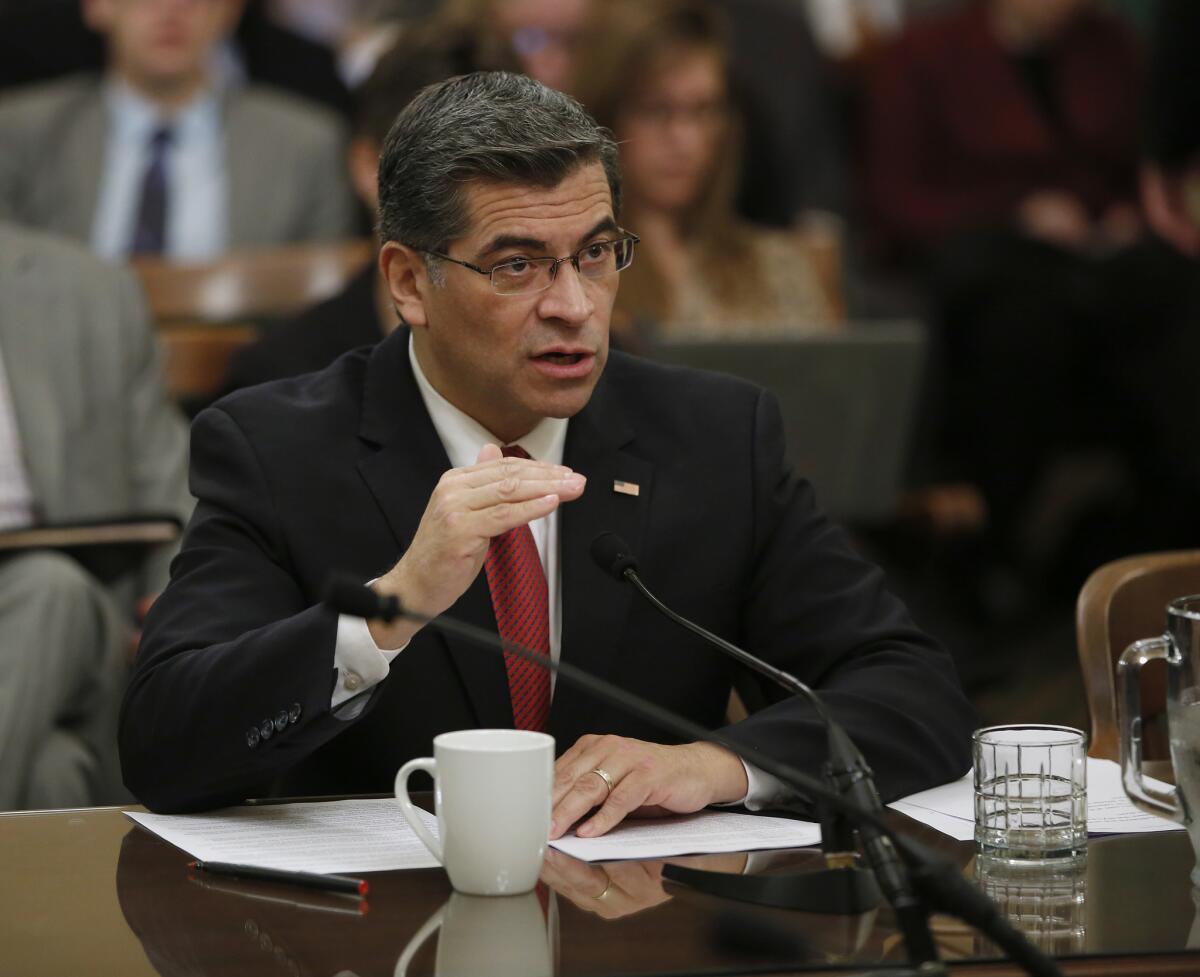
California Atty. Gen. Xavier Becerra issued a statement Monday saying President Trump’s decision to rescind a travel ban bogged down in court challenges “confirms what we all knew: the travel ban was unconstitutional and un-American.”
Becerra said his legal team will closely examine the new travel order issued Monday by Trump that reduces the targeted countries from seven to six and does not affect those who have been issued visas.
“We will do everything in our power to make sure the revised ban respects our Constitution and our way of life,” Becerra said in a statement. “No one will or should soon forget the Trump Administration’s multiple, public promises to ban Muslims from the country.”
Becerra filed amicus briefs joining Washington and other states in challenging the first order, so its repeal was hailed by the state attorney general.
“It represents a major victory for the thousands of lawful permanent residents and visa holders in California, as well as all those across our nation who cherish our Constitution, diversity, tolerance, and fairness,” Becerra said.
At rally for state Sen. Janet Nguyen, De Léon offers an apology — and a dig: ‘She enjoyed her 15 minutes of fame’
The show of support for Republican state Sen. Janet Nguyen from California’s Vietnamese American community continued Monday in a Capitol rally that drew a crowd of hundreds who traveled from Orange County, San Jose and the Bay Area.
Nguyen, who represents Garden Grove, has seen her political profile sharply rise since she was removed from the Senate floor less than two weeks ago after she attempted to critique the anti-Vietnam War activism of the late Democratic legislator Tom Hayden.
“This is our time to shine,” Nguyen told the crowd on Monday, as she was flanked by fellow GOP lawmakers and leaders of Vietnamese American community groups and Vietnam War veterans. “Free speech needs to be protected everywhere in the United States.”
The gathering followed a rally in Nguyen’s home district over the weekend, where Vietnamese American leaders portrayed Nguyen as a civil rights leader akin to Rosa Parks.
The incident continues to ripple through the state Senate. A three-person panel of Senate staffers was tapped to investigate the lead-up to and aftermath of Nguyen’s removal. Republican Senate Leader Jean Fuller has asked for those involved to testify under oath and has called for public hearings on the matter. She said on Monday she had not received a response from Senate leader Kevin de Léon (D-Los Angeles).
“We need an answer,” Fuller said. “We don’t want this to happen again.”
De Léon, along with Sens. Bill Monning (D-Carmel) and Ricardo Lara (D-Bell Gardens), were all subjects of Nguyen supporters’ ire due to their roles in objecting to the senator’s remarks. When De Léon came to address the crowd Monday afternoon, he was greeted with jeers and chants of “free speech.”
De Léon explained to attendees that Nguyen had violated parliamentary rules, but repeated his remarks last week in which he took “full responsibility” for her removal.
“It will never happen again,” De Léon said.
When a Nguyen supporter asked specifically for an apology, De Léon responded, “I’ll apologize. Where is she?”
Nguyen, at that point, had already left the rally.
“I think she enjoyed the 15 minutes of fame,” De Léon later told reporters. “And she doesn’t want it to disappear, obviously.”
California sheriffs say ‘sanctuary state’ bill would prevent immigration officials from going after violent offenders
County sheriffs on Monday slammed a Senate bill that would prohibit state and local law enforcement agencies from using resources for immigration enforcement, saying it would cause their departments to lose federal funding and allow violent offenders to go free.
At a press conference led by Republican lawmakers, the sheriffs said they did not want to enforce immigration laws or target hardworking families and students in the country illegally. But they argued the pending legislation would restrict collaboration between law enforcement agencies at different levels of government when going after crime suspects.
“If SB 54 passes, it will allow dangerous, violent career criminals to slip through the cracks and be released back into our communities,” Sacramento County Sheriff Scott Jones told reporters.
Senate Bill 54, introduced by Senate President pro Tem Kevin de León (D-Los Angeles), would prohibit state and local law enforcement agencies from using resources to investigate, detain, report or arrest persons for the purposes of immigration enforcement.
The so-called “sanctuary state” legislation has drawn wide support among immigrant advocates and some law enforcement officials who say the Trump administration’s efforts to ramp up immigration enforcement is harming trust between police and immigrant communities.
But it has stirred fierce opposition from sheriffs who argue it would prevent them from leasing jail space to federal immigration officials, and from providing them with information on certain defendants.
On Monday, state Sen. Joel Anderson (R-San Diego), said the state should allow federal officials to look for hardened criminals in jails and prisons, not in neighborhoods.
“We are talking about rapists and child molesters,” he said.
De León has countered that federal immigration officials would be able to obtain information from local and state officials through a court warrant.
California congressional Democrats react to Trump’s new travel ban
Without an unprecedented increase in urban housing density, California’s climate goals will be out of reach

It’s going to take a lot more than millions of new electric cars for California to meet its ambitious new goals to severely curb greenhouse gas emissions by 2030, state climate officials warn.
To get people off the road at the rate needed to reach the state’s targets and accommodate a growing population, cities across California will need to boost housing density — perhaps at a level not seen across the United States since at least the 1940s, according to climate officials and planning experts.
Initial efforts to plan to build dense housing in alignment with climate goals in Los Angeles, Sacramento and San Diego have struggled.
Central Valley Republican congressman invites his constituents to sit down for one-on-one meetings
After weeks of Republican members of Congress catching an earful during their hometown town hall meetings, Rep. David Valadao (R-Hanford) in California’s Central Valley is taking a safer route.
The congressman and dairy farmer plans to hold a “huddle” with constituents in his district — which means he’ll be camped out in his Hanford district office and will meet with constituents for first come, first served one-on-one meetings. Valadao has vowed to meet with all comers for a maximum of 10 minutes, and will talk with everyone no matter how long that takes.
“While my constituents and I communicate with each other in many forms, one-on-one meetings are extremely beneficial as I am able to discuss and address their specific concerns and hear their story firsthand,” Valadao said in a statement.
Valadao’s event comes after he has been targeted by protestors who have criticized him for not holding an open town hall meeting in his district as other members of Congress across the county have done. Those highly charged meetings have attracted groups of residents upset about GOP plans to repeal and replace the Affordable Care Act and about the Trump administration’s immigration policies.
Only those who live in Valadao’s 21st Congressional District will be allowed to meet with the congressman.
Valadao, who represents a Democratic-leaning district, has been targeted by the Democratic Party since he was first elected in 2012. He has won three straight elections. He won handily in November, even though Democratic presidential candidate Hillary Clinton trounced Republican Donald Trump in that congressional district.
Vietnamese American leaders demand an apology for Sen. Janet Nguyen’s removal from the state Senate floor
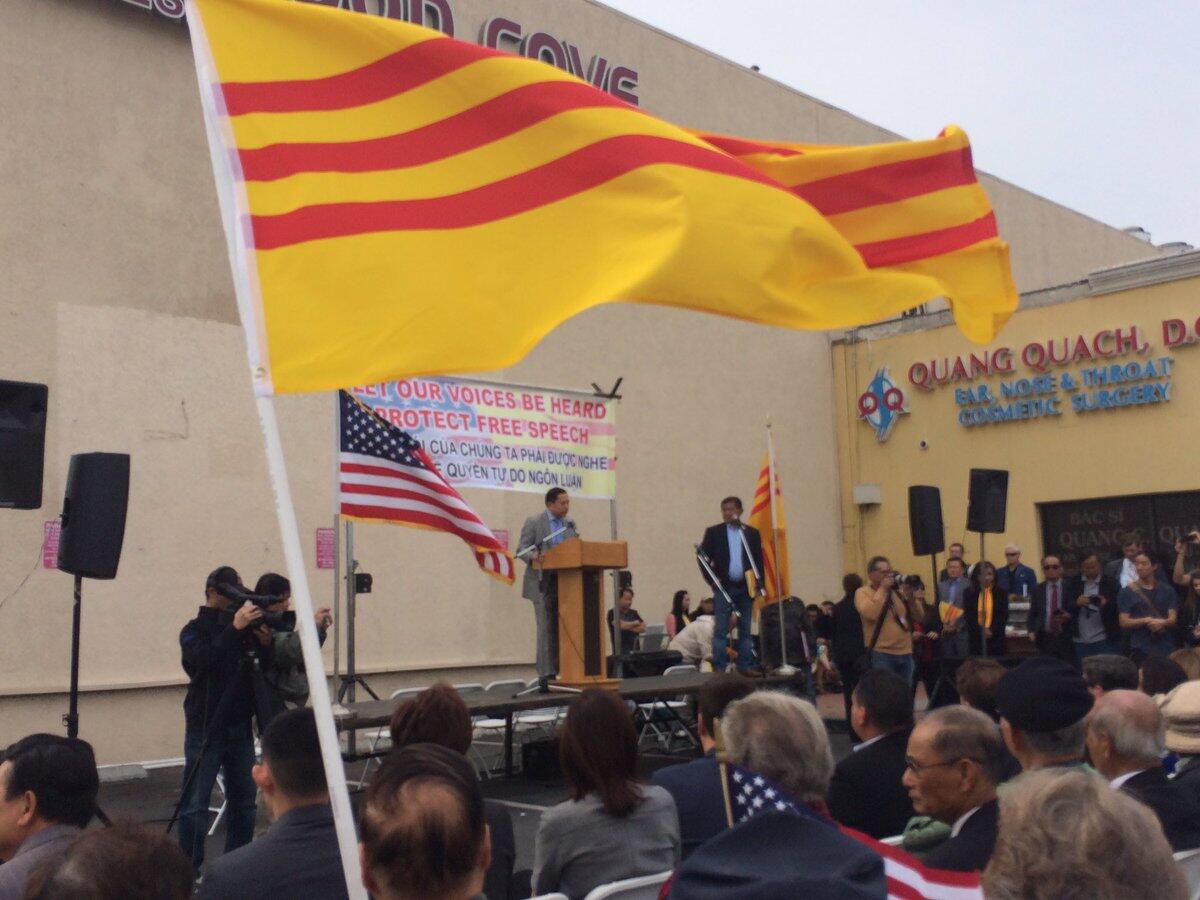
More than 100 Vietnamese American community members gathered in Orange County on Saturday, rallying around state Sen. Janet Nguyen (R-Garden Grove), who was removed from the Senate floor Feb. 23 after attempting to speak out against the late Sen. Tom Hayden, an anti-Vietnam War activist.
They demanded Senate Democrats apologize to the community and to Nguyen for the incident, which will be investigated by a three-person panel designated by Senate President Pro Tem Kevin de Léon last week.
“The Senate majority silenced [Nguyen] ... because they did not want to hear what she had to say,” said Garden Grove City Councilman Phat Bui. “This is a wake-up call for all Vietnamese Americans. Our voices are not yet heard by the Senate majority. Our rights are not yet respected.”
In Orange County, home to the largest Vietnamese American population in the country, the episode has been cast as a direct insult to the memory of the Vietnamese who fled war and a communist regime.
At the rally and concert, which featured a rendition of Lee Greenwood’s “God Bless the USA” and Vietnamese songs about the homeland, Vietnamese American leaders and Republican officials took turns criticizing Democrats for suppressing Nguyen’s freedom of speech.
Dr. Huu Dinh Vo, president of the Federation of Vietnamese American Communities of the USA, compared Nguyen’s attempt to speak out to Rosa Parks’ Montgomery bus protest.
“Instead of a woman sitting down,” he told an audience gathered in the parking lot of a Lee’s Sandwiches shop, “we had a woman standing up to speak.”
Earlier in the week, Vo, Bui and dozens of Vietnamese American leaders signed a letter to Sens. Ricardo Lara (D-Bell Gardens) and De Léon (D-Los Angeles), demanding that the state Senate discipline those involved and calling the incident “barbaric” and an “uncivilized act to a woman.”
Republicans across the state have rushed to Nguyen’s defense, skewering Democrats for what they say was the heavy-handed silencing of an opposing viewpoint.
At the rally, U.S. Rep. Ed Royce (R-Fullerton) likened Nguyen’s removal to “tactics being used by the left to stifle speech they disagree with.” State Sen. Pat Bates (R-Laguna Niguel) called the claim that Nguyen was removed because she had violated Senate rules “fake news.”
“We’re on the edge of living in a one-party state, ladies and gentlemen, and in a one-party state, the truth vanishes,” Orange County GOP Chairman Fred Whitaker said.
Nguyen, who received a hero’s welcome Saturday, spoke last, calling her removal a “dark chapter” in the Senate’s history.
“But let us not be defined by that incident,” she told the crowd, calling it a “historic day” that united the Vietnamese community.
Nguyen said in an interview with The Times that while De Léon had issued a statement taking responsibility for the incident, he had not apologized to her or the Vietnamese community. She joined state Senate Republican Leader Jean Fuller (R-Bakersfield) in demanding that the Senate’s investigation into the matter be open to the public and include testimony under oath.
Republican Rep. Steve Knight met with protesters and boos during raucous town hall in Palmdale
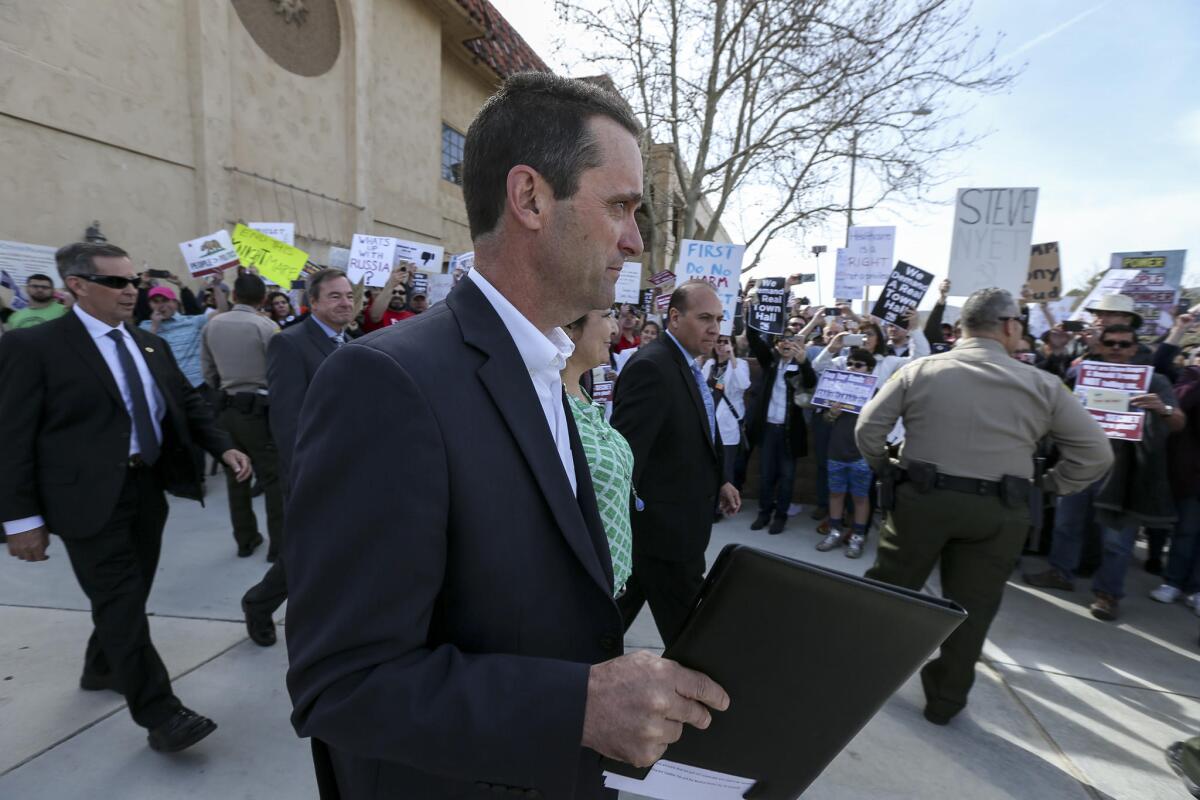
Rep. Steve Knight (R-Lancaster) got an earful from his constituents at an early morning town hall meeting in Palmdale on Saturday that drew an at-capacity crowd of nearly 300 with dozens more protesting outside.
Though Knight ultimately was escorted to his car by several Los Angeles County sheriff’s deputies as protesters booed him, the question-and-answer session remained relatively civil, if a bit raucous.
Knight drew a mixed reaction from the crowd. Local Democratic clubs from Simi Valley, Santa Clarita and the Antelope Valley were at the event, and many in the crowd sported pink caps and so-called “pussyhats” made popular during the Women’s March earlier this year.
Some in the crowd carried signs supporting the Affordable Care Act, a popular topic during the meeting. Knight said parts of the act were working and praised California’s healthcare marketplace, Covered California, calling it one of the better run exchanges in the nation.
He was jeered when he said that Obamacare’s ban on lifetime spending caps on medical coverage could be done away with.
“Some lifetime caps might stay in place but most would not,” he said to loud boos.
Knight, who represents a potential swing district and has been targeted by national Democrats, also tried to differentiate himself from President Trump’s administration, with mixed results.
He earned his loudest cheers when he said that Trump should release his tax returns, something Democrats demanded during the election.
When asked about what intelligent agencies have said was Russian interference in the election, Knight again drew applause when he said that Trump’s administration should not be involved in an FBI investigation.
But he was booed when he said he would look at transcripts of comments made by U.S. Atty. Gen. Jeff Sessions during his confirmation hearing — when Sessions said that he did not have communications with “the Russians” — so Knight could understand “in context” what Sessions said. Sessions came under fire from members of Congress last week after reports that he had failed to disclose meetings with the Russian ambassador to the U.S.
Knight’s office required the town hall attendees to show identification to prove they lived in his district, something that riled some Democrats.
Shari Freedman, a purchasing agent for a print manufacturer in Simi Valley, wore a piece of paper with her ZIP code around her neck in protest of the ID requirement. She was also upset the town hall was held at 8:30 a.m. in Palmdale, a 60 mile drive from where she lives.
“We are constituents, not paid protesters,” she said.
Knight’s district is almost evenly split between registered Democrats and Republicans, while about a fifth of voters list themselves as “no party preference.” National Democrats have targeted Knight’s seat as one they want to flip blue in 2018.
Outside the town hall, protesters chanted “last term” as Knight walked to his car.
Shawnee Badger, a 23-year-old actress from Valencia, was among those protesting.
“He is an extreme conservative,” she said. “He doesn’t represent our district’s values.”
Knight did bring out some supporters including Donna Basail of Agua Dulce. She said she appreciated that Knight came out and took questions from the crowd even if many were protesting.
“He is our representative, he needs to listen to the people regardless of what they say,” she said.
Dozens of protesters gather outside Republican Rep. Steve Knight’s packed town hall meeting in Palmdale
California Politics Podcast: The challenge of declaring the state’s drought to be over
Gov. Jerry Brown isn’t ready to declare California’s drought officially over, but he recently said that the end is near.
On this week’s California Politics Podcast, we take a closer look at the policy and political implications of state government standing down on the long crisis. That includes the impact to Brown’s efforts on a long-term water reliability plan for the state.
We also discuss the governor’s urgent plea to the Trump administration to sign off on a grant for a Bay Area electrified rail project that’s linked to California’s bullet train efforts. And we offer a segment of several political tidbits from the past week, from the saga of a silenced state senator to the mayoral election in Los Angeles on March 7.
I’m joined by Times colleague Melanie Mason, as well as Marisa Lagos of KQED News and Anthony York of the Grizzly Bear Project.
Xavier Becerra endorses Jimmy Gomez in race to fill Becerra’s old congressional seat
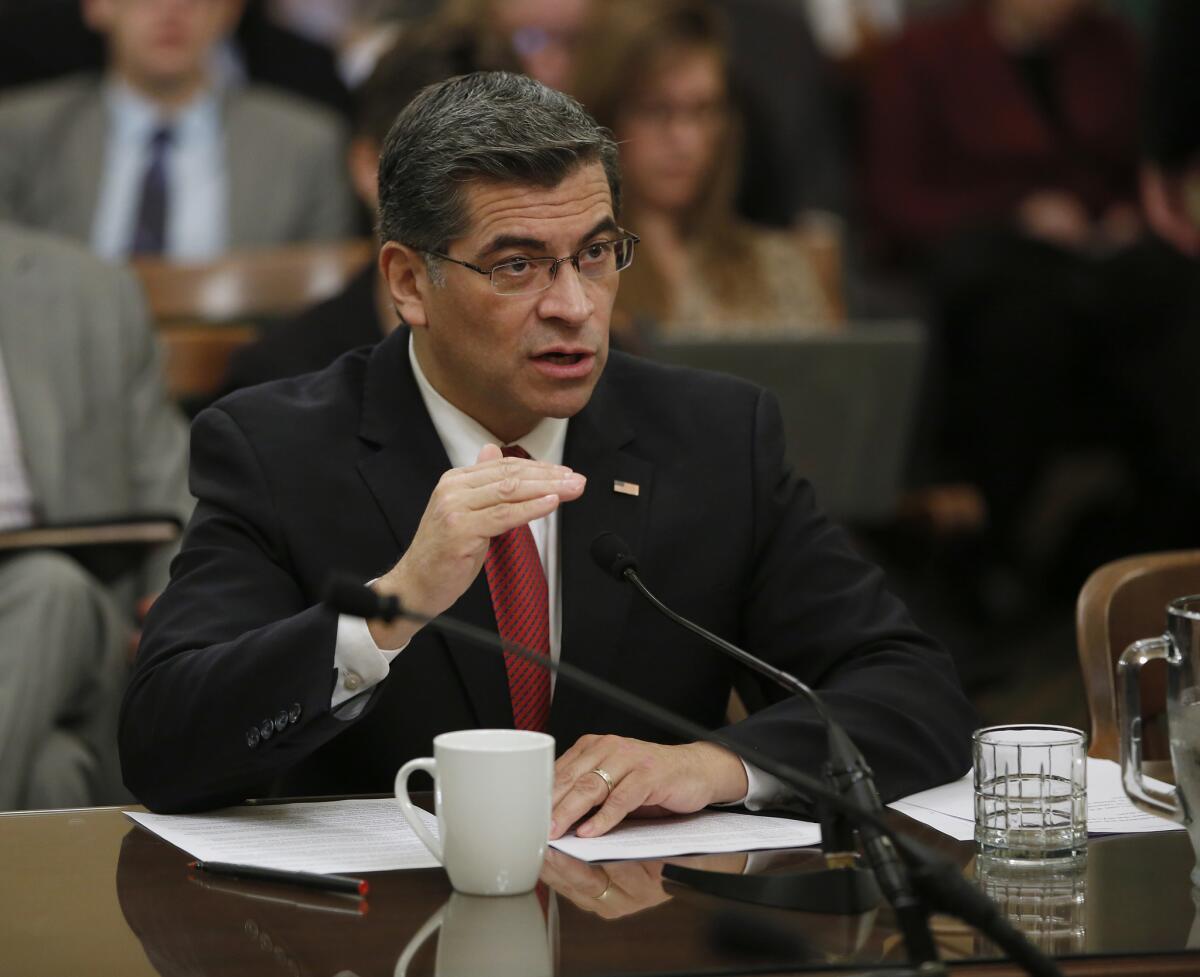
California Atty. Gen. Xavier Becerra endorsed state Assemblyman Jimmy Gomez (D-Los Angeles) in the race to fill Becerra’s old Los Angeles congressional seat.
“Jimmy Gomez will be an outstanding representative for the people I served in Congress,” Becerra said in a statement. “He’s been at the forefront against climate change and domestic violence, to increase the minimum wage and to make higher education affordable.”
Becerra, who also cited his close working relationship with Gomez, is the latest in a long line of Democratic elected officials who have announced their support for Gomez. Gomez’s other endorsers include dozens of state lawmakers, major labor unions, L.A. Mayor Eric Garcetti and U.S. Sen. Kamala Harris.
An endorsement from Becerra, who represented the 34th District for more than 24 years before giving up the seat to become attorney general, is one of the most coveted in a crowded field of 23 candidates.
In an early poll of likely voters by Latino Decisions, 68% of those surveyed said an endorsement from Becerra would make them more likely to consider voting for a candidate. Becerra’s endorsement was second only to the weight of an endorsement from Vermont Sen. Bernie Sanders; 72% said a Sanders endorsement would make them more likely to consider a candidate.
Sanders has not yet endorsed a candidate in the race.
A special primary election is scheduled for April 4. If no candidate gets more than 50% of the vote, a general election runoff between the top two primary finishers will be held June 6.
California Senate appoints a three-person panel to probe GOP Sen. Janet Nguyen’s removal from chamber

After pledging an internal review to investigate the removal of state Sen. Janet Nguyen (R-Garden Grove) from the chamber last week, Senate President pro Tem Kevin de Léon has designated a three-person panel to determine how the controversial incident occurred.
At a Senate Rules hearing on Wednesday, De Léon (D-Los Angeles) announced that he tapped three Senate staffers — the secretary of the Senate, the Senate ombudsperson and a senior staffer to Sen. Anthony Cannella (R-Ceres), the top Republican on the rules panel — to review Nguyen’s physical removal from the Senate floor, after Democrats said she violated parliamentary rules in her attempt to criticize the anti-Vietnam War activism of the late state Sen. Tom Hayden.
De Léon said the panel’s responsibilities include interviewing people involved with the incident, analyzing the emails exchanged in its lead-up and aftermath, reviewing pertinent Senate rules and considering additional training on rules for all senators.
“That process will work itself out — securing the facts so that they can be presented to this committee and we can work through it,” De Léon said in the hearing. He did not specify when the panel would complete its review.
But Senate Republicans are already signaling that they are wary of the arrangement. Senate GOP Leader Jean Fuller of Bakersfield said Thursday that Daniel Alvarez, the secretary of the Senate, should not be on the panel, arguing that as the top administrative officer of the body, he was too closely involved in the incident.
“I’m disappointed that he was appointed to be one of the three panel members to investigate the improper actions leading up to Senator Nguyen being silenced and then removed from the chambers,” Fuller said in a statement.
In a letter to De Léon, Fuller submitted requests on the scope of the inquiry, including asking that all hearings on the matter be held in open, public hearings and that individuals involved testify under oath.
California Rep. Judy Chu goes on a Capitol Hill scavenger hunt for the House Republicans’ plan to replace Obamacare
A draft of House Republicans’ proposed health care legislation to replace the Affordable Care Act is apparently available for House Republicans to view in a secure, undisclosed location somewhere in the Capitol, and a few California Democrats had a bit of fun Thursday looking for it.
Sen. Rand Paul (R-Ken.), a critic of the House plan, started the search, and Democrats jumped to join in, including Rep. Judy Chu (D-Monterey) and House Minority Leader Nancy Pelosi (D-San Francisco).
Gov. Jerry Brown’s definition of California’s limit on state spending could be flawed, analysts say
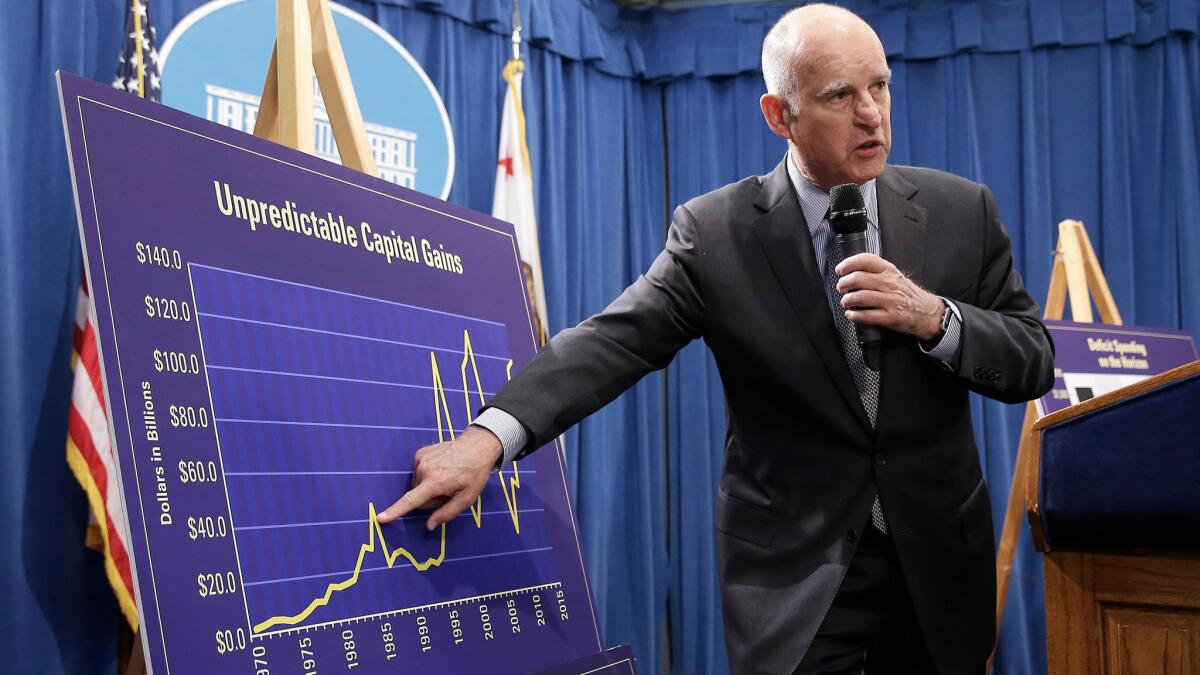
Gov. Jerry Brown’s proposed state budget may have mistakenly excluded some $22 billion from a formula to limit spending that was first imposed by voters in 1979, according to a new study by the Legislature’s independent analysts.
The issue, arising from complex accounting of spending by local schools and state government, could leave lawmakers facing the tightest legal restrictions on state spending in more than a quarter-century when they craft a budget later this year.
“We’re a lot closer than we think we are” to hitting the legal limit, said Ryan Miller, one of the analysts who drafted the report.
The report issued Thursday by the Legislative Analyst’s Office takes issue with $22 billion in school-related spending that Brown said is not subject to the formulas enshrined by voters in the California Constitution, first in 1979 and later revised in 1990.
A debate over that interpretation could be the most intense fights in decades over the what’s known as the “Gann limit,” named for the author of the original ballot initiative, Paul Gann.
The late anti-tax advocate was also the co-author, along with Howard Jarvis, of the 1978 change to property tax rates, Proposition 13.
Brown’s budget plan, unveiled in January, calculated more than $26.9 billion in room below the legal limit. But the LAO report argues Brown’s proposal takes a large slice of projected spending and declines to count it toward the Gann measure’s limits on either school or state spending. In essence, the report says, those dollars are “nowhere money” and create more room for increased state budget spending.
The Brown administration disputed the analysis.
“The governor’s budget reflects an accurate implementation of both the Constitution and the state laws regarding the Gann Limit,” said H.D. Palmer, Brown’s budget spokesman. “We’re implementing the laws on the books as they’re written.”
In the 27 years since voters reworked Gann’s original spending limit, the fiscal dam has only been breached once — during the dot-com boom of 1999 and 2000. The law mandates excess revenues go either to schools or to taxpayers as rebates, but it has not been tested alongside more recent revenue rules — most notably, the rainy day reserve fund strengthened by voters in 2014.
The analysts believe there could be as little as $2.8 billion in 2017-18 spending growth left under the limit -- a relatively meager amount that could thwart efforts like ongoing negotiations at the state Capitol over raising new revenue for transportation.
Lawmakers have until June 15 to submit a budget to Brown, a spending plan that will begin to come into shape once Californians file their personal income taxes next month.
State workers wasted thousands of taxpayer dollars on the job, auditor’s report finds
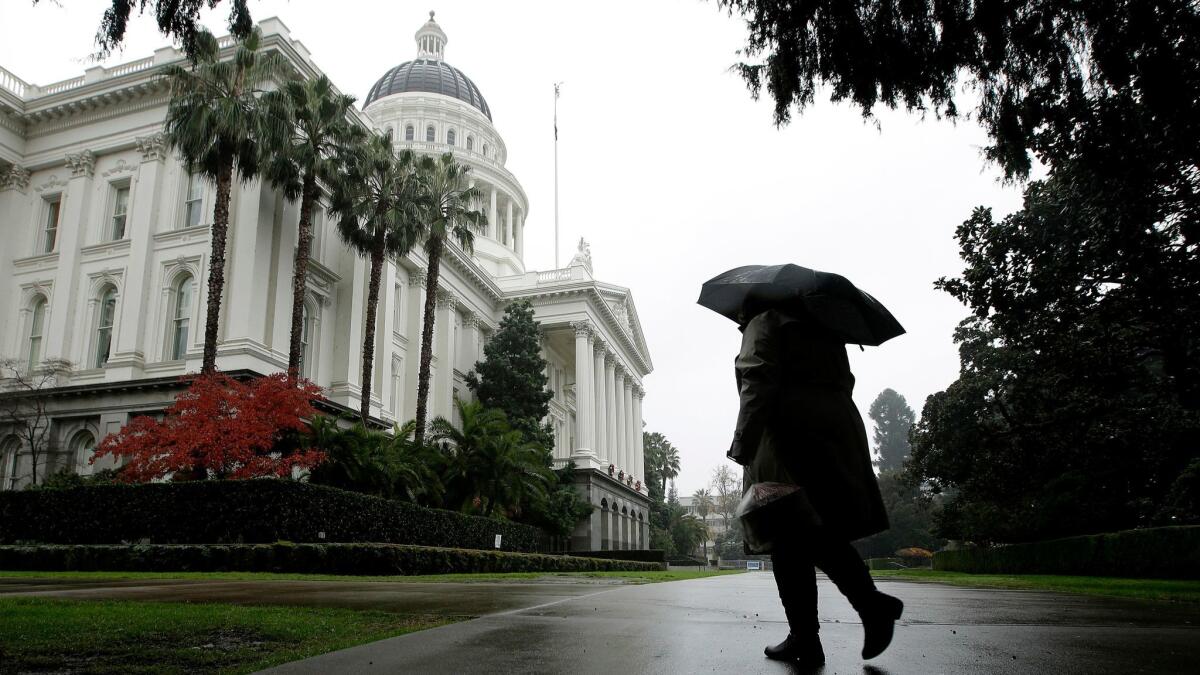
One state employee used his work computer extensively to play video games, another misused her state car for personal commutes and two tax officials improperly referred taxpayers to private businesses to prepare their taxes.
Those are some of the findings of State Auditor Elaine Howle based on tips from the state whistle-blower telephone line, she said Thursday.
“Through our investigations, we found misuse of state time and resources, failure to keep accurate time and attendance records, disclosure of confidential information, neglect of duty to supervise and improper payments,” Howle wrote to the governor.
“In total, we identified almost $40,000 in inappropriate expenditures related to the misuse of state time and resources, inaccurate attendance records, and improper payments,” she added.
The cases included:
— A Cal State Fresno library employee misused his university computer to visit more than 48,000 webpages over a 13-month period related to online videos and games that were not connected to his work.
— A parole agent with the California Department of Corrections and Rehabilitation misused a state vehicle for her personal commute at a cost to the state of about $3,800, in addition to improperly storing the car at her home without permission.
— An analyst at the California Department of Transportation misused state time by regularly taking excessive breaks to smoke and extended lunches during her workdays, misusing 130 hours of state time from July 2015 to March 2016 at a cost to the state of about $4,300.
Republican Rep. Steve Knight tweets that Sessions should ‘step aside’ from Russia investigation
Rep. Steve Knight (R-Lancaster) on Thursday urged Atty. Gen. Jeff Sessions to “step aside” from any investigation of Russian involvement in the presidential election, adding to mounting pressure from congressional Republicans.
Sessions is on the hot seat after reports that he met with Russia’s ambassador to the U.S. prior to the election last year. During his confirmation hearing, Sessions testified that he did not have communications with “the Russians.”
Knight, a second-term congressman, represents a potential swing district in northern Los Angeles County. National Democrats have identified Knight as a prime target in their efforts to win seats during the 2018 midterm elections.
The congressman has scheduled a town hall meeting for Saturday morning in Palmdale.
Kamala Harris and Nancy Pelosi are calling for Atty. Gen. Jeff Sessions to resign
A chorus of California Democrats are joining House Minority Leader Nancy Pelosi (D-San Francisco) in calling for Atty. Gen. Jeff Sessions to resign over news that he lied to Congress about meeting with the Russian ambassador during the presidential campaign.
Sen. Dianne Feinstein (D-Calif.) said if Sessions won’t recuse himself, he should resign.
“The fact that he spoke with Russians and then, under oath, denied it is unacceptable,” Feinstein said in a statement. “The ties between Russia and those close to Trump are far deeper than previously admitted and it’s clear the Trump administration is in no position to handle an investigation on its own.”
Sen. Kamala Harris (D-Calif.) said recusal shouldn’t even be an option, and Sessions should leave now.
“The faith Americans have in both a fair election and their elected officials has been fundamentally damaged and cannot be restored until there’s a full accounting of the facts. This is critical to combating future Russian intrusion in our government and electoral process,” she said in a statement. “Atty. Gen. Sessions is a roadblock to that goal.”
Pelosi reiterated her late-Wednesday call for Sessions to resign in a news conference Thursday.
“He has proved that he is unqualified and unfit to serve in that position of trust,” Pelosi said.
House Democratic Caucus Vice Chairwoman Linda Sanchez of Whittier also wants Sessions to resign.
Other Democrats including Rep. Jim Costa of Fresno took a more moderate stance, saying Sessions should step away from the investigation.
Most of California’s 14 Republican members have remained silent on Sessions. House Majority Leader Kevin McCarthy (R-Bakersfield) and Rep. Darrell Issa (R-Vista) each indicated Thursday that Sessions should step aside from the investigation. But McCarthy walked back his comment quickly, saying he wasn’t calling for Sessions to recuse himself.
California Secretary of State Alex Padilla wants to issue confidential mailing addresses to human trafficking survivors
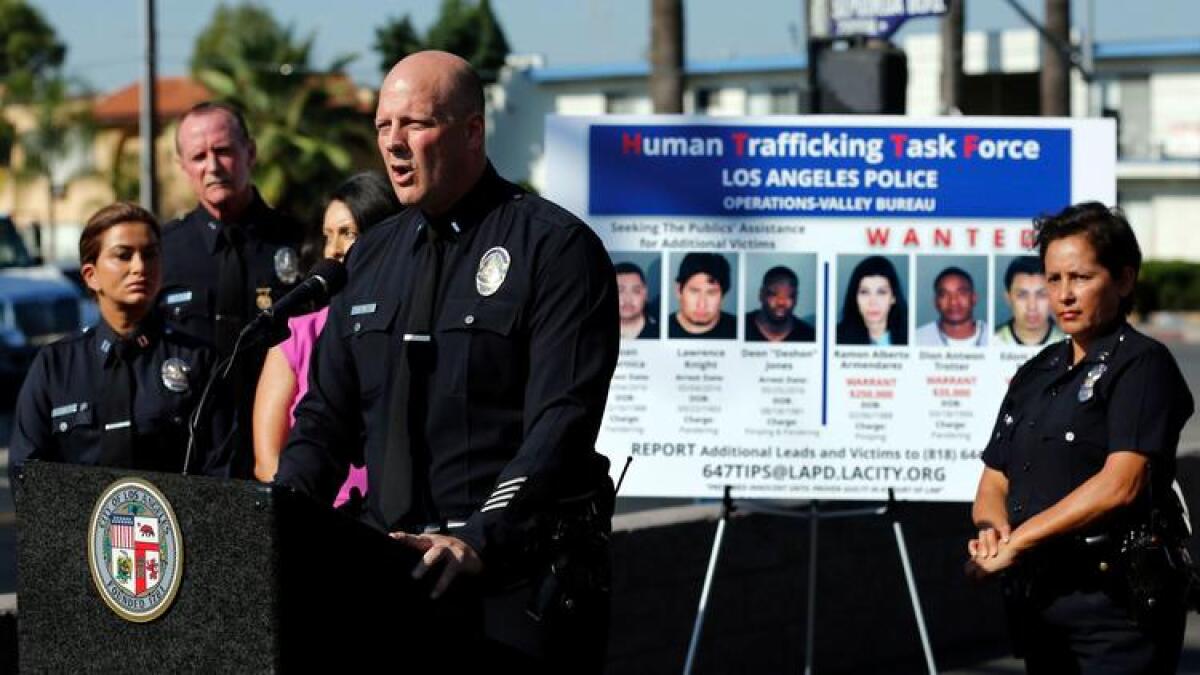
A California secretary of state’s program that provides free post office boxes to victims of domestic violence, sexual assault and stalking could also soon begin serving survivors of human trafficking.
Secretary of State Alex Padilla and state Sen. Connie Leyva (D-Chino) on Thursday introduced legislation that extends benefits under the Safe at Home initiative to former victims of forced sex work or labor.
The confidential address program, launched in 1999, provides a free post office box and mail forwarding service to participants, allowing them to privately receive mail, open bank accounts, register to vote and fill out government forms.
Padilla said he wanted to expand the program to ensure it served victims swept into a quickly growing criminal industry in California.
“It is a very difficult situation if you can’t communicate confidentially with the people who are trying to help,” he said.
Safe at Home has served roughly 7,000 people and currently has nearly 3,200 participants. Padilla and Leyva said they did not know how many more people the bill could potentially cover.
But trade of forced sex and labor has wide reach in California, where national human trafficking hotline calls generated 1,323 cases in 2016 — nearly twice as many as any other state.
The legislation “would try to help victims move on with their life and hopefully live in peace,” Leyva said.
Orange County’s Rep. Dana Rohrabacher gets another Democratic challenger for 2018
A Democrat from Laguna Beach, real estate broker Boyd Roberts, says he’s also challenging Rohrabacher for the seat, mostly over his friendly views of Russia.
House Majority Leader Kevin McCarthy says Sessions should step away from Russia investigation
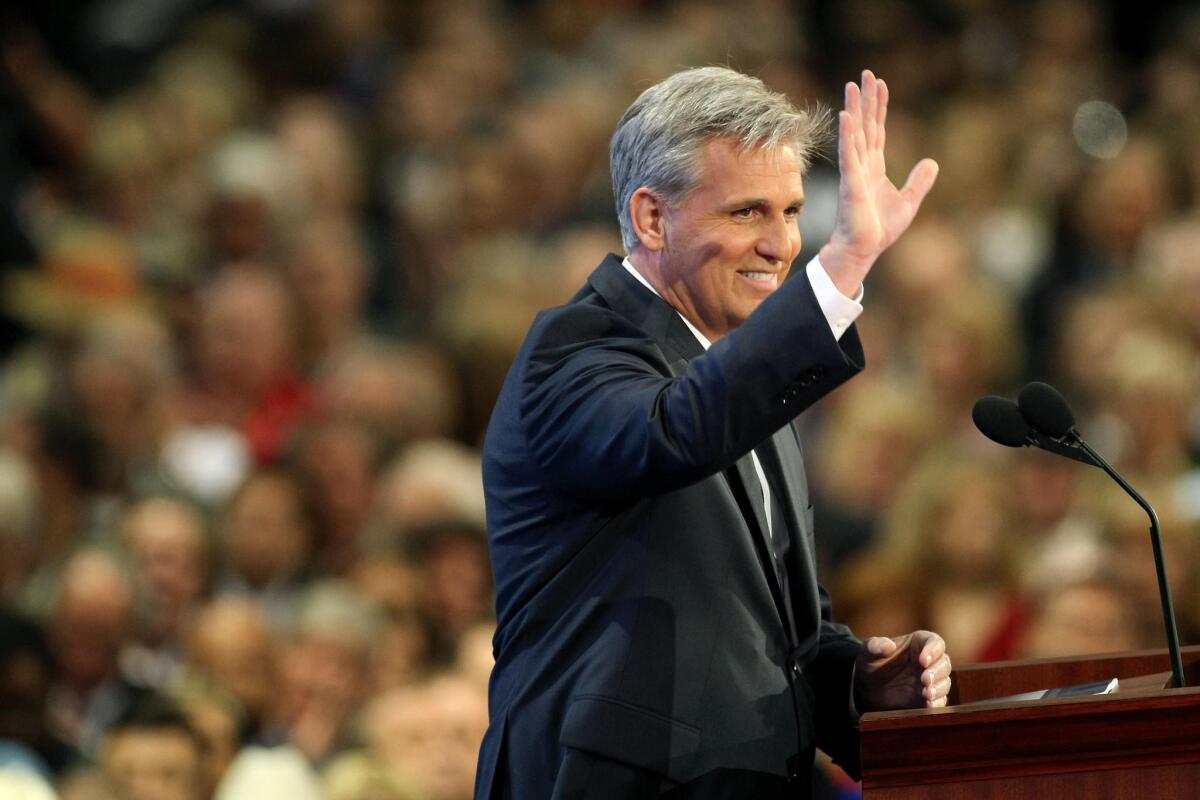
House Majority Leader Kevin McCarthy (R-Bakersfield) says Atty. Gen. Jeff Sessions should step aside from any role in the investigation of potential contacts between the Trump campaign and Russian officials
McCarthy’s remark Thursday makes him the highest-ranking member of his party to say that Sessions should not participate in the investigation.
He joins Rep. Darrell Issa (R-Vista), who said earlier this week Sessions should recuse himself.
California’s Democratic members of Congress rebuke Sessions as Pelosi calls for him to resign
House Minority Leader Nancy Pelosi calls for Atty. Gen. Jeff Sessions’ resignation
Former President George W. Bush at the Reagan Library: Recent remarks not meant to criticize Trump
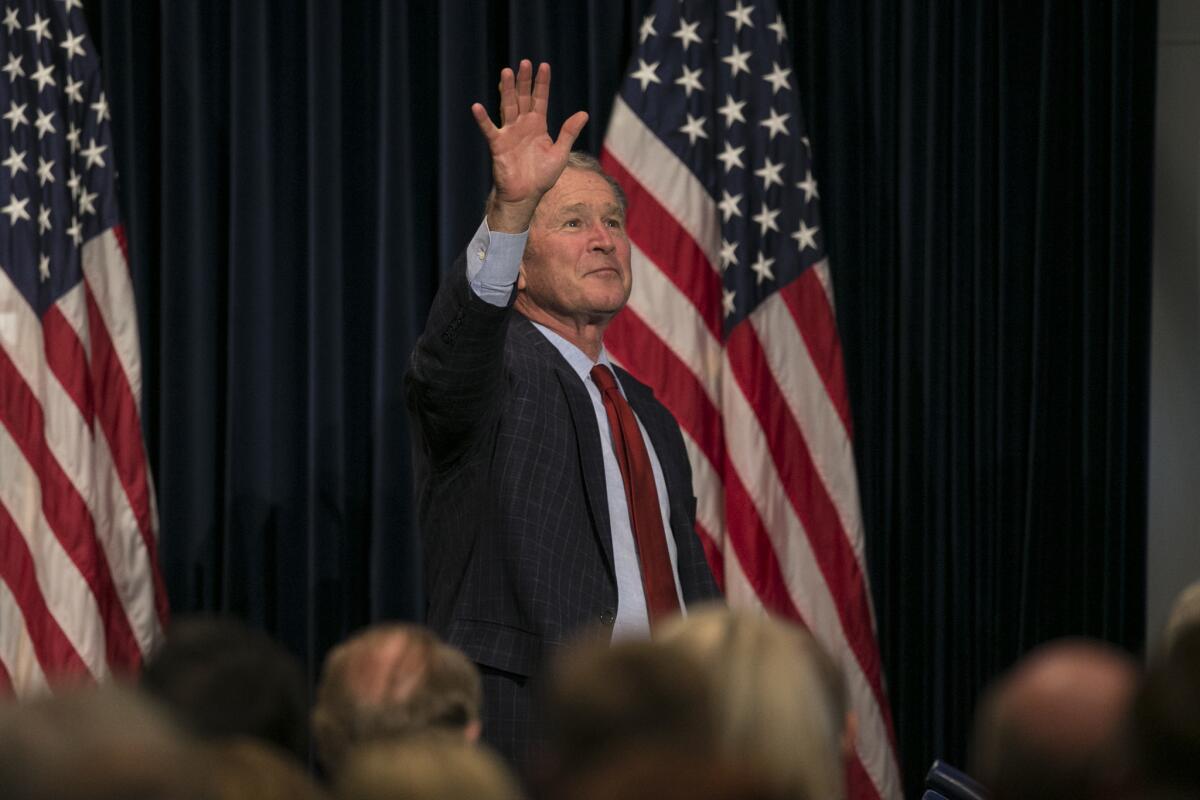
Former President George W. Bush on Wednesday pushed back at the notion that his recent remarks about the media were criticisms of President Trump.
“I’m asked the question, ‘Do I believe in free press?’ and the answer is absolutely I believe in free press … because the press holds people to account,” he said. “Power is very addictive and it’s corrosive if it becomes central to your life, and therefore there needs to be an independent group of people who hold you to account. And so I answered that question, and of course the headlines were, ‘Bush criticizes Trump.’ And so therefore I needed to say, ‘There should be a free and independent press, but it ought to be accurate.’”
Bush made the remarks at the Reagan Presidential Library in Simi Valley during an hourlong question-and-answer session promoting “Portraits of Courage,” his new book that features his paintings of veterans.
While doing interviews about the book in recent days, he raised eyebrows with comments about the media, immigrants and allegations of Russian interference in the November presidential election that were widely viewed as criticisms of the new president.
The California Legislature’s top four leaders accepted $60,000 in gifts last year
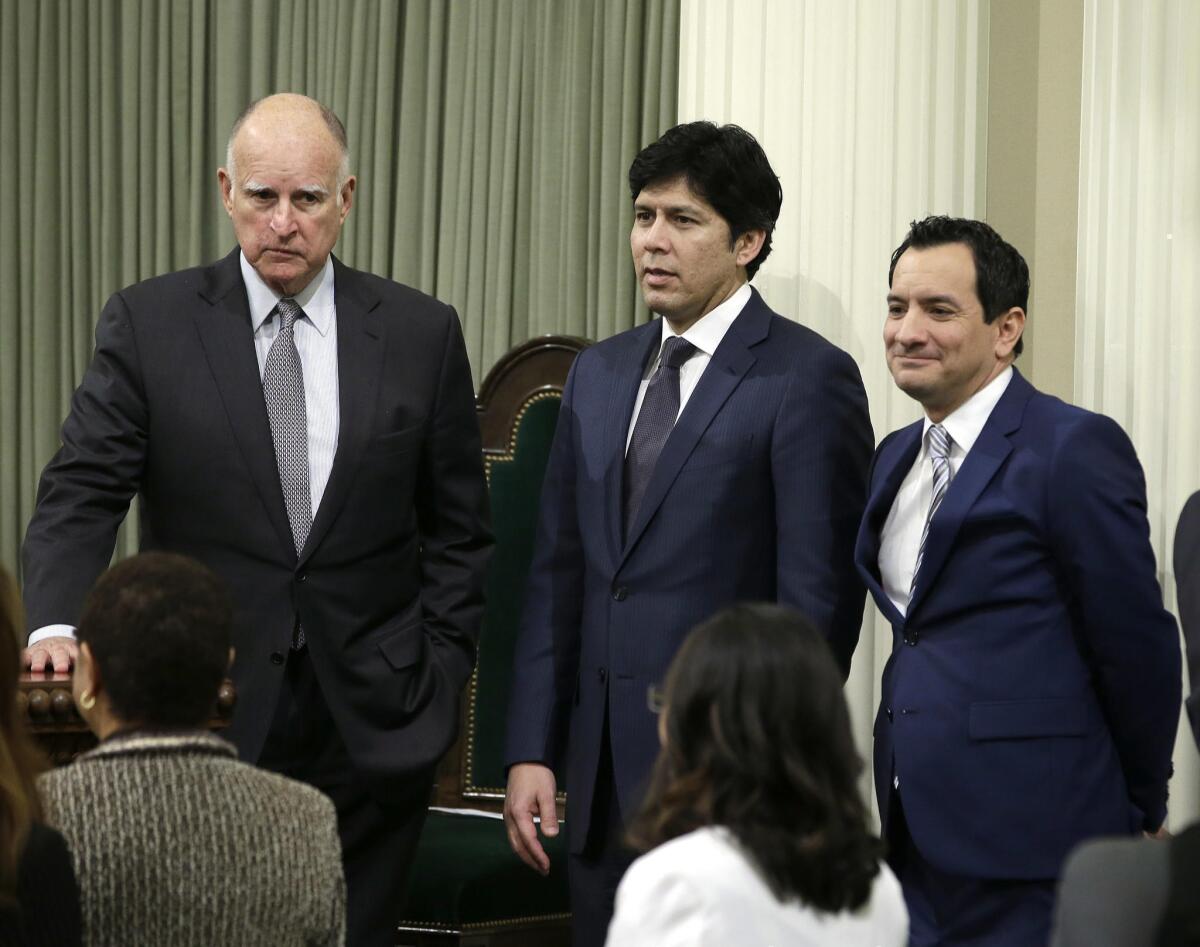
The California Legislature’s four top leaders accepted $60,000 in gifts last year, including sports tickets, expensive meals, golf games and travel to foreign countries, according the annual reports they were required to file Wednesday.
Senate leader Kevin de León (D-Los Angeles) accepted 60 gifts worth $24,381, the largest amount of the four lawmakers, including travel expenses to Morocco, El Salvador, Mexico and Puerto Rico.
Gov. Jerry Brown received $4,500 in gifts last year, including tickets to a basketball game and a trip to Yale
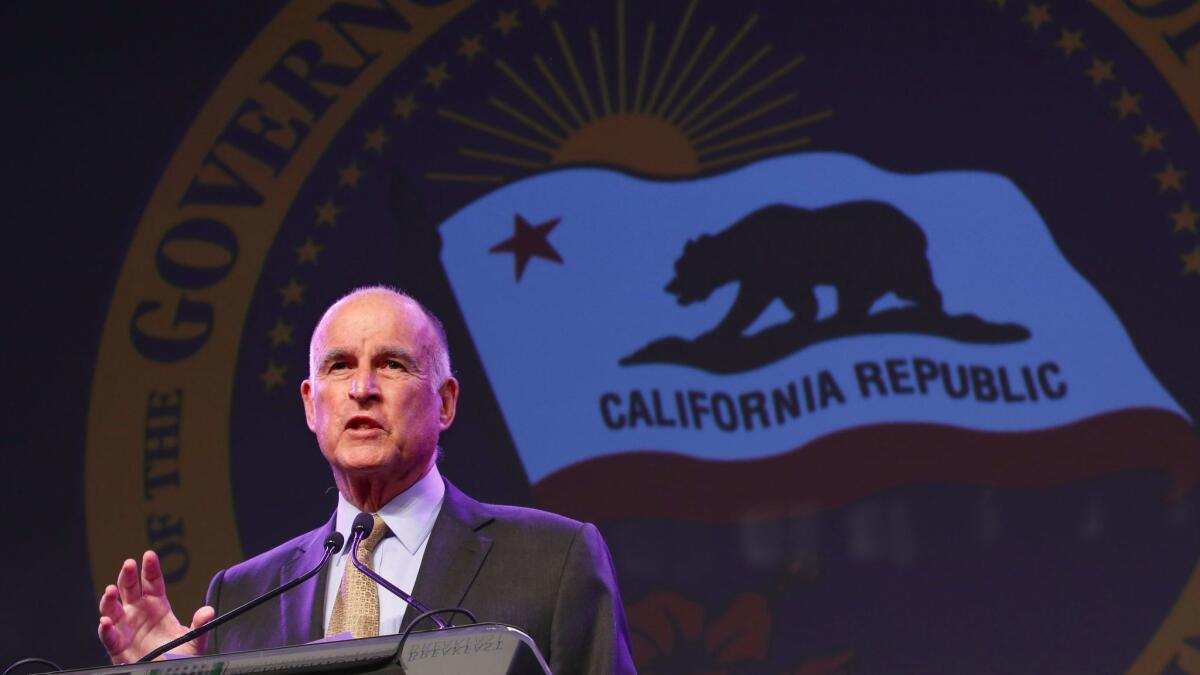
Gov. Jerry Brown accepted 27 gifts worth about $4,500 last year, including dinners and travel expenses, a cellphone, bottles of wine and a ticket to a basketball game from the Sacramento Kings, according to his annual filing of an economic interest form.
The amount is down significantly from 2015, when Brown accepted gifts valued at $22,136, including money from the California State Protocol Foundation to attend a climate change conference in Paris.
Who will lead state Senate Republicans after term-limited Bakersfield Sen. Jean Fuller?
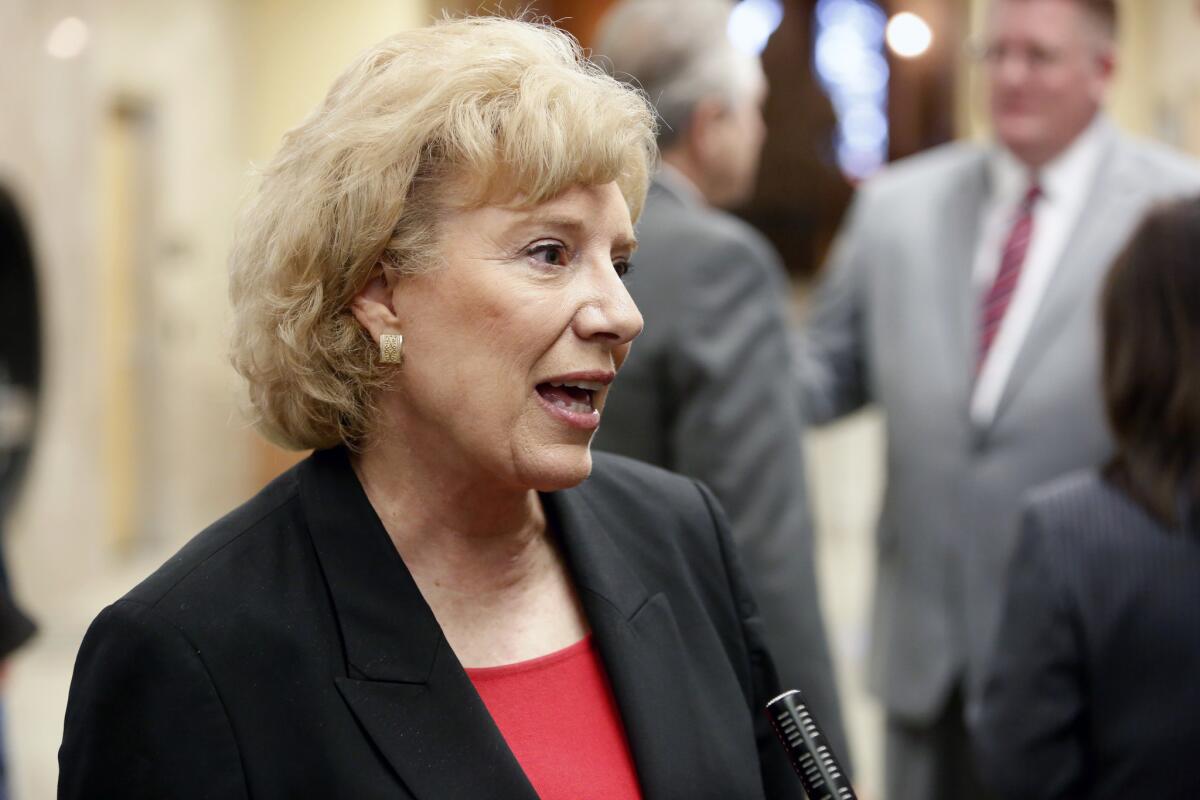
Senate Republican leader Jean Fuller of Bakersfield has begun talking to colleagues about eventually stepping down and passing the torch to another member given that she is termed out of office next year, but so far nobody has publicly agreed to take over the job, officials say.
An attempt by the 13-member Senate Republican Caucus to discuss a possible transition Tuesday was interrupted by a fire alarm drill, so the subject was put off at least until the next weekly caucus meeting, March 7.
“[Fuller] has been calling all of us to say, ‘Hey, are you interested?’” Sen. John Moorlach (R-Costa Mesa) said. “The question is, who is willing to take it and when do we do it?”
Revenue from state cap-and-trade auction still weak

California’s cap-and-trade program limped through another weak auction of pollution permits last month, according to results provided by state regulators Wednesday.
Demand for the permits, which are required to release greenhouse gas emissions into the atmosphere, has fluctuated over the last year amid questions about the program’s long-term viability.
A state appeals court is expected to rule soon on whether cap and trade represents an unconstitutional tax, and lawmakers are debating whether they should ensure the program continues past 2020.
Final details on the latest auction have not been released, but the summary of results posted Wednesday indicates that revenue probably will be only about $8 million. Less than 20% of the permits offered through the auction were claimed.
That’s a drop from the two previous auctions, which saw higher demand, and roughly equivalent to the May 2016 auction.
Under new bill, all people facing deportation in California would be eligible to apply for legal services
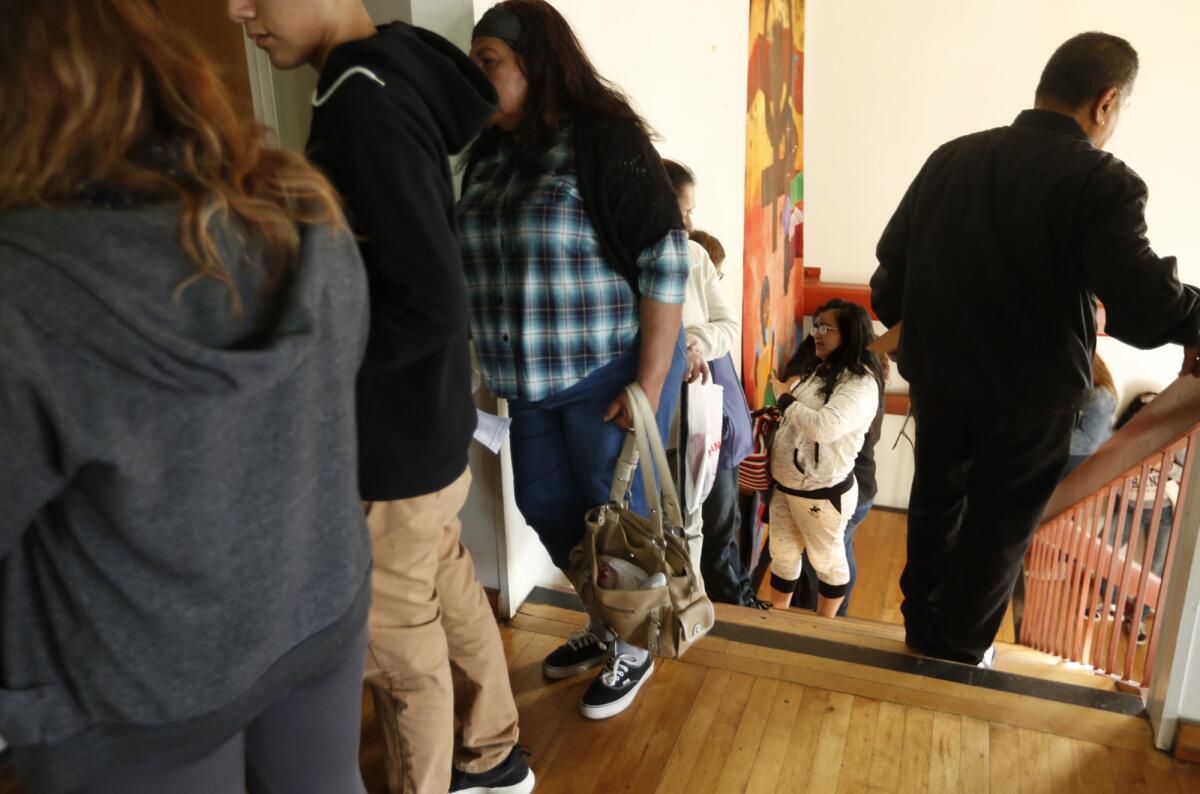
A state senator plans to amend a bill that would create a legal defense program for immigrants, making all people facing deportation in California eligible to apply for services regardless of criminal background.
Immigrant advocates and legal aid agencies have lauded the compromise, which they said would counter anti-immigrant rhetoric from the Trump administration associating illegal immigration with violent crime.
But it remains to be seen how moderate Democrats and Republicans, who have argued against using taxpayer funds to defend dangerous offenders, will accept the move.
California lawmaker wants to tax painkillers to fund addiction treatment

As concerns mount over prescription drug abuse, a California legislator wants to impose a tax on addictive opioid medications and use the funds to expand prevention and rehabilitation services.
Assemblyman Kevin McCarty (D-Sacramento) has introduced a bill that would impose a 1-cent-per-milligram surcharge on prescription opioids sold in California. The tax would be imposed on wholesalers who import the medication into the state, not at the point of sale, and it would require a two-thirds approval vote in the Legislature.
California Atty. Gen. Xavier Becerra to set up a Washington office
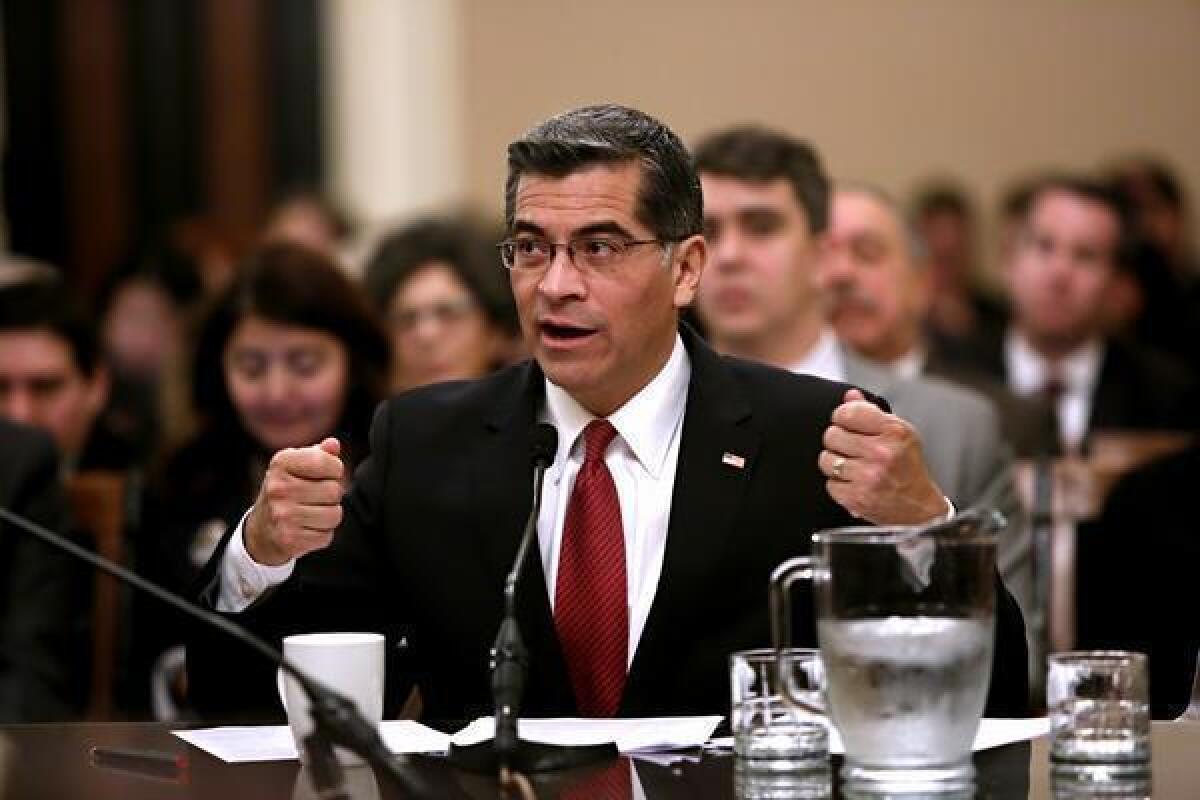
California Atty. Gen. Xavier Becerra said Wednesday that he is setting up an office in Washington, an unusual move for a state attorney general. Opening the new office is reflective of the fact that much of his attention will be devoted to Trump administration actions that might conflict with California policies, Becerra said.
Becerra, who has already filed three amicus briefings in lawsuits challenging Trump immigration orders, said the office will help him collaborate with members of California’s congressional delegation on policies that affect the Golden State.
“Decisions that are going to affect California are going to be played out in Washington, D.C., and I think it’s important for my office to have a presence here,” Becerra said.